UNDER THEIR CARE
Decision-makers across the healthcare industry have responded to the call to serve, dedicating themselves to supporting patients, coworkers, and neighbors alike featuring executives from Cedars-Sinai, Allergan, the AIDS Healthcare Foundation, and more P86
 A Day in the Life with Carlos Gaytán, Michelin Star-winning chef and owner of Tzuco P 10
A Day in the Life with Carlos Gaytán, Michelin Star-winning chef and owner of Tzuco P 10
Where experts go for expert advice
Organizations are facing increasing competition for the customer focusing on quality of care, ser vice and value. FTI Consulting works closely with healthcare enterprises to driving patient access through supporting identify areas for potential growth. We provide unparalleled expertise, innovation, and the necessar y global reach to achieve success. FTI Consulting can help you optimize performance in the short term and challenges of the future. For more information, please visit www.
The healthcare industry is under greater demands than ever before to safeguard the health of patients, frontline workers, and entire communities. These executives are rising to the occasion. P86 88 Andrew Ortiz and Arthur J. Ochoa, Cedars-Sinai 96 Cindy Alvarado, Pacira BioSciences Inc. 101 Sergio Melgar, UMass Memorial Health Care 105 Virginia Lazala, Novartis Pharmaceuticals 108 Carlos Soto, Takeda Pharmaceuticals 113 Peter Perez, Highmark Inc. 118 Laura Morales Garcia and Edwin Millan, AIDS Healthcare Foundation 121 Lorena Gomez, Allergan Cover
Keepers of Community
3
Executive
Illustration by Carlos Zamora
Hispanic
The Power Within
In times of trouble and in times of calm, State Street's CEO relies on Yvonne Garcia to engage senior leaders and cascade key messages throughout the organization

18 4 Contents
NICHOLE FREDRIKSEN
Contents
THE ALL-INCLUSIVE PLAN
Marisol Martinez understands the positive impact of attracting diverse talent that’s reflective of the markets and customers served by Charter Communications
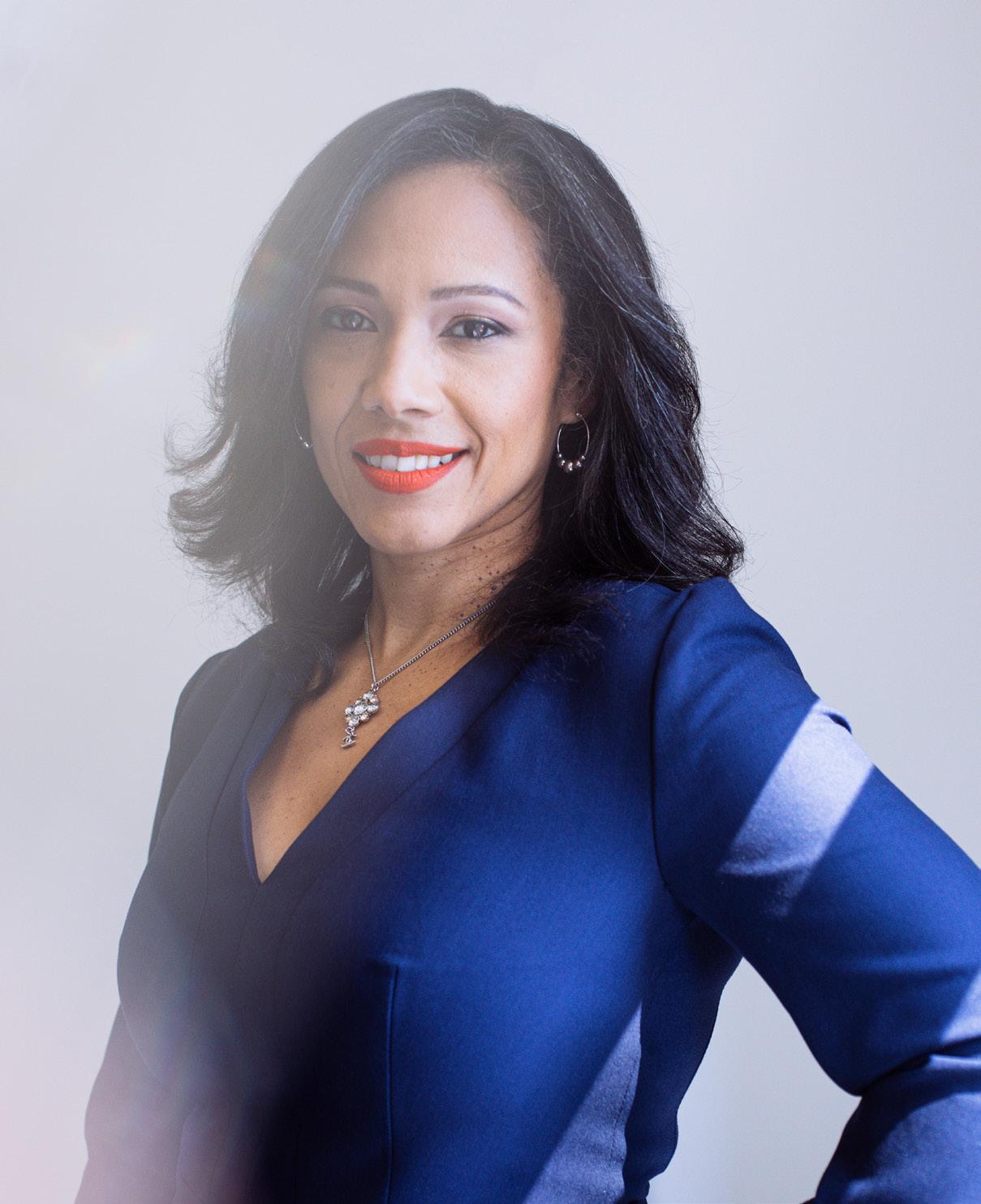
THE UNWAVERING PUBLIC SERVANT
Carina E. Sánchez is intent on not only making government work for all the people of Chicago but also making sure that the city is reflective of its people
WHAT SUCCESS LOOKS LIKE
McDonald’s began investing in Ofelia Melendrez-Kumpf’s maturation as a leader nearly thirty years ago. Today, it invests in the careers of others more than ever before.
COMMUNITY ACTIVIST
Bernie Navarro puts his passion to work by activating his community and fostering educational and business opportunities for those who call Miami home
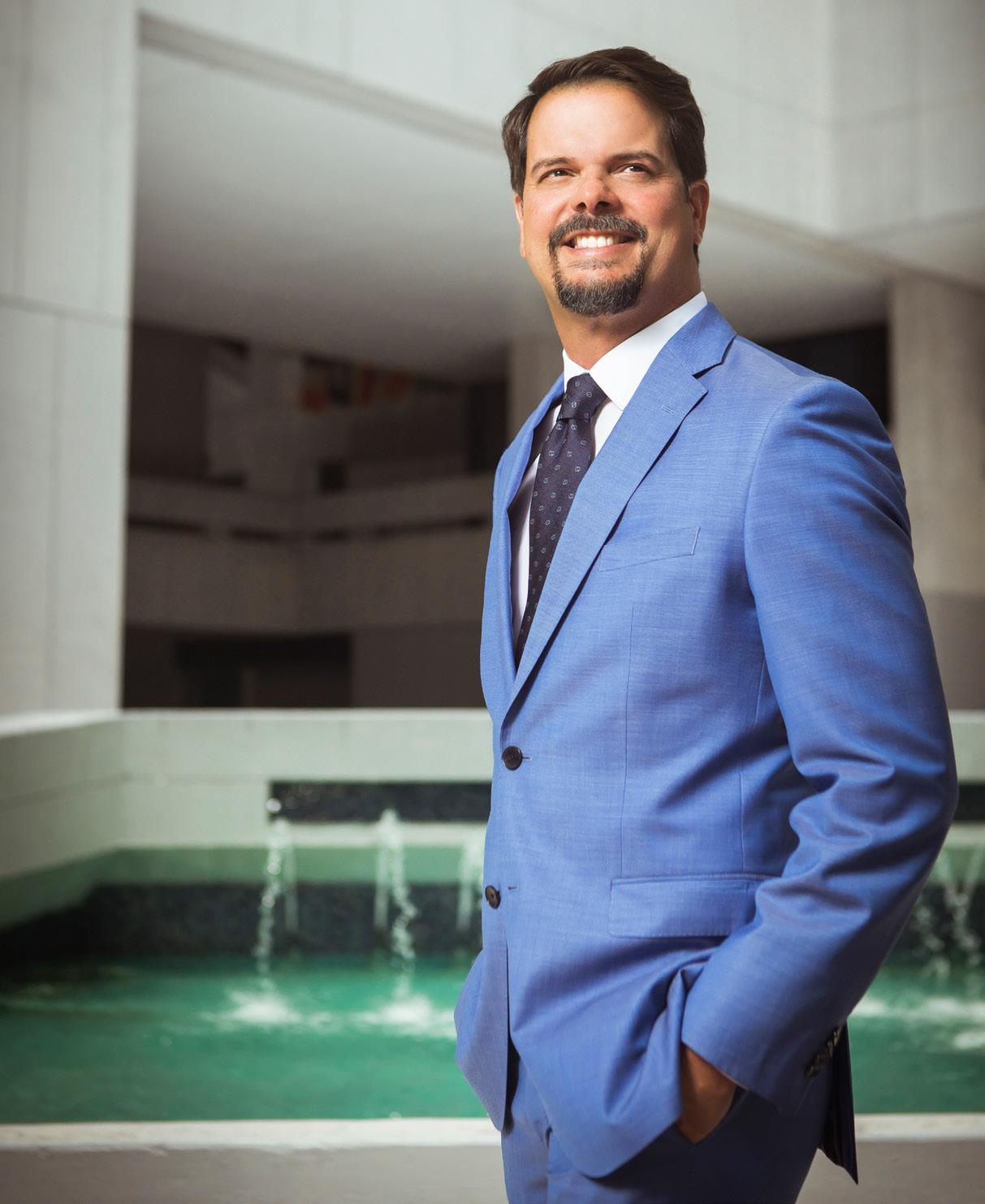
TWO LETTERS, ONE BIG CHANGE
VP Mauricio Machado explains how his career-defining jump from IT to HR has helped him drive the employee experience at Cargill
THE CASE FOR BOLD ACTION
Flavio Martins Ferreira has found global success at a young age. His secret? Always asking for the jobs and projects he's passionate about.
Odds & Ends
6 A LETTER FROM THE PUBLISHER 10 A DAY IN THE LIFE 16 RECOMMENDED RESOURCES 160 INDUSTRY INDEX 162 THE LAST WORD 26 44 62 76 126 148 76 26 5 Hispanic Executive SONYA REVELL (NAVARRO), AUNDRE LARROW (MARTINEZ)
A Letter from the Publisher
AT THE 2019 L’ATITTUDE CONFERENCE IN San Diego, I saw my good friend Victor Arias give a presentation on behalf of the Latino Business Action Network (LBAN) and the Stanford Latino Entrepreneurship Initiative (SLEI) on how the Latino community was “coming to the rescue” of the American economy. With comedic bravado, Victor galloped across the stage, humming the infamous theme song from the classic TV western Bonanza and grabbing everyone’s attention.
Pedro A. Guerrero CEO of Guerrero Media Publisher of Hispanic Executive
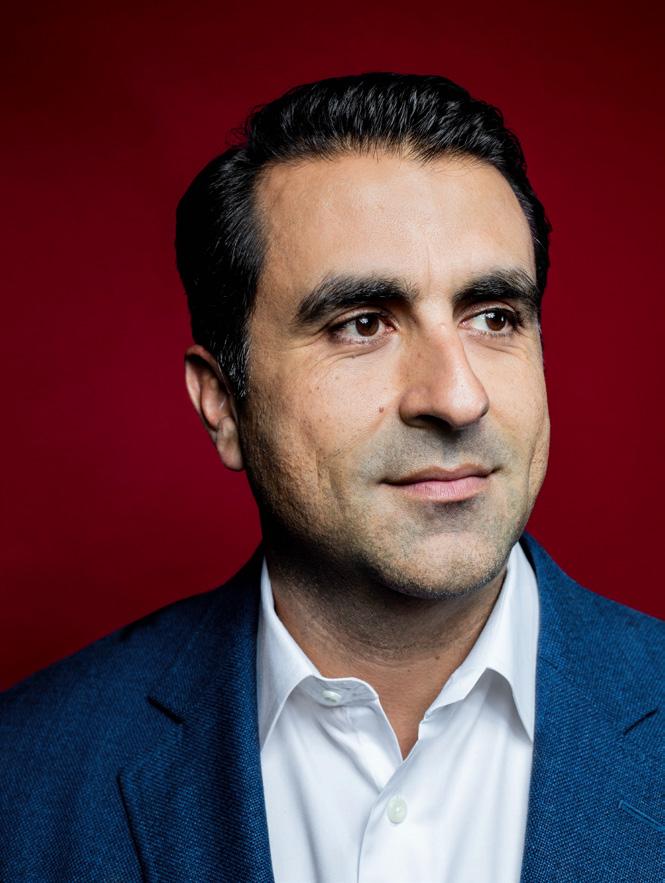
His point was that the Latino demographic, with an average age of twenty-nine, is rapidly changing the labor demographic in this country, adding to the workforce in droves, helping to grow the GDP, and not only contributing to social security but also helping keep it solvent for the benefit of an older (and whiter) America. Victor rightfully believes it’s high time for the “movers and shakers” of the mainstream economy to step into reality and “get with the [Latino] program.” If not, they’ll risk missing out on the greatest economic opportunity of a lifetime. (Imagine it as something akin to an investor actively ignoring California’s mining industry in 1849, or one purpose-
fully declining to buy stock in Amazon for $18 a share when it went public in 1997.)
In other words, the Latino community is a force to be reckoned with.
As I sit here writing this letter just a few months prior to the end of 2020—one of the most tumultuous years of this country's lifetime—a different reckoning is happening. And it's a reckoning that is impacting our community disproportionately. It’s a force that aims to cripple the ability of the Latino demographic—the engine of our American economy—to remain that vibrant force driving sustainable, macro-level economic growth. I’m talking about the COVID-19 pandemic and its impact on our gente.
Healthcare has never been more important for us to consider as a cause. And with COVID-19, the chickens are coming home to roost. Historic delays, indecision, and outright ineffectiveness on issues including access to healthcare for immigrant communities, labor rights for farm and frontline workers, access to healthy food options for Latinos, and the availability of Wi-Fi for remote learning— while having the job flexibility, space, and language accessibility required to educate children from home —have
GILLIAN FRY
6 A Letter from the Publisher
placed our community in unique jeopardy. The list of issues and problems our nation is facing seems infitite.
The Latino community is at the heart of this crisis. Since the pandemic hit, I have seen report after report detailing the disproportional impact of COVID-19 on communities of color, including Latino communities. Some of our obstacles were created inadvertently, others intentionally. But no matter the cause, the result is the same: community-wide disparities and disservices that demand radical change.
For the clerks, waiters, and nurses who keep showing up to work day after day, exposure is not their only worry. Many of those working on the front lines are more susceptible to the virus due to underlying health conditions like diabetes and heart disease— conditions that have been linked to diet and conditions that statistically affect Latinos more severely than other populations.
Those of us in the business community cannot ignore these issues.
We are not separate from the greater Latino community. We may not be on the front lines, but we employ frontline workers, have family who are working on the front lines, or manage a team that deals with the benefits of frontline workers. While we may not personally be at a greater risk of contracting the virus, none of us are immune.
And none of us are unaffected. As CEOs and VPs, presidents and directors, we all have to contend with the physical and financial disparities impacting both our loved ones and our professional communities. And as the Latino business leadership of this community and of this American economy, we must. It’s an
outcome of our collective job description. It’s our responsibility.
Like Carlos Soto (p.108), we must reckon with the fact that not all of our people can stay home and be protected during this crisis. We have to watch as our team members “[come] to work having to manage their fears.” And we have to continually push ourselves to find more and better ways to support those individuals throughout the pandemic.
Like Laura Morales Garcia and Edwin Millan (p.118), who pay witness to our nation’s systemic gaps in care every day in their work for the AIDS Healthcare Foundation, we must live with the knowledge that our brothers and sisters in the Latino community who are “afraid to seek medical advice or attention” may not receive the care they deserve if affected by the coronavirus.
And like Javier Oroz (p.22), we must recognize “this is not a one-man show.” We must bolster our teams, seek out the tools and resources our people need in order to adapt, call on old allies and establish new ones, and do everything in our power to ensure that no one faces this crisis alone.
Of course, these are just three examples of Latinos leading in the area of health and wellness. As Victor noted—and countless studies and reports have confirmed—the Latino community is indeed coming to America’s rescue: a great majority of the unsung heroes on the ground risking it all are members of our Latino family.
That is the type of rescue that we need, one in which the hero courageously gallops into the frame to help a nation that is desperate for good news. For that comeback narrative. Because Latinos, like the rest of America, love a Hollywood ending.
A NOTE ON THE COVER
As some of you may know, in a previous life ages ago I fancied myself an artist, so much so that I pursued an MFA in painting at the School of the Art Institute of Chicago. It therefore brings me great excitement to introduce to you all our first artistcommissioned cover, illustrated by Carlos Zamora. Typically, we highlight excecutives or individuals on the cover. But for this complicated and important theme of healthcare and wellness, we wanted to introduce a designfocused cover while also elevating a Latino illustrator. Hope you enjoy.
7 Hispanic Executive
Masthead
Featured Artist
Our first-ever artist-commissioned cover showcases the illustrations of Carlos Zamora, a Cuban American artist whose work has been featured in the Wall Street Journal, the National Law Journal, the Boston Globe, and other top publications. To see more of his work, visit carloszamora.com.
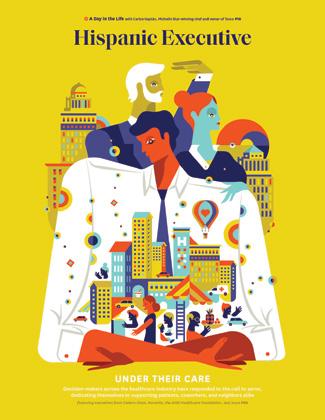
Creative
Director, Editorial
Kevin Warwick
Managing Editor
Sara Deeter
Senior Editor
Frannie Sprouls
Editors
Melaina K. de la Cruz
KC Esper
Hana Yoo
Staff Writer
Billy Yost
Contributors
Zach Baliva
Cora Berg
Peter Fabris
Will Grant
Julian King
Russ Klettke
Keith Loria
Roman Navarrette
Bridgett Novak
Corporate
CEO & Publisher
Pedro A. Guerrero
Chief of Staff
Jaclyn Gaughan
President, Group Publisher
Kyle Evangelista
VP, Hispanic Division

Head of Audience & Engagement
Vianni Lubus
VP, Finance
David Martinez
Director, Client Services
Cheyenne Eiswald
Senior Client Services Manager
Rebekah Pappas
Client Services Manager
Brooke Rigert
Director, Talent Acquisition
Elyse Schultz
Hispanic Executive® is a registered trademark of Guerrero, LLC

©2021 Guerrero, LLC. guerreromedia.com
770 N. Halsted, Unit 307 Chicago, IL 60642
Facebook: @hispanicexecutive
LinkedIn: @hispanic-executive
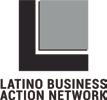
Twitter: @HispanicExecMag
Instagram: @hispanicexecmag
Reprints
Reprinting of articles is prohibited without permission of Guerrero, LLC. Printed in China. For reprint information, contact Reprints & Circulation Director Stacy Kraft at stacy@guerreromedia.com.
Lior Phillips
Sara Verdi
Zayvelle Williamson
Stephanie Zeilenga
Designer
Elena Bragg
Photo Editors & Staff Photographers
Cass Davis
Gillian Fry
Senior Talent
Acquisition Manager
Haylee Himel
Director, Strategic Partnerships & Accounts
Krista Horbenko
Senior Events Manager
Jill Ortiz
Senior Director, Sales



Ben Julia
Director, Sales Training & Development
Alexa Johnson
Content & Advertising Managers
James Ainscough
Allyssa Bujdoso
Angel Camuy
Justin Davidson
Soledad Granados
Nicole Haas
Ashley Parish
Angela Reeves
Miriam Torres
Jenny Vetokhin
Industry Partners
Hispanic Executive is published quarterly by Guerrero, LLC. To subscribe, visit www.hispanicexecutive.com/subscribe. For editorial consideration, please email info@hispanicexecutive.com. By submitting a letter, you agree to let us use it, as well as your full name, city, and state, in our magazine and/or on our website. We may edit for clarity. Hispanic Executive, 770 N. Halsted Unit 307, Chicago, IL 60642, (312) 447-2370.
8
Written















































by You, Published by Us



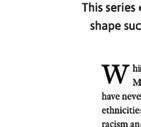

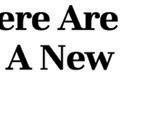


Hispanic Executive’s new Publisher’s Circle is a digital-only platform for selected leaders to share their thought leadership through high-quality content. As a contributor to the Publisher’s Circle, you will have the privilege of broadcasting your insights and expertise with both your peers and a readership that is at the forefront of Latino advancement in American business. Let us help you advance your leadership and become an authority.


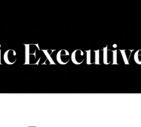
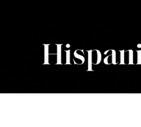

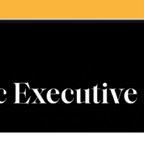
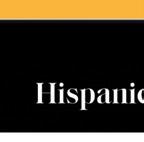
our collective resources
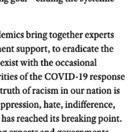



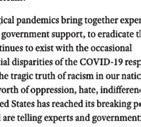








—Jeff Marquez, Publisher’s Circle Contributor, “The Crisis Life Cycle: Part




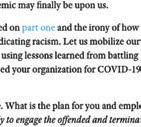
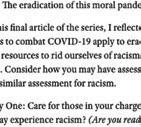
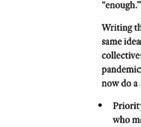
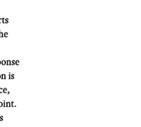
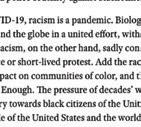
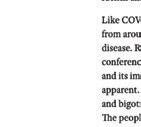
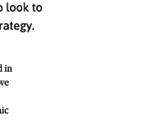
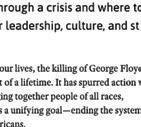
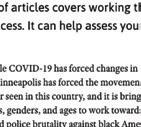
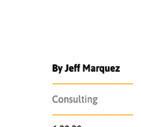

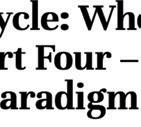






“Let us mobilize
to rid ourselves of racism using lessons learned from battling the pandemic.”
Four”
“We may be overwhelmed by the convergence of multiple crises, or unsure of exactly what to do, and that’s OK. What it means, though, is that you have to ask a lot of hard questions and not pretend to have the answers.”
Interested in sharing your insights via the Publisher’s
on
us at info@hispanicexecutive.com.
—Javier Saade, Publisher’s Circle Contributor, “The Time Is Now. The Year Is 2020.”
Circle
hispanicexecutive.com? Contact
CHEF CARLOS GAYTÁN of
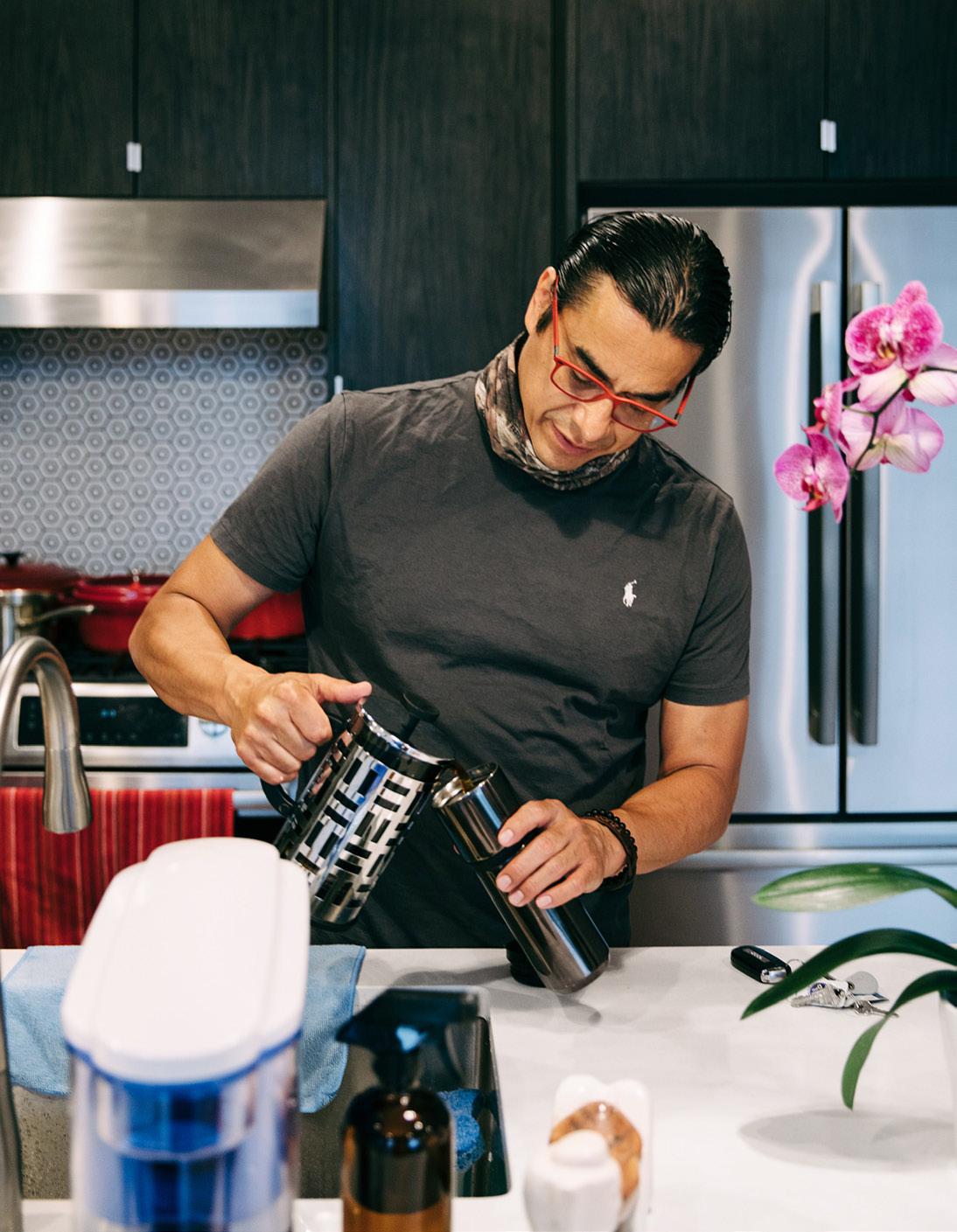
8:15A.M.
Photographer Sandy Noto followed Tzuco’s Executive Chef and Owner Carlos Gaytán around his adopted hometown of Chicago. The first Mexican chef to earn a Michelin Star and a former Top Chef contestant, Gaytán is determined to serve delicious, authentic food to everyone in the Chicago community—no matter their circumstances.
10 A Day in the Life
Gaytán charges up with French press coffee before heading to his restaurant Tzuco, located in Chicago’s Gold Coast neighborhood.
9:00A.M.
Gaytán looks through and confirms the list of ingredients he needs to purchase for the restaurant before it opens.
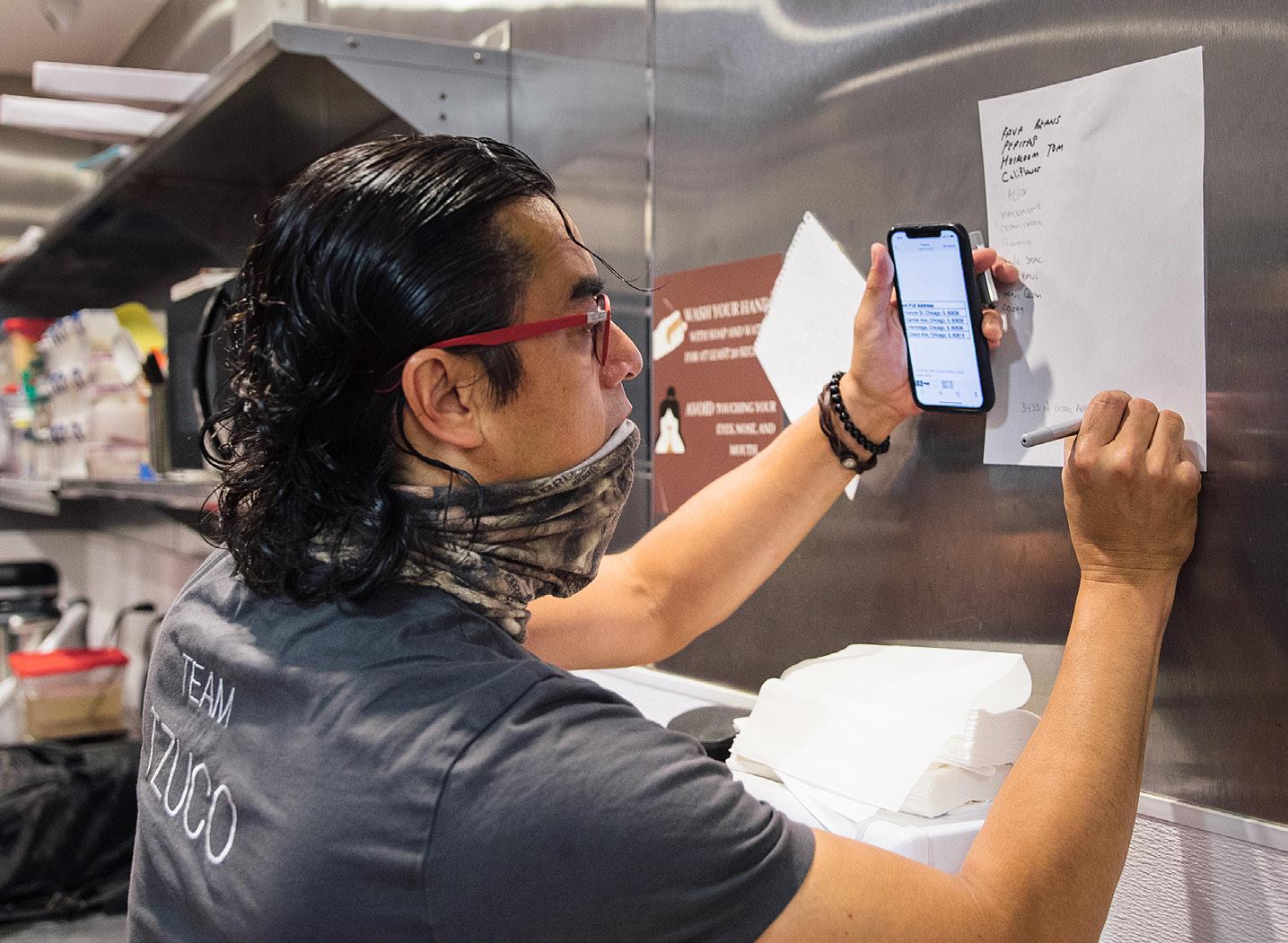
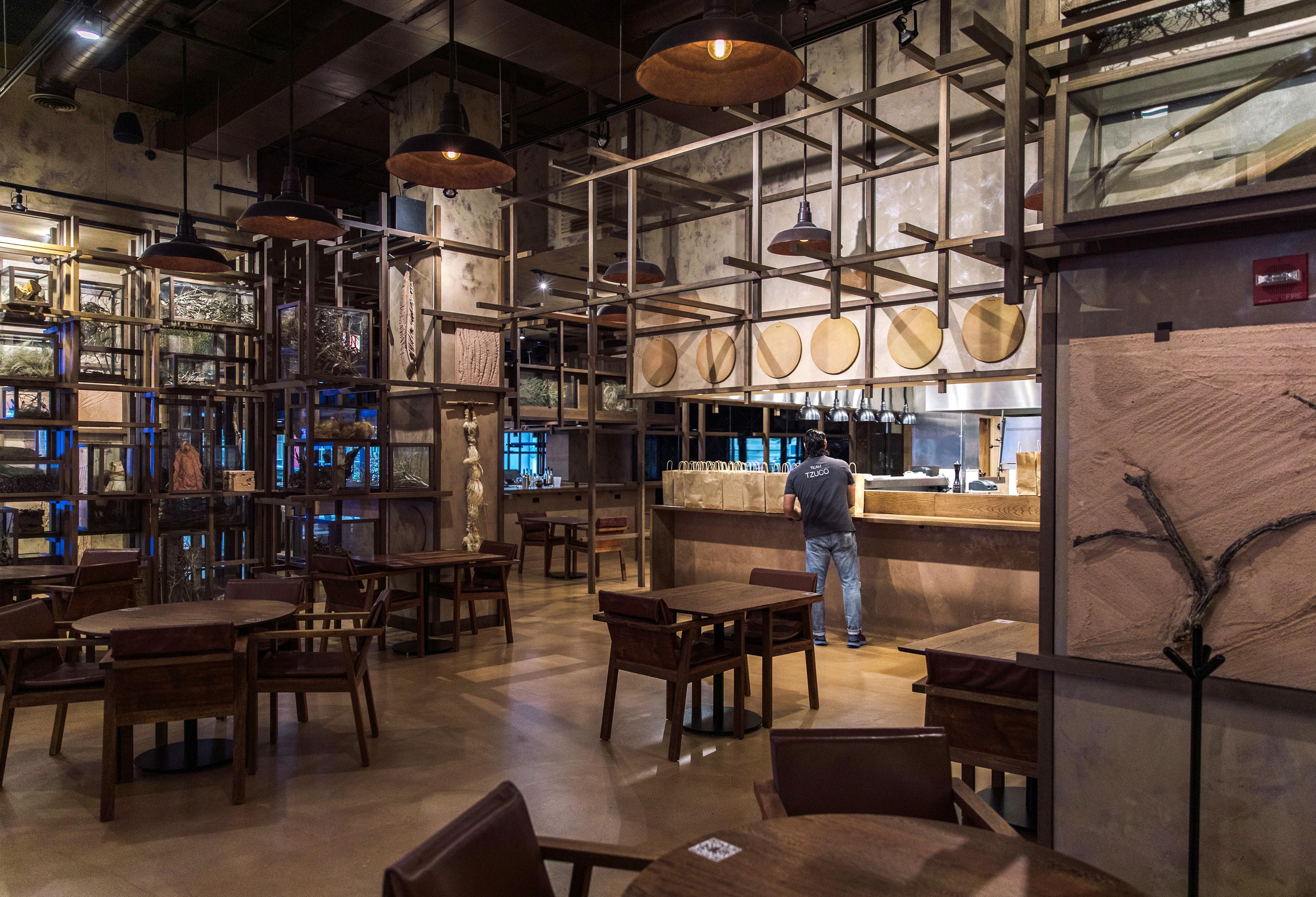
9:30A.M.
Good food is for everyone. Throughout the COVID-19 pandemic, Gaytán has been spending his mornings prepping and packing meals for donation through the World Central Kitchen (WCK). By July 2020, more than nineteen million fresh meals had been prepared by chefs like Gaytán and distributed to communities in need by the WCK.
11
Hispanic Executive
10:00A.M.
On the move! Gaytán stops by Whole Foods to pick up some beets, tomatoes, and other fresh produce for the restaurant.

11:00A.M.
Gaytán arranges for the drop-off of the various meal packages he put together for the World Central Kitchen.

11:55A.M.

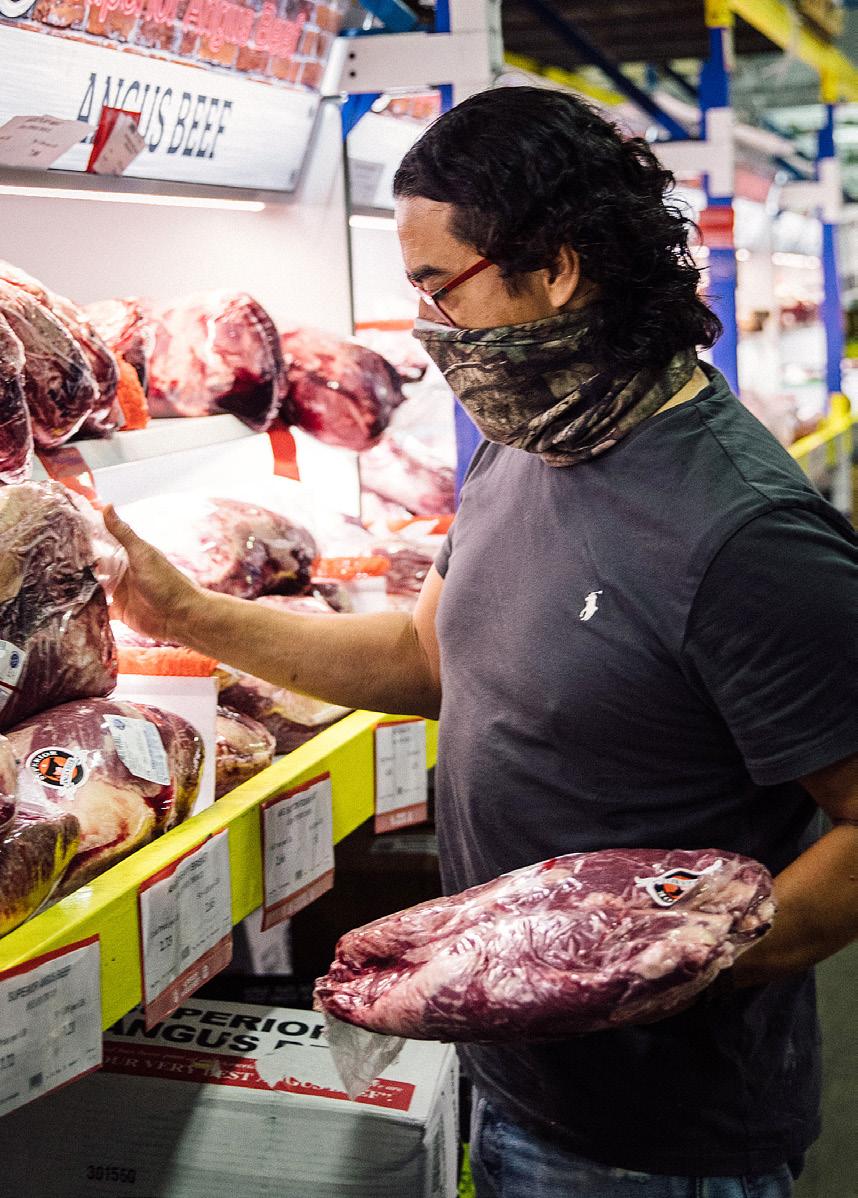
1:33P.M.
“Homework time,” as Gaytán puts it, is filled with emails and other computer work critical to the restaurant’s operations.
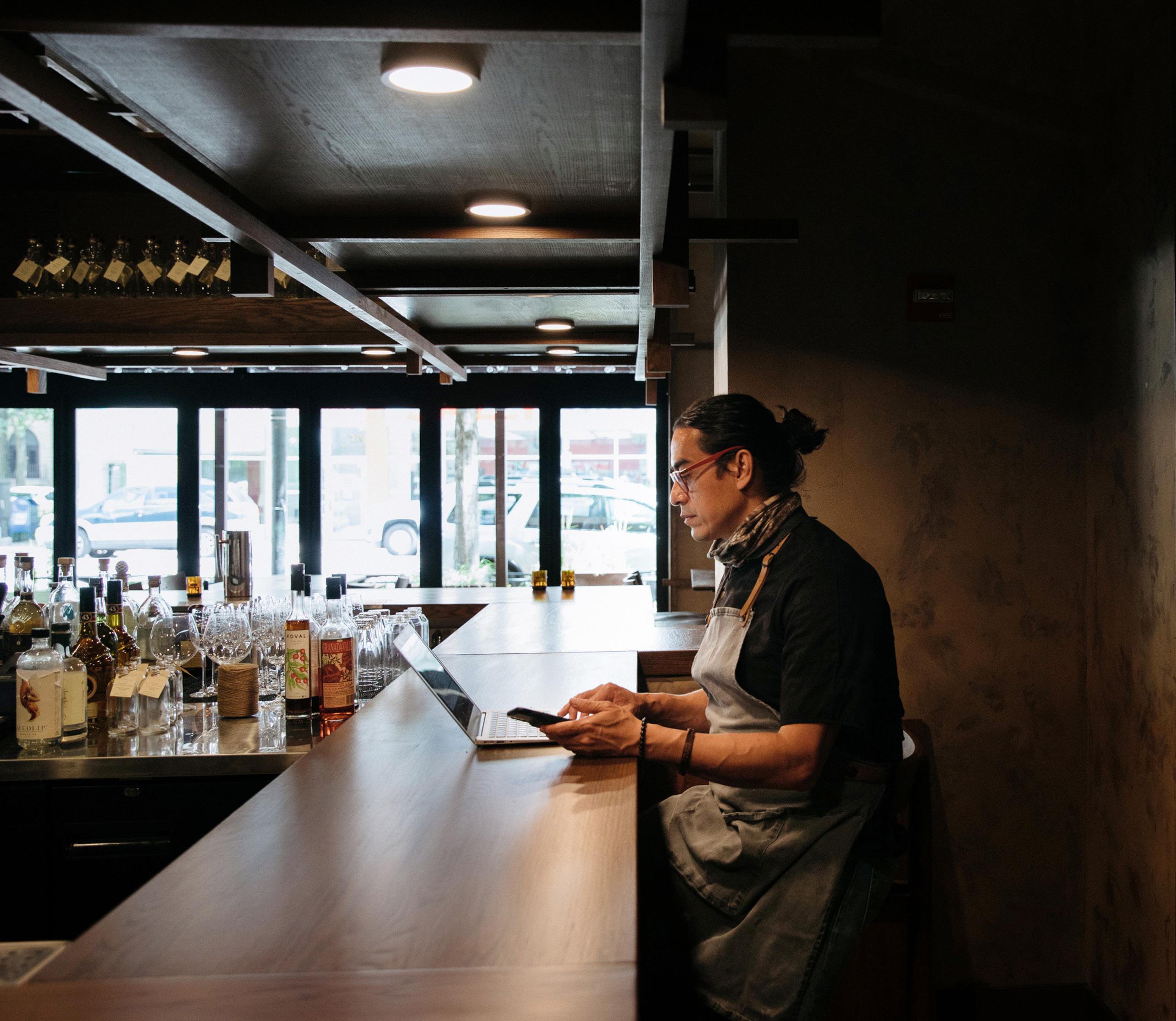 Gaytán drops by the local restaurant depot to pick up sugar, mascarpone, meat, and other ingredients that he and his team need at Tzuco.
Gaytán drops by the local restaurant depot to pick up sugar, mascarpone, meat, and other ingredients that he and his team need at Tzuco.
13 Hispanic Executive
2:00P.M.
Tzuco’s business day begins in earnest, as Gaytán and his staff begin prepping the various appetizers, entrees, and desserts that have earned the restaurant rave reviews from community members and critics alike.

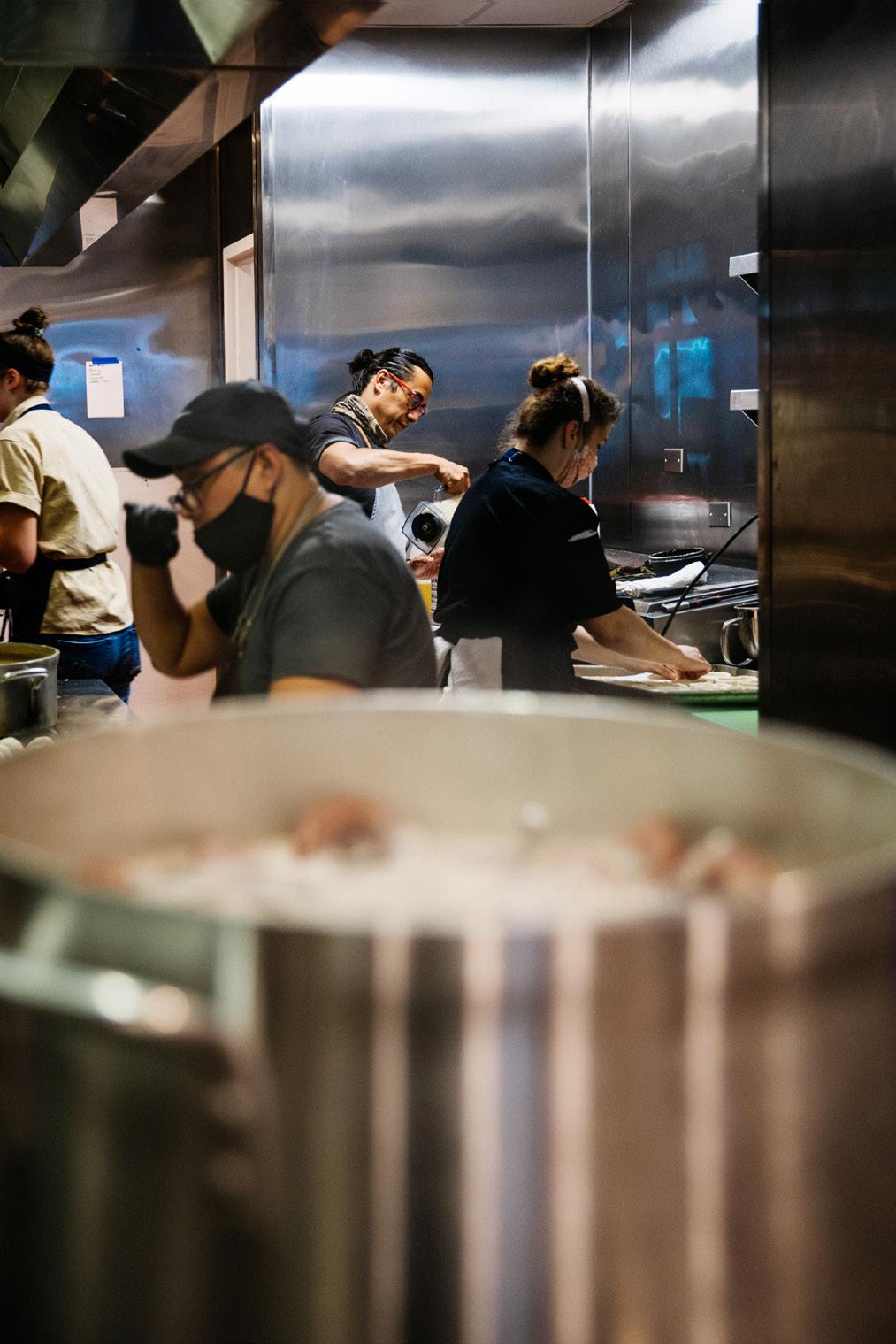
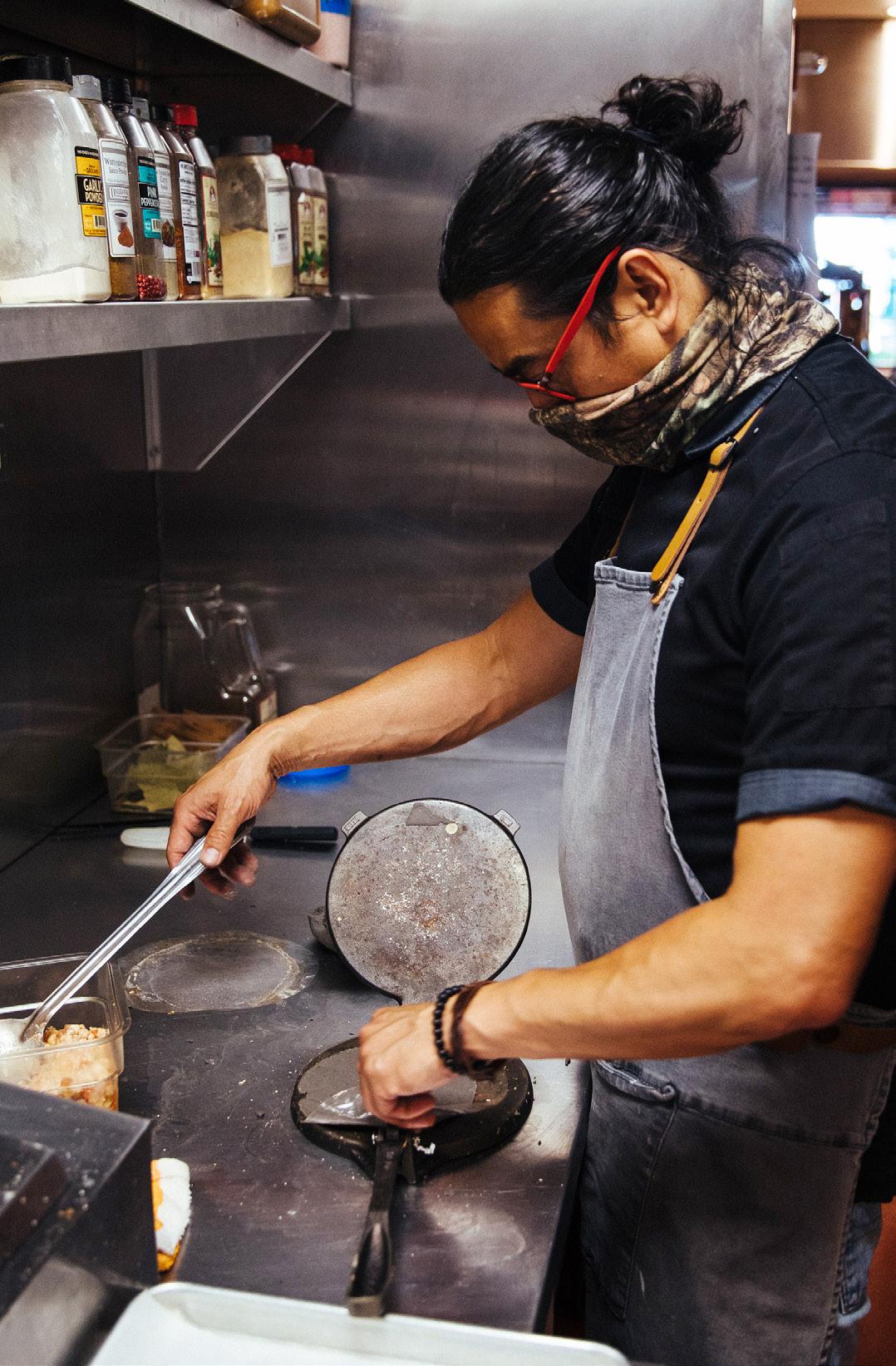
2:30P.M.
3:45P.M.
Gaytán scoops out a spicy filling of fish, tomato, onion, garlic, and thyme, which is stuffed between two squid ink tortillas as a “pescadilla.”
14 A Day in the Life
A fresh octopus sits on a kitchen tray, waiting to be transformed into one of Tzuco’s famous dishes.
4:00P.M.
Like any team leader, Gaytán ensures that his team members have what they need to succeed. Throughout the restaurant’s prep period, he can be seen sharpening knives, sweeping floors, and (as seen here) organizing the kitchen’s many trays of food to ensure an efficient workflow.
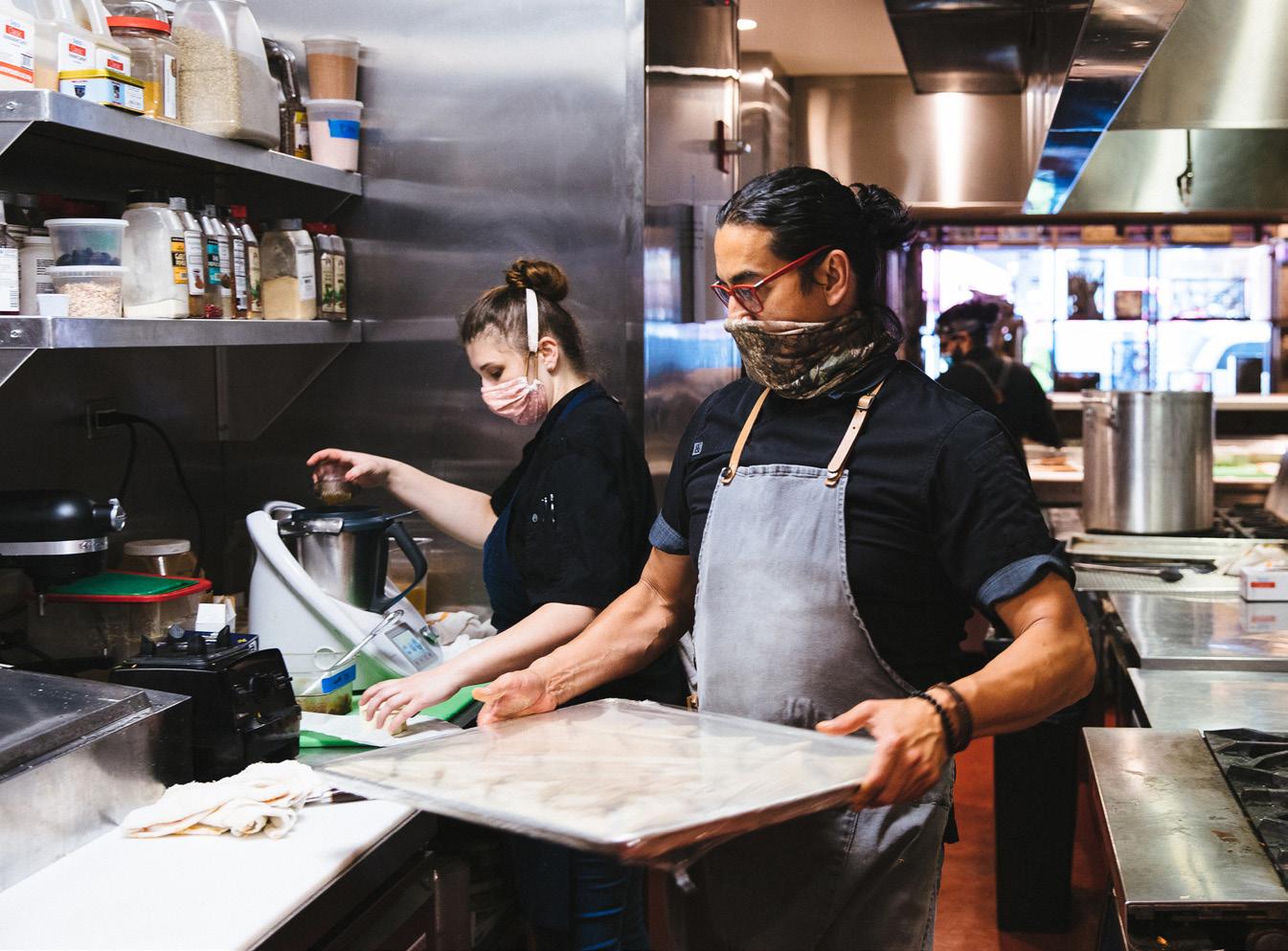
4:15P.M.
Tzuco is officially open for business! Gaytán and his team wait for the first customers to arrive. They have arranged for social distancing measures for all diners, so some customers will eat outside while others will dine indoors at carefully distanced tables.

15 Hispanic Executive
Recommended Resources
Times of crisis require great strength in leadership—but they also require a robust tool kit of practical and actionable resources. Here are some of the resources our executives have found most useful during the COVID-19 pandemic:

“One article that my colleagues and I shared during the onset of the pandemic is ‘The Big Reset: Making Sense of the Coronavirus Crisis’ by Josh Bersin. The article put a positive spin on events and made clear that we needed to change our mindset and look at events as an opportunity . . . to rethink how we engage with family, colleagues, and customers.

“Second, I tell myself and my attorneys and other colleagues over and over again,
“‘These are different times, so we cannot hold ourselves to the same pre-COVID standards. Be kind to yourself and to others; we are all struggling in one way or another, and if anyone tells you otherwise, they are not being honest with you or themselves.’”
PAUL ZALEWSKI (LAZALA)
I have actively leveraged my Forrester membership. They have been an excellent partner in sharing latest trends in healthcare, digital, and overall best practices, in addition to setting up forums with key leaders in my industry and with other analyst experts for call center technology.”
—VIRGINIA LAZALA, NOVARTIS PHARMACEUTICALS, P105
16 Hispanic Executive
—PETER PEREZ, HIGHMARK INC., P113
Evolve
Adapting
17 Hispanic Executive
to the COVID-19 pandemic has required bold thinking, innovative problem-solving, and visionary leadership 18 Yvonne Garcia, State Street 22 Javier Oroz, AXA Mexico
Illustrations by Carlos Zamora
Inform With Empathy and Strategy
BY PETER FABRIS
In times of trouble and in times of calm, State Street’s chairman and CEO relies on Yvonne Garcia to engage senior leaders and cascade key messages throughout the organization
18 Evolve
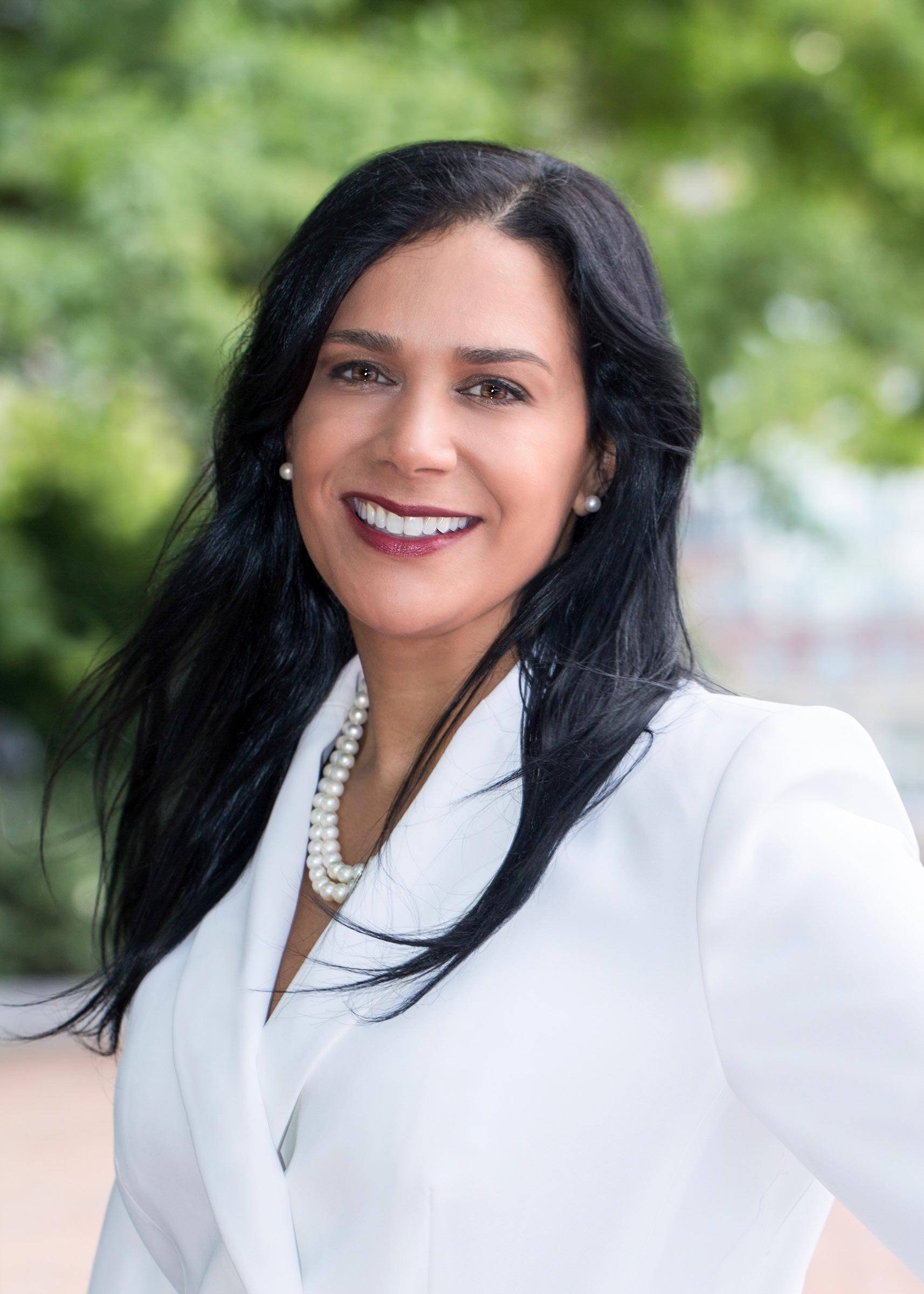
NICHOLE FREDRIKSEN 19
Executive
Yvonne Garcia Chief of Staff State Street
Hispanic
That’s doubly true for financial services firm State Street, which provides critical services to the financial services industry.
Yvonne Garcia, the chief of staff to State Street’s Chairman and CEO Ron O’Hanley, is the point person for engaging senior leaders based on the company’s most strategic priorities. She ensures that key messages, including the CEO’s, are clearly and concisely cascaded through the organization. And her personal and professional skills and competencies have never been tested quite the way they’ve been during the coronavirus pandemic.
Before joining State Street, Garcia served in a variety of marketing leadership roles, including a stint in China with Bank of America, while also leading the Association of Latino Professionals for America (ALPFA) as national chairwoman. The COVID-19 crisis struck a little more than a year into Garcia’s tenure as State Street’s first chief of staff to the CEO. One of her top duties in this role is to “act as a point of triage” for the CEO and other C-suite leaders to maximize productivity and impact across the enterprise.
When the crisis hit, one of State Street’s first priorities was to develop policies and procedures to shift operations in a way that would allow most of the company to work from home. “As a global company, we are accustomed to virtual connections, but have never experienced a 90 percent remote workforce,” Garcia says. “As such, it became my priority to find ways to keep employees informed and engaged while enabling their ability to be productive and remain safe.”
As the pandemic spread, some countries experienced the worst of the crisis while other areas were initially unaffected. As China headed back to work, the US started its lockdown. Italy and the tristate area saw a peak in their death tolls. And because State Street is a global
company operating in twenty-six countries, each of its locations called for a unique approach. Garcia, who heads internal communications in addition to her chief of staff duties, drove a strategy for communications that ensured messages were segmented, relevant, empathetic, and, most of all, intentional.
But empathy isn’t the only hallmark of the firm’s response. In such times, Garcia points out, communication is one of the most critical priorities of any organization. Collaborating with human resources, real estate, marketing, operations, and global security, Garcia and her internal communications team uses every tool available—email, videoconferencing via multiple platforms, web-based documents, and video tutorials—to disseminate information. “In a time like this, I would rather run the risk of overcommunicating than not communicate enough,” Garcia emphasizes.
To succeed as chief of staff to O’Hanley, Garcia must thoroughly understand the goals and strategic direction he has set. “I study every word he says, and every idea,” Garcia says. She is part of all leadership team meetings and pores over O’Hanley’s speeches and other forms of public communication to glean insights into his mindset. “He gives me access to forums and meetings that help me understand the business enterprise-wide. Observing a global CEO lead during a crisis such as this has further prepared me to achieve my goal of becoming a CEO in my own right,” Garcia says.
One message from the top is to remain focused on long-term strategic goals amid the uncertainties brought on by the pandemic. “A large part of the time is being spent on how to run the company during the COVID-19 crisis, but he [O’Hanley] still maintains focus on delivering exceptional client service, including brainstorming on how we can
20 Evolve
In times of crisis such as the global COVID-19 pandemic, close alignment among top decisionmakers and clear communication with employees are essential for an organization to succeed.
help support clients’ operating models to help them better weather the current crisis,” Garcia observes.




According to Garcia, one of the firm’s most important goals is its aim to represent, embrace, and celebrate employees of all backgrounds. Garcia herself is a constant champion of diversity in the corporate environment and strives to ensure that messages from O’Hanley are culturally relevant to employees at all State Street outposts. She also speaks regularly at many community and industry forums, calling for and celebrating diversity in the workplace.
Renowned for her efforts to boost Hispanic representation in the corporate world, Garcia is now looking to branch out to more broad-ranging business leadership groups, allowing her to provide other members of the Hispanic community with access to opportunities throughout the business community where they may otherwise be underrepresented. For example, she chairs the Greater Boston Chamber of Commerce Women’s Network, which provides her with access to some of Boston’s top corporate leaders. In this role, she has also implemented diversity metrics for the first time in the Chamber’s history.
However, the highlight of her volunteer work is cofounding Milagros para Niños, an initiative at Children’s Hospital in Boston dedicated to serving the Latino community and helping children of modest means gain access to life-saving medical care.
Milagros para Niños has raised more than $10 million since its founding. “It is one of my proudest initiatives,” Garcia says. “Knowing that our efforts can have such a direct impact on the health and wellness of the children in our community is priceless. When thinking about what really matters, the miracles performed by Milagros para Niños— and first responders everywhere—exemplify true leadership in action.”
21 Hispanic Executive
The broader our perspective, the more we can accomplish.
Spectrum congratulates Yvonne Garcia for advancing diversity and inclusion in her field and beyond.
Spectrum congratulates Yvonne Garcia for her accomplishments in advancing diversity and inclusion. Yvonne’s participation in our External Diversity and Inclusion Council helps Spectrum, a leading broadband connectivity company, make a meaningful difference for our customers, company, and communities. Thank you, Yvonne!
“In a time like this, I would rather run the risk of overcommunicating than not communicate enough.”
Strong Teams Triumph
BY WILL GRANT
Javier Oroz on his award-winning team at AXA Mexico and the key role that team has played in enabling the company to combat the COVID-19 pandemic
JAVIER OROZ IS EMPHATIC THAT WITHOUT A great team, nothing can be accomplished. And the current chief risk officer and general secretary at AXA Mexico has the hardware to back up his philosophy. His team was deemed the 2020 “Best In-House Litigation Team” for Latin America by Lexology and the Association of Corporate Counsel and was also recognized by the Legal 500 for its performance as one of the best teams in the country.
Oroz himself has been recognized several times in the past half-decade, including a “General Counsel of the Year” award by the Latin America Corporate Counsel Association, a “Corporate Social Responsibility Lawyer of the Year” award by Chambers and Partners, and several nominations from the most respected international legal associations.
Together, Oroz and his team have helped global insurance firm AXA stay at the top of its game—no matter what has come their way.
Oroz came to AXA after a short period with ING, where he served first as a legal manager and later as legal coordinator and deputy legal director. At twentyfive, Oroz became the youngest legal manager at the company. He was appointed as the head of litigation at twenty-nine after ING was purchased by AXA, and by the time he was thirty-one, Oroz was AXA’s youngest general counsel.
Over the years, Oroz has become so versatile in different aspects of the law, and of the company in general, that AXA has conferred different roles on him. In addition to transforming the company’s compliance program, through which Oroz has encouraged AXA
22 Evolve
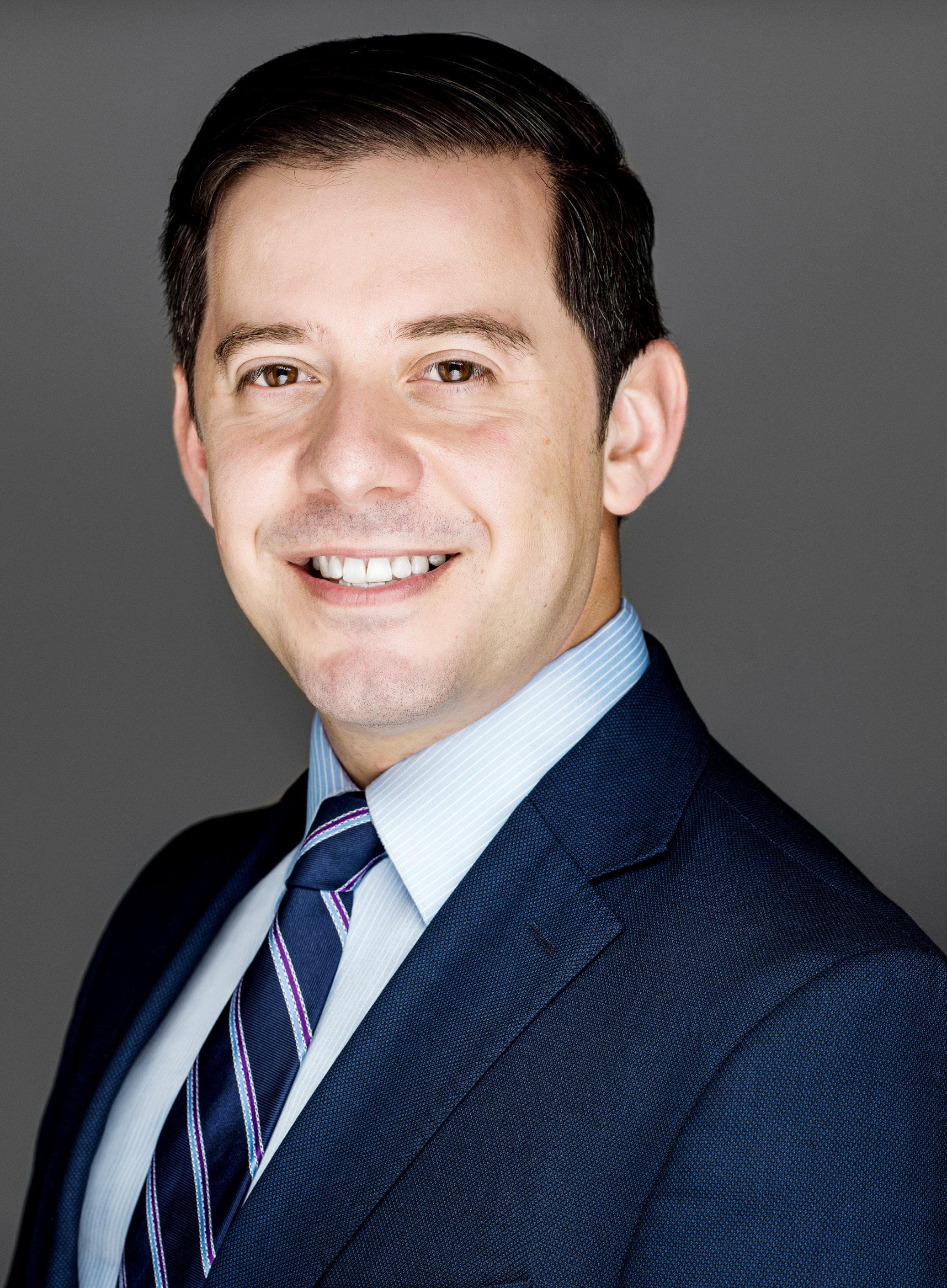
COURTESY OF AXA 23 Hispanic Executive
Javier Oroz Chief Risk Officer and General Secretary AXA Mexico
lawyers to take on this relevant career path (anti-bribery, anti-money laundering, and anti-corruption), Oroz has taken on new responsibilities in his role as chief risk officer (CRO) and general secretary. In this role, the attorney is in charge of the legal department, customer complaints, crisis leadership, internal control, and compliance.
Oroz had held this position for just five months when the COVID-19 pandemic hit.
In his years dealing with challenging situations, the chief risk officer has seen a lot. But this pandemic, he says, is the toughest he’s seen. Typically, Oroz explains, crises last for a few hours, or maybe a couple of days. This pandemic, on the other hand, has already lasted for months, and there is no expectation of it stopping any time soon.
Thankfully, Oroz and his team were more than up to the task of meeting this challenge. “We were very ready as a team to quickly respond to this crisis,” Oroz notes. “The first time we started to meet about this crisis was in January [2020], when the crisis was just rising in Asia. When the crisis came to Europe, especially Italy and Spain, we started to increase the rate and intensity of the sessions of the crisis committee.
“So when the pandemic first arrived in Mexico,” he continues, “we were already in our best shape. Three weeks before we reached phase three of the crisis in Mexico, we were ready to protect our employees by sending them home and protect our customers by helping as many people as possible reach a healthcare professional.”
AXA has been delivering telemedicine throughout the pandemic so that insureds and employees do not have to leave their homes, Oroz says, and many customers have also been pursuing telehealth options for appointments.
While these technologies and strategies have been critical to providing care throughout the pandemic, Oroz still hopes to see more profound changes to the healthcare landscape in future.
“Mexico has very low insurance penetration,” Oroz says. “People with insurance have been able to go to private hospitals, but people without insurance go to public hospitals, and public hospitals have been very crowded.” True resilience to healthcare crises, Oroz explains, is achieved through healthcare insurance, which is why he hopes to see the nation’s insurance penetration rate increase in the days following this pandemic.
Resilience has also been critical to the success of Oroz’s team in leading through this unique crisis. A resilient team, the CRO explains, boasts a positive attitude and has a disciplined approach to dealing with the situation—and also includes team members with an array of different skills and backgrounds.
“You need to have a strong team,” Oroz emphasizes. “You need to have advisors. You need to have experts. This is not a one-man show.”
24 Evolve
Adame Gonzalez de Castilla & Besil (AGB) and its partners congratulate Javier on his impressive career and dedication to the practice of insurance law. Our law firm has had the honor of assisting AXA Seguros under Javier’s leadership and we look forward to keep accompanying Javier in his constant achievements. agb.mx
THE LEGACY SPIRIT
When Javier Oroz elected to pursue law, he left behind a family legacy dedicated to the agriculture and cattle business. He is now reconnecting with his roots through a family project—a burgeoning enterprise centered on bacanora “Santo Cuviso,” an agave-based spirit (mezcal type) that originated in his home state of Sonora in northwestern Mexico. According to Oroz, the project allows him to pay tribute to a long legacy of agave culture in both Sonora and Mexico.
“Three weeks before we reached phase three of the crisis in Mexico, we were ready to protect our employees . . . and protect our customers.”
When one’s work makes an impact in the community, it transcends employment and becomes a calling. These executives have answered their call.
Mission 26 Marisol Martinez, Charter Communications 34 Ileana Musa, Morgan Stanley 37 Alex Martinez, Yum! Brands/Pizza Hut 40 Roxanna Flores, Univision 44 Carina E. Sánchez, Public Building Commission of Chicago 48 Isabel Garcia, Piedmont Law Group 50 Anthony Arguijo, Scott Douglass & McConnico LLP 53 Rolddy Leyva, Capital One 56 Maria Fernandez, Sony Music Entertainment
MIS SION
The AllInclusive Plan
BY LIOR PHILLIPS PORTRAITS BY AUNDRE LARROW
Marisol Martinez understands the positive impact of attracting diverse talent that’s reflective of the markets and customers served by Charter Communications
26 Mission

This large and growing population drives a need to adapt marketing and sales strategies; Latino purchasing power is projected to surpass $1.7 trillion in 2020, and as the Latino population is generally younger, that market share will continue to grow. As a leading broadband connectivity company and cable operator in the United States providing internet, TV, mobile, and voice service under the Spectrum brand, Charter Communications understands the needs and desires of that market. Vice President of Multicultural Marketing Marisol Martinez has guided the company to an understanding of the burgeoning market to deliver high-quality products and services that exceed diverse customers’ expectations.
“Twenty-one percent of the households in Charter’s markets are Latino. Those households are included in what we categorize as multicultural, together forming 39 percent of households in our national footprint,” Martinez explains. In addition to recognizing the size of the Latino market, Martinez and Charter have focused on the fact that Latino households are not simply asking for a substitution of Spanish language media and customer service. “Latino households are demanding a mix of Spanish and English language content that serves multigenerational homes at reasonable pricing,” she adds.
To meet that need, Charter created the TV and internet package Mi Plan Latino and has continued to offer one of the largest lineups of Spanish language programming in the nation. The company serves twenty of the top twenty-five Hispanic television markets and offers more than eighty Spanish language channels.
28 Mission
As the 2020 US Census continues, Latino populations are expected to be reported at much higher rates. That’s especially true in states such as Texas and California, where numbers near a majority.
Marisol Martinez VP of Multicultural Marketing Charter Communications

To further meet the programming needs of bicultural and multigenerational Hispanics households, Charter is adding more English channels to Mi Plan Latino, which will offer its customers better value for the money. Charter has also partnered with rising Latino artists—like reggaeton star Ozuna and actress Gaby Espino—to act as brand ambassadors and enhance the relevance of its marketing campigns.
“We make sure that the Latino customers we attract have a positive, consistent experience, from call center support in the language of their choice to our website and our brickand-mortar Spectrum stores,” Martinez says. “Spectrum is redefining what a cable company can be. We’re working hard to earn trust, so our customers can connect to their passions, people, and content.”
While Martinez was drawn to the industry to help companies connect with clients and excel in business opportunities, the ability to do so with a positive impact on diversity was a revelation. “This was a natural aha moment, given my innate connection to and pride in my Dominican heritage and my commitment to diversity—not just for Hispanics but all ethnicities and races,” she says.
“Very few US companies will achieve sustainable growth until they have multicultural marketing embedded within the fabric of every department of their company, and importantly, are led by experts who truly understand how to develop culturally relevant strategies and are fully accountable for the bottom line,” Martinez continues. “This is the operating model at Charter, which is why I decided to join the company. While my team leads all the strategies and execution of our programs, we work in close collaboration with all cross-functional teams to bring the initiatives to fruition, and this support is crucial for success.”
Of course, none of that would be possible without the entire company’s engagement in its diversity and inclusion efforts. CEO Tom Rutledge and Chief Marketing Officer Jon Hargis have stood as essential partners in Charter’s commitment to D&I, through policies and practices implemented across the company. The very existence of Martinez’s team shows how deep that commitment runs.
“Our multicultural marketing team is an example of what Charter strives for across the company: to attract and retain the best talent in the industry, reflecting the diversity

30 Mission
Marisol Martinez with her team: (left to right) Jose Arriola, Ofelia Morera, Julio Chavarria, and Madhvi Gupta.
Salud to the marketers who ignite the Multicultural imperative
Who know that Multiculturals are where their business growth lies, not just in the future but now. Who get they will drive all population, education, HH formation and job growth, and just how. Who invest in Multicultural marketing aligned to the opportunity and impact on mainstream. Who inspire by always outdoing their prior best, build solid teams and fulfill their dream. Who drive the proper attention to analytics, strategy and communication across the 5 Ps. Who delve into the segment complexities and the true cultural insights that are key. Who fuel digital, social, and mobile as the engine of the modern marketing age. Who solve any challenge given and create measurable campaigns that engage. Who fight for representation in the company, the board room and full range. Who catalyze others to embrace diversity and to advance social change. Who show how the services offered empower their everyday lives. Who push for diversity at all levels, and encouraged to thrive. Who stand up for ethnicities being authentically portrayed. Who exemplify how multi-talented multitaskers are made. Who maximize squeezing the value out of every penny. Who coalesce the staff, agency, partners, and many. Who support the causes like education and health. Who work to create excellence, not for wealth. Who champion Black and Brown lives matter. Who seed the actively anti-racist chatter. Who are the leaders striving for better.
Marisol Martinez, her team, in partnership with us, blaze the trail.
to Marisol
APARTNERSHIP

of our customers and markets,” she says. “We also work with minority- and women-owned-and-operated agencies, including our main agency, Infusion by Castells, who manages all our Hispanic and African American work. We find that contracting with such diverse suppliers allows us to leverage their insights, talents, and strong cultural fluency toward reaching multicultural audiences more effectively.”
Martinez’s commitment to meeting the unique needs of every individual customer stems in part from her parents. Her father, who had a tailor shop in the Dominican Republic, taught her the value of a solid work ethic, self-discipline, and commitment to excellence as he preached that every suit needed to meet the specific needs and body of each customer. Meanwhile, her nurturing mother challenged her to excel at every opportunity. “This drove me even more to stay focused and overcome any obstacles,” Martinez says. “I got my master’s at Columbia University, provided for my son as well as my parents, and embarked on an infinitely fulfilling marketing career.”
Forty-seven percent of Charter’s workforce consists of people of color, drawn from different backgrounds, life and professional experiences, and ways of thinking. More than ensuring a spectrum of races, ethnicities, and backgrounds are represented in the workforce, Charter’s culture is centered on inclusion, confirming employees feel their perspectives are valued. “Without true inclusion, you can’t tap into the benefits of diversity,” Martinez says.
Her team experiences this in the access they have to the CMO and other senior executives. Within her own team, one of the ways Martinez practices inclusion is by leaving her door open and encouraging every team member to bring their ideas to the table. “As a result, we have great team dynamics and strong collaboration,” she explains. “On occasion, we’ll even get together on the weekend for brunch and end up talking shop, brainstorming ideas on how to tackle the latest business challenge.”
This deeply ingrained focus is already showing results. Charter’s response rates, sales, and customer base have continued to grow among multicultural households. In the Latino market specifically, Mi Plan Latino has been a major driver of subscriber growth. “We’ve had successful years with positive year-on-year growth in the Hispanic
Our heartfelt
congratulations
Martinez for recognition of her outstanding work in multicultural marketing.
It is our privilege to work with Marisol and the team at CHARTER COMMUNICATIONS.
market, our largest multicultural market segment, and added more focus on African American, Asian, and international marketing,” Martinez says. “My team has expanded, and our organizational structure has changed to optimize our key growth opportunities.”

Some of those opportunities include expanding mobile, video, and digital marketing, developing streaming packages for a variety of Asian audiences and languages, creating enhanced Hispanic package offerings, and introducing Spectrum Mobile. Martinez recognizes that these opportunities can only be driven forward by an equally diverse and empowered team.

“We firmly believe that people are our competitive advantage. I pride myself on hiring a diverse team of the most qualified, smartest people,” Martinez explains. “After all, great leaders succeed when they surround themselves with passionate people who not only perform above expectations but also push their leaders to continuously reflect and grow.”
The RR Donnelley Team: Marisol possesses something most business leaders (and brands) would be envious of: a marketing perspective that’s inherently holistic. Her uncanny ability to identify and balance universal insights with unique cultural subtleties continues to drive Charter Communications forward. She is creating relevant multicultural marketing that truly resonates. It’s inspiring to watch.
RRD is proud and honored to be a partner as you lead Charter Communications on a transformational journey to grow its multicultural audience. May you never stop amazing us with the work you do. rrd.com
33 Hispanic Executive
Your authentic, innovative leadership is a driving force in Multicultural Marketing.
Keeping the customer front and center, every step of the way
MARISOL,
THE WORLD HAS TAKEN NOTICE.
“We firmly believe that people are our competitive advantage. I pride myself on hiring a diverse team of the most qualified, smartest people.”
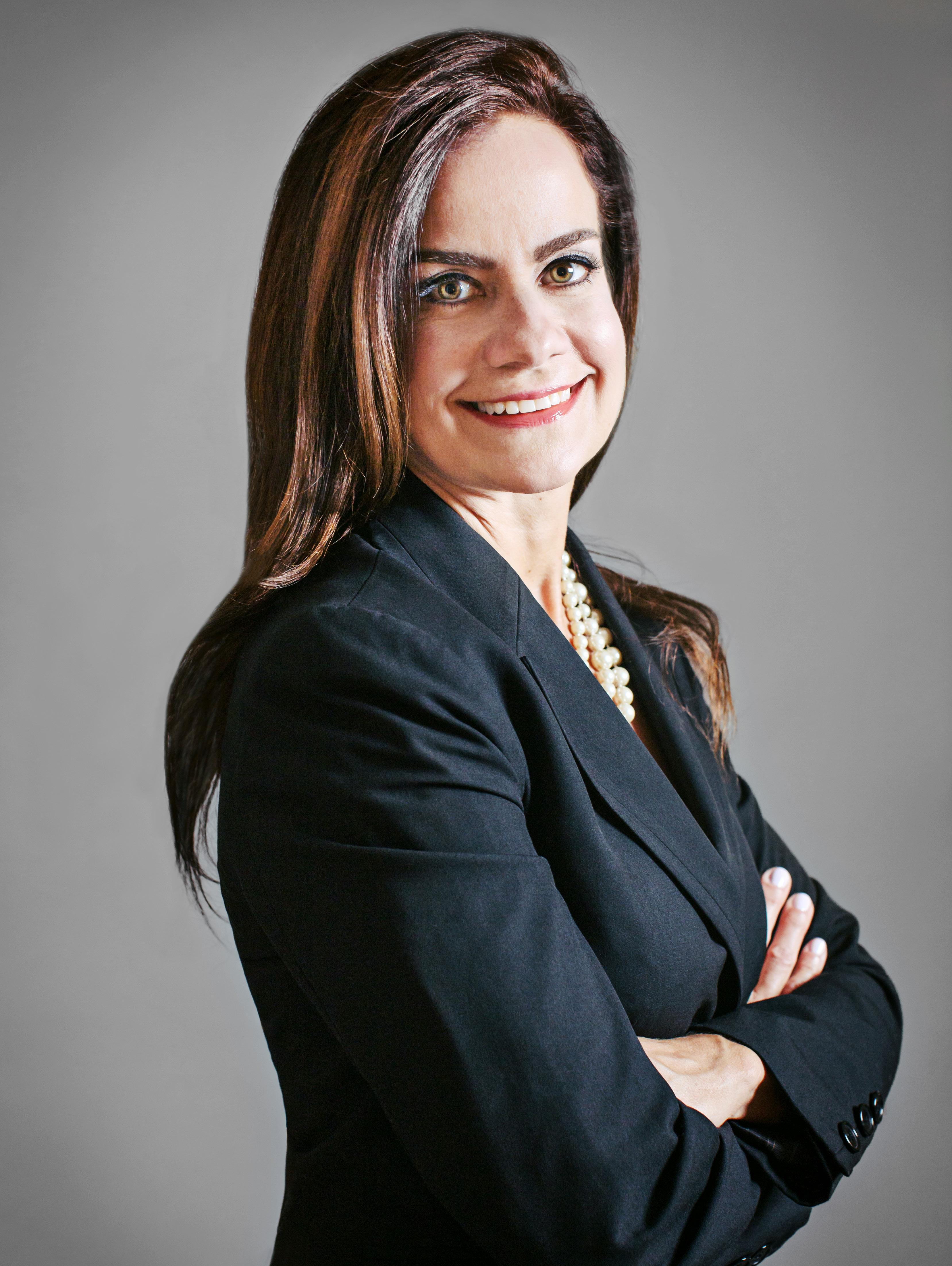 Ileana Musa
Cohead of International Wealth Management and Head of International Banking & Lending
Ileana Musa
Cohead of International Wealth Management and Head of International Banking & Lending
34 Mission
Morgan Stanley ROBERT CURTIS
Morgan Stanley’s Ileana Musa wants to help Latinos build more than a life—she wants to help them build a legacy
Half the Time
BY BILLY YOST
LIKE SO MANY CUBAN REFUGEES, ILEANA MUSA has a story of coming to and growing up in the United States that’s about the struggle and survival needed not to attain the wealth and wonders of the American Dream but to achieve a foundation from which to build. Musa’s story is captivating, heartbreaking, and inspiring in ways that aren’t pertinent solely to the Latinx community but to anyone who has ever felt like the odds may be stacked against them—and still found a way to overcome them.
Still, the cohead of international wealth management and head of international banking and lending at Morgan Stanley doesn’t spend much time talking about the hardship she faced. Musa spends almost the entire interview explaining her journey—and others like hers—as a template for Latinos to attain financial independence, equity, and the capacity to help everyone around them.
And this is not just a hope: it’s a reality that Musa has begun to see come to life during her tenure at Morgan Stanley, both through her work for the bank and through its participation in efforts supporting the betterment of the entire US Latino population. “I always say that we will have gotten it right when the next generation can do what we did in half the time,” Musa remarks.
CHANGE IS THE ONLY CERTAINTY
Musa came to the US as a small child, along with her sister, brother, and mother. The shock of landing in a new country
shouldn’t have included any further trauma, but Musa’s father was detained and ultimately imprisoned in Castro’s Cuba for the next fifteen years for being entrepreneurial (founding a private company). “At a very young age, I had the recognition that things will not always go as planned,” Musa says.
When Musa was a teenager, her mother was diagnosed with a brain tumor. “Again, it was the most difficult of circumstances, but I observed a woman who said, ‘We’re going to get through this. You’re going to step in and help out,’” Musa recalls. She and her sister took over her mother’s after-hours office cleaning job. “It was just what you did without apology, without feeling that you were worse off than anyone else because we learned to focus on what you can control.”
That focus would eventually lead Musa to her degree and later her MBA—with great encouragement from her father, who immigrated to the US following his imprisonment. “My father suffered such misfortune, yet he never looked back,” Musa says. “He came to the US in his early sixties to start over. I watched him start a business, really lean into it, and eventually scale it. All of these things fuel what I stand for today and who I became as a leader.”
ANCHOR AND FOUNDATION
Carving out a successful career in the wealth management space seems like the least of Musa’s accomplishments, but it’s been her anchor and foundation for the outreach she has provided for her community.
35 Hispanic Executive
TELL YOUR STORY
Ileana Musa encourages those who have overcome overwhelming odds to learn to tell their stories.
“Sometimes, I believe we do not share our experiences because we think it’s going to be a disadvantage for us,” Musa says. “But the elements of your personal story will make you stand out. Your résumé talks about what you’ve done, not who you are—which is just as important.
“When you’re able to articulate who you are, people take notice and want you on their teams,” she adds. “People want to be around other people who are authentic and self-aware.”
“You have to make sure the firm you work for aligns with your passion and purpose,” Musa emphasizes. “The culture and company here really spoke to me. I get very excited about leading in a firm that allows its employees to think outside the box and bring others along to think bigger.”
In her second year, Musa was tapped to build Morgan Stanley’s international banking and lending effort. She then was asked to cohead the entire International Wealth Business. It’s from that role that Musa has been able to advance her mission of helping empower Latinos, particularly women looking to further their careers and develop their goals of financial independence.
Musa also acts as the cochair of the company’s Latino Employee Network. “This is about delivering the Latino segment and cohort through everything we do in business and then impacting the communities we serve,” Musa explains. “It’s so great to see an organization that’s very deliberate about what we do to pay attention to multicultural employees within the communities we serve, and, frankly, I think it makes us a stronger competitor and a stronger organization for it.”
THE TRUE FAMILY LEGACY
Along with extensive work with the Association of Latino Professionals for America and her advisory board seat at Florida International University, Musa is working to advance the next generation of Latino leaders at macro and micro levels. “My father would always say, ‘Cuídate los quilos, que los pesos se cuidan solos,’ and I think it’s such an important message to remember,” Musa says. “Often, we’re so focused on the career, the job, and the income that we lose sight of all the other things we can do that ultimately allow us to scale or offer our families in terms of legacy.
“Financial empowerment starts with action,” she continues, “and the steps that you take to start your path.”
To ensure that everyone can take those steps, Musa says, we must place greater prominence on financial literacy. “Every student should master the skills of maintaining a budget, understanding the way compounding works, and the importance of deferring momentary pleasures for the benefit of something bigger,” she stresses, “whether it’s homeownership or pursuing an advanced degree.”
For Musa, there was no bank account set up when she was a child, no inheritance or line of credit granted—but she doesn’t mention this to highlight what she has overcome. She believes that the earlier the next generation can begin making concrete steps toward the betterment of their future, the quicker they’ll get to where they want to be. Musa only hopes it takes them half the time it took her.
36 Mission
“Often, we’re so focused on the career, the job, and the income that we lose sight of all the other things we can do that ultimately allow us to scale or offer our families in terms of legacy.”
At Yum! Brands, Alex Martinez pays it forward by creating a more diverse and inclusive workplace
Fulfilling a Promise
BY KEITH LORIA
WHEN ALEX MARTINEZ WAS IN HIGH SCHOOL and college, he was selected into programs and sought mentorship opportunities that helped him reach his current role: director of global talent, organizational development, and rewards for Pizza Hut International at Yum! Brands. And in that role, which focuses heavily on the company’s diversity and inclusion strategies, he’s able to help give other underrepresented minorities the same kind of opportunities he’s had.
“It takes a village, and that’s something I have known for a while,” Martinez says. “I certainly had to develop resilience and grit—I’m the first in my family to go to a four-year college and graduate school—and I have always stayed close to my culture. If it wasn’t for the coaching and mentorship relationships I have had, I would have been just bouncing around not knowing how to build my career.”
During high school, Martinez participated in Inroads, an internship program that ultimately afforded him the chance to land a human resources internship at American Airlines. He also secured a spot at the University of Texas at Austin, where he admits he felt a bit lost at first. But during his sophomore year, he applied and
was selected to be a part of the Management Leadership for Tomorrow (MLT) career prep program. MLT provides high-achieving African American, Latinx, and Native American individuals with professional coaching, a professional playbook for navigating the office, and door-opening relationships—the tools they need to reach their full potential.
Martinez says he was introduced to career possibilities that, otherwise, would not have been on the table. More importantly, he was able to engage with MLT founder and CEO John Rice, whose goal is to have workplaces reflect America’s diversity, with a critical mass of diverse talent in leadership positions. “The program gives early exposure to underrepresented minorities in career tracks that typically wouldn’t be pursued otherwise,” explains Martinez, whose mother immigrated to the US from Mexico. “That exposure gave me the opportunity to interview for summer internships with investment banks and finance firms, and I ended up getting some exposure to consulting firms as well.”
Through connections he made in the program, and with personalized guidance from his MLT coach, Martinez got an internship at Deloitte Consulting
37 Hispanic Executive
within the human capital consulting organization transformation and talent practice, which led to a full-time position. He stayed with the company for seven years.
“I was always trying to give back by recruiting on campus at UT and trying to stay close to Management Leadership for Tomorrow, hosting events and leading workshops,” Martinez says. “I was starting to build a pipeline of diverse talent.”
After a brief stint in Deloitte’s federal space in Washington, DC, Martinez moved to Atlanta, where he earned his MBA from the Goizueta Business School at Emory University. He returned to Deloitte Consult-
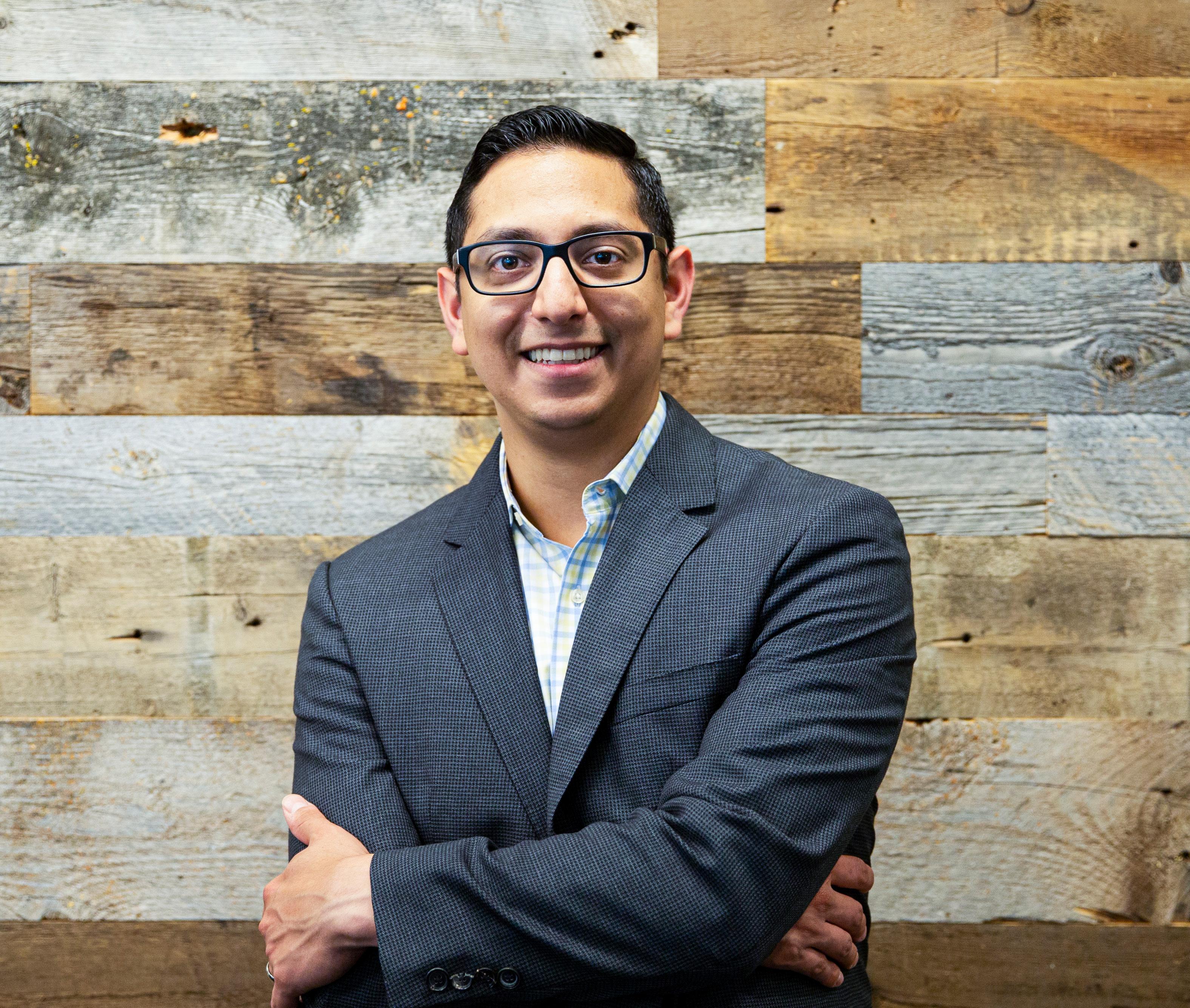
ing after graduating and moved back to his native Texas. In April 2019, he was hired at Yum! Brands in his current role.
“I oversee talent and acquisition for the office in Plano, which includes recruiting for open positions, moving internal talent across the world, and helping carve out career paths for the team here,” he explains. “Acquisition is an important piece of what I do, and one of my focuses for acquisition is to increase our underrepresented minority pipeline.”
Currently, there are very few Latino leaders above the director level for Yum! Brands, which includes Pizza Hut, Taco Bell, KFC, and the newly acquired Habit Burger
JAMES FRIPP
Alex Martinez
Director of Global Talent, Organizational Development & Rewards
Yum! Brands/Pizza Hut
Grill. That’s a gap the company is trying to fill; it’s also why Martinez champions the Hispanic Promise, an initiative by We Are All Human that launched to hire, promote, retain, and celebrate Hispanic/Latinx talent in the workplace.
“One of the things we’re trying to do this year is provide more exposure to the team around Hispanic heritage and all of our Latinx leaders who are driving this important promise,” Martinez says. “Yum! has signed the Hispanic Promise, and in support of that, I go out into the market, look for top Latinx talent, and bring them into some of our critical roles while securing them the right sponsors and mentors to help them succeed.”
Martinez partners with Chief Diversity and Inclusion Officer James Fripp to embed Yum! Brands’ D&I strategy globally and focus on all underrepresented minorities—not just Latinx. “We want to build this pipeline of people to come into the business—whether internally or externally—and while they are here, help build the right communities for them to flourish,” he says. “We are on a ferocious journey to embed diversity and inclusion into our ‘Recipe for Growth and Good’ and be a company with unrivaled culture and talent.” Yum! Brands recently announced its Unlocking Opportunity Initiative, committing $100 million over the next five years to fight inequality through equity and inclusion, education, and entrepreneurship.
Martinez is also a member of the steering committee for a multicultural employee resource group that was launched to the entire campus, driven by many of the Middle Eastern, Asian, Latinx, and African American leaders across the various Yum! Brands. The Hispanic Promise also plays a major role in the group.
The forward-thinking initiatives that Martinez both leads and takes part in via
Yum! Brands are widely recognized and trumpeted by those he collaborates with as director of global talent. “Our team at JMA has built a strong partnership with Yum! Brands and Pizza Hut, spanning many years and across the globe,” explains Sarah Beauerle, a partner at JMA Global. “Our relationship is successful because of leaders like Alex who set a standard of excellence as a culture champion with a genuine commitment to developing talent and building diverse teams.”
Paying it forward, Martinez says, starts with getting the right representation. Yum! also must provide a sense of belonging and inclusiveness to ensure it retains talent.
“For instance, as an underrepresented minority, I don’t feel like I’m just one of a few, but one of many,” he says. “One of the pieces of my job is to then make connection points with the other brands to find the pockets of Latinx representation and have leaders who can champion certain initiatives and make those connections.”
Early in 2020, Martinez was invited to a dinner at company CEO David Gibbs’s house, with a guest list composed entirely of Latinx and African American leaders at the level of director or above. “I’m getting our executive leadership team and our president to sponsor panels and graciously host dinners (even virtually) to get to know our diverse teams and understand their experiences better,” Martinez explains.
For him, leading talent isn’t about hitting numbers but creating the right community and making sure everyone feels included and engaged. “I want everyone to have a voice and contribute ideas,” Martinez says. “For example, one of our African American leaders led our International Women’s Day gender-bias exercise. We want to give everyone the best opportunities and exposure and help create connection points.”
39
“Acquisition is an important piece of what I do, and one of my focuses for acquisition is to increase our underrepresented minority pipeline.”
Hispanic Executive
Newsworthy Leadership
BY SARA VERDI
SVP Roxanna Flores
ROXANNA FLORES IS THE DAUGHTER of a seamstress and a doorman. It is their examples of work ethic, she believes, that not only instilled a strong work ethic in her but also helped her build up an ultradiverse and decorated career in human resources, paving the way to her current role as senior vice president of HR for local media at media giant Univision.
At the age of nineteen, the Brooklyn, New York, native saw an advertisement for a temporary translator position in the New York Daily News, a Tribune Publishing property. As a budding journalism major, she jumped on the opportunity. When Flores showed up for this position, she found that she was going to assist in translating interviews in preparation for a lockout of the truck drivers’ union and possible sympathy strikers.
“The energy and the massiveness of this event was beyond exciting to me,” Flores recalls. “This assignment was under the ‘personnel’ department, and at the time I had no idea what that was, but I fell in love with the idea of managing all aspects of the business through the lens of news and information.” Flores immersed herself in the work, and what started as a two-day translating assignment
turned into an offer to stay with the Daily News as a full-time HR personnel clerk.
“My life felt like a movie. I was just a little girl from Brooklyn that had an amazing opportunity,” she remembers with a laugh. But Flores’s success wasn’t just due to the opportunity itself—like her parents before her, Flores worked incredibly hard throughout her time with the paper. Working for the Daily News by day and attending college classes by night, her daily schedule was filled with nonstop activity.
“Then the most devastating thing happened. I was laid off, not once but twice,” she says. The Daily News was sold to Robert Maxwell of Macmillan Publishing, and though her first layoff did not last long— Macmillan brought her back on after the initial layoff—a series of wild circumstances, including a CEO lost at sea, left Flores jobless again.
Fortunately, Flores had collected a number of useful contacts while at the Daily News, and after a year she transitioned into a support role that led to her first managerial HR role at WPIX. “I got the opportunity to really flex my muscles there,” Flores says. “I learned so much about FCC [Federal
is determined to serve others in her dream role at Spanish language broadcasting giant Univision
40 Mission
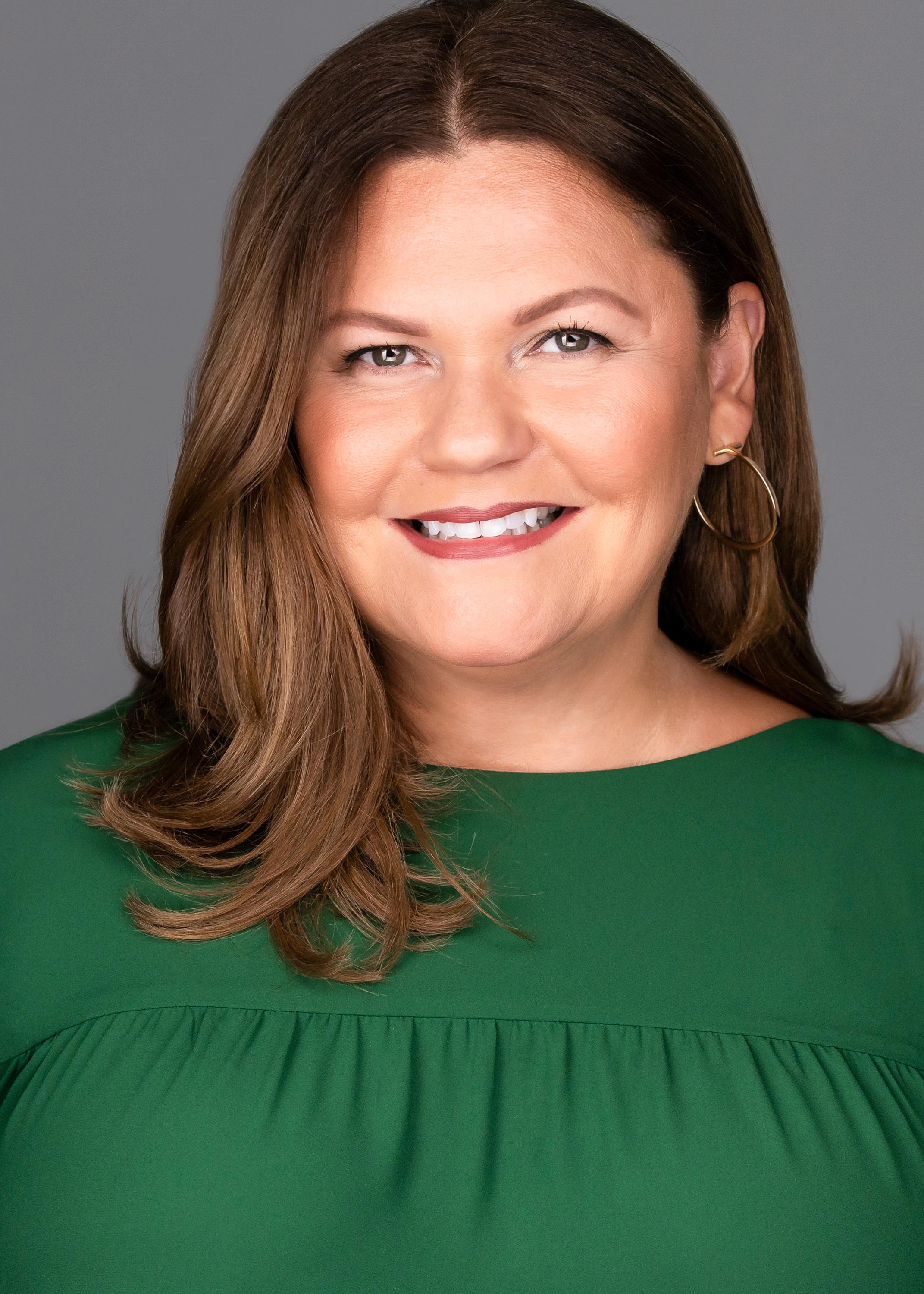 Roxanna Flores
Roxanna Flores
IRENE BELLA 41 Hispanic Executive
SVP of HR, Local Media Univision
HELPING STARTS AT HOME
In addition to the service that Roxanna Flores provides every day as an HR leader, the volunteer work that she has put in over the years for the nonprofit New York Cares plays a large part in her dedication to service at large.
“This city means everything to me, and as a born-andraised New Yorker, I believe that I have an obligation to give back to the city,” Flores says. “My mother always said, ‘Charity begins at home,’ and with New York Cares you can help any time, anywhere. It’s really wonderful.”
Communications Comission] regulations, about unions, and about how to build something from the ground up.”
Building on this formative role, Flores went on to work her way up to influential roles such as HR director, SVP, and chief people officer at companies like Dow Jones, Time Inc. (which was purchased by Meredith Corporation), and Fortune magazine.
“Before I really knew it, I had built a successful career in HR,” Flores says, laughing. But while things may have seemed like they moved quickly for Flores, she had garnered a wealth of experience within the HR industry—experience that uniquely prepared her for a role she had been dreaming of for years.
“I have always wanted to work for Univision,” the SVP says. “In my heart of hearts, I knew that I wanted to end up in Spanish language broadcasting, and I always dreamed of bringing my general market experience to a company that served the Hispanic community. If my life is a box, it now has a bow on it.”
Beyond fulfilling a lifelong career goal, Flores’s work at the television network is the perfect intersection of her two great passions: HR and journalism. “When done well, journalism is meant to challenge assumptions and shine a light into dark corners of our society,” Flores explains. “In the role that I am in today, we further dissect that by bringing meaning and focus to the Hispanic community.
“That’s what keeps me excited to be here,” she continues. “My role is to work directly
with local media’s senior leadership to develop and direct HR initiatives that support the organization’s goals so that they can continue to serve that community.” Flores supports her clients and team in a number of ways, striving to ensure that they have the tools they need to thrive and that they receive due recognition for their efforts. “I want my team to know that I am genuine and want to best serve them,” she says.
Partner organizations have taken note of Flores’s dedication to her team. “Roxanna always treated employees as talent, even in transition,” says Lee Hecht Harrison Chief Operating Officer John Morgan, who worked with Flores on executive transitions while she was at Time Inc. “There was always a tremendous degree of respect and compassion.”
Flores’s service-centric approach to HR has established her as a valued leader at Univision, but her work ethic and determination to give back have also marked her as a leader within the broader Hispanic community.
“Someone took the time to mentor, develop, and open doors for me, as a Hispanic woman, and I believe that it is critical to send the elevator back down,” Flores says. “The interesting thing about the Hispanic community is that we are still ‘arriving.’ We are not coming into largely influential circles—some of us are crossing borders just to get here— and it is my responsibility to provide the perspective that we can make it. We have to work harder and fight harder to get to where we are, but we can make it.”
42 Mission
“I always dreamed of bringing my general market experience to a company that served the Hispanic community.”
Welcome to the new ROI: A Return on Individuals


Now more than ever, every business is a people business. And companies are thinking about the talent they have in a whole new way. With this shift comes a new definition of ROI: A Return on Individuals. LHH teams with organizations to help reimagine what their own people are capable of.
There is opportunity within every company and every person. And we’re helping both deliver on it.
Welcome to Opportunity, Delivered.
To learn more, visit www.lhh.com/ROI
@lhh_global /lee-hecht-harrison
Pilsen native Carina E. Sánchez is intent on not only making government work for all the people of Chicago but also making sure that the city is reflective of its people
Unwavering Public Servant
BY BILLY YOST
CARINA E. SÁNCHEZ FELT THE CALL TO SERVE HER CITY BEFORE she was even ten years old. Growing up in Chicago’s Pilsen neighborhood, she started noticing people on TV who looked like her parents, her friends, and herself. “It was the 1980s, and I was watching the deportation of Mexicans from the United States. I remember asking my mother what was happening,” Sánchez recalls. “She explained that they didn’t have the right papers to be in the country, and I remember asking her who got to make that choice. She told me it was the government who made that decision. I quickly became conscious that people in government make decisions that impact every aspect of our lives, sometimes in a detrimental manner.”
Sánchez knew she wanted to help give voice to those who had to fight hard to be heard. “To me, being born in this country was a privilege. I wanted to be at the decision-making table to help people who look like me so they weren’t discriminated against,” she says. “I want people to understand that people like my parents came here to build something and make a better life for their family and their community.”
The daughter of Mexican immigrants and current executive director of the Public Building Commission of Chicago (PBC) has spent nearly twenty years working to both give a voice to those without a champion and to help rebuild a diverse and equitable Chicago in an image more reflective of its residents.
44 Mission
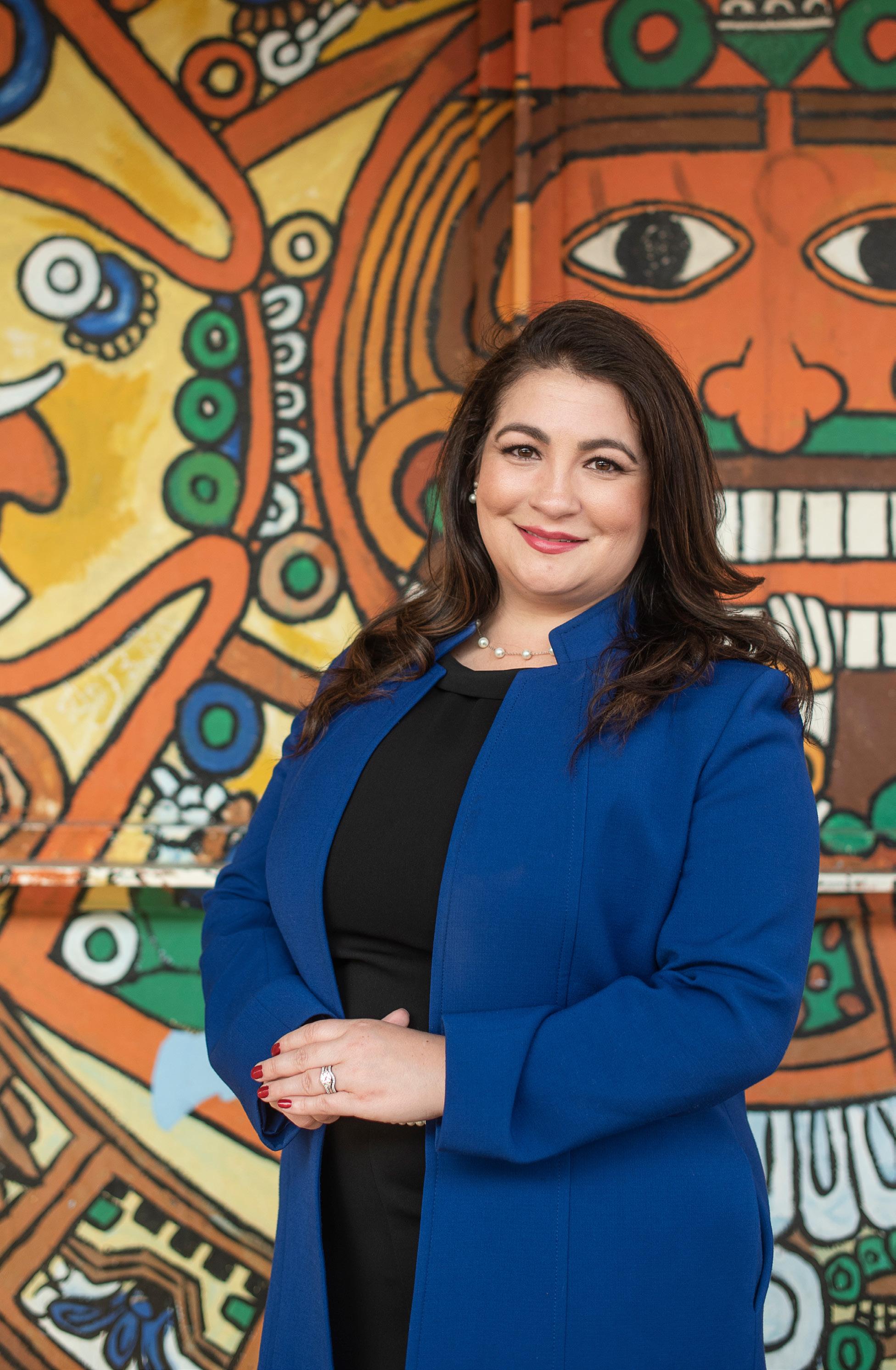
CES HEADSHOTS
Carina E. Sánchez Executive Director Public Building Commission of Chicago
BONA FIDES
Sánchez took her first real step toward achieving her goal of championing underrepresented voices in the early 2000s. While working for the Illinois House of Representatives, Sánchez helped Illinois become an early adopter of in-state college tuition policies for undocumented students.
“This was legislation that just started as an idea, but I had the opportunity to organize hearings across the state,” Sánchez recalls. “I remember having these young people come forward who just wanted to be recognized and receive an education. That whole process had a major impact on me, and throughout my career, everything I’ve done has ventured to improve the lives of people.”
Thus far, Sánchez’s career has touched a wide breadth of Chicago residents. When Illinois Comptroller Susana Mendoza became Chicago’s City Clerk in 2011, she asked Sánchez to help revamp the office and establish more trust in the position, which had been the center of corruption for far too long. “The most visited office in Chicago had an inefficient city sticker sales program dating back 105 years that caused long lines and headaches, on top of the embarrassment of previous clerks going to jail,” Sánchez says with a sad laugh. “It was an office in desperate need of reform and accountability, an office that needed to provide better customer service at a lower cost to taxpayers.”
Sánchez was instrumental to the overhaul of the antiquated sticker system and the department’s hiring of more bilingual staff to aid its residents—not just in Spanish but also in Polish, Mandarin, and other languages
with strong roots in Chicago. As a result of the changes she spearheaded, Sánchez was promoted from chief of staff to deputy city clerk, the first Latina to ever hold the position.

THE BEST IS YET TO COME
Sánchez has served as the executive director of the PBC for more than three years now but, as she notes, Chicago has yet to see the
impact of one the most significant projects she has worked on as a city servant.
During her tenure at the PBC, Sánchez has initiated sweeping contracting changes aimed at giving underrepresented community voices some much-needed amplification. “We have re-procured a number of our services,” Sánchez explains. “For example, prior to my tenure, we had a system in place that didn’t
CES HEADSHOTS
recognize or provide ample opportunities to smaller minority- and women-owned general contractors. Hence, a tiered system was established for job order contracting based on the size and dollar amount of work to be performed so smaller companies can have an opportunity to learn and grow on smaller projects.
“The benefit of providing those opportunities pays dividends in the future,” Sánchez continues. “As the smaller firms grow, they can provide valuable tools and educational opportunities to their subcontractors. As a public developer, we have a responsibility to increase capacity and provide opportunities to growing firms.”
Her partners affirm the importance of her mission to give a platform to underrepresented voices in the Chicago business community. “Carina strengthens the bonds between Latina architects and Chicago’s Latino community,” says Patricia Saldaña Natke, owner of the architecture firm UrbanWorks Ltd. “Under her leadership, UrbanWorks was selected as the design lead for CPS’s new John Hancock High School—a vibrant community anchor which will serve and inspire the 93 percent Hispanic student body.”
Sánchez has also tasked her staff with helping contractors find minority- or womenowned businesses to partner with. “A lot of agencies have minority and/or women business [M/WBE] participation goals. Those goals are aspirational,” Sánchez says. “We go further; our goals become actuals. We host prebid conferences to connect contractors with MBE/WBE firms that they can partner with and use to help their companies grow.
“We also have a strong compliance team,” she adds, “which works with our partners and tracks benchmarks to ensure they are hitting our contracting requirements and ensures we do our part to help them however we can.”
THE ARCHITECTURE OF A COMMUNITY
Sánchez is also proud of her effort to prequalify a pool of Architects of Record (AOR) for various projects. In working with her team, and after an in-depth evaluative process, close to twenty minority- and/or women-owned AOR firms were prequalified to perform work on PBC Projects. “This was the first time an all MBE/WBE slate of AORs was approved by the PBC Board,” the executive director notes. “Our strength lies in our diversity, and it’s fundamental to my commitment to my community.”
Her efforts have not gone unnoticed by the Chicago community. “With a sweeping act of seventeen project awards to MBE/ WBE architecture firms, all done at once, Carina Sánchez put action to words and showed other public figures how to lead and empower,” says Rada Doytcheva, principal of RADA Architects.
Sánchez and her team have already witnessed numerous success stories, but Sánchez wants to keep pushing. “I look at a project from the lens of how we can help our community in a way that is going to have a lasting impact,” Sánchez says. “We may not have always had the door opened for us and have had to push it open ourselves, but we have a responsibility to our community to make that change and hold it open for others to come through.”
THE CHISME CENTER
While Carina E. Sánchez and her mother may have butted heads in Sánchez’s teenage years, she says her mother has provided an inspiration that is both personal and political. “My mother owns a beauty salon in Pilsen that I lovingly call the ‘Chisme Center,’” Sánchez says, laughing. “Neighbors always come to her salon to discuss anything that they need to get off their chests. On election day, she knocks on doors and will drag you to the voting booth if she has to.”
Sánchez’s mother has also encouraged Pilsen residents to attain their US citizenship and helps them register to vote. She actively encourages those around her to become more active in the community. “My mother has an elementary school education and moved here from Mexico not knowing English and knowing she would face mistreatment,” Sanchez notes. “There are so many people with this story. She’s not only inspiring. She’s brave.”
“Our strength lies in our diversity, and it’s fundamental to my commitment to my community.”
47 Hispanic Executive
Seasoned attorney Isabel Garcia makes giving
A Practice of Giving
BY KEITH LORIA
ISABEL GARCIA DIDN’T GROW UP WANTING TO be a lawyer. She entered the University of Florida intending to study science, upon the advice of her stepfather. “My stepfather told me, as he dropped me off at the steps of my freshman dorm, that if I wanted to be successful, I needed to study science, engineering, or math,” Garcia recalls. It wasn’t until her senior year that Garcia decided science wasn’t for her and applied to law schools on the recommendation of a school counselor. The day after graduation, she drove herself to Atlanta, Georgia, to attend the Emory University School of Law—a choice that would set the course of her career for years to come.
At Emory, Garcia realized that she particularly enjoyed her real estate sales and finance class. “I went to see my professor and told him I wanted to be a part of a small firm so I could gain experience quickly. I was put in touch with a fellow Emory Law alum, Paul McLarty, who had a boutique practice in Atlanta,” Garcia says. “We had lunch, and he hired me on the spot. I think it was as much a surprise to him as it was to me.”
Garcia began working with McLarty while finishing her third-year studies at Emory. Seven years later, she was named a partner, and shortly thereafter, McLarty asked her to take over the practice so he could retire.
Piedmont Law Group is a commercial real estate boutique firm, based in the metro Atlanta area, that specializes in transactional real estate. Garcia plays an active role in large commercial transactions involving the acquisition, leasing, or lending of mixed-use
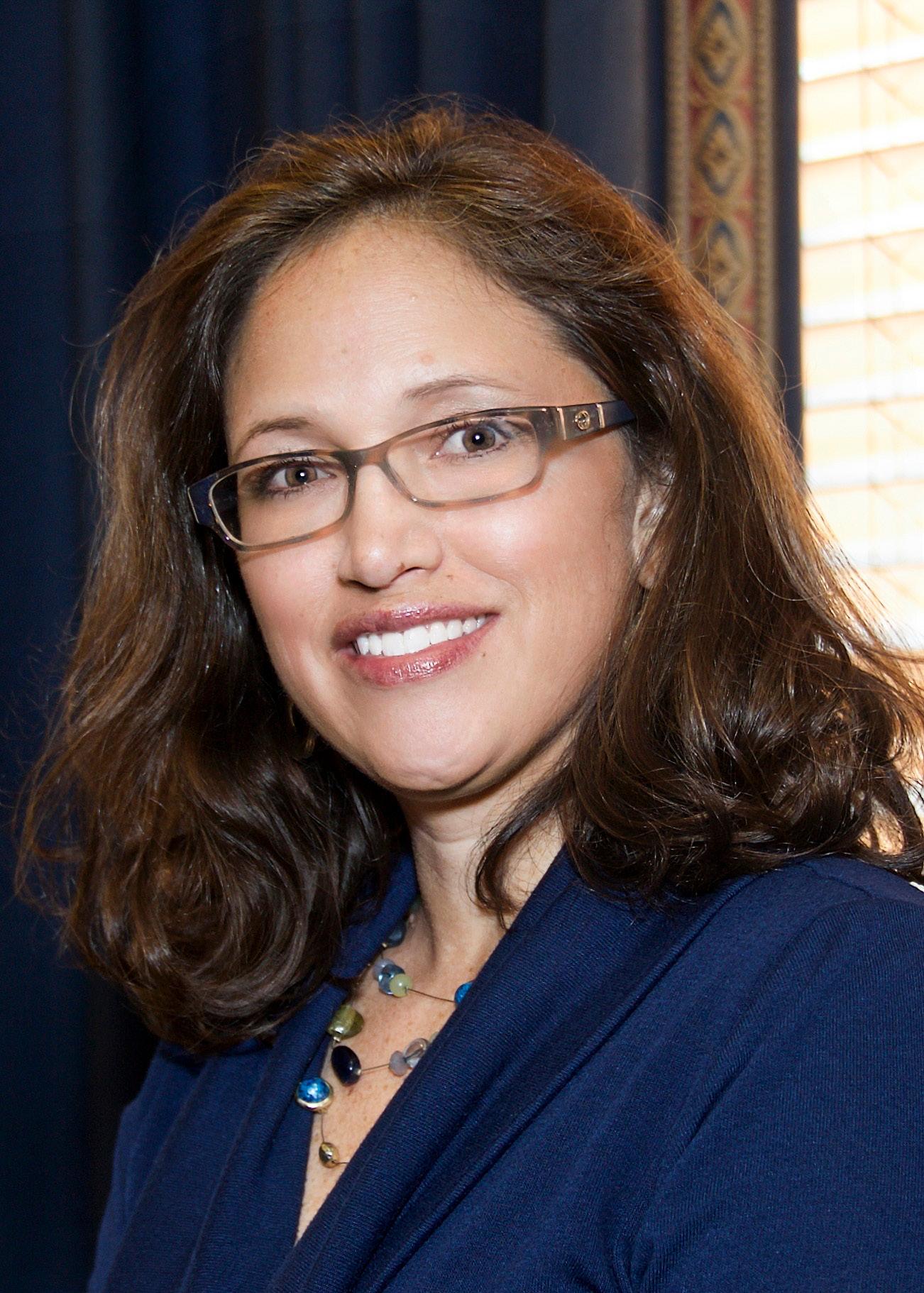
COURTESY OF PIEDMONT LAW GROUP
Isabel Garcia Partner Piedmont Law Group
back a regular practice, striving to ensure that students at Emory University are set up for success
48 Mission
developments, multifamily communities, retail, and technology/warehousing buildings.
“My component of the practice is largely made up of commercial title insurance,” she says. “The thing I love about what I do is that every day is different. Every deal is different. I’m always learning, and that keeps me interested.”
But it wasn’t just the professional mentorship that McLarty gave Garcia. He also schooled her on the importance of giving back to Emory students.
“Through Paul’s encouragement, I became actively involved with Emory’s students, both at the law school and university wide. I spent eight years on the Emory Alumni Board, including two years as chair of the committee responsible for selecting university trustees, and a year as president, whereby I was the face and voice of 140,000 alumni at that time,” Garcia says. “When my time on that board was reaching its end, I knew I needed to find a new outlet at Emory to continue my engagement.”
That’s when Garcia learned about the 1915 Scholars program, a brand-new mentorship initiative for low-income, racially diverse, first-generation college students at Emory. “The mission of the program is to enhance the recruitment and retention of these students throughout their four years at Emory by way of intentional support through programing and mentorship. I believe wholeheartedly in mentorship. I know the difference it can make,” Garcia says. “I was one of the very first alumni mentors to sign up for the program; I’ve now had seven scholars graduate. I have seven current scholars, and I’m expecting two new freshman in the fall.”
In her role as a mentor, Garcia treats these students as members of her own family. She includes her scholars on outings in the city with her own children, cooks them meals in her home, attends campus events with them, provides financial assistance when needed, encourages them to think about their postcollege career paths by introducing them to executives and professionals in her network, and opens the doors of her home for those who truly need it. That means that if her students have any concerns, problems, or are just missing home, they can call her day or night.
“This is a cohort of first-generation college students, especially from economically disadvantaged homes,
who don’t always have the highest success rates,” Garcia explains. “I want to be their family away from home. I want to be an active participant in these formative years, providing the mentorship, encouragement, wisdom, and sometimes financial resources so that these students don’t just make it through college but also thrive.
“To witness their emotional growth and increased confidence—seeing them self-cultivate in their Emory community and developing relationships and skills that will last a lifetime—it means everything to me,” she adds.
According to Garcia, her passion for giving back to the Emory community—and her community in general—is something she picked up from her mother, who worked for nonprofits and had an incredibly generous soul.
“My mother was very much involved with volunteerism and the service philanthropy,” Garcia says. “She epitomized service, and she worked tirelessly on behalf of others to promote human dignity and social justice. Those weren’t just catchphrases for her—she lived and breathed it, professionally and spiritually. My mother passed away several years ago, so this is my way of continuing her legacy.”
49 Hispanic Executive
“To witness their emotional growth and increased confidence . . . it means everything to me.”
Small Town, Big Career
BY RUSS KLETTKE
A native of Whiteface, Texas, Anthony Arguijo has climbed up the legal ranks to a partnership at Scott Douglass & McConnico LLP

CONVENTIONAL WISDOM HAS IT THAT SMALL, isolated towns limit the educational and career opportunities of the children living there. Anthony Arguijo, a partner at the law firm Scott Douglass & McConnico LLP, has proved that notion wrong in so many ways.
According to Arguijo, spending his childhood in Whiteface, Texas—a small town of 450 in the western panhandle, located about 45 miles from the city of Lubbock—actually prepared him well for a career in law.
“I moved to Lubbock the day after I graduated high school,” says Arguijo, who attended Texas Tech Univer-
RICK PATRICK
50 Mission
sity before obtaining his law degree from the University of Texas School of Law. “But growing up [in Whiteface] was great. With just twenty-six classmates, I was able to do a lot of things: I played football, basketball, ran track, and was a golfer.
“The school district was academically strong,” he continues, “and I liked it there. I married my high school girlfriend just a year after graduating.”
Partly inspired by his high school speech competitions, Arguijo had long thought of becoming a lawyer. But while he largely envisioned working in a big firm on
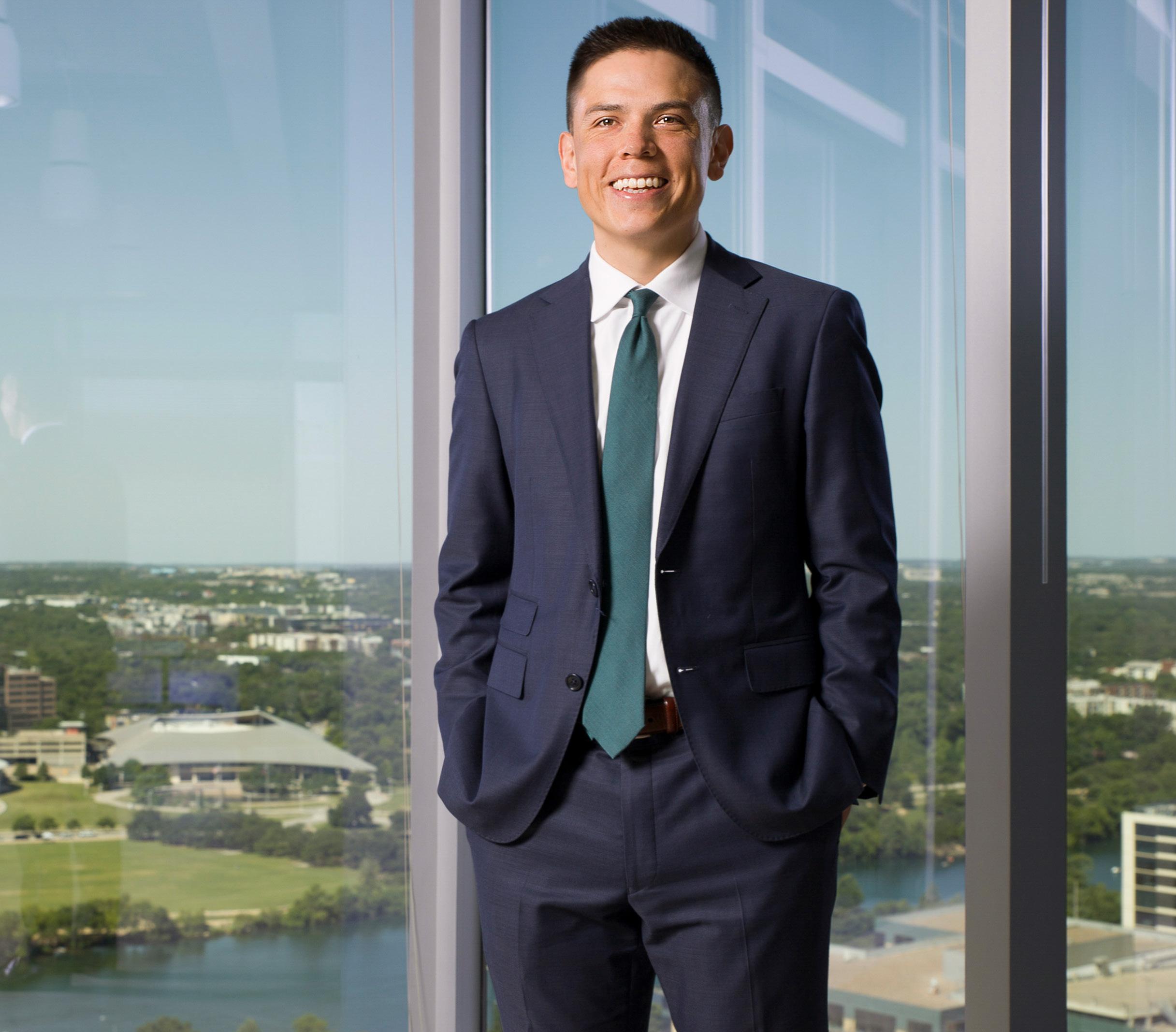
contracts, his UT experience with moot court convinced Arguijo that his public speaking skills would make him a good litigator. After graduating from law school and passing the bar, he served as a briefing attorney and law clerk for judges on the Texas Supreme Court as well as the US Court of Appeals, joining his current firm two years out of law school.
As is not unusual in Texas, Arguijo’s work at Scott Douglass & McConnico is strongly focused on the oil and gas industries. Arguijo represents operators in the “upstream” sector of the industry, which involves
Anthony Arguijo Partner
Scott Douglass & McConnico LLP
51 Hispanic Executive
activities related to exploring for, recovering, and producing minerals. Because these operations occur on land owned by others—and the royalties those owners receive can vary based on nuances in their leases and Texas law—it’s not unusual for landowners to question and challenge their compensation, Arguijo says.
These issues are further complicated by the boom-and-bust cycles characteristic of the oil industry—West Texas Intermediate crude oil prices have ranged from a high of more than $70/barrel in late 2018 to below $20/barrel in 2020. “When those prices drop and the checks get smaller, landowners start to look more closely at their contracts,” Arguijo says.
These are heady issues for a kid from West Texas, but Arguijo is more than equal to the task. And perhaps because he grew up in Whiteface, where he was the only Latino in most of his classes, Arguijo connects strongly with the need to promote diversity and inclusion within the legal field.
“Texas Latinos make up 40 percent of the state,” he points out. “But at best we represent only about 10 percent of the lawyers. Those numbers get even worse when you look at the number of diverse attorneys who are equity partners in law firms.”
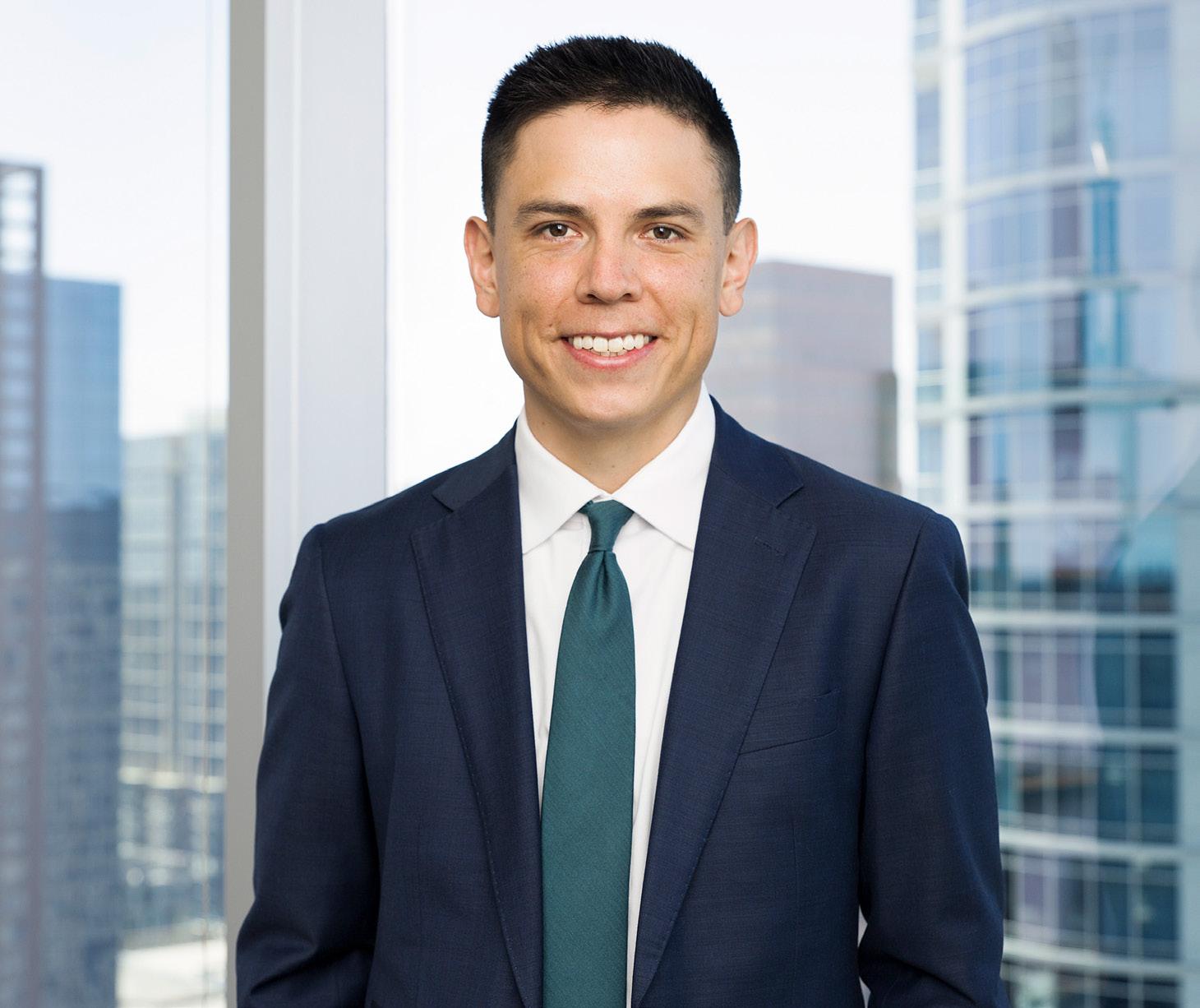
To correct for that—and out of what is clearly a desire to give back—Arguijo involves himself within and outside the firm in diversity and inclusion (D&I) work. Arguijo serves on Scott Douglass & McConnico’s D&I Committee and has taken on leadership roles at local, state, and national levels with a focus on improving diversity in the legal profession.
According to Arguijo, that means more than simply increasing the number of diverse attorneys at law firms. “The job isn’t done by simply hiring a diverse lawyer,” he notes. “Law firms must invest in those lawyers and lift them up so that they can continue to advance in their careers.”
In fact, he says, Scott Douglass & McConnico’s investment in him as a young lawyer
played a key role in shaping him into the attorney and leader that he is today. “When I came to this firm, my résumé was good—I had been managing editor of the law review, and I had great clerkships,” Arguijo says. “But I still showed up with a lot of insecurity and doubts as to whether I belonged. A law firm was a foreign environment for me, which is common for many diverse attorneys.
“That’s why it’s so important for leaders at firms to sponsor young diverse attorneys, make them feel valued, and help them continue to progress at their firm. That’s what inclusion is all about,” he continues. “I was fortunate enough to join a firm that shares my values on diversity and inclusion and always pushed me to grow, both as a lawyer and a leader. I had people who helped me get better at my work, and that took away my doubts. That should be the norm, and we at Scott Douglass & McConnico are dedicated to doing what we can to make that a reality.”
RICK PATRICK
52 Mission
“Texas Latinos make up 40 percent of the state. But at best we represent only about 10 percent of the lawyers.”
BY WILL GRANT
Advancing the Story
Rolddy Leyva on cultivating a workplace culture rooted in diversity, inclusion, and belonging at Capital One
FROM A YOUNG AGE, ROLDDY LEYVA KNEW WHAT “OTHERNESS” felt like. A Cuban refugee with an Irish first name and a Spanish surname, Leyva recalls being told by his first-grade teacher that his name was too difficult to pronounce. His teacher suggested he go by “Rod” instead. This led the young immigrant to push a meaningful part of his identity into a closet, feeling that assimilation to “Americaness” was the only way to achieve safety and acceptance in his Florida hometown.
But later, in his professional life, Leyva found a way to tell the stories of those who—like him—felt they had to hide important parts of themselves in order to fit in. This experience didn’t just make him a storyteller; it put him on the front lines of advancing the kind of change that would have made his earlier life—and the lives of other immigrants, minorities, and “societal others”—part of a much stronger whole.
Leyva is now the vice president of diversity, inclusion and, perhaps most importantly, belonging (DIB) at Capital One, one of the nation’s largest consumer financial services and technology organizations. His team at Capital One is considered an industry leader in terms of investing the time, talent, and capital necessary to ensure that associates, customers, and communities are able to live their most authentic truths and be treated with dignity and respect.
53 Hispanic Executive
INCLUSION ISN’T ENOUGH
Leyva says he wasn’t fully able to appreciate his own past experiences until he joined Capital One more than twenty years ago. In his first role with the company, Leyva was part of a growing business line aimed at supporting the US Latinx community. “It was the first time I recognized that there was a large company that had identified the nuanced needs of the Latinx community in this country,” Leyva says. “They were actively working to meet that need and, for the first time in my career, I felt a sense of pride in my culture and heritage—it was a source of strength for me, something that was valued by my employer.”
Leyva eventually left Capital One to continue building his diversity and inclusion skills with another global firm, but he returned in 2018 to continue his mission: expanding diversity, inclusion, and belonging across the entire enterprise.
“Inclusion is about a choice that is often made by the person choosing to include, and not the person being included,” Leyva explains. “You can include a person on a team, but that doesn’t mean they feel like they belong or even feel welcome there. It’s important to get to inclusion, but our North Star is about belonging—everyone feeling safe, seen, heard, valued, and able to thrive as their best, most authentic selves.”
While Leyva was away from Capital One, the organization evolved significantly. “The company diversified: we acquired banks, increased our focus on technology, and more than doubled our associate base,” Leyva says. “We also moved the needle in terms of growing the representation of women and people of color on the board of directors, our executive committee, and across the organization. Despite that progress, we also recognized that we were far from where we wanted to be and that more had to be done.”
A STRONGER APPROACH
This strong foundation, Leyva says, has enabled Capital One to be bold in its leadership of advancing equity and belonging, both in its workplace and across its communities.
“The next five years of this work need to be different for the next fifty years of this work to be what it needs to be,” Leyva says. “Legacy diversity systems and practices haven’t gone far enough to move the needle culturally, nor have they gone deep enough to dismantle the deeply rooted history of systemic racism in our society here and around the world.
“The killing of Ahmaud Arbery ignited a movement for us,” the VP continues. “Tragically, it wasn’t the first time we had witnessed the killing of unarmed Black people in our country. But then we learned of Breonna Taylor and George Floyd. And all of this was happening against the backdrop of a pandemic that was disproportionately impacting the safety and health of Black and brown people, in an economic recession that had equally disproportionate impacts on those same communities.”
In response, the multiyear DIB approach that Levya had been leading shifted into over-
drive. He knew that the need for awareness, action, and accountability on racial justice, equity, and inclusion was more urgent than ever. And in less than a week, Leyva’s team produced a virtual town hall discussion on race. The result was a defining moment in Capital One’s DIB journey.
“Twenty-four thousand associates came together from all over the world to engage in the discussion. It became the largest diversity event in the history of the company,” Leyva says. “We were intentional about the language we used, acknowledging and respecting the real emotions and lived experiences of our Black associates and communities with words that connected directly with the heart of the issue. We weren’t afraid to ‘say the thing,’ and nothing was off the table.”
REAL CHANGE
In the weeks that followed, the company continued the discussion on race with help from experts like Michele Norris from the Race Card Project and Ijeoma Olou, New York Times best-selling author of So You Want to Talk About Race. More than fifty thousand associates have attended one of these events
54 Mission
“It’s important to get to inclusion, but our North Star is about belonging— everyone feeling safe, seen, heard, valued, and able to thrive as their best, most authentic selves.”
since June 2020—programming that will become a recurring cultural touchpoint for the organization and a complement to its active educational outreach and robust action plan for effecting lasting change.
“Part of our focus is on creating change,” Leyva emphasizes. “At the end of the day, awareness and actions are not enough without an underlying system that is inclusive, fair, and equitable. Only then can we make meaningful progress toward the outcomes we seek.”
All people systems—from talent acquisition to performance management and even total rewards—are and will continue to be routinely reviewed to ensure they are aligned with Capital One’s DIB principles of fairness and equity. The company already runs an annual pay equity analysis that factors in both gender and race and continues to maintain aggregate global pay equity across both groups. In 2020, Capital One also introduced early closure of its offices and banks in recognition of Juneteenth, the oldest known celebration commemorating the end of slavery in the United States.
“It’s more than the strong commitment from leadership; it’s about the forward lean of everyone involved,” Leyva says of these efforts. “Our CEO often talks about how it’s not just our ingenuity, but our humanity that is at the heart of who we are as a company. We aim to bring that philosophy to our leadership on DIB.”
Leyva and his team continue to look ahead, building a path forward for everyone at the company. Capital One’s discussion events resulted in an outpouring of stories being shared and a desire from associates to stay connected and continue the dialogue. Leyva and his team are focused on doing just that—keeping the discussion going and firmly committing to the work that is still to be done.
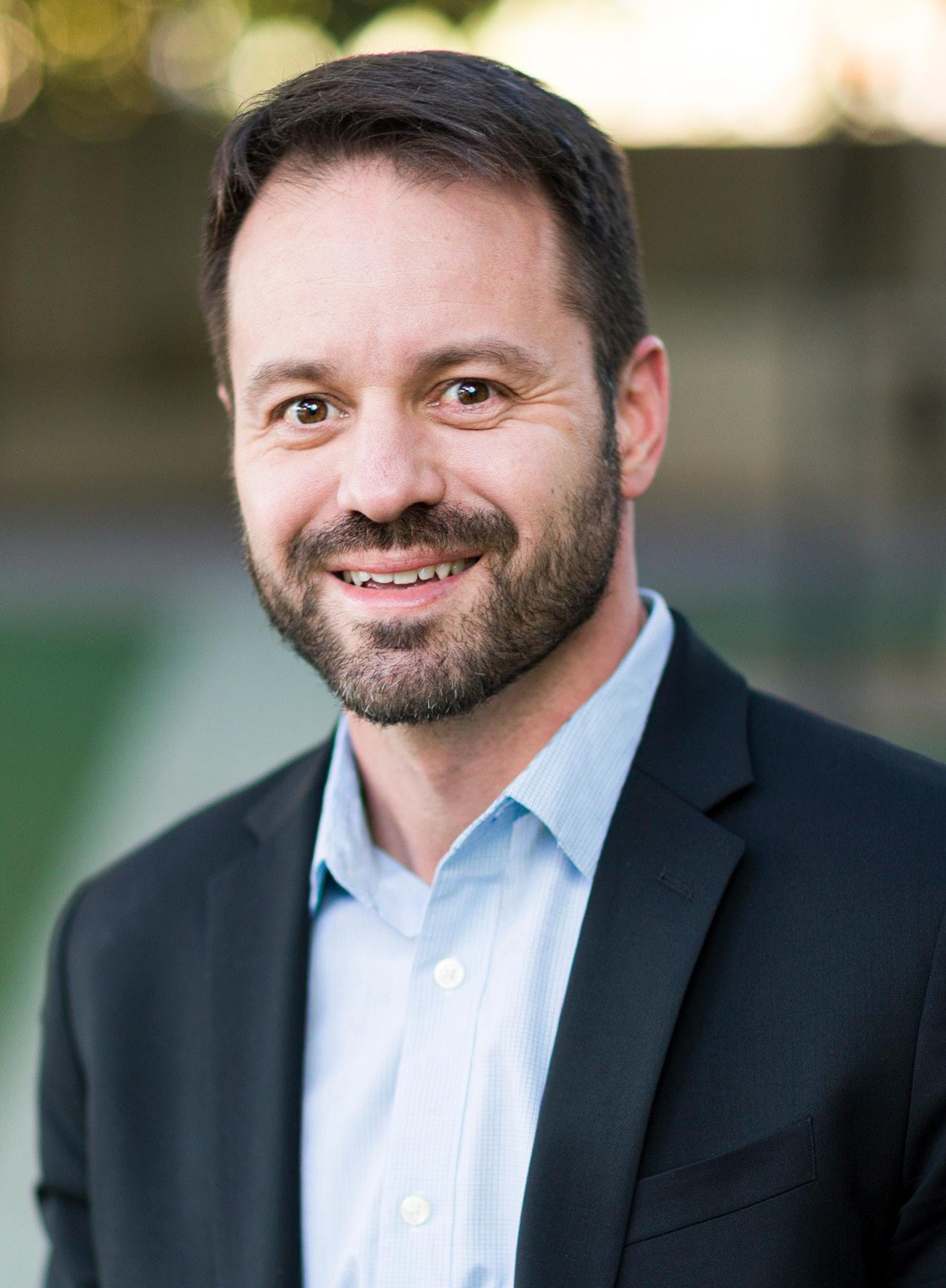 Rolddy Leyva VP of Diversity, Inclusion & Belonging Capital One
Rolddy Leyva VP of Diversity, Inclusion & Belonging Capital One
MAYO CLINIC PJP 55 Hispanic Executive
The Sound of Success
BY JULIAN KING
Sony Music Entertainment’s Maria Fernandez speaks to the new developments in her leadership journey and her efforts to ensure that the organization’s artists and employees alike continue to thrive
56 Mission
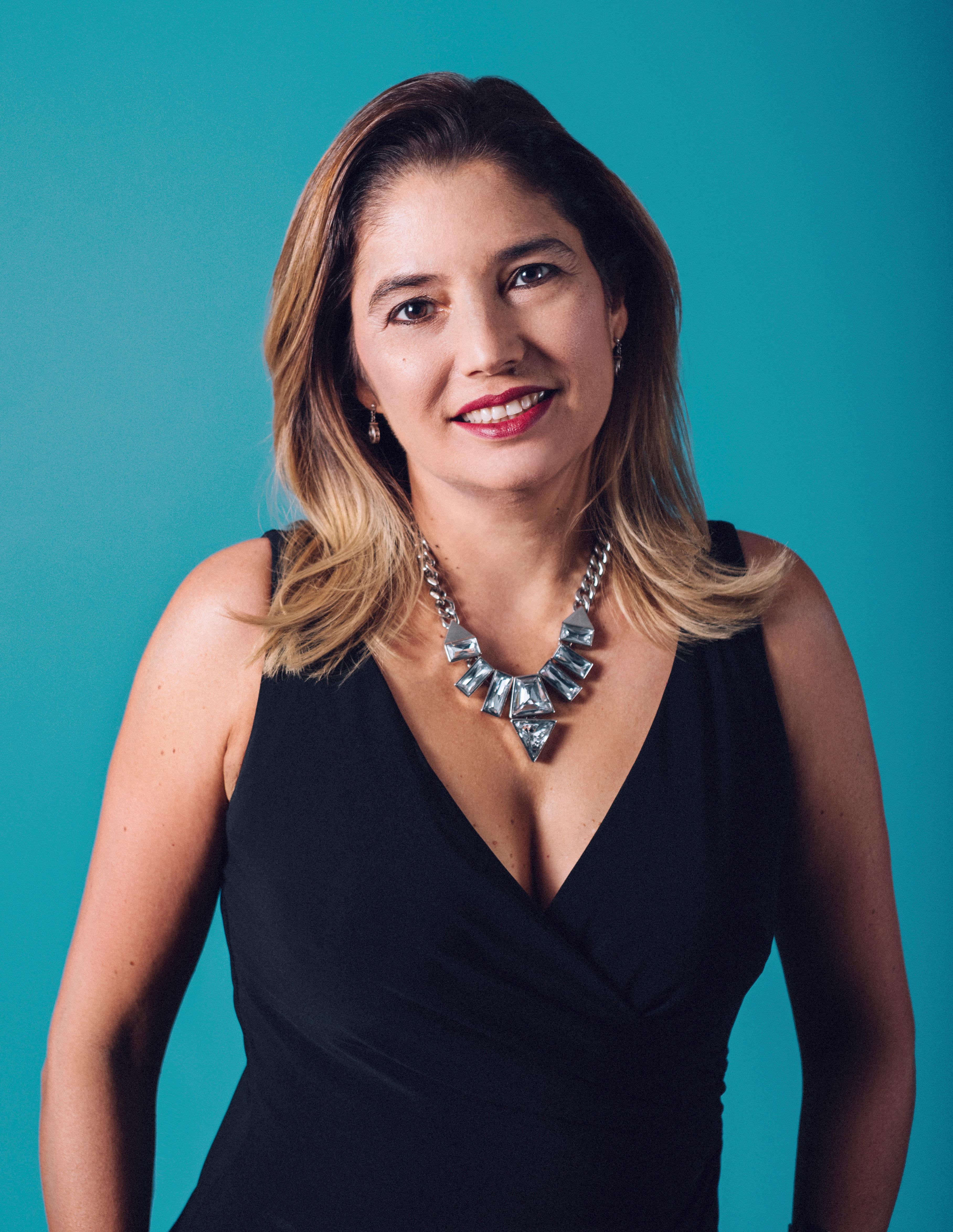
ALESSANDRO MARTINO
Maria Fernandez EVP and COO, Latin Iberia Sony Music Entertainment
LIFE HAS CERTAINLY CHANGED FOR MARIA FERNANDEZ
since she last spoke with Hispanic Executive. In April 2018, she took on a new role as executive vice president and chief operating officer for Sony Music Entertainment’s Latin Iberia Regions, expanding her responsibilities to oversight of the company’s financial and operational activities as well as human resources, information systems and technology, and new business initiatives. But according to Fernandez, the changes to her title and duties have come hand in hand with a personal transformation. Today, the EVP leverages both her professional expertise and the insights she has gained throughout her personal journey to ensure the continued success of an organization she loves.
A global music conglomerate associated with celebrities like Harry Styles, Maluma, and Rosalia, Sony naturally has big goals for both the artists it represents and the people employed by the company across the world. In her new role, Fernandez has helped Sony realize those goals in new and significant ways.
“To me, this is an incredibly unique opportunity because when you oversee the people teams, the processes, the systems, and the money, you can understand what is happening in each and work in a more effective way to achieve the company’s goals,” she says.
One of Sony’s main goals this year, according to Fernandez, is to position the company well for the future. As a part of that goal, Sony has focused on strategic acquisitions and the incorporation of data analytics into the business—both of which, Fernandez emphasizes, enhance the company’s
ability to compete in a fast-paced environment and improve the Sony experience for artists and employees alike.
“Each strategic acquisition was done to enhance the services provided to our artists,” Fernandez explains. “Doing this well will make the company competitive and a good place for artists but also for its employees.”
Likewise, “Understanding what is happening in the market is critical, especially when we see how fast the environment can change,” Fernandez says. “We have been working on the implementation of systems in different areas of the company to make sure we have the proper data to make decisions effectively. We have also implemented new systems to increase transparency with our artists and give them faster access to the royalties they are generating.”
In her new role, Fernandez has played a key role in leading both the company’s strategic acquisitions and the data analytics initiative, constantly striving to ensure that Sony remains ahead of the game. Other leaders in the industry have taken note of Fernandez’s forward-thinking leadership style. “Maria is an exemplary leader, and it is a pleasure to work with someone with her vision and drive. It is a luxury for the music and entertainment industries to have women like her in front of them,” says Diego Laviada, founder of Dubbing Hits.
Laviada’s colleague and cofounder, Hernán Villarreal, underscores this sentiment. “I have so much respect and admiration for Maria’s outstanding career in the music industry—may she have many more years of success to come. It’s a great pleasure to work with her.”
58 Mission
“This is an incredibly unique opportunity because when you oversee the people teams, the processes, the systems, and the money, you can understand what is happening in each and work in a more effective way to achieve the company’s goals.”
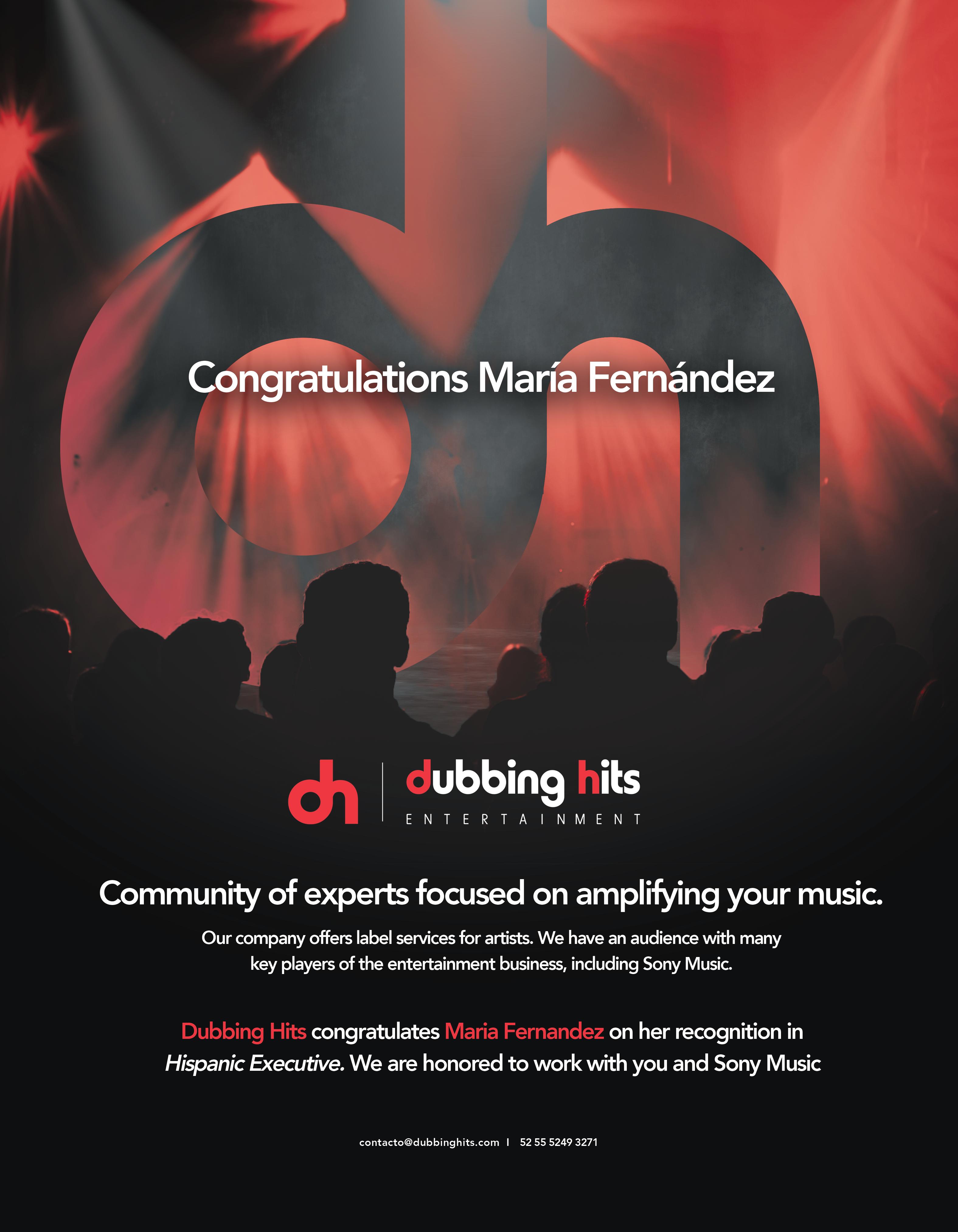
With over 30 years of experience in the entertainment industry we are now leading FPM Entertainment LLC, a company focused on developing all areas within the business of live entertainment and artist management services.

We also provide original content for Film & Music Production as well as editorial, publishing and consulting services. Our team of experienced profesionals extends into the fields of touring, festivals production, licensing, publishing, songwriting, music production, branding and merchandising.
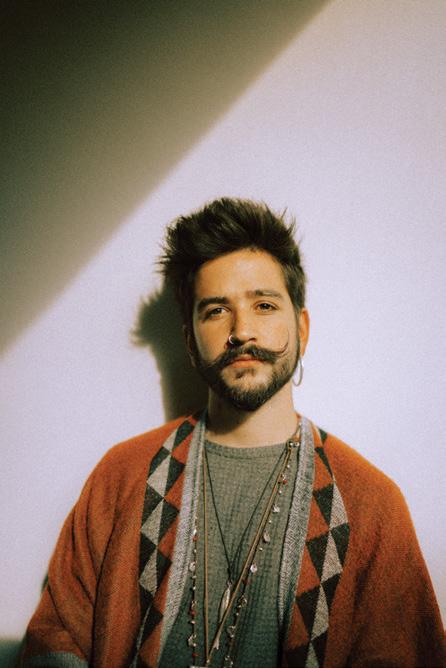
But Fernandez knows that there’s more to being an effective leader than efficiently executing on the organization’s goals. Serving as a leader is about setting and being an example, she emphasizes, and inspiring others to pay attention to what matters to them.
Since accepting the position as EVP and COO, Fernandez has gone on a “personal quest,” in which she has realized the importance of prioritizing her physical and mental health. “My priorities will be different than someone else’s. But research clearly shows that sleeping well, exercising regularly, and eating healthy will improve your professional performance,” she says. “It’s a good investment of your time to include this in your schedule, not as a ‘nice to have’ but as a priority to accomplish your goals.”
Fernandez has also been focusing on her mental and emotional well-being, building a strong circle of influence, and making a point of prioritizing the people important to her. Some of the most important connections to the EVP are the relationships she has built as a mentor.
“These conversations give me perspective and insights that I would not achieve otherwise,” Fernandez remarks. “We are living in a very special moment in the workplace in which we have several generations working together, all with their sets of values and priorities.” As a mentor, Fernandez shares what she has learned over the course of her career—and also
questions and enriches her own way of thinking. Mentorship, she stresses, is a two-way street, and she gets as much out of her relationships with mentees as they do, if not more.

Fernandez’s mentees include many young women working at Sony Music Entertainment. This next generation of women within the organization, the EVP says, is both empowered and knowledgeable. To Fernandez’s mind, the advice she gives them as a mentor builds on that foundation, helping them “get to where they want to be but also to enjoy themselves and thrive in the process. It is very important to have someone with whom you can have conversations like this,” she says. “In my career, I had great mentors who taught me a lot, so I wanted to give some of the advice and things that I have learned back.”
Of course, Fernandez is not alone in prioritizing the company’s next generation of diverse and empowered leaders. Diversity, she explains, is part of Sony’s success.

“We still have work to do, but we have leadership who really wants to make improvements in this area and sees the benefits you get from it,” Fernandez says. “Diversity enriches so much. It opens your mind and increases creativity, which is crucial, especially in a company like Sony. I am very proud of being part of an organization that is doing everything it can to make it more diverse and equal for all the people who are part of it.”
 The Sello/Mariela Croci congratulates Maria for her successful career at Sony Music. Her passion and strength as a music executive woman is a great inspiration. She trusted us as a creative idea and empowered me to grow it. The Sello is a company specializing in creative strategy for artists.
The Sello/Mariela Croci congratulates Maria for her successful career at Sony Music. Her passion and strength as a music executive woman is a great inspiration. She trusted us as a creative idea and empowered me to grow it. The Sello is a company specializing in creative strategy for artists.
“Diversity enriches so much. It opens your mind and increases creativity.”
60 Mission
info@fpment.com | fpment.com 1200 Brickell Ave #1550, Miami, FL 33131 ARTIST MANAGEMENT LIVE EVENTS BRANDING EVENTS PRODUCTION CONSULTING PUBLISHING ORIGINAL CONTENT DEVELOPMENT BOOKING @fpment
STRA TEGY Strategy
What is your secret to successful leadership?
The impressive executives featured here share theirs, and they are strategies that engage both the mind and the heart.
62 Ofelia Melendrez-Kumpf, McDonald’s USA 66 Pedro Pavón, Salesforce 68 Susy Ponce de Leon, Cable One 72
StackPath
Francisco Romero,
This Is What Success Looks Like
BY CORA BERG
McDonald’s began investing in Ofelia Melendrez-Kumpf’s maturation as a leader nearly thirty years ago. Today, it invests in the careers of others more than ever before.
62 Strategy
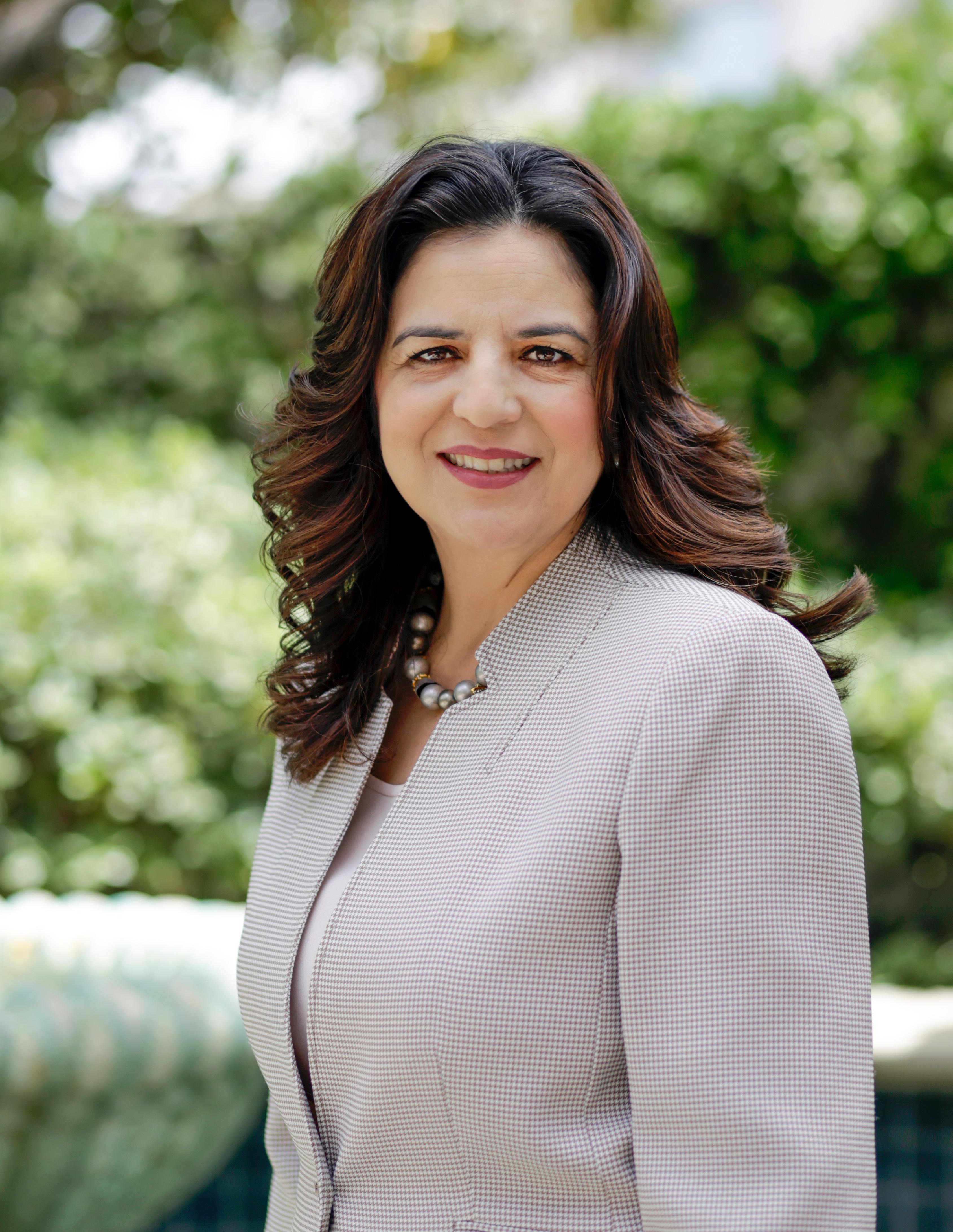
LATINO DONOR COLLABORATIVE
Ofelia Melendrez-Kumpf
US Field Vice President McDonald’s USA
“I take the time to be mindful and structure my day,” says Melendrez-Kumpf, a US field vice president for McDonald’s USA. In an environment of unending work, part of Kumpf’s success comes from taking a long view. “It’s critical that I excel at my job tomorrow, the next day, and the day after that, so I have to end each day with a well-thought-out plan to show up strong, determined, and focused the following day,” she explains.
Considering her role blankets operations in Southern California, Nevada, New Mexico, Arizona, and West Texas, it’s safe to say Melendrez-Kumpf’s tactics for success are working. Any given day could include work on franchising, KPIs, financial performance, marketing, consumer insights, business insights, people development, operations, product development, or real estate. “In essence, my job is to drive consistency, improve the customer experience, and attract new and repeat customers,” Melendrez-Kumpf says. “My biggest responsibility is inspiring franchisees and company staff to be the best they can be and offer exceptional customer service, while also staying ahead of competition.”
It is no accident that Melendrez-Kumpf finds herself a vice president. “While some little kids roleplayed as a princess, I role-played as a banker,” she says. From the very beginning of her career, she strove to become an executive at a large, multinational company. And though she says she interviewed with McDonald’s simply to practice her interviewing skills, she came to understand the opportunities the company offered and took a position as a manager trainee over twenty-eight years ago.
She came on board as part of an internship program geared to hire Latinas. At the time, a midlevel manager served as the highest-ranking Latina at McDonald’s, a role Melendrez-Kumpf intended to supersede. The company challenged her to stretch and grow, and Melendrez-Kumpf advanced quickly through all phases of restaurant management and supervision in the US and throughout Latin America, securing her latest promotion in July 2018. Melendrez-Kumpf is now the highest-ranking Latina on the operations side as well as the corporate side of McDonald’s USA.
“To excel, you have to have an entrepreneurial spirit and be a tenacious problem-solver,” Melendrez-Kumpf says. Beyond titles, she says, “I’m extremely proud of the culture I’ve helped create here and the talent I’ve been able to support and develop. I feel extremely fulfilled when seeing others thrive and flourish.”
Specifically, the VP advocates for and mentors young people, especially women. “At McDonald’s,” she says, “we believe that the strength and diversity of our talent enables us to build a better, stronger McDonald’s. We are committed to creating a workplace where everyone, from crew to C-suite, is equally supported and empowered to realize their full potential.”
To better meet customer needs and access talent, Melendrez-Kumpf says that McDonald’s prioritizes becoming a gender-balanced organization where everyone feels safe, valued, and free to be themselves. To this end, Melendrez-Kumpf chairs the McDonald’s US Global Women’s Leadership Network. She partners with stakeholders and experts to achieve the pillars of
At 5:30 a.m. Ofelia Melendrez-Kumpf is drinking her McCafe drip coffee and using the quiet for some strategic thinking before the daily onslaught of texts, emails, meetings, interviews, and presentations begins.
64 Strategy
the McDonald’s Better Together strategy: representation, rising, recognition, and reach. The goals include achieving equality in advancement and championing the impact of women on the business, where gaps exist by 2023.



“Representation matters,” Melendrez-Kumpf says, explaining the far-reaching impacts of her work. “When a child sees someone who looks like them succeeding, it inspires the belief that they too can succeed, and that is very important.”
The consummate professional, Melendrez-Kumpf says, “I hold myself accountable to create an environment and culture where my team knows that it’s okay to make mistakes, where they can learn and grow from them.” She brings that intention to her role in helping enact McDonald’s Bigger, Bolder Vision 2020, an impressive and transformative plan focused on three key strategies: improving the food, improving the customer experience, and modernizing McDonald’s restaurants.
“We’re changing the entire customer service experience inside our restaurants,” the VP explains. From self-ordering kiosks to digital menu boards to table service, McDonald’s embraces new ideas to maintain relevance and ensure a market lead. “Our objective is for customers to think of us as a modern, progressive burger company,” says Melendrez-Kumpf. Digital technology facilitates more individualized communication, flexibility, and convenience.
As Melendrez-Kumpf drives forward into change, she also responds to the COVID-19 pandemic. She knows customers, employees, and communities count on McDonald’s for food and jobs. In the midst of such crises, Melendrez-Kumpf doubles down on the values and responsibilities that guide her work: a sense of unity, transparency, upholding McDonald’s standards for customer and employee safety, and, of course, that far-looking mindset.
“Self-awareness is pivotal to personal and professional success,” MelendrezKumpf says. To her mind, self-awareness means that, on a day that begins with her 5:30 a.m. McCafe, she is studying for the USC Marshall Executive MBA program by 8:30 p.m. As a generalist who loves working with people, she seeks to deepen engagement opportunities across the business, connecting with people from all different walks of life. “I strive to improve as a leader but to share learnings with peers and help create a better future for potential leaders as well.”
65 Hispanic Executive
“At McDonald’s, we believe that the strength and diversity of our talent enables us to build a better, stronger McDonald’s.”
Pedro Pavón helps Salesforce stay ahead of the curve on rapidly changing data privacy laws
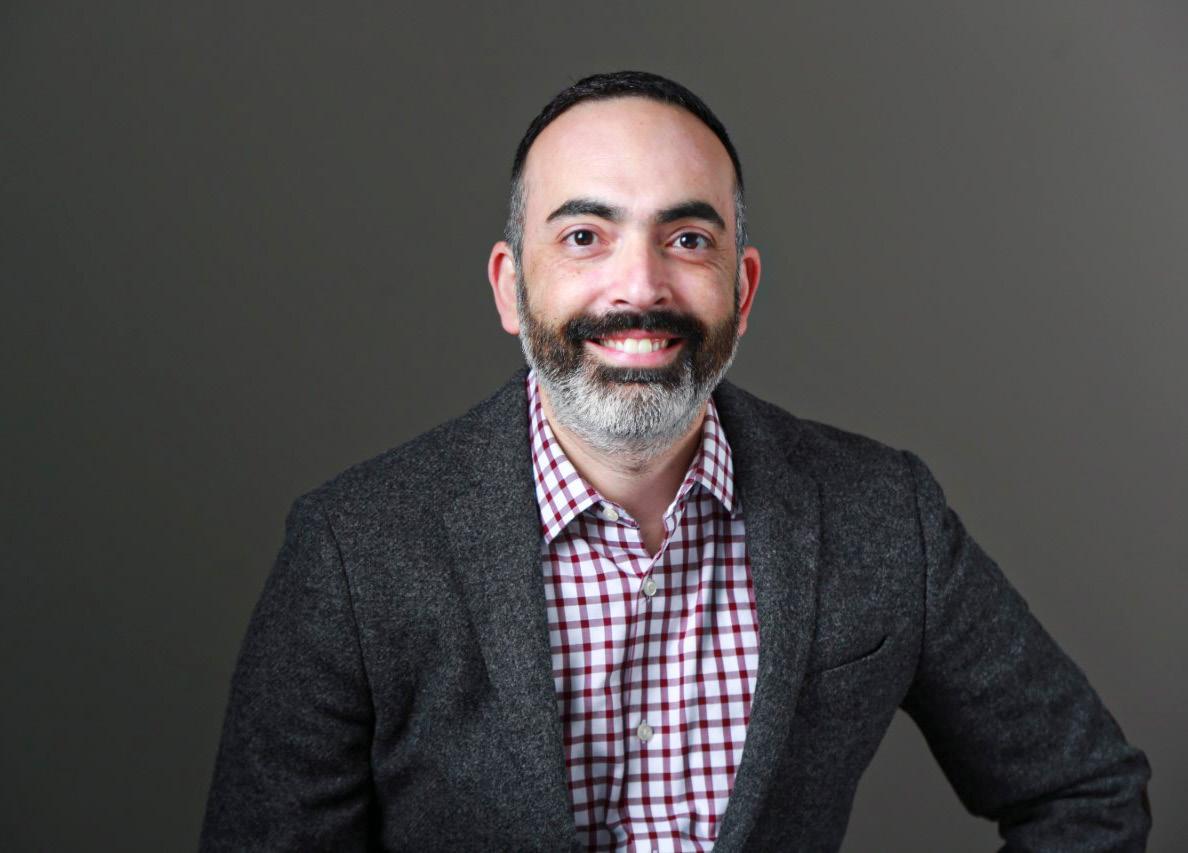
The New Frontier
BY STEPHANIE ZEILENGA
“TODAY,
DATA IS LIKE OIL IN
THE EARLY TWENTIETH century, when entire economies were built around discovering and monetizing a newly discovered resource,” says Pedro Pavón, director and senior corporate counsel at Salesforce. “Computer systems have always generated data, but due to the wide availability of the internet and the proliferation of the internet of things, data is now being generated 24/7 at an incredible scale. When you combine that with the increased computing power provided by the cloud, we can now unlock insights we couldn’t even have dreamed of just a few years ago.”
Following close on the heels of this deluge of data being collected and processed is a rapidly expanding crop of new data privacy and data protection laws and regulations, which present compliance hurdles for organizations that collect and process all this “new” data. Pavón, however, finds the challenge invigorating. “This is an amazing time to be a privacy lawyer,” he says, citing recently enacted laws in Europe, China, and Russia, and soon-to-be-enacted laws in India and Brazil. “Adding to the complexity is the fact that the US does not have a national privacy law, and some US states have decided not to wait and enacted their own data privacy laws. There’s also been a proliferation of state-level bills, and I expect more are on the way.”
While these data protection and privacy laws tend to have common themes and principles, there are also significant differences between them. Additionally, courts have been slow to interpret and expound upon
Pedro Pavón Director, Senior Corporate Counsel Salesforce
many new laws. “In some instances, there’s a widespread lack of clarity on how different laws interact and that makes it challenging to build a global data protection and privacy compliance program,” Pavón says. “In areas where we have a rule without a lot of guidance, privacy lawyers build a hypothesis of how we think a law will be interpreted and enforced, and we work with our stakeholders to implement a compliance strategy. Then we monitor the legislators and authorities and when there’s a new development, we have to act quickly to calibrate our approach. In the meantime, we’re planning contingencies in case there’s an unexpected or sudden regulatory development.”
COURTESY OF SALESFORCE 66 Strategy
For instance, Pavón helps manage Salesforce’s efforts to comply with the California Consumer Privacy Act, which went into effect at the start of 2020. “We’ve worked really hard to prepare and implement our CCPA compliance strategy,” he says. “Regarding CCPA, the end of 2019 was a fun but grueling process to get through all of the work necessary to prepare. Adding to that is the fact that there’s no ‘mission complete moment’—you plan, you build a compliance strategy, and then you react to changes as they come once a law goes into effect.”
Pavón has been interested in the intersection of technology and law since he was a student at the University of Florida’s Levin College of Law. When he graduated in 2008, he was determined to go into tech-related law but took a brief detour as the recession made jobs scarce. He first worked as an attorney doing immigration work for the Department of Justice. In 2012, he joined Carlton Fields, a Miami law firm, to help with their immigration work. He quickly reoriented, offering to help build the firm’s privacy and cybersecurity practice. Within a year, the practice was growing rapidly.
He took a deep dive into data when he joined tech company Oracle in 2014. “I got to be on the ground level as Oracle developed its data monetization strategy,” Pavón says. By the time he left Oracle in 2019, Oracle’s Data Initiatives legal team (which he led) had grown to eleven lawyers who provided counsel on data licensing, data protection, and data governance.
Ready for a fresh challenge, Pavón joined the cloudbased software company Salesforce in mid-2019. His responsibilities at Salesforce are broad: in addition to being a leader on data governance matters and CCPA compliance, he leads Salesforce’s privacy compliance efforts for Latin America and the Caribbean and serves as the privacy liaison to the company’s executive data governance boards. “Salesforce has some of the most interesting and complex data use cases in the world, and each one is scrutinized through Salesforce’s trust and transparency values to ensure we deliver the best possible customer solutions,” he says. “Part of my job is making sure that as we innovate, we remain consistent with our legal obligations, our values, and our promises to our customers.”
Pavón expresses a passion for ensuring that tech remains a force for good. He says data protection and privacy laws are an important step toward protecting individuals, but the legal field—particularly his area of practice—needs to work on including more people of color and people with unique backgrounds and experiences. “We want diverse voices included in the design and decision-making process as new laws and rules come into effect to make sure all this rapid innovation does not harm or exclude disadvantaged groups,” he says. “To that end, I try to spark interest in young diverse attorneys and diverse attorneys looking for career changes to explore a career in data privacy law.”
67 Hispanic
“We want diverse voices included in the design and decision-making process as new laws and rules come into effect to make sure all this rapid innovation does not harm or exclude disadvantaged groups.”
Executive
A Tradition Worth Preserving
Susy Ponce de Leon speaks to her family’s tradition of hard work and explains how her parents’ examples have inspired her success as an HR leader at Cable One
BY CORA BERG EDUCATION. HARD WORK. LOYALTY.
Susy Ponce de Leon has found in these values a recipe for success—one she learned from her parents, both entry-level workers who rose to middle management and modeled a work ethic that Ponce de Leon has replicated throughout her own impressive career.
But Ponce de Leon has not always been able to use her parents’ career paths as a guide. While her parents were able to attend university after high school, college was not on the table when Ponce de Leon immigrated to the US from Mexico City. Instead, she found a job in retail, and discovered a passion for human resources—a passion that allowed her
to further her education through companysponsored HR and management courses. “Leaders saw this work and gave me opportunities,” Ponce de Leon says of her studies.
Rising from that springboard, Ponce de Leon earned a bachelor’s degree in HR management from Judson University, as well as a master’s degree from the Keller Graduate School of Management of DeVry University. Today, she serves as director of business human resources for Cable One, a leading broadband communications provider serving customers in twenty-one states. In this role, she has been able to offer Cable One associates the same types of educational opportunities
68 Strategy
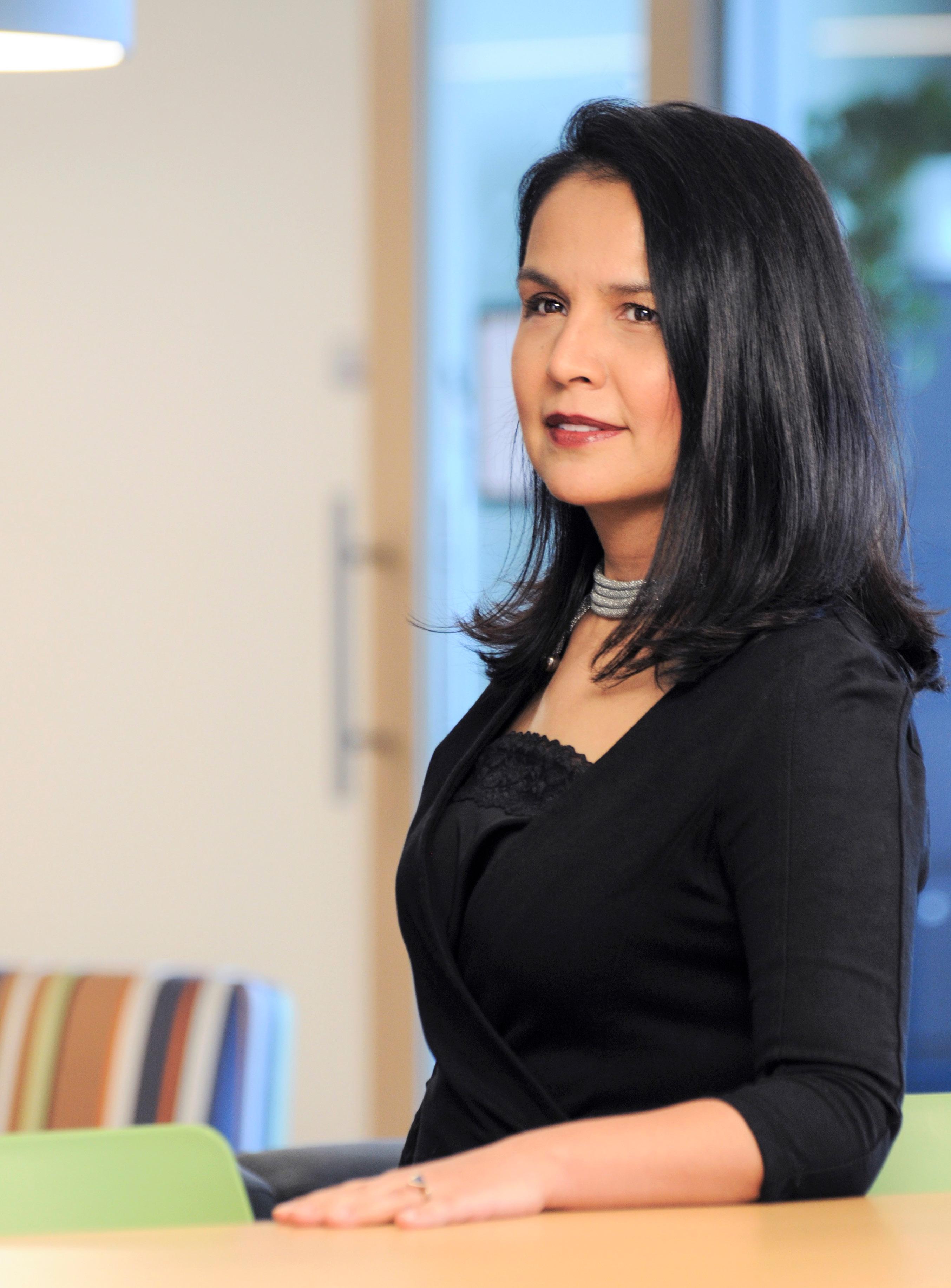
OMAR VALENCIA
Cable One 69 Hispanic Executive
Susy Ponce de Leon Director of Business Human Resources
that were so important to the development of her own career by spearheading companysponsored, online educational programs.
“I saw the opportunity to make learning accessible to associates from their phones or tablets or whatever they have available,” Ponce de Leon says. As she explains, Cable One offers an array of curriculum choices, including many programs that might other-
wise be cost-prohibitive. The only thing that should limit an employee’s ability to learn is his or her own interest in the programs, Ponce de Leon emphasizes.
“The power in this education is that it makes our associates owners of their destiny,” says Ponce de Leon. Nevertheless, she knows that truly accessible learning must have buy-in, recognition, and motivation from direct leadership. To that end, as she facilitates content, the HR director also facilitates conversations between associates and managers. “It’s more dangerous to not invest in associates,” she asserts. “Associates are going to leave if you don’t invest in them.”
Education is critical, but it is not Ponce de Leon’s singular solution for improving employee experience and output. “Engagement and development of associates is multifaceted,” she says. Some of her go-to methods for engaging associates include offering additional responsibilities and coaching leaders to navigate difficult situations with their teams.
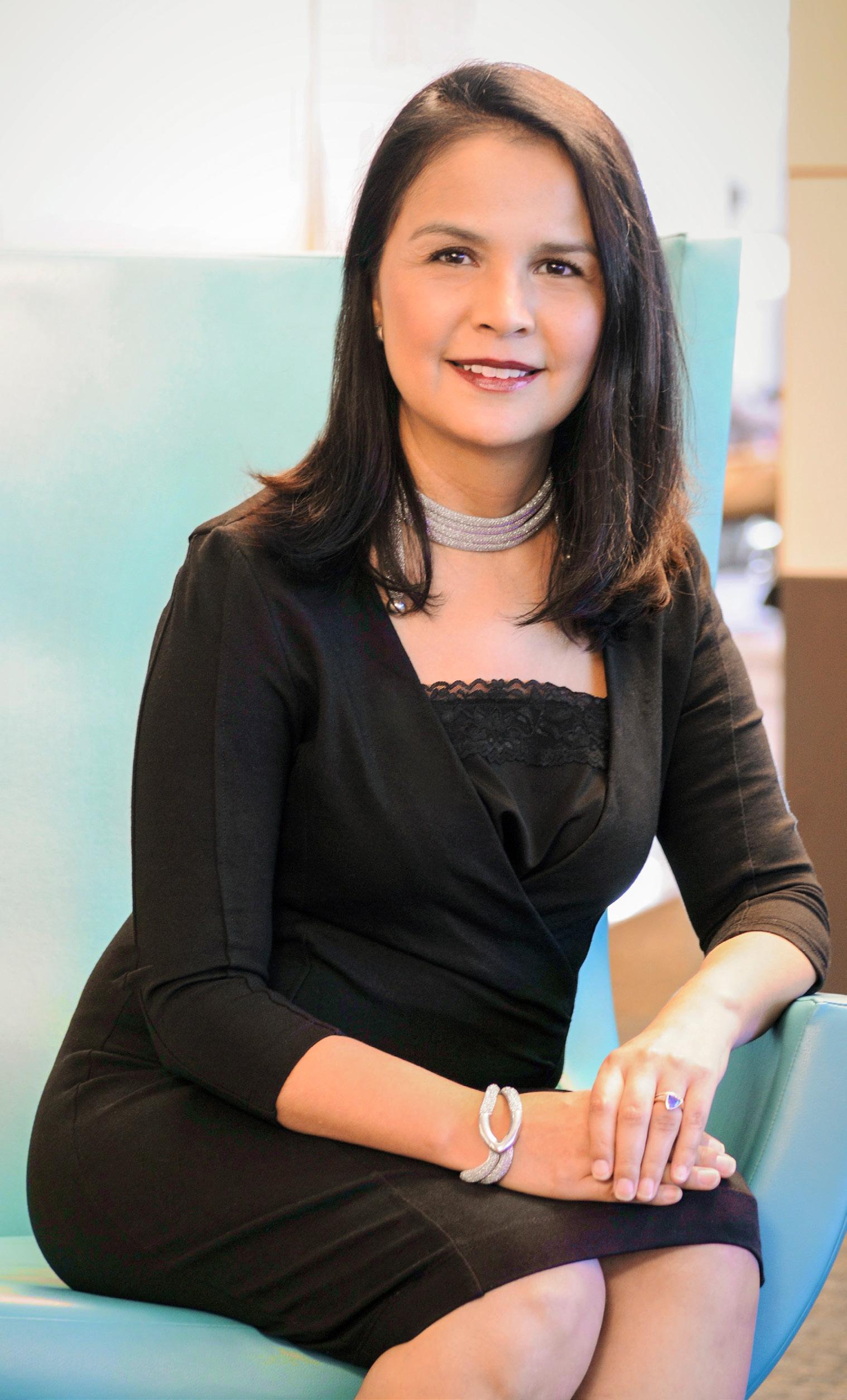
Ponce de Leon’s prioritization of associate engagement is mirrored by the company’s focus on culture. “Cable One has spent years building a culture founded on respect,” she emphasizes. “We are proud and protective of this culture.”
The director’s leadership style also relies on these tenets of empathy and respect. She is careful to delegate, build safe spaces, and encourage others to grow from their mistakes. “It is ‘when,’ not ‘if’ with mistakes,” Ponce de Leon points out. “The real question is, how do we recover? As a leader, you must allow associates to continue their growth and development.”
Ponce de Leon remembers one associate who was verging on termination when she began engaging them in conversation about the areas in which they needed to improve. The employee quickly understood the bene-
OMAR VALENCIA
fits of change, and was not only able to keep their job but was eventually promoted.


























Though well practiced in nurturing associates as well as adapting to the fast-paced environment that is HR, Ponce de Leon still looks to learn. In June 2020, she completed another milestone: graduation from the Betsy Magness Leadership Institute. Selected by Cable One to attend, Ponce de Leon spent a year with a cohort of other women leaders and executives working in telecommunications. She has already implemented new practices learned during her time at the Institute into her work as HR director. These include the strategic repackaging of training content in order to better acknowledge the reality of gender disparities at all levels.
At Cable One, however, which was previously owned by The Washington Post Company during Katharine Graham’s tenure and is now led by President and CEO Julie Laulis, Ponce de Leon characterizes herself as a proud member of a long line of women executives. This tradition plays out in many impactful ways throughout the company, says the HR director. In fact, her entire team took the afternoon off to watch The Post in theatres as a celebratory team building event.
When Ponce de Leon pauses to consider her journey, she is rightfully proud. “When I moved to the US twenty-six years ago, I had just a high school diploma and spoke limited English,” she recalls. “Now, I am director of HR at a publicly traded company.”





Ponce de Leon expects this tradition of hard work to continue: she and her husband will celebrate her daughter’s college graduation later this year. The HR director is eager to discuss her child’s already extensive list of accomplishments—accomplishments that are founded, she believes, on that same time-tested formula of success: Education. Hard work. Loyalty. And a touch of parental inspiration.

71 Hispanic Executive
> > > > >
“The power in this education is that it makes our associates owners of their destiny.”
congratulates SUSY PONCE DE LEON Director of Human Resources
Working on the Edge
BY ZACH BALIVA
How do you get beyond the cloud to the 5G frontier?
For StackPath’s COO Francisco Romero, the answer is simple: trust the facts.
A BROKEN WALKMAN CHANGED Francisco Romero’s life forever. Romero, who grew up in Mexico City, dismantled the personal stereo in his younger years in an effort to repair it. He tinkered for hours, and although he was unable to get the device working again, he grew fascinated by the wires and circuitry involved. A few years later, this desire to know how things worked, fix them, and build them led him to acquire the knowledge, tools, and parts necessary to build his first computer. Romero soon had a working machine, but then he learned he also had to figure out the software part. Each time he completed a task, it led to another challenge—and these experiences ignited a lifelong passion for problem-solving.
Today, Romero is chief operating officer (COO) at StackPath, a secure edge platform company that helps developers and enterprises alike deploy multiple workloads at the edge. He joined the company after eight years at SoftLayer, a Dallas-based cloud company that sold to IBM for $2 billion in 2013. After the sale, Romero helped launch the company into an aggressive growth phase as clients migrated from traditional IT to cloud-based environments.
72 Strategy
The incredible velocity at IBM SoftLayer put Romero’s passion for problem-solving to the test—the company needed exactly the right data center strategy to compete with other major players such as Microsoft Azure and Amazon Web Services.
As COO, Romero oversaw data center procurement, development, and operations for SoftLayer. Not only that, he set SoftLayer on a unique path that differentiated the company within the industry. While competitors built and operated their own data centers, Romero’s team partnered with six data center providers, which helped keep SoftLayer agile and able to meet growing demand as domestic companies migrated to the cloud.
But now, Romero says, “edge computing” is the next wave of technologies complement-
ing the cloud. Many industry experts say that most data will move to an edge environment before the end of 2025 as 5G networks push connectivity to new limits, which means service providers need more speed, bandwidth, and security than ever before.
However, most providers don’t know exactly how customer use and preferences will change or evolve. Providers are therefore obliged to operate in an ecosystem that includes video on demand, artificial intelligence, drone delivery, home automation, voice assistance, self-driving cars, and more. In many ways, edge computing is the new Wild West—and it’s a $20 billion playing field.
Enter StackPath. Its cofounders, including former SoftLayer CEO Lance Crosby, started the company in 2015 to solve
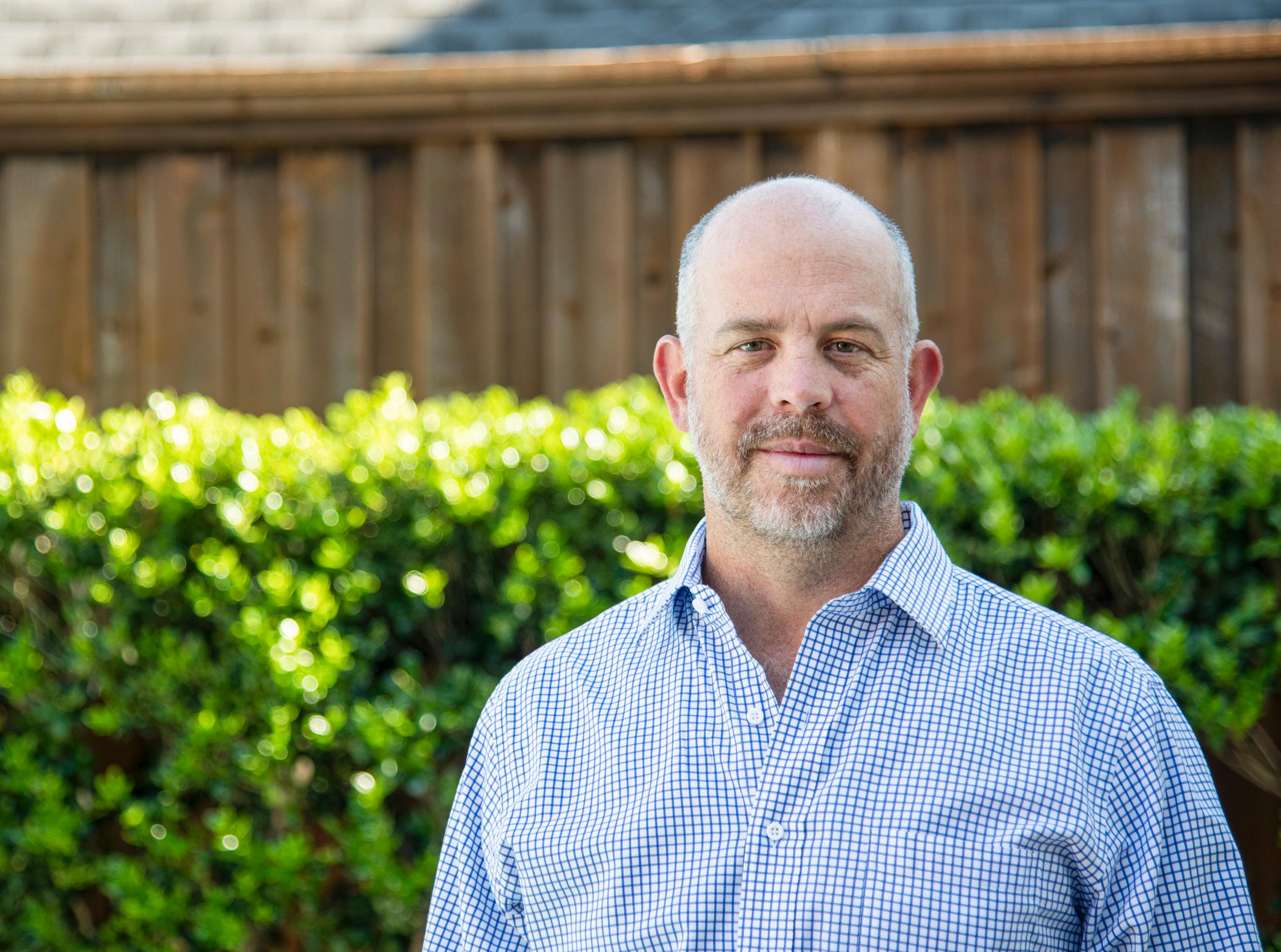
a desegregated IT environment security problem. Romero joined in 2018 to develop core augment management capabilities and execute a push on the business intelligence front. “This is a problem-solving task,” he says of his role as StackPath COO. “We are developing new ways to help companies and service providers operate in a volatile sector where scalability is a huge factor.”
In its first three years, StackPath acquired six companies with critical security technologies. Together, they provide a unique offering that includes automation, virtualization, computing, storage, and networking components. Customers use StackPath services to deliver services at the edge from websites and media all the way to sophisticated compute deployments in fast and secure environments.
COURTESY OF FRANCISCO ROMERO
Francisco Romero COO StackPath
PARTNERING TO MAXIMIZE VALUE
In November 2019, StackPath completed a Series B round of funding led by Juniper Networks and Cox Communications, bringing its total equity raise to nearly $400 million. The new infusion will help StackPath augment activities that Romero manages, including engineering and product development. “We are one of the only players ready today to provide edge solutions that we can scale so service providers can migrate to 5G networks and operate advanced workloads,” the COO says.

With Cox and Juniper helping StackPath find new opportunities around the globe, Romero and his colleagues are focused on attracting customers and pushing their platform to be the very best that it can be. In this phase, Romero manages roughly two-thirds of the company and is responsible for developing highperforming teams that build services, run infrastructure, provide support, and operate StackPath’s content
Each day is an exercise in problemsolving, and Romero says he looks to one particular thing in the course of making each and every decision: data. “My strategy is to assemble all the information and let that information guide the process,” he explains. Recently, a team lead asked Romero for his input on scheduling support teams. Should StackPath build 24/7 support, or provide a few on-call specialists?
Romero asked his associate to review previous support requests and mine the data for incident frequency, duration, and timing. Armed with that
information, he was able to make an informed decision that would not only provide the best customer service but also make the most financial sense.
Romero traces this habit back to his days as a chemical engineering student at the Universidad Nacional Autónoma de Mexico. “Since chemists can’t see what atoms are doing, they have to look at outcomes and piece together what happens. Businesses and organizations are the same way,” Romero points out. “The data will ultimately paint a picture that tells you what you need to know.”
The COO’s data-driven approach is helping StackPath thrive. The company has emerged as a market leader, and today, Romero and his colleagues are helping clients such as Steam, PBS, This American Life podcast, and Bootstrap push performance past the limits of the cloud and to the very edge.
“The data will ultimately paint a picture that tells you what you need to know.”
74 Strategy
Riveron is a business advisory firm specializing in accounting, finance, and operations.
We partner with
LEARN MORE AT RIVERON.COM
Riveron, a business advisory firm specializing in accounting, finance, and operations, congratulates Francisco Romero and StackPath for being named leaders and cutting-edge innovators in technology. We have proudly partnered with StackPath and Francisco for many years and look forward to continuing to support the team in their ongoing commitment to innovative excellence. riveron.com.
ENTRE PRENE URS Entrepreneurs
76 Bernie Navarro, Benworth Capital
81 Claudia L. Mercado, Calibueno and Joseph Huayllasco, Ciclo
84 Diana Abril, Abril Law PLLC
Perhaps the ultimate form of leadership is business ownership, and the Latino community is rich with entrepreneurs. The men and women featured here tell stories of risk, reward, and the lessons learned along the way.
Community Activist
BY WILL GRANT PORTRAITS BY SONYA REVELL
Bernie Navarro isn’t just an executive who’s active in his community. He’s also put his passion to work by activating his community and fostering educational and business opportunities for those who call Miami home.
76 Entrepreneurs
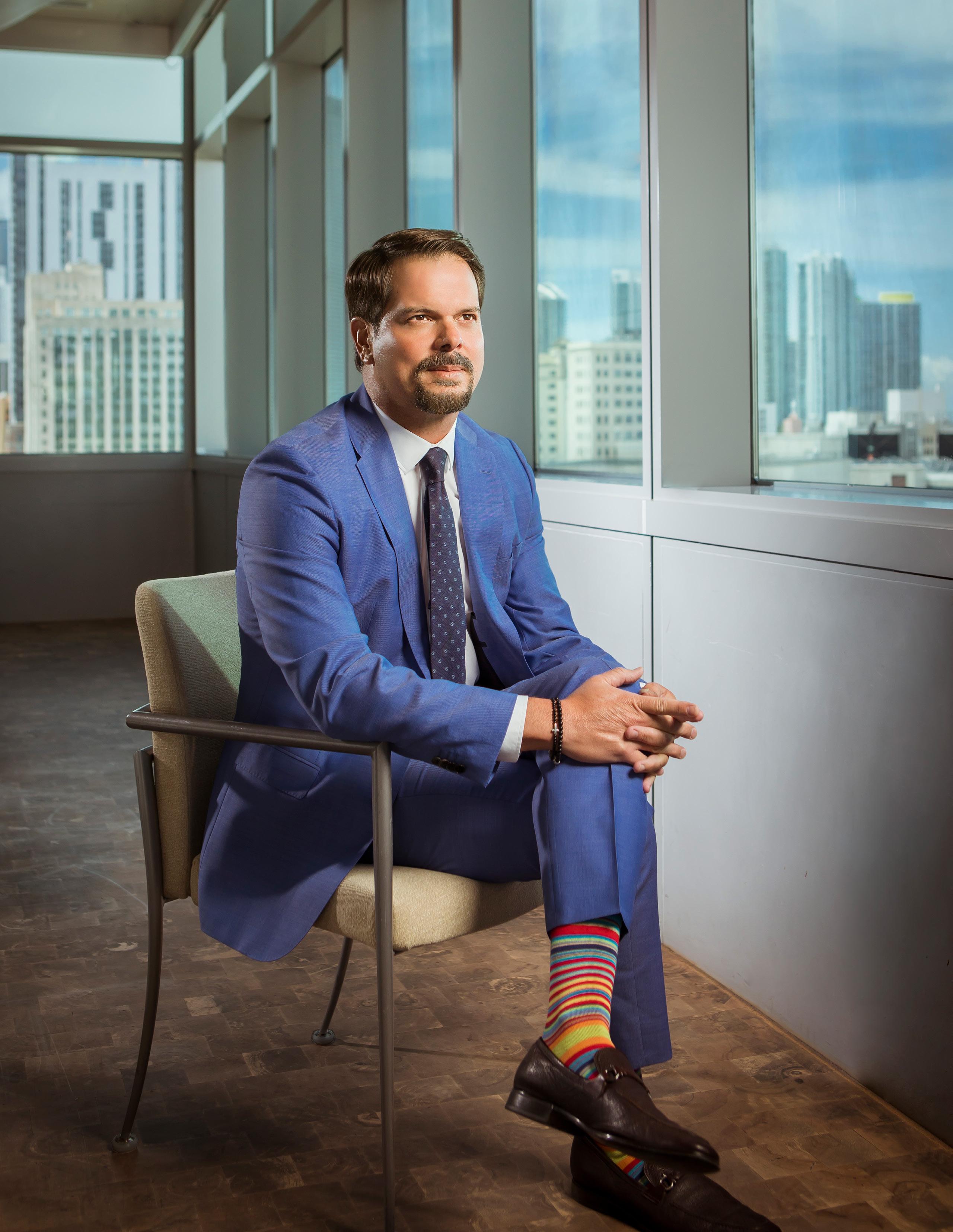
Bernie Navarro isn’t a tattoo guy, but if he was, he knows exactly what it would be.
“It would have to be Miami,” the president and founder of Benworth Capital says with a laugh. “This community has been such a wonderful experiment. It’s a petri dish of what the future holds, and it’s a place I’m so passionate about.”

The son of Cuban immigrants isn’t just a byproduct of one of American’s most dynamic and culturally diverse cities. Navarro has also positioned himself and his business to act as strong shoulders for the next generation of Hispanic leaders and business owners to build their own dreams upon.
As founder of the Latin Builders Association (LBA) Construction and Business Management Academy and now as chairman and a governor-appointed member of the Board of Trustees for Miami-Dade College, the largest and most diverse college in the United States, Navarro is looking to extend opportunities even further down the pipeline, helping those who may not yet know their career direction to at least be given the education necessary to empower them on their journey.
THE LAW OF CONTRARY PUBLIC OPINION
Navarro founded Benworth in 2008 after selling his previous company, HomeMortage, at precisely the right time. “It was late 2005, and I remember all of our clients and customers telling us we were crazy for selling because
it was in the midst of some of the best financial times for our market,” Navarro says. “But something told me differently.”
The timing proved absolutely correct, with a massive economic downturn just around the bend. “But when we decided to open Benworth, we were once again told we were crazy,” Navarro recalls. “Who would open up a lending firm at a time like this? But I thought we had a great opportunity to impact our community, and those contrarian approaches have proven to be fruitful for the people we serve.”
Benworth isn’t a traditional lending firm, Navarro explains. To the general market, Benworth is a private lending firm, but it also acts as an investor in real estate secured assets. Whether you see the firm as a lender or investor depends on your individual needs and relationship with the company. In this way, Benworth perfectly capitalizes on Navarro’s passion for real estate as well as his talent for innovating and balancing both disciplines of finance.
According to Navarro, Benworth focuses on helping those who are looking for an alternative to traditional loans from a bank or credit union. “For some borrowers, there’s an educational component that’s an essential part of our business,” Navarro says. “We work to educate our borrowers to make sound decisions and eventually apply for a more conventional loan. Our approach is, how can we help the borrower get where they want to be?”
Bernie Navarro President Benworth Capital
78 Entrepreneurs
WITHOUT AGENDA
Benworth is able to act as a bridge for those looking to make investments in their future, many of whom may have stories similar to Navarro’s. Growing up in Miami, Navarro went without many opportunities—but his parents were determined to put their son through college, one way or another. His mother began working with the local church to take care of children after school and, as
Navarro recalls, one parent in particular was always very appreciative of the care Navarro’s mother provided.
“One day when I was in junior high, Mr. Balter looked at me in front of my mom and asked if I wanted a job,” Navarro says. “I said sure. And he said, ‘Well, this job pays for your college.’” Mr. Balter turned out to be the director of purchasing at the University of Miami, and the kindness of Navarro’s mother
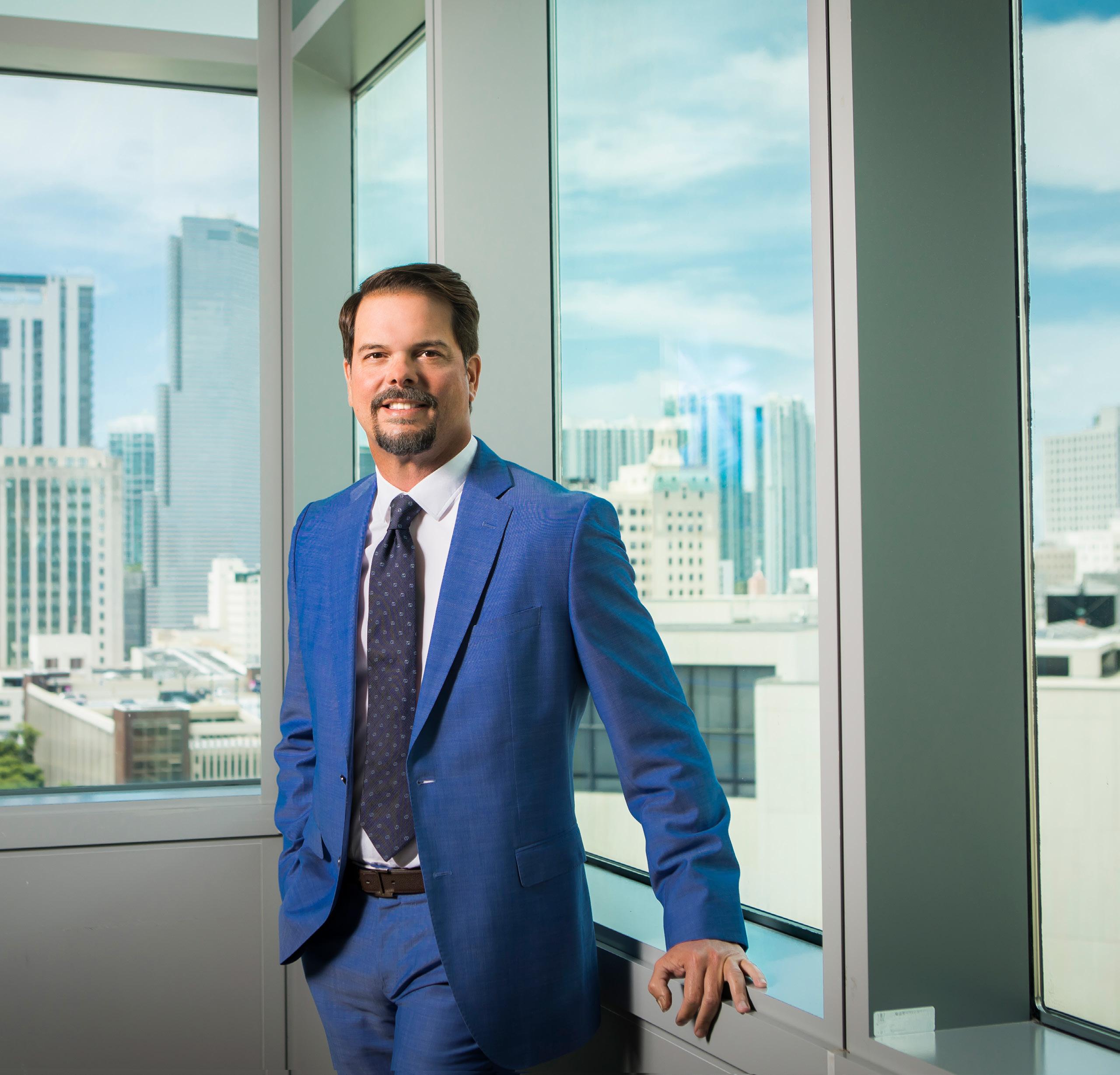
had left such an impact on him that he was willing to do whatever he could to make sure the young Navarro had every opportunity possible to succeed.
The experience has obviously informed Navarro’s own approach to his life and career: to give without agenda. “I think it can drive people a little crazy around here sometimes, but I just try and tell them, ‘Do the right thing, and the money will follow,’” Navarro says.
GUIDANCE IN A PANDEMIC
Always active in his community, Bernie Navarro has become a key guide and educator during the COVID19 pandemic. Navarro and Benworth Capital created both SBABizHelp.com and SBAayuda.com to educate small business owners on the Paycheck Protection Program (PPP).
But Navarro was also concerned that banks wouldn’t be able to keep up with borrower demand, so he went through the process to become one of the few nondepository, SBA-authorized lenders for the PPP in the nation. Thus, Benworth has become a sought-after provider to businesses and individuals too often ignored by traditional lenders, including gig-economy workers, rideshare drivers, and independent service providers.
“Give your time, your energy, or your effort to something you’re passionate about and the rest will always follow. Just do what feels like the right thing; that’s worked for me.”
BUILDING BRIDGES
One of Navarro’s passion points is expanding educational opportunities for Miami’s residents, a mission he has been able to see come to life thanks to his knack for facilitating successful collaboration between political, educational, and business sectors. It is this talent for bringing people and organizations together, Navarro believes, that has empowered his success throughout his career.
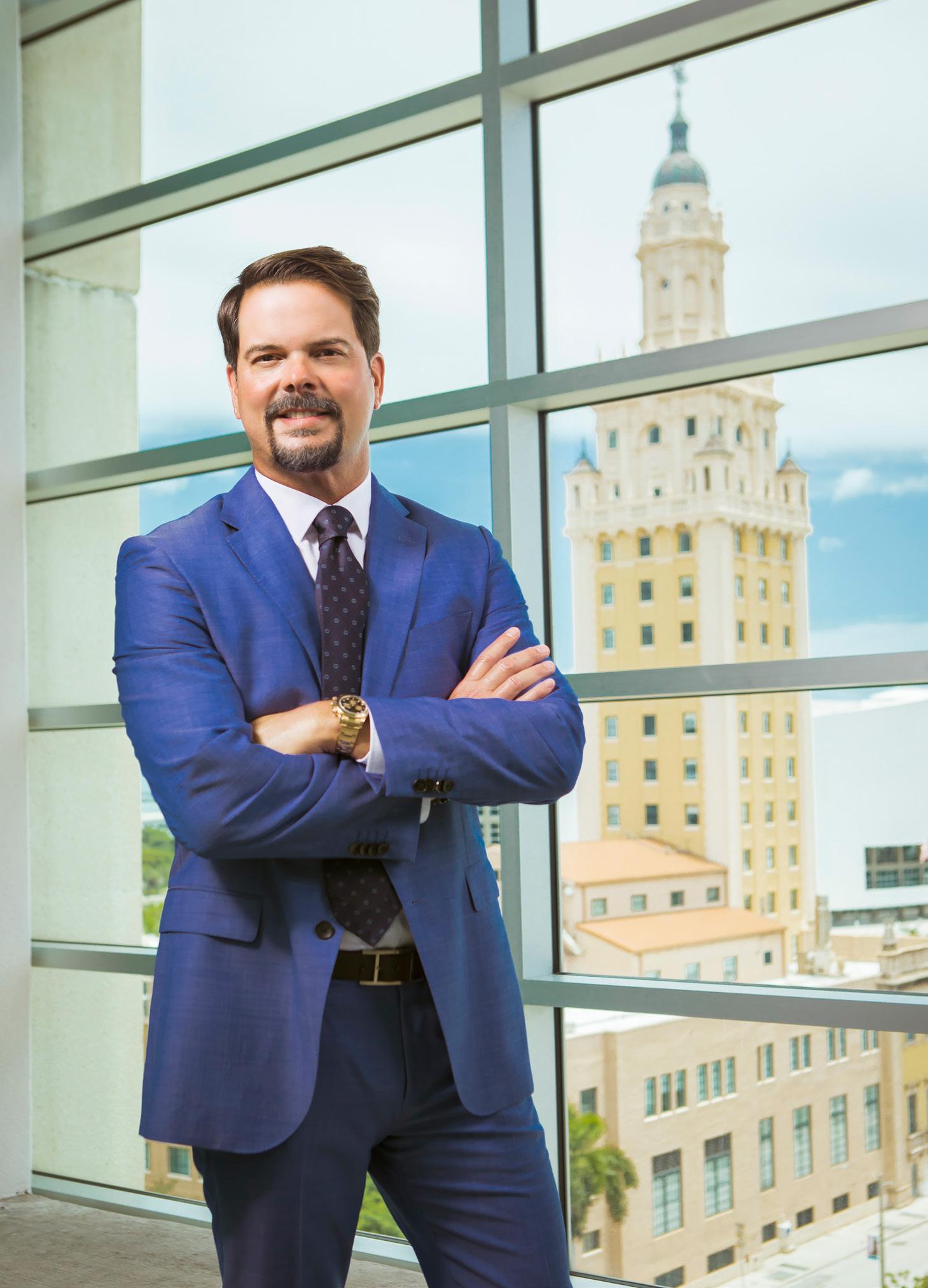
“My father has always told me that I have a knack for convening, for getting people together,” Navarro says. His father now has
an office at Benworth next-door to his son’s. “When you do that without ulterior motive, it just works out. And to do that, I need to know what is going on in my community. Maybe it’s a little nosy, but that’s just how it works. Be present and bring people together.”
“Give your time, your energy, or your effort to something you’re passionate about and the rest will always follow.”
Value Over Volume
BY BILLY YOST
Claudia L. Mercado and Joseph Huayllasco want to create generational wealth for Latinos in the cannabis industry
THE 2016 PASSAGE OF PROPOSITION 64, also known as the Adult Use of Marijuana Act, triggered a gold rush. Many who thought they might be able to capitalize on the legalization of marijuana in California rushed to get in on private equity and venture capital efforts. But the sad irony of a massive cash influx supporting the burgeoning cannabis industry while, that same year, more than six hundred thousand people across the nation were arrested for marijuana possession was not lost on Calibueno Founder Claudia L. Mercado, or Ciclo Cofounder Joseph Huayllasco.
“There is the real possibility of the same thing happening in this new industry that has happened so many times before,” Huayllasco says. “We’re talking about communities that have traditionally been disenfranchised, and this was another case of barriers to entry into a new market essentially locked out by Wall Street.”
81
Executive
Hispanic
Claudia L. Mercado Founder and CEO Calibueno
This time will be different if Mercado and Huayllasco have anything to say about it. Both entrepreneurs aim to create community-minded, transparent, and inclusive opportunities for growers, producers, and manufacturers in the cannabis space. In fact, Mercado’s Oakland-based microbusiness Calibueno has refused to pursue short-term investments by parties that only seem interested in making a fast buck.
“We obviously want to make money, but we believe in sharing that with our communities,” Mercado says. “Our focus is on providing cannabis at affordable price points while educating and inspiring our community. We want to make sure the relationships we develop are value-aligned for that purpose.”
Meanwhile, Huayllasco has continued to cultivate relationships with growers, producers, and manufacturers using a best-in-class software that was built by Ciclo specifically for the cannabis sector. An independent cannabis technology start-up, Ciclo offers a compliance and enterprise resource planning platform for legal cannabis businesses of all sizes.
SHARING IS THE POINT
The intersection of Mercado and Huayllasco’s work is one they both describe as serendipitous. After meeting through a mutual colleague, Mercado found herself impressed with Huayllasco’s deep foray into global financial money management and success as a Latino in a primarily white environment.
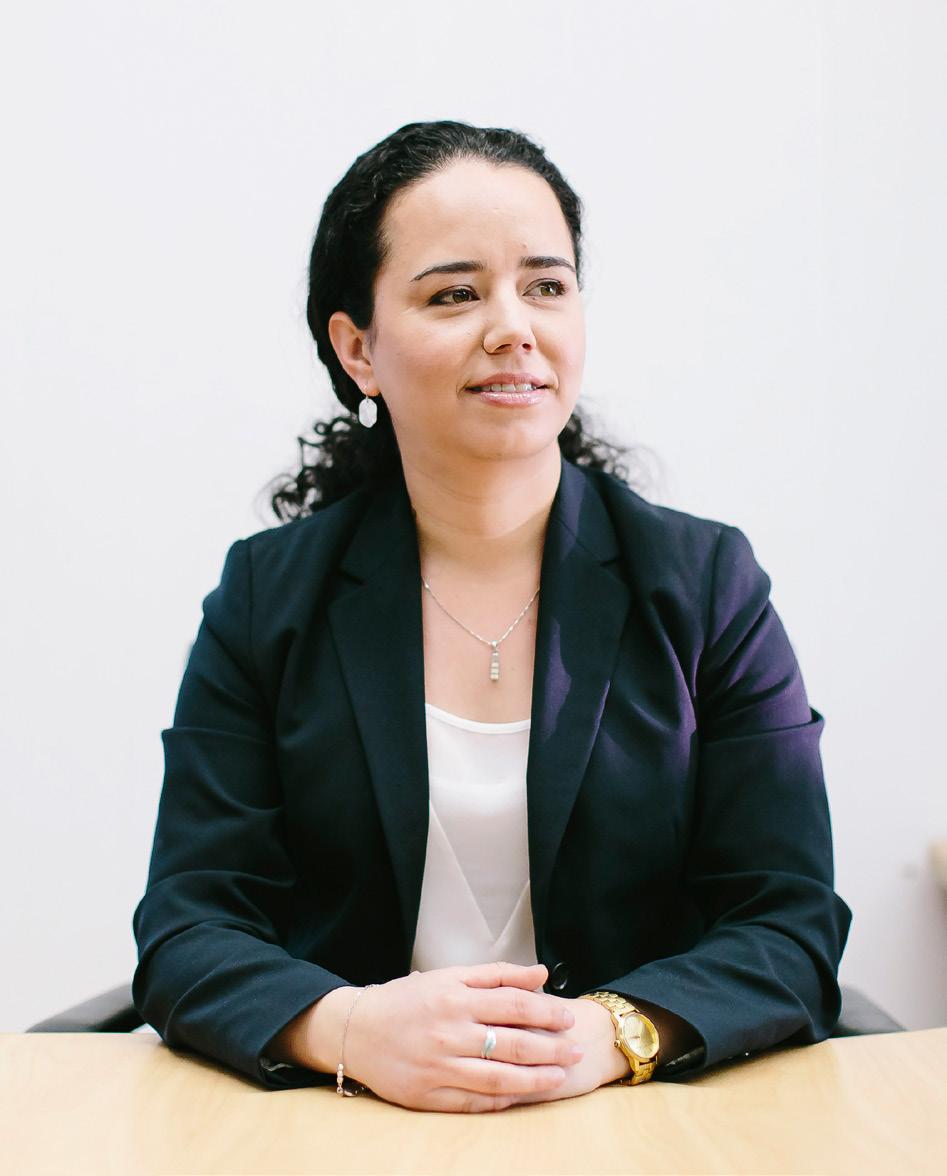
“I think when I met Claudia, she was looking at software in the space for this new industry because being compliant was going to be such a big part of the cannabis market,” Huayllasco remembers. “What I quickly found was that most of the technology was either very old or not really fit for cannabis.”
Huayllasco realized he might have the answer in-house at Ciclo, which was founded in January 2019. “We have a platform called Chasqui that we had used for market trading and, more generally, processing data,” he explains. But as it turned out, Chasqui could also be utilized to track and trace product from the source to the counter, creating an unprecedented amount of transparency for everyone involved in the cannabis journey to see exactly where and how their cannabis was winding up in dispensaries. Both Mercado and Huallasco realized they were sitting on proprietary technology that could be applied to the cannabis space and be a true differentiator for Calibueno.
“Anyone with any amount of business experience would tell you not to do what Claudia has done,” Huayllasco says, laughing.
KATIE MONROE
“I hope the collaboration we’re talking about here can be reproduced in other industries. That’s how it should be.”
82 Entrepreneurs
—CLAUDIA L. MERCADO
“She immediately began sharing this technology with people in our community who are technically her competitors. But we want to help the community, and I’d like to think we’re putting our money where our mouth is.” Huallyasco says financial barriers to entry of industry tend to adversely affect minorities, and Chasqui is an affordable (and ideal) way to overcome that barrier.
Mercado sees the bigger picture as well. “California is 39 percent Latino, so if we help the rest of the world see what a successful industry this can be with wider representation, we’re not only doing right by the state, we’re helping enrich our communities as well. The future is Latinx,” she emphasizes.
THE PROSPECT OF GENERATIONAL WEALTH
The reason Mercado has been evangelizing Ciclo’s Chasqui platform is the same reason Calibueno has been so reticent about getting involved with venture capital money—even though it would surely make the bootstrap operation easier to manage.
“That big money hasn’t come yet, and most of our financing has been from family, friends, and angel investments,” Mercado says. “It’s because we know we can do this and do it right. We want to be able to help create generational wealth and health in Latino communities, and that is where our values lie.”
For all practical purposes, this lack of venture capital has made every step of the journey more difficult, but both Mercado and Huayllasco have bigger hopes than instant wealth. “I have worked for large money managers, on trading floors and in portfolio managers and trade operations,” Huayllasco says. “I know how money gets made and how it moves. So, what I want to do is bring our talents to underrepresented groups and give them a shot. It’s still not an entirely fair shot, but it’s a leg up that gives us hope for the future.”
“I wanted to step into this industry to act as a role model for other Latinas and Latinos, and I’m sure Joseph did too,” Mercado says. “We want to have a social impact and inspire the coming generations.”
While things have changed for both Mercado and Huallyasco since coming together to get Ciclo and Calibueno on their feet, they’ve both moved in the right direction. “While we don’t talk at two or three in the morning anymore, I think that’s a positive sign,” Mercado says with a laugh. “We both took on a job to help jump-start this machine to some extent. I hope the collaboration we’re talking about here can be reproduced in other industries. That’s how it should be.”
Joseph Huayllasco Cofounder Ciclo
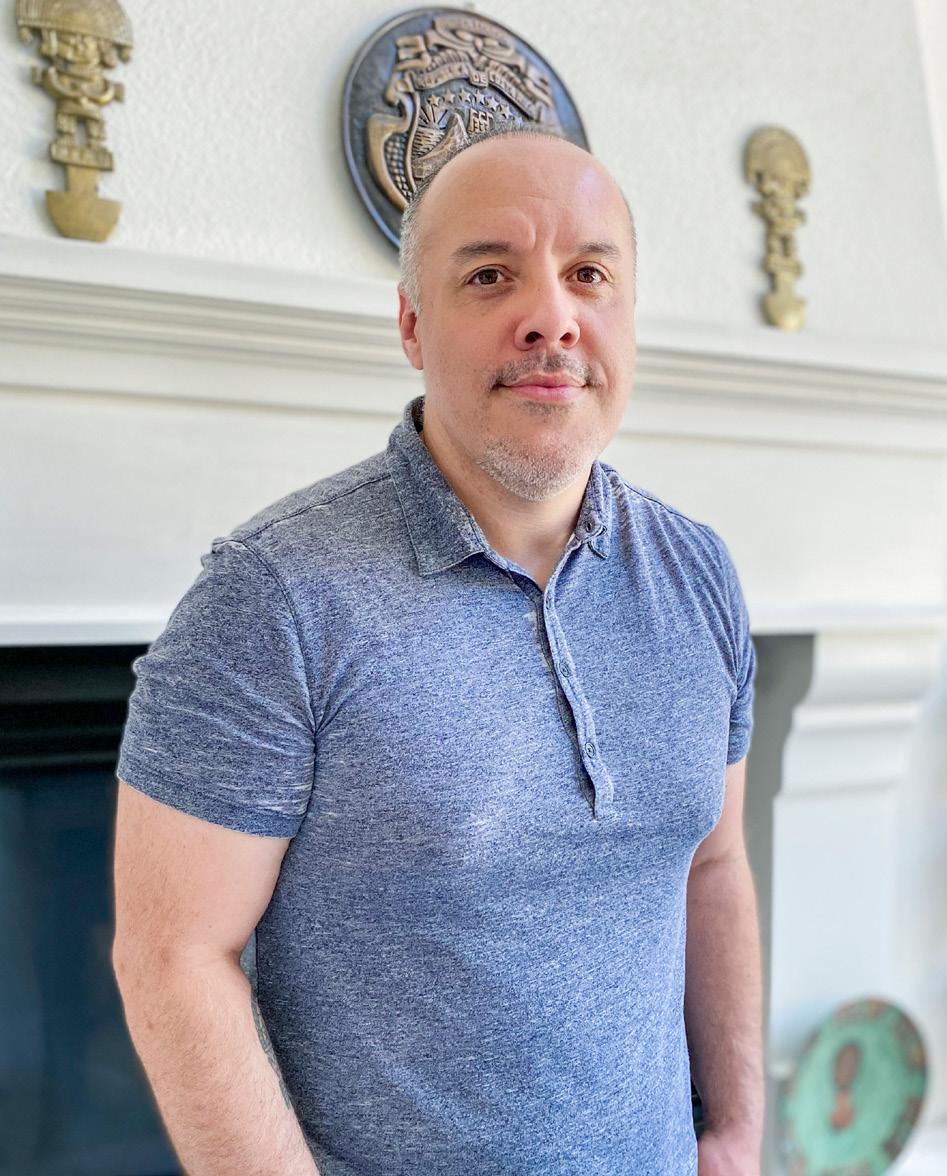
TIFFANI LOPEZ
“We want to help the community, and I’d like to think we’re putting our money where our mouth is.”
83 Hispanic Executive
—JOSEPH HUAYLLASCO
Veteran corporate attorney Diana Abril on launching her own firm and branching out into a new practice area in order to help children with disabilities and their families
Navigating a New Niche
BY BRIDGETT NOVAK IF YOU HAD TOLD DIANA ABRIL YEARS AGO
that one day she would be starting her own law firm and adding special education law to her areas of practice, she wouldn’t have believed you.
After graduating from Nova Southeastern University’s Shepard Broad College of Law in 2004 and earning a civil law degree from the Universitat de Barcelona in 2005, Abril joined Am Law 200 firm Carlton Fields as a corporate associate. Three years later, at the age of thirty, she accepted the general counsel position at eLandia, a public global technology and telecommunications company. And in 2012, she was offered the general counsel role at Whitney International University System (now Ilumno), which provides virtual and other state-of-the-art services to higher education institutions throughout Latin America.
“I love corporate law,” Abril says. “From helping entrepreneurs and companies make their vision a reality by incorporating, drafting their business contracts, negotiating deals, and navigating mergers and acquisitions, it’s extremely mentally engaging.” Indeed, in 2013, she added to her skill set by earning a certificate in Intensive Negotiations for Lawyers and Executives from Harvard Law School’s Negotiation Institute.
A native Colombian—her family moved to the United States when she was ten years old—Abril also
developed an expertise for navigating deals in Latin America, which she did extensively at Carlton Fields and for the eleven-plus years she was with eLandia and Ilumno. While at eLandia, she focused on public company work. Of her work at Ilumno, Abril says, “That was exciting work. We were on the cutting-edge of the online learning movement.”
When Ilumno decided to reorganize and focus more of its operations in Colombia, Abril saw it as an opportunity to become her own boss. “I wanted to take my career into my own hands,” she confirms. So, in February 2020, she launched Abril Law PLLC, which focuses on both domestic and international corporate law, outside general counsel services, and special education law and advocacy.
Offering outside general counsel services means she’ll be providing small and medium-sized businesses, start-ups, and even nonprofits with the legal expertise required to handle business-related transactions—without adding to their overhead. “Lots of companies can’t or don’t want to support the costs of having an in-house attorney, and large law firms’ fees can be prohibitive. As a solo practitioner, I can offer clients flexible, alternative billing structures. It’s a really good option, particularly in this era of costconsciousness,” Abril says.
84 Entrepreneurs
Though Abril has been practicing corporate law for fifteen years, special education law is a new arena for her. Since the birth of her now four-year-old autistic son, she has discovered firsthand the challenges parents with disabled children face, particularly when it comes to educational opportunities.
As a special education attorney, Abril will not only help parents navigate the myriad laws and regulations protecting children with disabilities at schools but also help them to understand their rights and develop strategic plans for their child’s education.
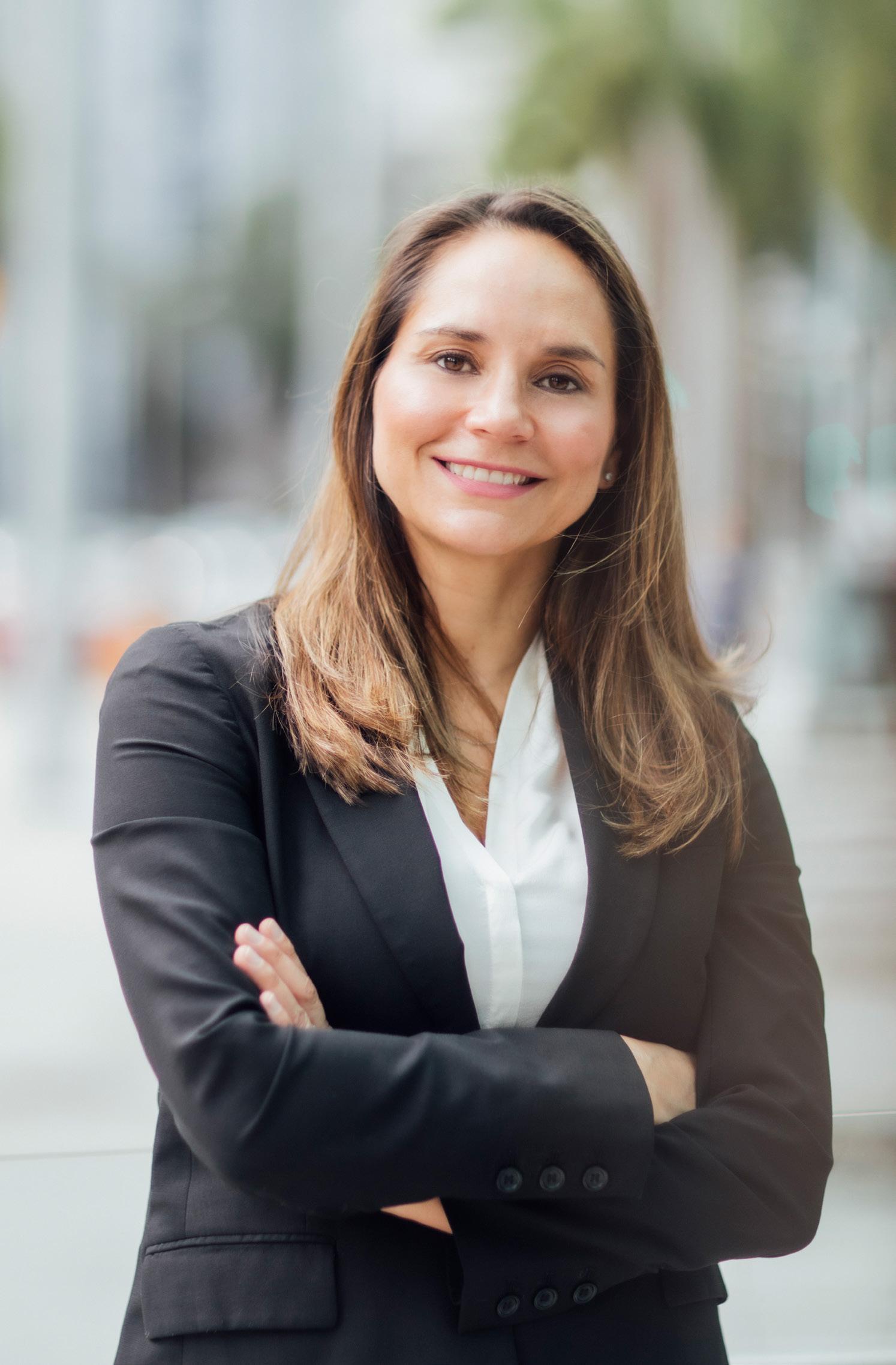
“When a child has a disability and qualifies for special education services, the parents are entitled to develop an Individual Education Plan (IEP), along with
the school, if they are in the public school system,” Abril explains. “The plan outlines their educational goals, any additional services they might require—like speech, occupational, or physical therapy—and any special accommodations they may need. The process is intimidating and can be overwhelming, especially the first time going through it.”
If disputes arise between parents and the school, Abril will represent the child and parents. She’ll also spend time educating people and dispelling myths. “Some people think disabled children necessarily require a separate education,” she notes. “However, what is ideal is to have children with disabilities included with their typical peers as much as possible, with all the appropriate supports.
“In fact,” Abril continues, “research shows that children with disabilities have much better outcomes when integrated with non-disabled children.”
In addition to taking on this new practice area, starting her own firm has presented Abril with all sorts of new challenges. “There has been a steep learning curve,” she admits. “Going off on your own and founding your own business means you have to do it all, from administrative work like setting up bank accounts, billing and accounting systems, practice management software, and getting insurance to creating your business plan and making strategic and marketing decisions. It’s given me a new perspective.”
According to Abril, talking to other attorneys and business contacts who have launched their own firms and businesses has really helped her navigate the various challenges that have come her way. “In addition to providing great advice, the most valuable thing they have done is to provide unwavering support through the process,” she says. “They told me if they could do it and be successful, I can do it just the same. That kind of encouragement from my colleagues has been priceless.”
ANITA ANDRADE
“They told me if they could do it and be successful, I can do it just the same.
That kind of encouragement from my colleagues has been priceless.”
Diana Abril Founder, Managing Member Abril Law PLLC
Keepers of Community
86 Keepers of Community
The healthcare industry is under greater demands than ever before to safeguard the health of patients, frontline workers, and entire communities. These executives are rising to the occasion. 88 Andrew Ortiz and Arthur J. Ochoa, Cedars-Sinai 96 Cindy Alvarado, Pacira BioSciences Inc. 101 Sergio Melgar, UMass Memorial Health Care 105 Virginia Lazala, Novartis Pharmaceuticals 108 Carlos Soto, Takeda Pharmaceuticals 113 Peter Perez, Highmark Inc. 118 Laura Morales Garcia and Edwin Millan, AIDS Healthcare Foundation 121 Lorena Gomez, Allergan
Illustrations by Carlos Zamora
87
Executive
Hispanic
Native Suns
Arthur J. Ochoa and Andrew Ortiz offer two Los Angeles lifetimes of knowledge to help Cedars-Sinai better serve its diverse community
BY BILLY YOST • PORTRAITS BY RACHAEL PORTER
88 Keepers of Community
Since 1961, the year when Cedars of Lebanon Hospital merged with Mount Sinai Hospital, Cedars-Sinai has served as a hub for cuttingedge medicine, research, and education for the city of Los Angeles, an ever-evolving, ever-complex metropolis that demands innovation from its institutions.
So, the fact that the two highest-ranking Latinos at Cedars-Sinai also happen to be native Angelenos seems more than a bit smart and purposeful. Who better to lead a foundational LA medical center than those who grew up living and breathing LA?
Senior Vice President and Chief Human Resources Officer Andrew “Andy” Ortiz and Senior Vice President of Advancement and Chief Advancement Officer Arthur “Art” Ochoa have spent the bulk of their lives on the West Coast, and via Cedars-Sinai each has discovered an outlet to showcase their commitment to Los Angeles by serving its extensive patient population on a grand scale and helping the city’s most vulnerable find the medical help they often desperately need.
Better Understanding Breeds Better Outcomes
Ochoa grew up in Eastside Los Angeles, first experiencing very little interaction with Cedars-Sinai before eventually coming to grasp the hospital’s reach and reputation. “I first interacted with the organization when I was able to represent Cedars-Sinai in some transactional matters,” Ochoa, a Yale-educated lawyer, explains. “It was then that I came to really understand what a truly special place this is, especially for someone who has grown up in Southern California.”
89 Hispanic Executive
There may not be another American health system more woven into its community than Cedars-Sinai.
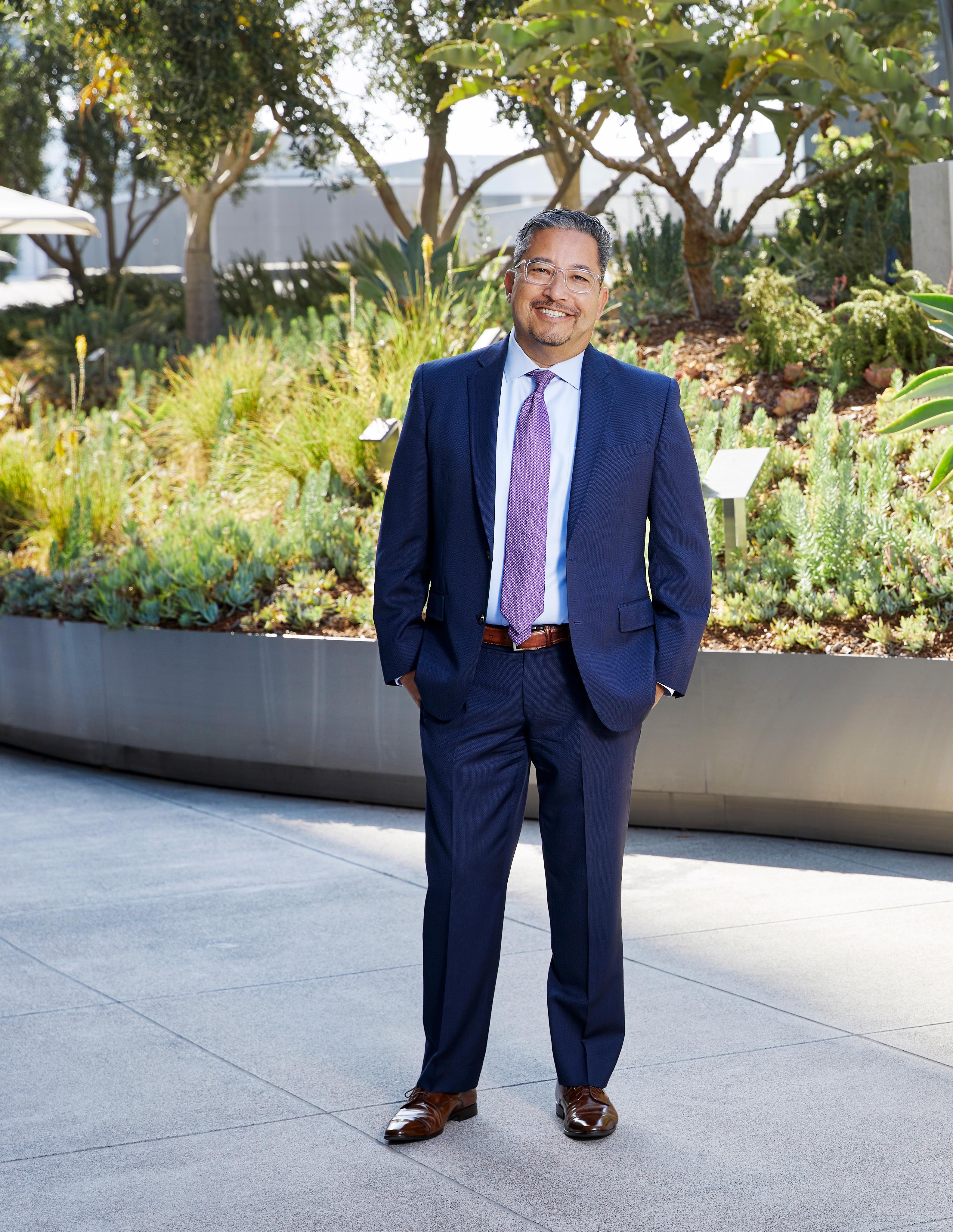 Andrew Ortiz SVP and CHRO Cedars-Sinai
Andrew Ortiz SVP and CHRO Cedars-Sinai
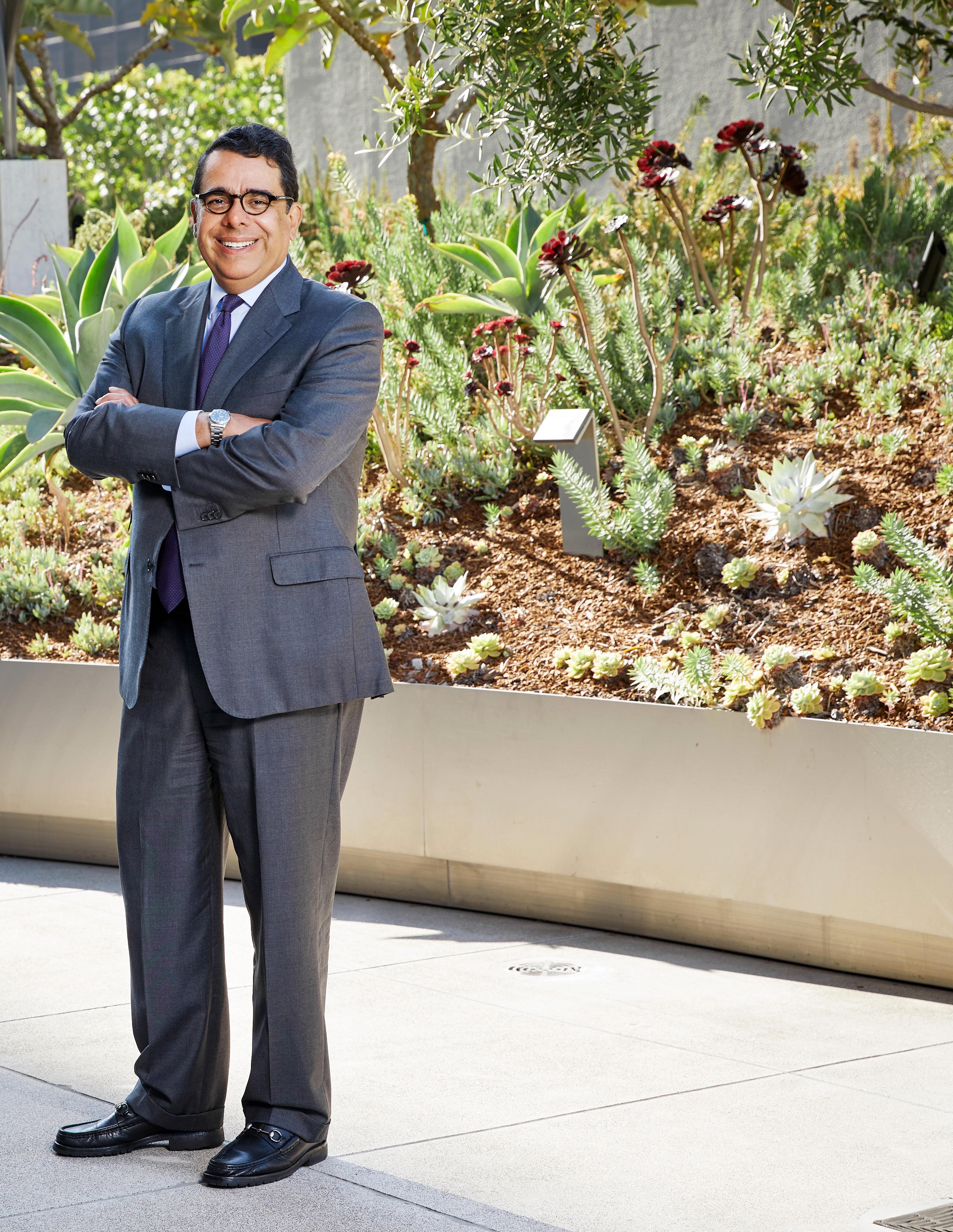 Arthur J. Ochoa SVP for Advancement and Chief Advancement Officer Cedars-Sinai
Arthur J. Ochoa SVP for Advancement and Chief Advancement Officer Cedars-Sinai
He explains that coming up and living in LA provided him with rewarding context from which he could pull for his role—something a transplant would not have been privy to. “I think being from here provides a deep and long understanding of this area,” says Ochoa, who today oversees marketing and communications, community engagement, and philanthropy for Cedars-Sinai. “That said, this is a dynamic city and there are always changes. You can’t get complacent. Even if you think you know a city or a region, you need to keep growing, learning, and expanding.”
Similarly, being raised in Los Angeles provided Andy Ortiz with plenty of source material. “As a native Angeleno, I am accustomed to living and working in a diverse environment,” the CHRO says. “My role provides me the opportunity to engage with all levels, all ages, all religions, all gender identities, and all cultural and religious backgrounds.” Ortiz recognizes the unique opportunity he was afforded to grow up in the multicultural melting pot of Los Angeles—and, to a greater extent, the United States.
He underlines that the patient population at Cedars-Sinai isn’t the only group he’s equipped to engage with. “I feel a great sense of responsibility to listen to our diverse staff so I can better understand who they are, what they need, and how our organization can best serve them and their families,” Ortiz says. “I approach my role with a sense of service to our employee community. The more I can support our employees, the greater the levels of their engagement—which leads to greater patient outcomes.”

92 Keepers of Community
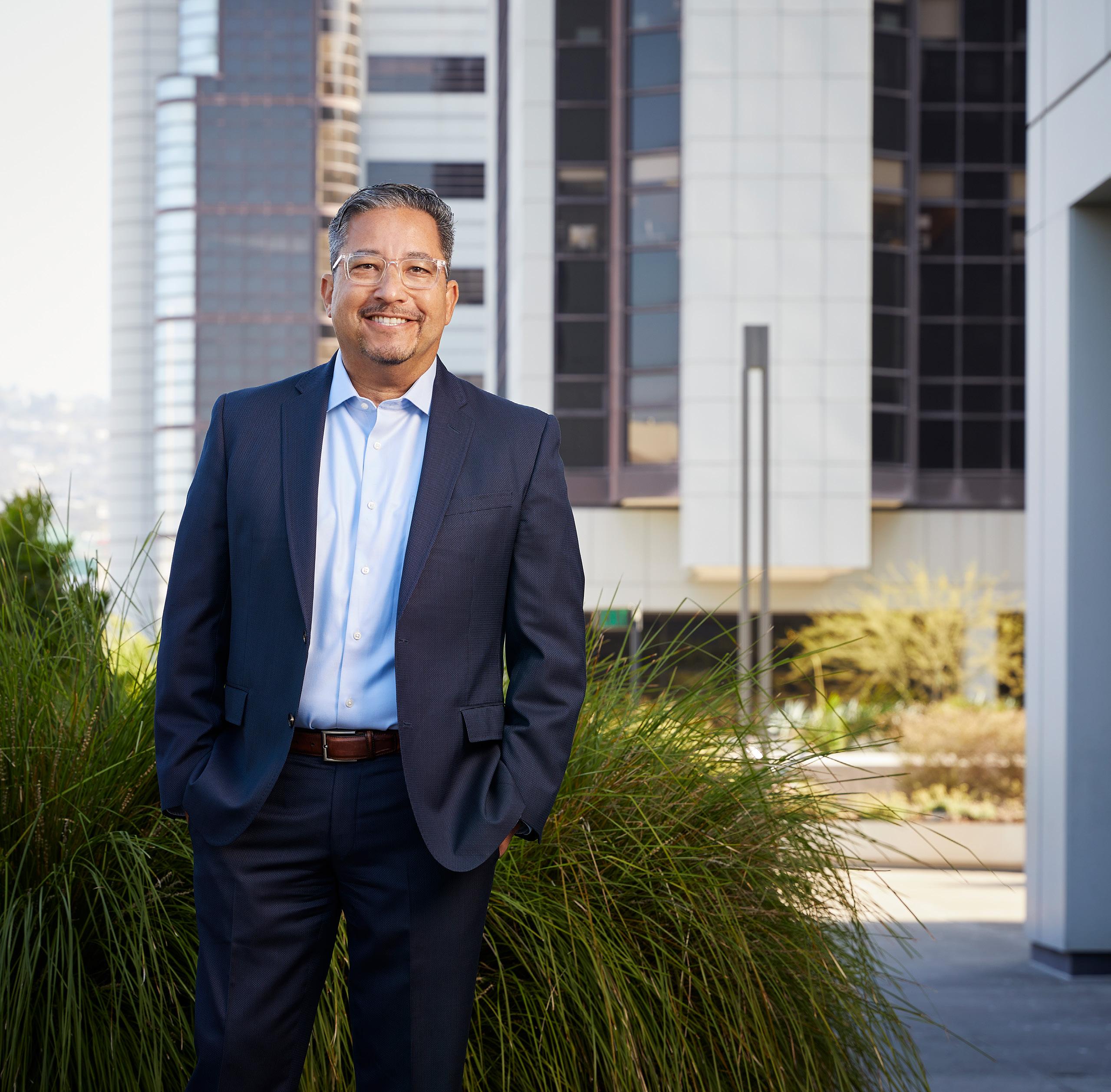
“I feel a great sense of responsibility to listen to our diverse staff so I can better understand who they are, what they need, and how our organization can best serve them and their families.”
—Andy Ortiz
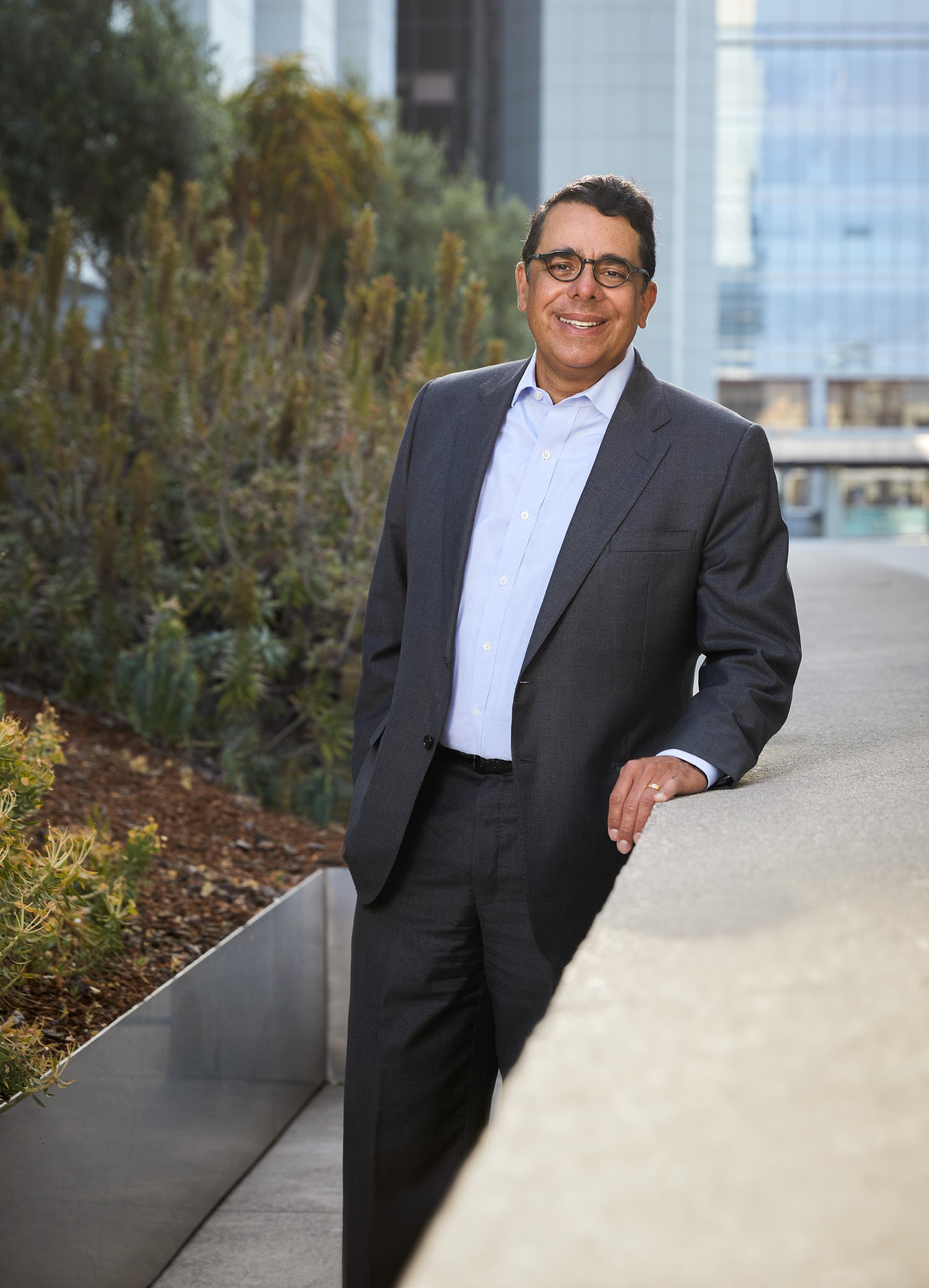
“Even if you think you know a city or a region, you need to keep growing, learning, and expanding.”
94 Keepers of Community
—Art Ochoa
A Tie That Binds a Community
The ways in which Cedars-Sinai reaches out to the wider Los Angeles area are as numerous as the people it represents. The organization’s research institution brings its discoveries to patients—from lab bench to bedside—in ways that might prove more challenging for other health organizations. Cedars-Sinai also has over five hundred residents and fellows at any given period of time, training the next generation of physicians and nurses in diverse communities.
It’s in Cedars-Sinai’s community outreach, however, that Ortiz and Ochoa highlight the constant efforts to better the lives and circumstances of LA’s most underrepresented communities. “We provide immunizations, health screenings, and mobile medical clinics to serve kids and their families,” Ochoa explains. “In partnership with the Los Angeles Unified School District, we have developed a program that takes the people who are responsible for buying food in the household to their local grocery stores. Then, using the language they’re most comfortable conversing in, we show them how to make healthier eating choices given the parameters of their food budget.”
Cedars-Sinai also provides financial support for clinics that serve disadvantaged populations, enabling them to attract and retain better staff, innovate and grow, and serve the wide needs of their patients. One patient population in particular has received more attention since Ortiz’s arrival. “I have a passion for service for our military veterans,” Ortiz explains. “When I joined Cedars-Sinai, I committed to an investment in building a strong network of veterans as a pipeline for key roles. I am proud to say we have built strong relationships with veteran organiza-
Cedars-Sinai: By the Numbers
Established: 1902
Licensed Beds: 886
Volunteers: 3,500+ Volunteer Programs: 41 Financial contributions to community in 2017: $797 million Programs benefitted: 5,500
Health educational encounters for underserved communities: 200,000
tions, hired many vets and their spouses, and increased the engagement of our military vets who we already employ.”
The same attention has been focused on the homeless population of Los Angeles. “We’re in the middle of a multiyear effort working to address homelessness in Los Angeles,” Ochoa says. The well-known Skid Row section of Los Angeles has ballooned due to a worldwide pandemic and global recession. More than ever, the city’s homeless need medical supervision as well as care and consideration from the city they call home.
In response to the aforementioned COVID-19 crisis, Cedars offered millions in grants to community-based organizations to help them better equip themselves during the pandemic.
The Value of Visibility
For the two SVPs, the history of CedarsSinai plays an important role, not just in how far the city has come but in how it approaches the future. “Cedars-Sinai was founded 118 years ago at a time when there was great discrimination against Jewish people and Jewish physicians who wanted to practice medicine,” Ortiz says. “From that history, our values of respect, integrity, and diversity were born—and they are alive and well today.”
“Our reaching this level is really indicative of Cedar-Sinai’s commitment to having a diverse workforce at all levels,” Ochoa says. “When I was promoted to this job, I received a lot of congratulations, and many of those were from Latinos whom I didn’t know personally. They just wanted me to know it meant a lot to see someone like me in a senior position. I think Andy would agree that we feel entrusted with that responsibility, and that means a lot.”
Source: Cedars-Sinai
95 Hispanic Executive
Optimal Outcomes
Working at the top of her field at Pacira BioSciences Inc., Cindy Alvarado strives to improve patient well-being
BY ZACH BALIVA
96 Keepers of Community

LEE SEIDENBERG 97 Hispanic Executive
Cindy Alvarado Executive Director of Compliance & Compliance Counsel Pacira BioSciences Inc.
Cindy Alvarado
she would become a lawyer.
But today, she works behind the scenes as a leader in compliance for a company she truly believes in—Pacira BioSciences Inc., a major biotech company that manufactures pharmaceutical and medical device products designed to help healthcare providers offer opioid alternatives to as many patients as possible.
Alvarado’s parents came to the United States from Ecuador in 1969. They were following her mother’s family, who had previously immigrated to the US while leaving her father’s family behind in Guayaquil. Recognizing the importance of education, her father received a college degree while learning English, and her mother earned an accounting certificate. There were no lawyers in Alvarado’s family—yet.
“None of the females or Hispanics in my life were lawyers,” the attorney says. “If young people don’t see people that look like them in a certain role, they don’t realize what’s possible.”
After a brief stint as a flight attendant, Alvarado took a job as a paralegal with a New Jersey law firm. She settled into the job, working for lawyers but never considering a future as a lawyer herself until a few simple words from her boss changed her life forever. “You have the gray matter to do this,” Alvarado’s boss and mentor told her. “That was my light bulb moment,” says Alvarado.
His encouragement opened Alvarado’s eyes to previously unconsidered possibilities. She took the LSAT, applied to Fordham Law School, and soon returned to work at the same firm—this time as a junior associate specializing in bankruptcy and financial restructuring. In 2013, when bankruptcy work slowed, the firm offered Alvarado the chance to join its life sciences compliance and regulatory practice group. While she did not have experience in that sector, Alvarado knew that life sciences was an innovative and relatively new area of the law. Drawn to the idea of a position that would help her
develop unique expertise in a rapidly growing industry, she accepted the role.
Soon, Alvarado was learning everything about life sciences compliance from the ground up to develop her expertise, while helping pharmaceutical and medical device companies examine risks and interpret state and federal guidelines. One client, Pacira, asked Alvarado to develop a compliance program. In doing so, she learned two things. First, she found that she enjoyed the opportunity to do a deep dive into one client’s business. Second, she realized that the Pacira mission and vision profoundly resonated with her.
In 2016, Alvarado left private practice to join the biotech company, where she now serves as executive director of compliance and compliance counsel.
Although Pacira has six hundred employees and is expanding into several global markets, the internal legal and compliance team is relatively small. The size of the group makes little difference, Alvarado says, given the drive of each and every person on the team to contribute to the company’s impact.
Together, Alvarado and her team have worked to implement a robust compliance program for Pacira’s US pharmaceutical and medical device business, a musthave in a heavily regulated industry such as biotech. Now, Alvarado and her team are implementing similar programs in Canada and the EU, where the company has planned product launches in 2021.
As executive director, Alvarado leverages her previous experience and the expertise she has developed in compliance rules and regulations to create policies and procedures that guide Pacira employees through their interactions with healthcare professionals around the world. “My job is to help Pacira achieve what it sets out to do within the bounds of the rules that govern the industry, so we can improve the lives of as many patients as possible,” she says.
98 Keepers of Community
never thought
“None of the females or Hispanics in my life were lawyers. If young people don’t see people that look like them in a certain role, they don’t realize what’s possible.”

LEE SEIDENBERG 99 Hispanic Executive
Countdown to 2040 The future of health
www.deloitte.com/future

Copyright © 2020 Deloitte Development LLC.
THAT WHICH IS POSSIBLE
For Cindy Alvarado, the impact she can have outside of her work at Pacira is also meaningful. Alvarado has had the opportunity to work with organizations like the Hispanic Bar Association to mentor high school students through pipeline programs.
“Whether they have an interest in the law or not, the opportunity to expose Hispanic high school students to Hispanic attorneys and other professionals and emphasize the importance of going to college is one of the best things I have had the chance to do,” Alvarado asserts. “I hope I can do for them what my mentors have done for me— show them what is possible.”
The company has already made great strides toward this goal. For its main product, Pacira developed a long-acting nonopioid analgesic that healthcare professionals can inject during surgery to control patients’ pain for the first few days after a procedure—when patients often need it most. Exparel (bupivacaine liposome injectable suspension) has been used to help more than 6.5 million surgical patients to date. Pacira has prepared and submitted applications to gain regulatory approval for the pharmaceutical product in Canada and the EU, where it is not yet approved. Pacira is also preparing to launch iovera, a medical device that uses the body’s natural response to cold to temporarily block nerve signals and alleviate pain, in Canada and the EU.
Alvarado hopes the work she is doing at Pacira can help address what has become a national epidemic. Healthcare providers have been providing opioid pain relievers at increasing rates since the 1990s, she explains. In 2017, the US Department of Health and Human Services declared a public health emergency to address the crisis, yet even now, more than 128 Americans die from an opioid overdose each day.
Alvarado and her colleagues are working to help decrease those numbers. “The effects of the opioid epidemic are all around us, and many people that I work with have a personal story about the impact that opioid misuse, addiction, or dependence has had on their family or friends,” she notes. “The opportunity to work on something that has a real impact is powerful for me, and I know we are doing something real to combat the opioid epidemic in a meaningful way.”
100 Keepers of Community
In 20 years, health care as we know it will no longer exist. How can you start preparing now for the future of health?
All
rights reserved.
Cleats and Crises
UMass Memorial Health Care CFO and former UCLA soccer star Sergio Melgar is the one to call when it all goes wrong
BY BILLY YOST
101 Hispanic Executive
Sergio Melgar says at his current age, most mornings start with slightly painful physical reminders of his UCLA soccer years.
During his junior year, a fractured vertebrae kept him out of action for most of the season, and he had to retrain his body to play in a completely different way. Nevertheless, Melgar still managed to letter that year—while also taking graduate-level business classes.
According to Melgar, who currently serves as executive vice president and CFO of UMass Memorial Health Care, his morning aches are a minor price to pay for what an early dedication to sports opened up for him, both in terms of employment opportunities and, more importantly, a leadership style that doesn’t just encourage but demands teamwork. “Nearly forty years later, those principles I learned on the soccer field are the same ones I use today in leading teams,” Melgar says. “Without soccer, I’m not sure I would have wound up at my first real job.”
Winning as a team, losing as a team, and growing as a team has earned Melgar a reputation for being the person to call in a crisis. And in forty years, he has yet to see a yellow card.
One Team, One Firm, One Experience
Melgar believes soccer is what got him his first (and perhaps most career-defining) role at Arthur Andersen, one of the world’s most prominent accounting firms. His coach—Siegfried “Sigi” Schmid, esteemed for achieving the most wins in Major League Soccer history—had encouraged Melgar to pursue business with the same tenacity he pursued soccer success. Indeed, Melgar’s record as a letter-winner in soccer and his heavy graduate workload set him apart from other undergraduate applicants.
Ironically, Melgar was originally discouraged from playing soccer at UCLA because of the institution’s size. He wound up starting his freshman year, though, and was given similar advice about joining the team as he was about joining Arthur Andersen. “I was told that they were sort of the blue bloods of accounting,” Melgar remembers. “But I went anyway and had an absolutely fantastic time.”
Immediately, Melgar saw that the teamwork mindset of soccer translated perfectly to his work at the firm. “Arthur Andersen had a one-firm concept that effectively made you work as a team across the entire organization,” Melgar explains. “They made you go through the same exact training. It was almost like a boot camp. We were all shipped to Chicago, and you all had that commonality of experience by the time it was finished.”
No matter the office location, members of the firm felt at home with each other and in their environment. It created a lasting impression for Melgar—and influenced how he would lead his own teams in the years to come.
Steadying the Ground
Melgar’s ability to make anywhere feel like home has served him well, especially in difficult circumstances. He returned to UCLA in 1994 as the first CFO of what would become UCLA Health, but the ground had literally shifted under his feet since he had left. The massive Northridge earthquake of 1994 had damaged the UCLA Medical Center so severely that it was estimated to take a decade to rebuild. “The whole time I was there was essentially a crisis period,” Melgar recalls. But in guiding the organization through that period,
102 Keepers of Community
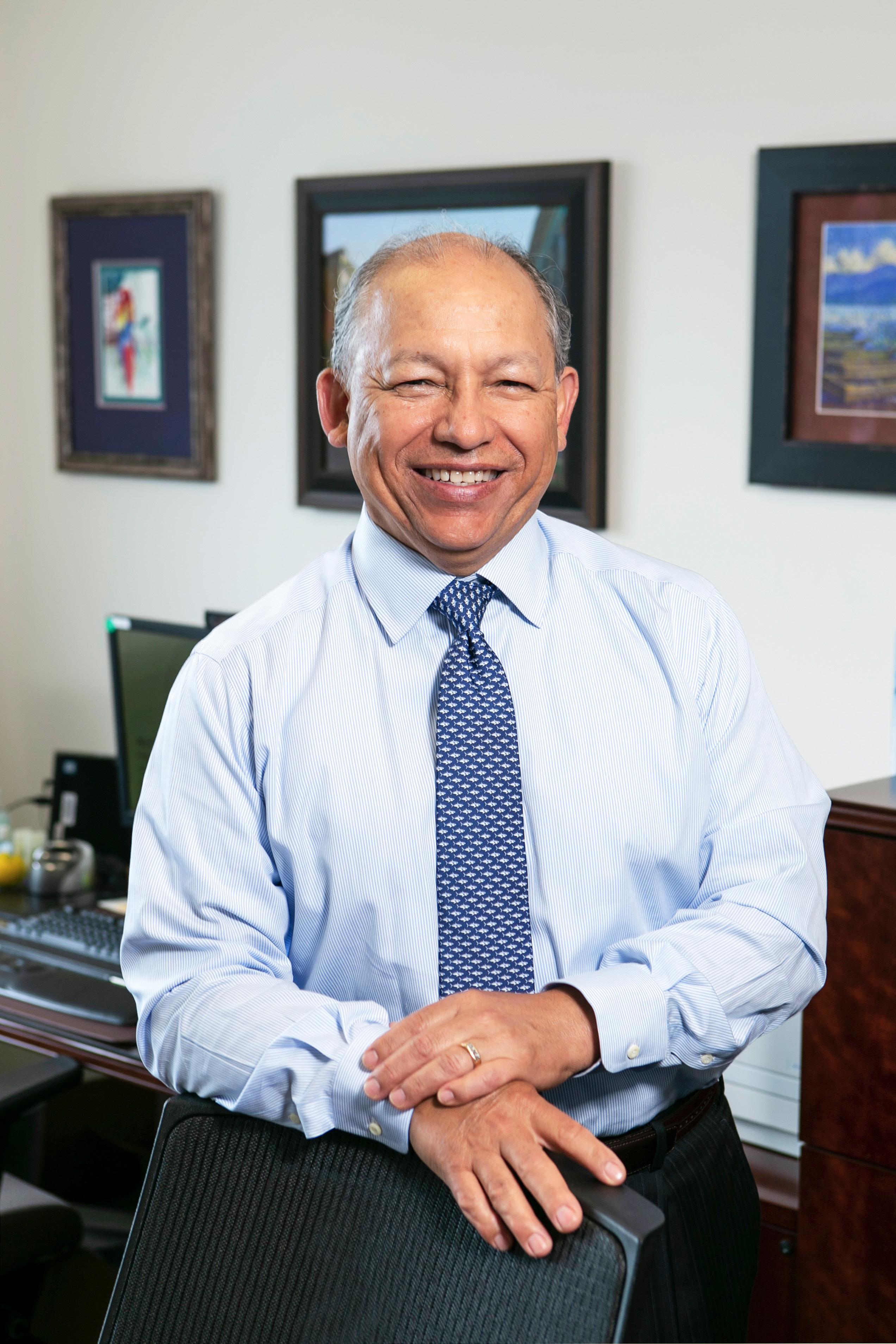
ROBERT CARLIN 103 Hispanic Executive
Sergio Melgar EVP and CFO
UMass Memorial Health Care
the CFO cultivated a reputation for finding the funds and the steady hands for building even amidst intensely challenging circumstances.
Later, as senior vice president for health affairs and CFO at the University of Kentucky, Melgar would help a cash-strapped organization find steady ground during the recession of 2008. “The recession hit when we were in the middle of building new towers in our hospital,” Melgar says. “I had to, obviously very quickly, find liquidity so that the projects could continue.”
Melgar would once again find a way to the goal while working internationally in a CFO capacity for CHRISTUS Health, which was engaged in a deadlocked transaction in Chile. “The two sides were not communicating well, and I think my contribution to the deal was to essentially bridge that gap,” Melgar says. “It wasn’t simply translating Spanish or English; it was translating culturally what was important to the people in South America and in the US.”
Running Up the Score
Melgar came to UMass Memorial in January 2014 during a period of turmoil for the organization. “Months before I was hired, they had been literally put in ‘junk’ status from a credit perspective,” Melgar says. “So, that probably says it all. I think I was brought in because of the reputation I had developed as a change agent.”
Within ninety days, the organization that had lost close to $60 million the year before was looking to turn a profit. It wasn’t easy, and Melgar says it wasn’t one of his happier moments, but eventually he and UMass Memorial transformed the organizational culture from one that, at times, was at war with itself into a culture based on a one-team mindset.
As other leaders in the field point out, not everyone could drive transformation while also successfully unifying and strengthening an organization. “Sergio is a truly unique leader for his ability to drive radical transformation while simultaneously stabilizing an organization, instilling confidence among both employees and creditors,” says Brian Flynn, senior managing director at FTI Consulting and a long-time colleague of Melgar’s.
Through the one-team mindset, Melgar has helped create growth within the UMass Memorial system— growth that, in and of itself, makes the organization an outlier in healthcare. “The defining factor has been that we’ve empowered a workforce that is on a quest for excellence,” Melgar says. “We have a ways to go, but the performance level of this team is very impressive—and the fact that we’ve done it as a team is the most special part.”
The COVID-19 pandemic has, like every organization, affected UMass Memorial considerably. Yet the organization was able to retain its stable S&P rating amidst the crisis, and achieved its highestever patient satisfaction scores with the same backdrop. Melgar places the credit for these results squarely on the shoulders of his team, but it’s hard to imagine those same results being achieved without his insight and wisdom—insight and wisdom borne directly from his mornings aches and pains.
104 Keepers of Community
“We have a ways to go, but the performance level of this team is very impressive—and the fact that we’ve done it as a team is the most special part.”
No Motivation Required
Virgina Lazala certainly faces challenges at Novartis— but she always knows what she’s fighting for
BY BILLY YOST
Virginia Lazala VP and Legal Head of Oncology LACan Region & Oncology Global HR Novartis Pharmaceuticals
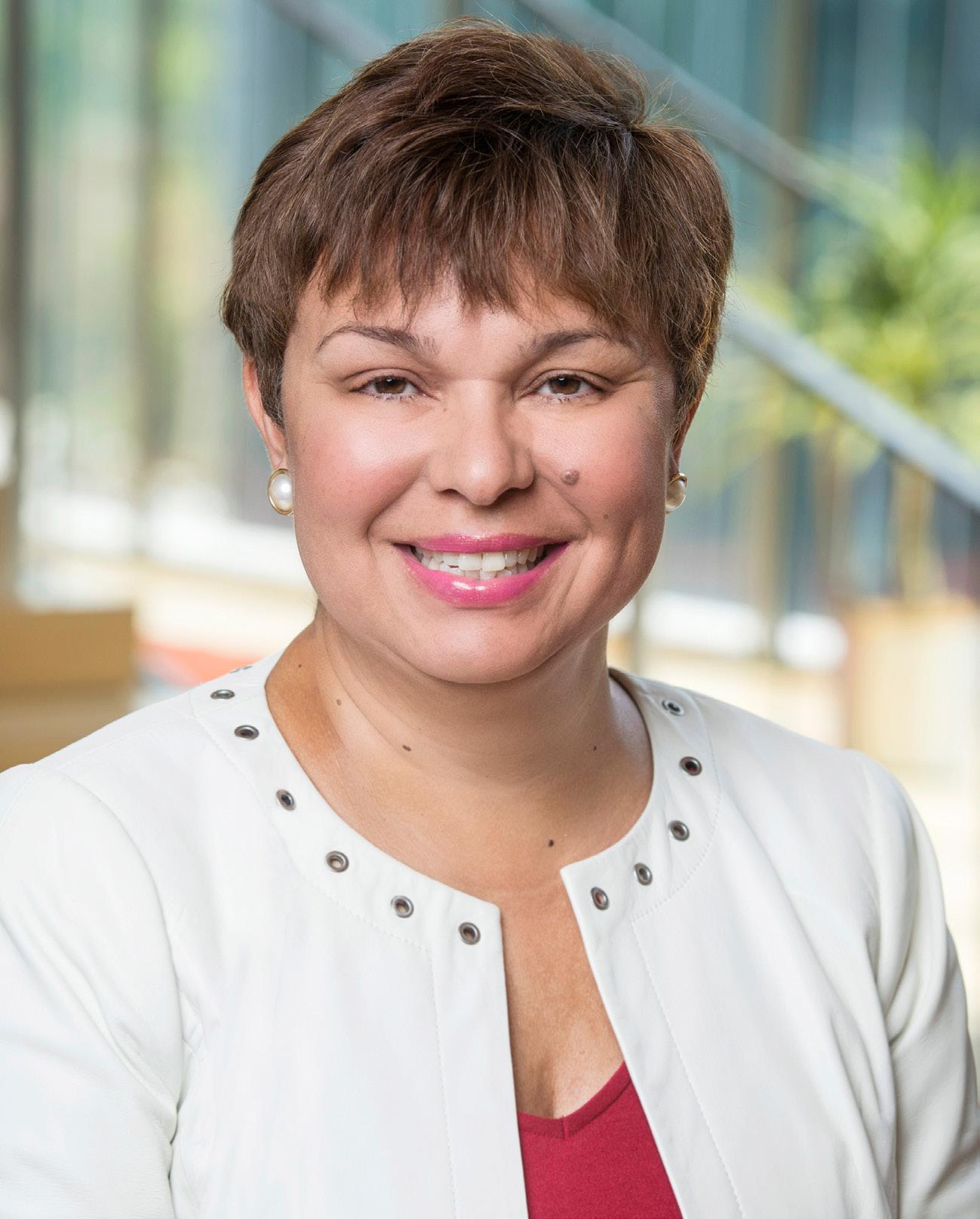
105 Hispanic Executive
PAUL ZALEWSKI
Motivation isn’t an issue for Virginia Lazala.
As VP and legal head of oncology for the Latin America and Canadian regions as well as the legal head of oncology global HR at Novartis Pharmaceuticals, Lazala helps utilize the legal arm of the global company to aid patients battling even the severest of diseases.
From Parkinson’s to metastatic breast cancer to sickle cell disease to pediatric leukemia, Novartis is on the front lines of some of the most progressive treatment options in pharmaceuticals. “This is what keeps you coming to work every day; everyone here is helping to bring treatments to market that help patients and save lives. It makes coming to work easy,” Lazala says.
The VP says that her twenty-plus years at Novartis has offered a litany of high points, one of the most notable being the company’s groundbreaking partnership with the University of Pennsylvania—that partnership ultimately resulted in the first-ever CAR T-cell (chimeric antigen receptor T) therapy and the first such therapy to go to market. The associated studies achieved breakthroughs with several chronic lymphocytic leukemia patients who were treated with personalized versions of their own immune cells. “It’s the
ultimate personalized medicine therapy because they’re taking your cells, processing them in our plant, and injecting them back into you,” Lazala explains.
Challenges Are Also Reminders
One of the challenges for Novaratis has been meeting the demand for its CAR T-cell therapy, but the company is working quickly to resolve this issue. “We only have one plant, our Morristown, New Jersey, site, doing this work right now, so meeting demand has been a challenge,” the VP says.
It isn’t the only challenge Lazala has had to face down in her tenure. Last year, the legal head had just finished overseeing a jury trial that Novartis ultimately lost. “It’s a case for which I still have some post-traumatic stress,” Lazala says frankly. “It was a nightmare. Sometimes you just don’t win.”
The decision came down the same day of the Novartis Global Oncology Leadership Forum where, in her dual role, Lazala was kept extraordinarily busy. While it may have initially seemed like the worst possible time to get the news, something else happened that day to change her perspective.
“I hadn’t really been able to focus at all because of what was going on, but then a patient who had flown in to speak to us got up to talk,” Lazla explains. “This person suffered from sickle cell disease and had been treated with one of our experimental products, which was later approved. This person thanked us for working in a space that seems to be neglected by pharmaceutical companies.”
Especially in areas like Brazil, Colombia, and other South American countries under Lazala’s purview, diseases like sickle cell disease often affect people of color disproportionately. The disease carries painful ramifications in and of itself, and the population it affects can often face difficulties in receiving treatment as well, not just because of access but also because of skepticism.
“It’s a painful disease, but people seeking treatment are often met with hesitancy by healthcare professionals because they think they’re drug addicts,” Lazala says. “We now have this product that can help those most in need.”
After receiving the news on the trial, Lazala was immediately reminded of the work her company was doing to save lives, and
106 Keepers of Community
“Everyone here is helping to bring treatments to market that help patients and save lives. It makes coming to work easy.”
it was a message that was received loud and clear by those in attendance. “I’m standing in a room filled with global leaders, and there wasn’t a dry eye to be found,” the VP recalls.
Enabling Treatments Worldwide
Lazala says her legal teams are regularly reminded of the broader import of their work. “I try to instill in my team the idea that we are supposed to be business enablers,” the VP says. “The question we should be asking all of our internal clients is, what do you want to achieve? It may not be exactly how you want to do it, but we will achieve your goal.”
The VP explains that lawyers can sometimes be thorough to a fault, and that learning to push through is an absolutely necessity if you want to be on her team. “We learn that sometimes you have to be comfortable with 80 percent and just go with it,” Lazala says. “We aren’t as large a legal department as many of our competitors, so we need to be comfortable with getting the information we need to make an informed decision and not fall prey to analysis paralysis.”
And the legal team is certainly enabling at a high speed. In the first week of May 2020, Novartis was granted accelerated approval by the USFDA for a novel treatment for adults with metastatic nonsmall cell lung cancer. It’s yet another major victory that has occured during Lazala’s tenure, and she’ll be helping to take the treatment to Latin America and Canada—no motivation required.
STRETCHING INTO A NEW ROLE
Virginia Lazala has been enabling new treatments for patients for over twenty years at Novartis, but the lawyer has found new flexibility in opening a Kika Stretch Studio franchise in the Atlanta area. The dance-based stretch method is for everyone from athletes to the elderly, she says, and the forty-five-minute, one-onone coaching sessions match stress relief with profound health benefits.
“My husband and I were both clients before we were owners, and we thought this would be great to bring to Atlanta, where it didn’t previously exist,” Lazala says. The studio opened in October and had already turned a profit by February (a relatively unheard-of proposition for any small business).
The COVID-19 outbreak left little time for celebration, but when the coast is clear, they’ll be back to the mats. “We’re hoping once we get back to it that more people can experience it and see the benefits immediately like we did,” Lazala says.

Be Better Than the Day Before
Takeda VP Carlos Soto promotes humility, empathy, and motivation at a time when employees need these values most
 BY BILLY YOST
BY BILLY YOST
108 Keepers of Community
TOMMY WALTON
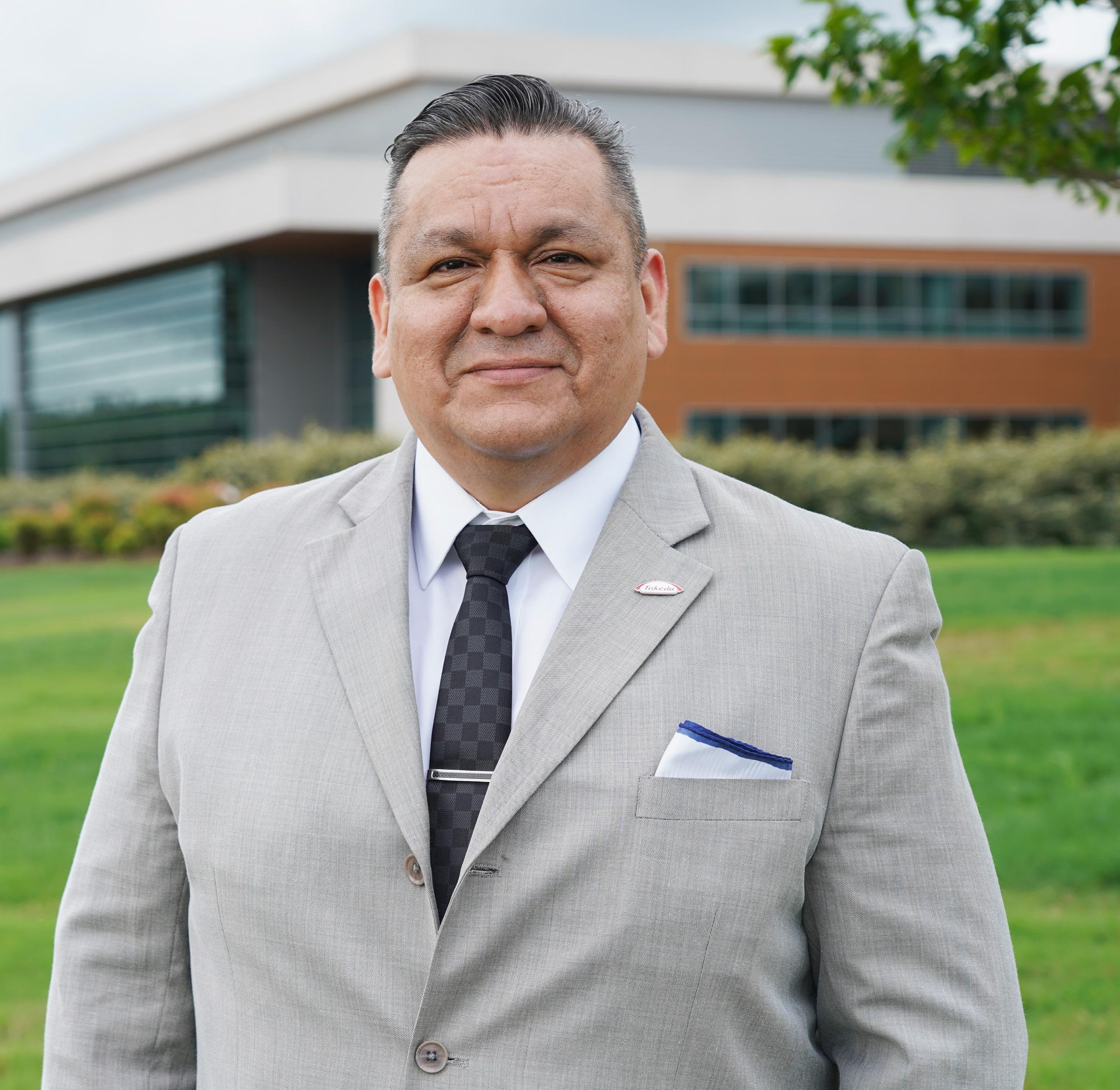
109 Hispanic Executive
Carlos Soto VP of Manufacturing Operations Takeda Pharmaceuticals
The vice president of manufacturing operations at Takeda Pharmaceuticals is adamant in his belief that young professionals can achieve their dreams and grow into successful careers as well as fulfilling and enriching lives. He is committed to honoring his parents, who sacrificed a world of family and friends so that their child might have greater opportunities, in everything he does. And he is resolute in his belief that Takeda Pharmaceuticals, which has begun manufacturing a hyperimmune globulin therapy intended to serve in the fight against COVID-19, must move forward with a purpose-driven mission intended to serve patients and employees alike.
Motivation and Good Intention
In reflecting on exactly how he got to Takeda, Soto has a great deal to offer to those looking to make a future for themselves. “I like to think back to the Carlos in high school who had dreams of curing cancer,” Soto says. “I wanted to find a way to help save people’s lives and contribute to this society.”
The problem was, as with a majority of high schoolers, Soto really didn’t have any idea where his focus should lie. “All I knew is that I had a commitment to my parents for their sacrifice of leaving Peru,” remembers the VP, who was born in Peru and raised in Puerto Rico.
But the young man also had a knack for math. Soto was so good, in fact, that he was taken out of his normal studies in Puerto Rico to tackle more advanced math and participate in the school’s academic decathlon team. He realized, though, that the chemistry required to help cure diseases did not necessarily align with his passion for math, and so he decided to pursue engineering.
“I try to be very transparent when people ask me how I got here,” Soto explains. “I knew I was good at
math, so I decided to pursue it in a way I thought could be useful to other people. I wanted to make my parents’ sacrifice worth it.”
Out of college, Soto got a job that would offer him a glimpse of the kind of a leader he hoped to grow into. “The organization really impressed me because it provided employees with a good balance between work and personal time,” Soto recalls. “My boss wouldn’t ever micromanage and just worked hard to support me. It accelerated my career so much, and I always knew that once I had the opportunity to be a manager myself, that’s the kind of culture I wanted to work to put in place.”
Culture in a Crisis
Soto’s focus on culture has never been more important than it is today at Takeda. Whereas many companies have fully shifted to remote work as a result of the COVID-19 pandemic, the international R&D pharmaceutical company, whose drugs are relied on by countless patients with rare diseases, conducts essential work at its manufacturing sites. Employees at those sites knew that they needed to come to work to support patients, Soto says.
“We make medicine that people need to survive because they were born with a condition or disease,” Soto emphasizes. Indeed, the VP says that the Takeda manufacturing space is covered with photos of the patients they’re serving every day as a reminder and as motivation for the good that they’re doing.
That mission has required many Takeda employees to be on-site throughout the pandemic, manufacturing much needed drugs for patients around the world. “We’ve had to balance our concern with the virus with the fact that our patients, who often have little to no immune system protection, need us now more than
110 Keepers of Community
It’s hard to walk away from a conversation with Carlos Soto feeling anything but inspired.
Better Health, Brighter Future

There is more that we can do to help improve people’s lives. Driven by passion to realize this goal, Takeda has been providing society with innovative medicines since our foundation in 1781.
Today, we tackle diverse healthcare issues around the world, from prevention to life-long support and our ambition remains the same: to find new solutions that make a positive di erence, and deliver better medicines that help as many people as we can, as soon as we can.
Takeda’s manufacturing presence spans the globe, including our state-of-the-art plasma manufacturing facility east of Atlanta, Ga. Our diverse team in Georgia includes talented scientists, engineers, operators, maintenance and utility technicians, and experts in quality assurance, automation, supply chain, operational excellence, project management, research, validation and health and safety.

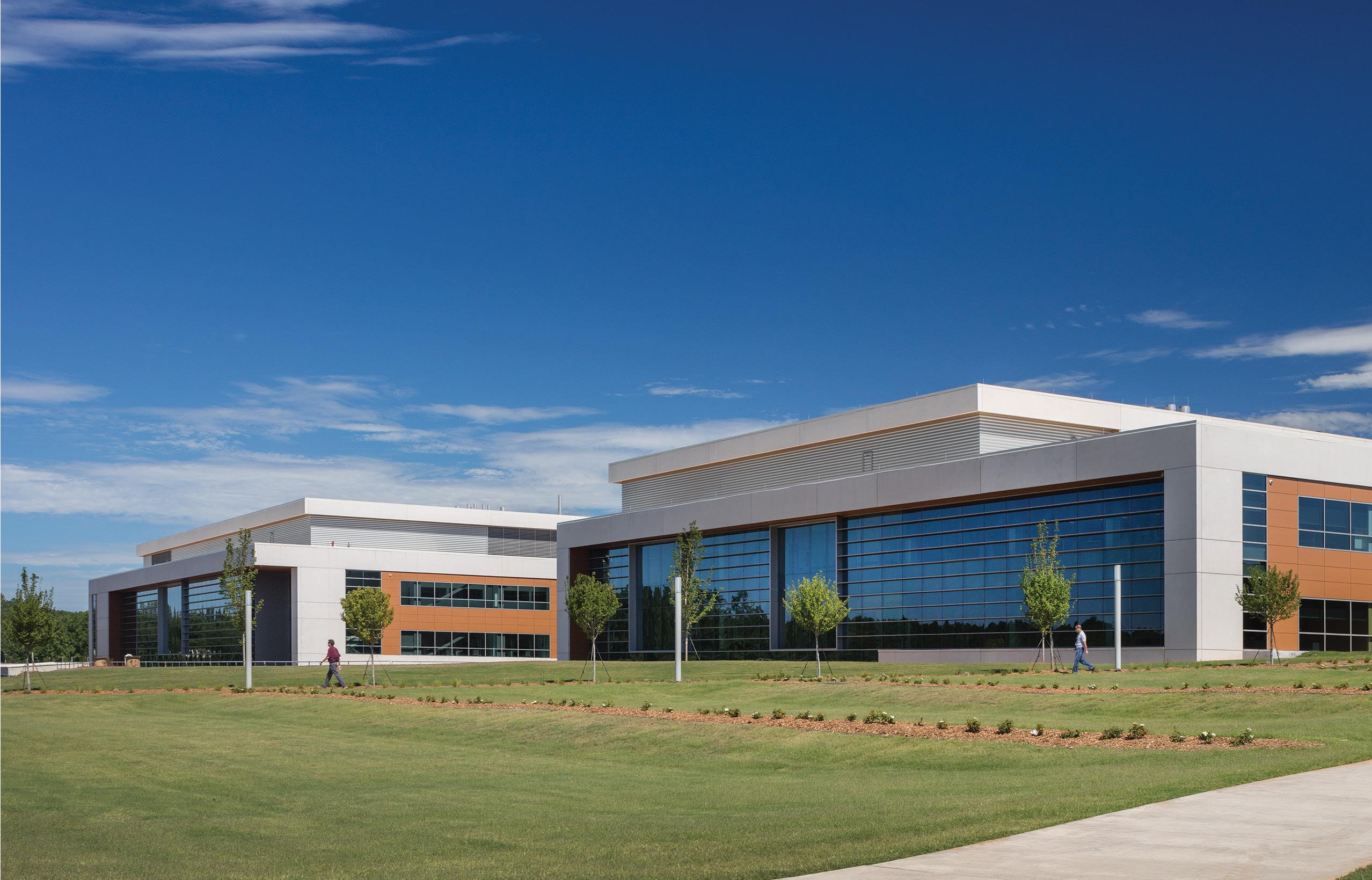
With our breadth of expertise and our collective wisdom and experience, Takeda will always be committed to improving the future of healthcare. Learn more about joining our team at takedajobs.com.

www.takeda.com
Takeda Pharmaceutical Company Limited
ever,” says Soto, who serves as site head for Takeda’s Georgia manufacturing facility, located east of Atlanta. “And I saw people coming to work having to manage their fears, understanding that they’re doing it for the very best reason.”
Takeda has responded by providing as much support to employees as possible. The Georgia site has implemented numerous safety measures, including limiting the number of people on site, increased cleaning, physical distancing, temperature checks, and mandatory face coverings. The company has also provided temporary benefits such as increased COVID-19-related vacation time, childcare reimbursement, and free meals for employees. “I want this place to feel like a second home,” Soto says. “I want this place recognized for the good it not only does its patients but for the good it does its employees.”
Creating a welcoming culture is crucial for a site that’s ramping up production and regularly bringing on new employees. Soto strives to realize the inverted pyramid model, where leaders are at the bottom of the model working to support the needs of the employees making the products.
He does that by being a servant leader, viewing his work from a place of humility and gratitude. “I don’t think that I’m smarter or better than anyone else here,” Soto says. “I just have access to more information due to my role. My job is to help translate a view that’s maybe a little further into the future than the people who are working hard manufacturing medicine every day.
“I want to make their jobs easier,” the VP continues, “and to make them successful. If they’re successful, I’m successful. And if I’m successful, the company is successful.”
To be sure, humility and gratitude seem to radiate from Soto throughout the entire conversation. He’s keenly aware of the sacrifices that helped get him where he is, and he wants to help those who may be in similar positions—unsure of where their lives may go but willing to put in the work.
“Be proud of who you are; remember where you come from and have a vision of where you want to go,” Soto says. “I fly my Peruvian flag. I fly my Puerto Rican flag. I come from the sacrifices of my parents, and I was motivated not to be better than anyone else but to be better than who I was the day before.”
112 Keepers of Community
“Be proud of who you are; remember where you come from and have a vision of where you want to go.”
Answering the Call
Peter Perez developed an affinity for call center work early in his career. The VP now relishes the ability to directly improve people’s well-being and health through his leadership of the call center at Highmark Inc.
BY PETER FABRIS
113 Hispanic Executive
During his first day on the phones, the New York region was hit by a major snowstorm, prompting service calls to skyrocket. “It was tough to have to tell people that they had to wait two hours for service,” Perez recalls. Their reactions were unpleasant in a decidedly New York manner, and by the end of the day, Perez was worn out and discouraged. “I told the supervisor that this was not for me,” he says.
The supervisor took his reaction in stride and pleaded with him to give it one more try. Perez agreed, and by the following morning the snow had stopped. That day was normal, both in terms of the volume of calls and the moods of callers, and Perez quickly realized that he shouldn’t take callers’ anger and frustration personally. They were seeking help under circumstances that would try anyone’s temper.
More importantly, Perez realized that he was passionate about helping people directly.
That epiphany led to a thirty-year call center career in a few different industries, culminating with his current position as vice president of operations and member/provider experience with healthcare insurance provider Highmark Inc. Affiliated with Blue Cross and Blue Shield, Highmark operates health insurance plans in Pennsylvania, Delaware, and West Virginia that serve 5.2 million members.
As an executive responsible for services that directly impact the health and well-being of millions, Perez looks back with pride and amazement over his life’s journey. “We were not affluent,” he says of his upbringing in New York City. “We were a working-class family living from week to week as best as we could.”
Crime was prevalent in his Brooklyn neighborhood, and some of his childhood friends joined gangs and “got caught up in that world,” Perez says. “I wanted more out of life and had a strong desire to be successful.” And he pursued every chance he had to lift himself out of those challenging circumstances. Throwing himself into his studies, he got good grades and graduated a year early from high school.
Perez landed a job after graduation as a messenger for the financial services giant Bear Stearns. But this seemingly entry-level job, like the call center job that Perez obtained later on, turned out to be a formative experience. His job was to distribute reports from the previous day’s trading to Bear Stearns’ Wall Street clients. Every morning, he chatted with Bear Stearns traders, asking pointed questions about their work. Impressed by the young man’s intelligent inquiries, a manager offered Perez a reports analyst job, which he eagerly accepted. It was a terrific learning opportunity, Perez says. “I got to understand Wall Street well.”
That experience provided a foundation for Perez, leading to multiple stints in various call center-related management positions in the insurance and financial services sectors. At one of those posts, he interacted with a client who provided disease management services that helped subscribers deal with end-of-life care and chronic conditions such as diabetes.
Struck by the possibility of using call centers to directly improve people’s lives and well-being, Perez enthusiastically embraced an opportunity to shift his career to the healthcare world. “This was an industry that I needed to be in,” Perez explains. “You can help
114 Keepers of Community
When Peter Perez took a call center agent job for the American Automobile Association (AAA), he had no inkling that it would transform his career.
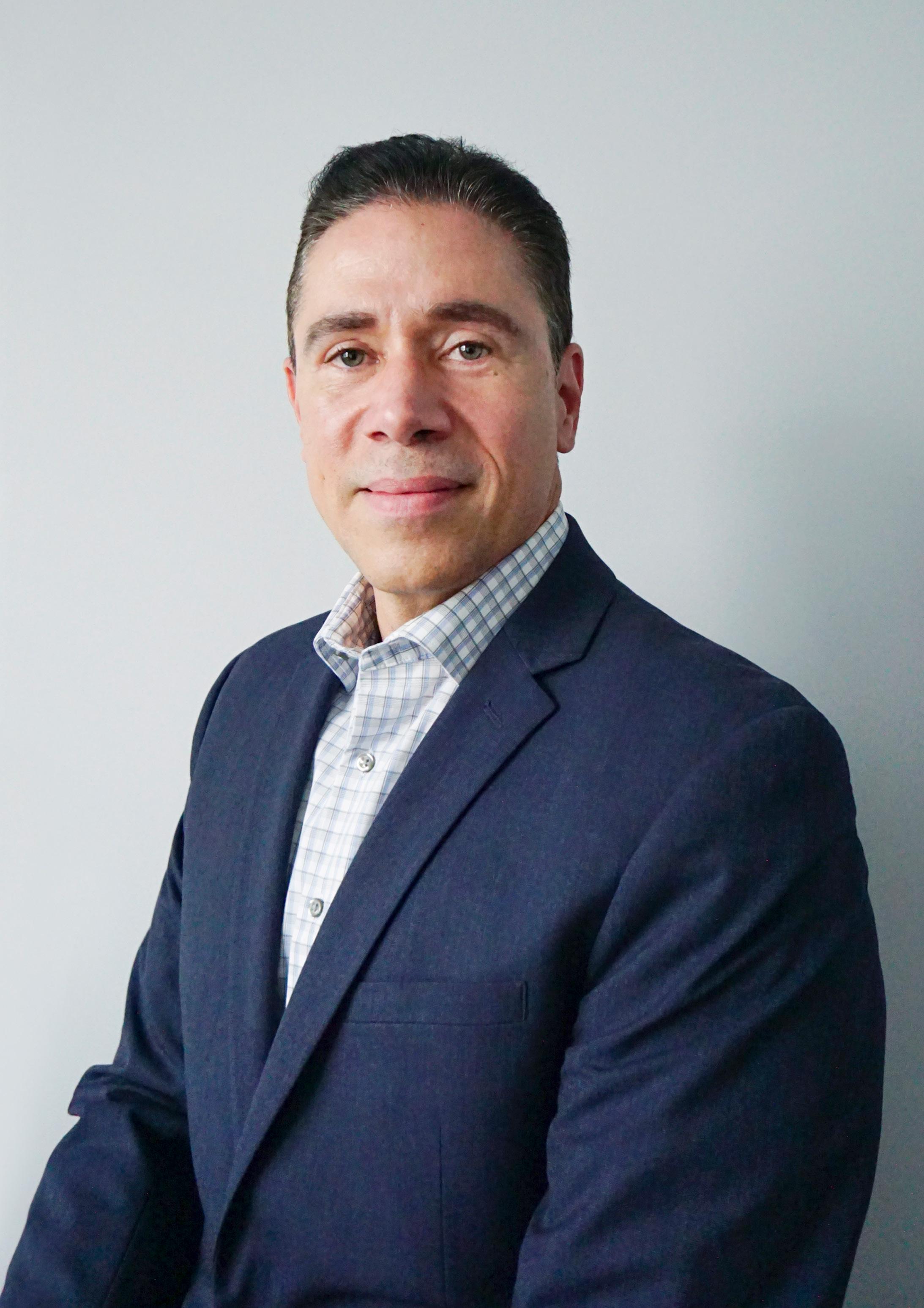
115 Hispanic Executive
Peter Perez
VP of Operations & Member/Provider Experience
Highmark Inc.
people make decisions that can extend lives.” Healthcare seemed even more fitting once Perez began dealing with care services related his father’s declining health: he saw firsthand the value of medical personnel responding to families’ questions about a loved one’s healthcare plan.
Perez is not alone in his determination to drive improvements for both patients and the organizations dedicated to serving patients. “At NASCO, we share in Peter’s desire to improve the member and provider experience,” says CEO and President John Ladaga. “We’re proud to partner with Peter and the Highmark family on innovative solutions that further promote meaningful connections and improved health and lives.”
At Highmark, Perez leads a 1,900-person department that serves insurance plan members and healthcare providers. Dispensing accurate information about wellness, insurance plan benefits, provider information, and billing is their essential function, and maintaining quality of service is an ongoing focus.
For example, when the COVID-19 pandemic struck in spring 2020, telehealth became a vital avenue for members and providers. In response, the Highmark Health Plan expanded coverage for telehealth services to all members, including self-funded customers who had previously opted out of telehealth coverage. Highmark also waived deductibles, coinsurance, and copayments for most clients. The goal was to ensure that members could continue to receive care without potentially exposing themselves to the virus with in-person visits, and for providers to continue to operate and get paid for their services.
It was a fast-moving, complex situation that demanded call center associates to quickly get up to speed on the details of the new plans. Complicating matters was a shift to telecommuting for the entire company, including Perez’s department. To help employees adjust to the new work environment and the policy changes regarding COVID-19, Perez’s team put together training videos and virtual meetings. And to continue to foster esprit de corps, the team developed virtual contests, expanded recognition programs, and virtual happy hours.
Now, the majority of Perez’s team prefers working from home. “We’re actually seeing increased productivity and engagement,” he says. For many, working at home eliminates the distractions of the office, enabling people to be more focused.
That focus has been extremely beneficial during an unprecedented event that has highlighted the strategic importance of both the call center and other customer support areas to the organization. Many corporate leaders across the industry have recently realized just how important these departments are to companies’ success, Perez notes.
Call centers used to be considered a necessary evil, Perez says, a costly overhead expense. But in fact, these centers have turned out to be a vital connection to customers, a connection that can foster stronger brand loyalty when employees provide stellar service. Perez may have sensed that fact during his short stint as a call center agent for AAA, but he now sees it clearly in his role at Highmark.
116 Keepers of Community
“[Healthcare] was an industry that I needed to be in. You can help people make decisions that can extend lives.”
NASCO is more than a healthcare technology company. We are a community of leading health plans, visionary technology providers and expert talent. We are honored to partner with some of the highest-performing health plans, like Highmark Inc., to advance the future of digital health together. Learn more at nasco.com 1200 Abernathy Road Suite 1000 Atlanta, Georgia 30328 678.441.6000 www.nasco.com THANKS FOR BEING A GREAT LEADER, PARTNER AND FRIEND TO NASCO. KUDOS ON YOUR RECOGNITION.
Hard Work Remains
The lack of healthcare services available to Latinos fuels the passion Edwin Millan and Laura Morales Garcia have for their work at the AIDS Healthcare Foundation
BY ROMAN NAVARRETTE
118 Keepers of Community
moniker “City of Angels” certainly rings true for employees of the Los Angeles-based AIDS Healthcare Foundation (AHF).
A global nonprofit organization and the largest medical care provider in the world, the AHF reaches over 1.4 million people in forty-five different countries.
Caring for the Community
The AHF’s LA office has always prided itself on being a key health and wellness resource for HIV prevention. Still, targeted outreach to the city’s large Hispanic population had long been lacking, in part because the community too often doesn’t speak enough about its members living with HIV. So, when a wellness division catering to the needs of Latinos and their sexual health was implemented, it was exactly what the doctor ordered.
Thirty-three-year-old Laura Morales Garcia, manager of affinity groups at AHF, grew up in Los Angeles and spent her entire life in the Mid-City neighborhood. Today she spends her time between her old neighborhood and Inglewood—two areas where brown and Black communities intersect daily and have limited access to information, testing, and medical treatment. As such, she knows the obstacles that communities of color face every day.
“A lot of older people in our community don’t want to even talk about sex or come into our testing van to take a three-minute HIV test,” Morales Garcia says. “You have to speak to them in their language.” That might mean stressing the importance of their own
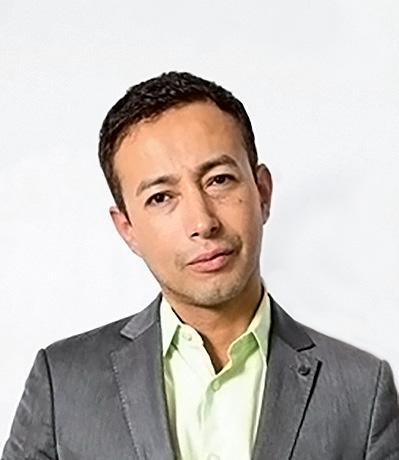
well-being via the one thing they care about the most: their family’s well-being. “I want to help people in those communities who need it most,” she emphasizes.
For the AHF manager, the work she does is intensely personal, as she grew up in both brown and Black households. When she was fifteen years old, she told her abusive father that if he couldn’t control his temper, she would leave. She spent the next few years living with her African American godparents, eventually escaping that household to avoid the prevalence of drug addiction.
Morales Garcia spent her twenties jumping from job to job, networking her way around town as many Angelenos do. However, she always knew a more meaningful opportunity would come her way. And, indeed, after she accepted a temp job as a receptionist at AHF headquarters, Morales Garcia immediately took a liking to two key aspects of the environment: the people working around her and the fact that this organization is dedicated to helping others.
It’s no wonder that she has found the sense of purpose she was looking for at AHF. That purpose has continued to motivate her in the two years she has served the organization as manager of affinity groups. Today, she oversees the Foundation’s FLUX, Spark, and BLACC (Black Leadership AIDS Crisis Coalition) affinity groups as well as LOUD, AHF’s Latino division.
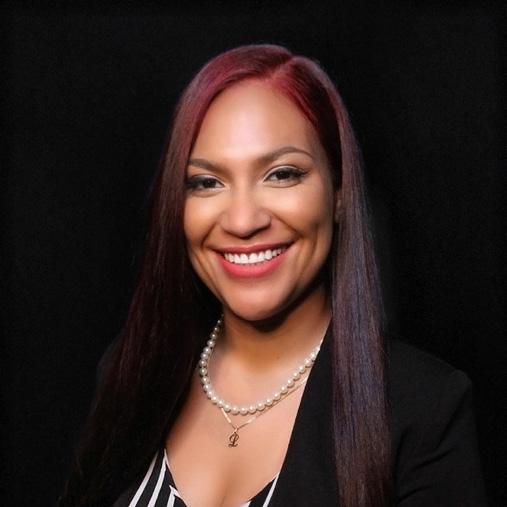
LEO MADRID (MORALES GARCIA) 119 Hispanic Executive
Laura Morales Garcia Manager, Affinity Groups AIDS Healthcare Foundation
Edwin Millan Director, Sales Outreach & Community Integration AIDS Healthcare Foundation
The
“I want to help people in those communities who need it most.”
—Laura Morales Garcia
CAMPAIGNING FOR CARE, CAMPAIGNING FOR JUSTICE
On top of the work done every day by the AIDS Healthcare Foundation to provide care and services for people in the US and around the world, the organization and its affinity groups have also launched several campaigns designed to support and advocate for communities in need.
These include the Foundation’s #StandAgainstHate campaign, a BlackTransLivesMatter & Immigration Support campaign led by FLUX, a DACA and Immigration support campaign spearheaded by LOUD, a Connections through Conversations for All Women’s Wellness campaign led by Spark, and a Black & Brown Unity Campaign run by the FLUX, LOUD, Impulse, and Spark affinity groups.
Say It Loud
The big brother of all of affinity groups at the AIDS Healthcare Foundation is Impulse. Now a global division, Impulse was created by Jose Ramos and is arguably the catalyst that helped break new ground for AHF by reaching community members on the ground via event activations.
Edwin Millan, director of sales outreach and community integration at AHF, had been working as both an AHF employee and a supporter of Impulse when he noticed that though Impulse was thriving and making a
to lead FLUX, which reaches trans women and men as well as gender nonbinary individuals of all backgrounds.
“The lack of services for the Latino community in the US and beyond is what has always motivated me,” says Millan, who serves as national president for LOUD in addition to his role as sales outreach and community integration director. In recent years, while HIV cases have decreased overall in the nation, many Latino communities have seen a rise in case numbers. On top of that, undocumented individuals living in the
difference by providing an outlet for young men in the LGBTQ+ community, there was still something missing.
“I went to [AHF President] Michael [Weinstein], who I had built a solid working relationship with, to propose the idea of a Latino division, and he agreed that I should build one for AHF,” explains Millan.
Millan did just that. The division was named LOUD (Latino Outreach and Understanding Division), and Millan subsequently watched it grow in such extreme popularity that branches have now been established across the US. Millan also began integrating the transgender community into LOUD initiatives, spurring the next logical step for the organization: to build its transgender division, FLUX. That division is currently led by transgender royalty, Queen Victoria Ortega. Millan handpicked Ortega
United States are often afraid to seek medical advice or attention.
It is these struggles, which Millan and others witness every day, that motivate them to continue expanding Loud throughout the country.
Guardian Angels
Nearly all of AHF’s affinity groups, including FLUX, operate solely based on the efforts of the organization’s many volunteers. Morales Garcia is actually one of the only paid employees for the Foundation, and she depends on volunteers like Millan, who pulls double duty in leadership positions with both AHF and LOUD.
Los Angeles is most certainly a City of Angels. Look no further than Morales Garcia and Millan for proof—they earn their wings every single day.
120 Keepers of Community
“The lack of services for the Latino community in the US and beyond is what has always motivated me.”
—Edwin Millan
Trials, Tablets, and Teamwork
Lorena Gomez and her team keep patients at the forefront for clinical trials at pharma giant Allergan
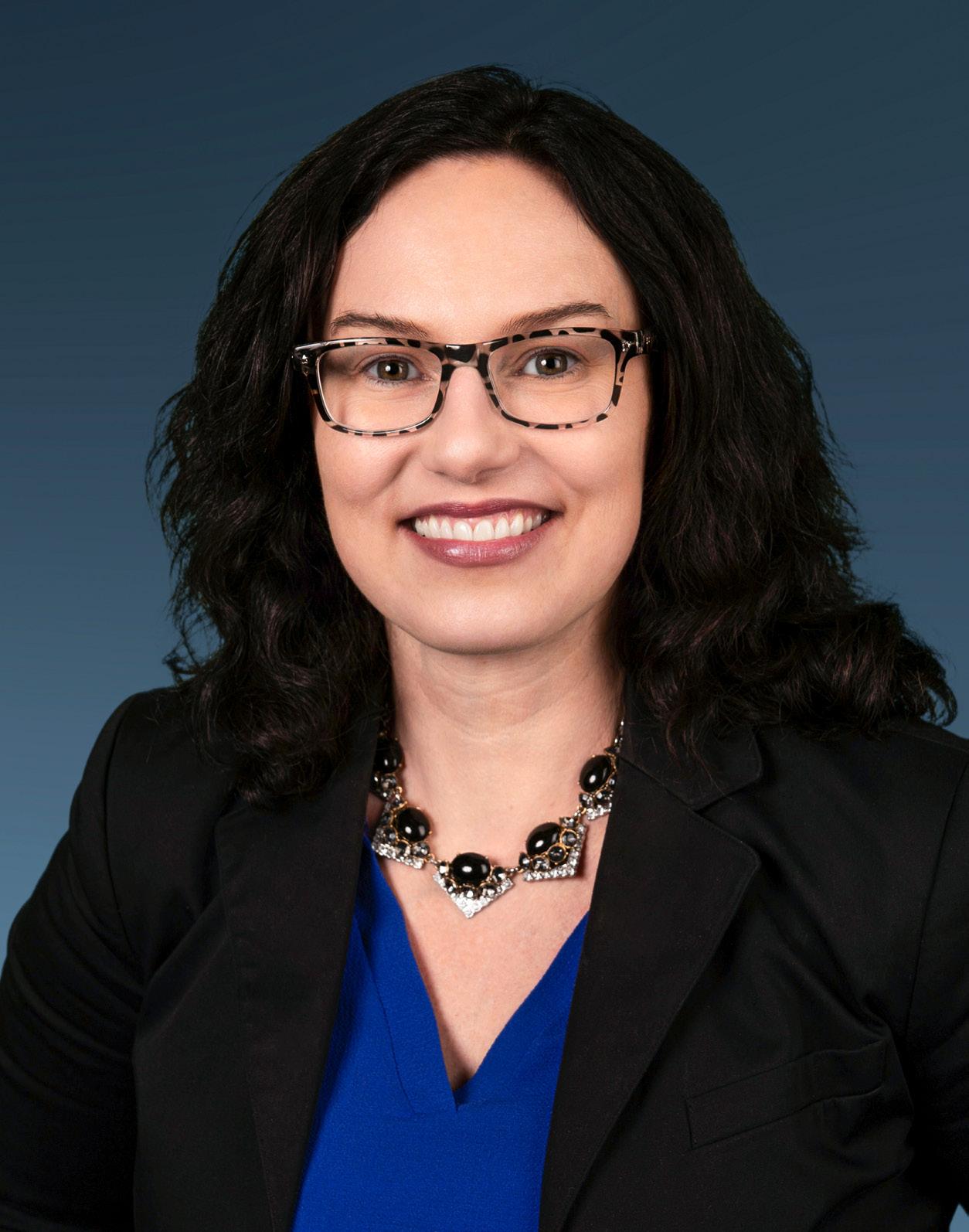 BY BILLY YOST
Lorena Gomez Director of Global Study Start-Up & Essential Documents Allergan
BY BILLY YOST
Lorena Gomez Director of Global Study Start-Up & Essential Documents Allergan
TKTKKTKTKTKT HAYNSWORTH PHOTOGRAPHY 121 Hispanic Executive
“I have a passion for taking the white space out of processes and creating efficiencies in their place, and this is a critical part of study start-up,” Gomez explains. “You’re talking about making sure studies happen on time and without error so you can get patients their treatments faster.” It’s made Gomez’s detail-oriented workflow an absolute valueadd as director of global study start-up and essential documents at Allergan, a global leader in pharmaceutical development, manufacturing, and marketing.
Gomez’s commitment has not gone unnoticed by colleagues and partners like Randy Czaniecki, senior director of business development at WCG, a leading provider of review services for human research. “It has been a pleasure for WCG, and me personally, to support someone like Lorena, who possesses the vision and passion to leverage creative solutions to speed up clinical trials and ultimately deliver new treatments to patients,” he says.
At Allergan, Gomez sees firsthand what her work—and the right treatments—can mean for patients around the world.
The role of clinical trials seems to draw more and more attention each and every year, particularly, Gomez says, because of patient access to information, which used to reach only as far as a single physician’s best working knowledge of available treatments. “In the past, people might not have heard about clinical trials as an option unless they went to a specific doctor who happened to be managing these trials,” Gomez says. “Now, they can pull up Facebook or an advocacy group they might be part of and see opportunities for clinical trials all over the world. Everyone has access to this information.”
The democratization and proliferation of information means more opportunities, more potential trial patients, and more hope for those who have exhausted all other traditional outcomes. As Gomez notes, “A clinical trial affords patients for whom there is no treatment, or the available treatments aren’t working, the opportunity to receive a cutting-edge investigational medication before it’s available to the public.”
Additionally, “The bulk of the cost of procedures and doctor visits in a clinical trial are usually covered by the sponsor company,” the director explains. “By participating in a clinical trial, overall treatment costs may be decreased, so this can be an attractive option for a person who might not have access to treatment otherwise.”
Gomez says that exciting work done by nonprofit TransCelerate is helping pharma companies collaborate in unprecedented ways to work together to expedite the clinical trial process. The director herself aided the nonprofit by helping to create an investigator registry. “The idea was, why don’t we pool all the information about investigators we’ve worked with so that instead of us all individually and competitively trying to engage the right doctors, we’ve got this collective intelligence that’s going to tell us who are the best investigators for our studies,” Gomez says.
122 Keepers of Community
Lorena Gomez might have some tendencies that border on the obsessivecompulsive spectrum, she jokes, but she’s found a way to weaponize them over the course of her twenty-plus years in the clinical trial and start-up space.
At Allergan, which was acquired by biopharmaceutical giant AbbVie in May 2020, the director says the start-up team takes their role incredibly seriously: in this line of work, days can literally mean the difference between life and death for some patients. Gomez emphasizes this reality to everyone on her team. “No matter what you’re doing, imagine that the patient is sitting there with you in your office,” Gomez says of her advice to her team members. “Just like any job, there are times when you want to scream and pull your hair out, but you need to remember that someone is waiting for you to act.
“That might mean filing something today that you’d like to put off until tomorrow,” she continues, “but we remember that this is an honor and that we have an obligation to move as quickly and carefully as we can in order to get treatments out to our patients as soon as possible. That mindset changes everything.”
More so, Gomez has seen the effects of her dedication firsthand. In one of her prior positions, Gomez was part of a team working on a compound that was able to not only
eliminate all traces of the Hepatitis C virus (HCV) in as little as twelve weeks but also achieve a cure rate of close to 100 percent.
“This was a disease where the previously available treatments produced almost chemotherapy-like levels of discomfort, only had a 50 percent cure rate, and had a very high price tag,” Gomez explains. “People weren’t really rushing to receive treatment, and that just continued to increase the risk of them passing on their condition to someone else and progressing their own illness.” The demand for a treatment alternative was so high that one global HCV clinical trial filled with patients in only three weeks.
One day, Gomez received a call from a childhood friend who had been struggling with the disease for many years and had enrolled in one of the HCV trials. “He called to let me know that after only two weeks of treatment, the virus was completely undetectable,” Gomez recalls. “It really brought home that the work I did every day directly resulted in curing a person I love. That will always be one of the greatest honors of my career.”
123 Hispanic Executive
“It really brought home that the work I did every day directly resulted in curing a person I love. That will always be one of the greatest honors of my career.”

Celebrating unique perspectives Having a diverse and inclusive workforce is critical to solving the toughest problems and challenges our society is facing today. At PwC, we embrace and recognize leaders who bring new perspectives and unique experiences to the table. That’s why we celebrate the diverse leaders in this publication for their dedication to excellence and all they have accomplished. pwc.com/diversity © 2020 PricewaterhouseCoopers LLP, a Delaware limited liability partnership. All rights reserved. 724375-2020-Hispanic Executive Magazine 2020 Ad-Opt. 2.indd 1 4/2/2020 9:24:27 AM Extraordinary People. Extraordinary Stories. Subscribe Now hispanicexecutive.com/subscribe Tell Us Your Story hispanicexecutive.com/getfeatured
INSIG HTS
The philosophies of innovative leaders have the power to inspire and spark change. Read on for the thought-provoking insights of these successful executives.
Insights 126 Mauricio Machado, Cargill 131 William Avila, Bracewell LLP 134 Alonso Ramos, Viscofan 136 Demetrio Garcia, Golden Hill Foods 139 Mark Diaz, George Washington University 142 G. Michelle Ferreira, Greenberg Traurig 145 Adolfo Garcia, Brown Rudnick
Two Letters, One Big Change
BY BILLY YOST PORTRAITS BY GILLIAN FRY
VP Mauricio Machado on how his career-defining jump from IT to HR has helped him drive the employee experience at Cargill
126 Insights
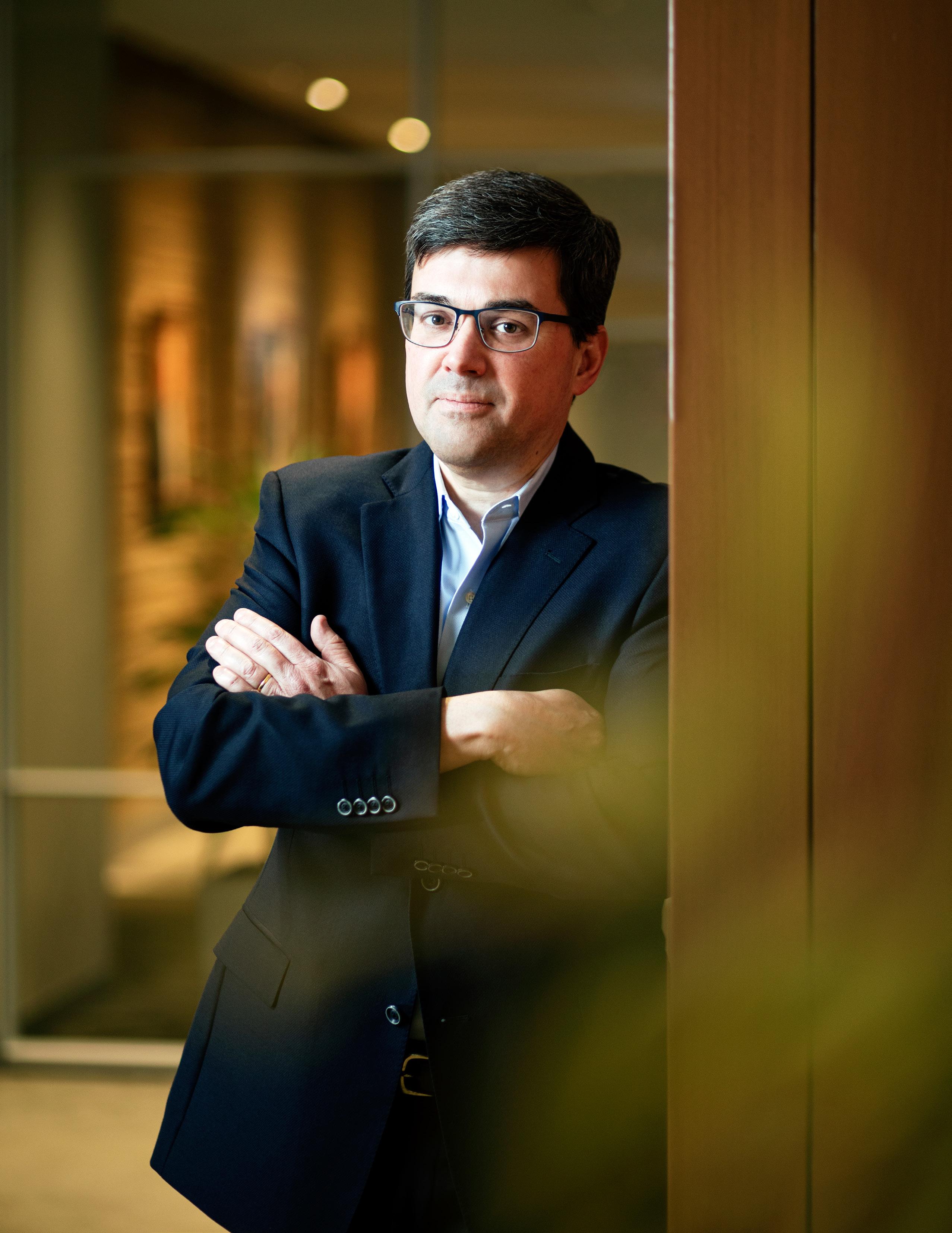
FOR
THE PAST FIFTEEN
YEARS, MAURICIO
MACHADO
has climbed through the international ranks at Cargill—but his ladder doesn’t look like any other. Initially brought on as an IT manager (with previous experiences in oil & gas and telecommunications under his belt), Machado leapt into one of the fields perhaps least associated with the idea of a traditional IT work: human resources.
Since 2006, Machado has cultivated extensive HR expertise, first in Brazil and later in the United States, where he now resides. The current vice president of total rewards at Cargill seemingly changed horses midstream, and didn’t so much as get water on his boots.
IT TO HR
“Moving into HR was a professional zig-zag and something you certainly don’t see very often,” Machado admits. “But it was a great opportunity for me at the time to diversify my career and learn different skills. When you think about Cargill as a company, you know you can change your career and take on different jobs without needing to leave and go somewhere else.”
Machado first pivoted into HR when he was tasked with overseeing HR for a Brazilian company recently acquired by Cargill, a global leader in food, agriculture, and nutrition. And it wasn’t a position that came with training wheels. “It was a very labor-intensive business, and it was not easy,” Machado recalls. “The first two years in HR, I had to relearn a lot of things.
Part of building out a successful HR career meant having to meaningfully differentiate Machado’s new path from his old. “When you work with technologies, it’s much more predictable,” Machado says. “You can plan ahead of time. When you work with people, you have to manage ambiguity and find ways to engage and motivate people.” The challenge was enough to make Machado consider moving on to a different area of the business, but fourteen years and a different continent later, he’s still in HR.
To Machado’s mind, this transition might have been a great deal more challenging at another company. “The first thing that was really important was the fact that I had such a good team in place,” Machado says. “Early on, I had to rely on my team to provide the expertise that I didn’t have in the beginning.”
The fact that Machado was also to work across multiple cultural lines, and with what he considers fantastic support all along the way, allowed the aspiring HR leader to grow exponentially. “One of our values is that we really do put people first,” Machado explains. “We really look at what we need to do to make sure that our people are successful. We welcome different points of view, backgrounds, and levels of experience and expertise.”
TO NOURISH THE WORLD
Machado’s success in building out a positive employee experience at Cargill, he says, comes down to two of the more fundamental values that Cargill represents. The aforementioned focus on people cannot be undervalued, he emphasizes. “When you become part of this company, you can feel it. You can see the outcome of your work translated into impact,” Machado says. “I cannot think of any other company where you can have the impact that we can have.
“We can impact billions of people,” he continues, “because our vision is to nourish the world, and to do that in a safe and responsible and sustainable way.”
128 Insights
“When you think about Cargill as a company, you know you can change your career and take on different jobs without needing to leave and go somewhere else.”
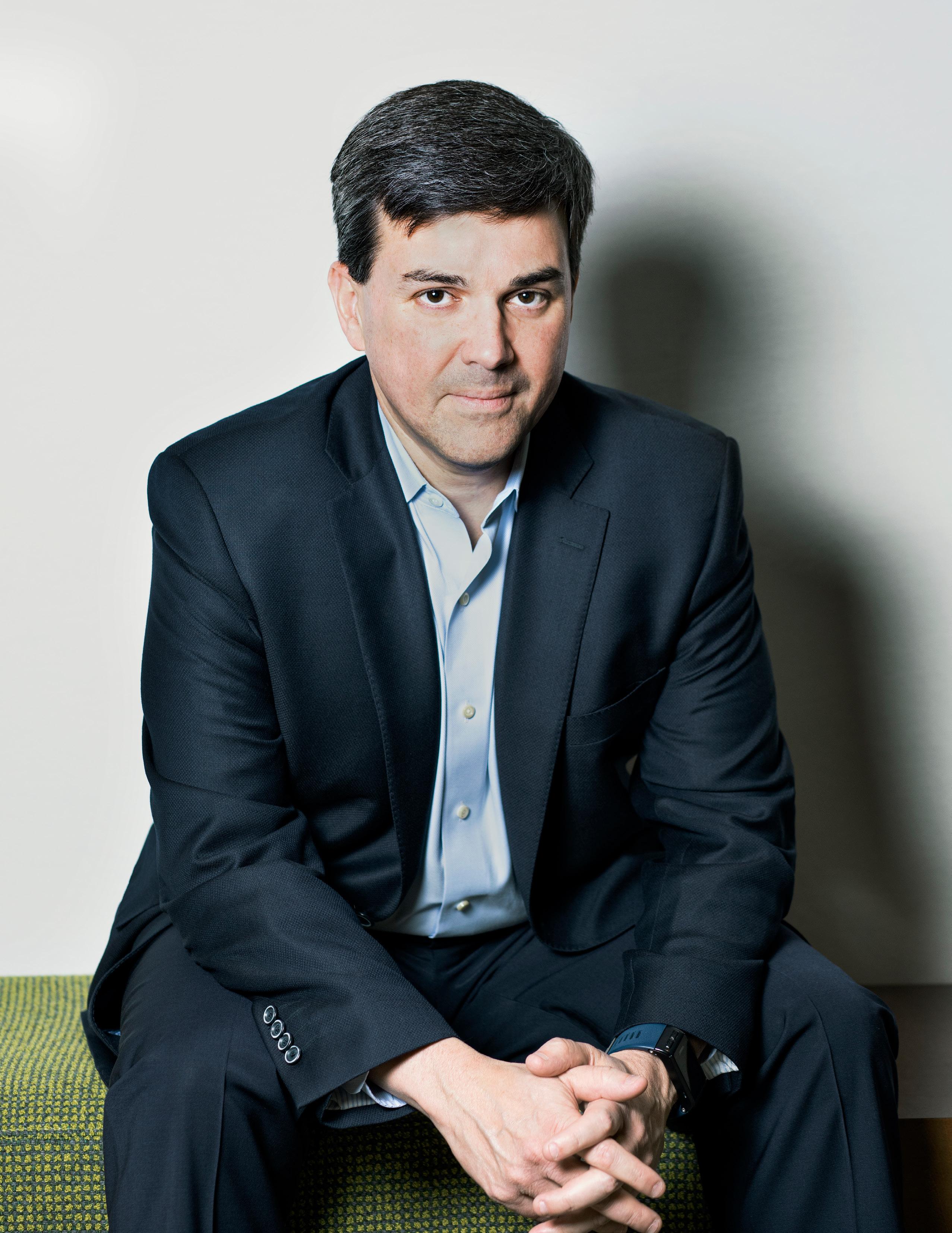 Mauricio Machado VP of Total Rewards Cargill
Mauricio Machado VP of Total Rewards Cargill
The second component of Machado’s mission means utilizing HR to drive all of the available tools and processes to enhance that employee experience. “Cargill is always looking for the best way to do things, and thinking about innovation and sustainability,” Machado says. According to Machado, Cargill creates a great employee experience by investing in programs such as the Global Day of Inclusion and targeted development to specific employee groups.
It also includes various business resource groups (BRGs), including a Hispanic BRG, and alignment with the Hispanic Promise, a public commitment to hire, promote, and retain Hispanic talent. “There are so many things we do every day to really create an inclusive environment and meet the diversity goals that we set for ourselves,” Machado says. “I’ve been fortunate to have a chance to experience the benefit and power of these opportunities myself.”
FINDING THE PASSION
Machado says his passion for innovation continues to be his north star while working toward new HR goals, both in regard to employee education and talent recruitment. “We have been supporting the deployment of digital learning across the company to create technology and learning opportunities that are convenient to use so that it almost becomes part of our day-to-day,” Machado says. “We’re very excited about the adoption we’ve seen because it provides our people the opportunity to make themselves better managers and better professionals.”
Technology has also been used to improve to the speed and reliability of interacting with potential job candidates. “When you think about attracting diverse talent, using technology to improve your job descriptions and make them more attractive for diverse candidates is essential,” Machado says of a recently launched pilot program for this technology.
Beyond these improvements to the Cargill employee experience, technology has also played a major role in helping Machado himself as he continues to evolve in his own practice. Adaptability, he stresses, is going to be the key to remaining relevant and effective—not just in HR but also across the company.
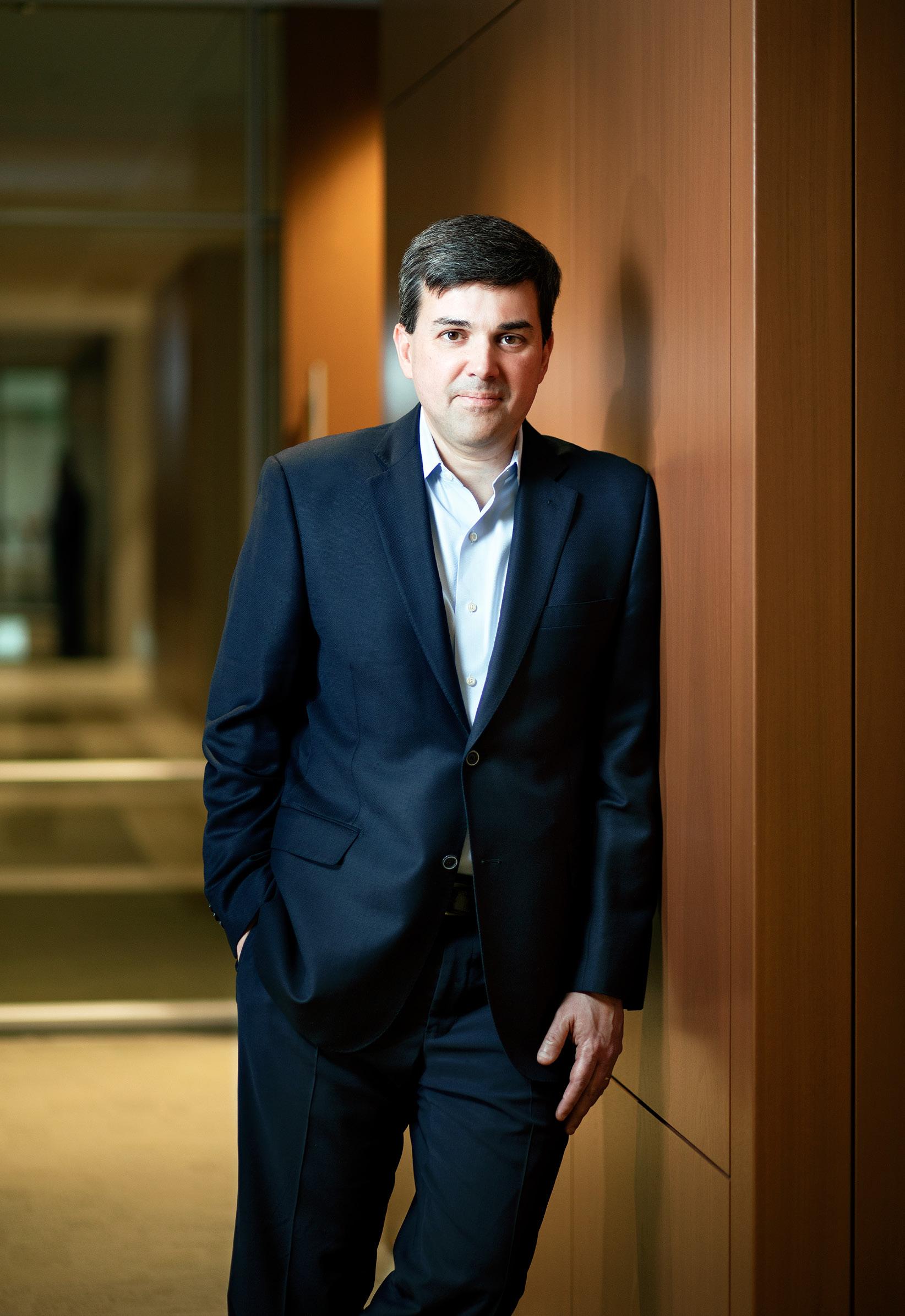
“We always need to be thinking about emerging jobs and skills that will be required in the future,” Machado says. “I’ve been doing a lot of work to bring visibility to the organization about where we should invest to develop those skills for the future.”
And there really isn’t anyone better to spotlight these opportunities than Machado, the IT-turned-HR professional who may very well be the definition of the word “adaptation.”
Bracewell’s William Avila has helped revitalize the city of San Antonio—all while breaking through barriers and promoting opportunities for other Hispanic professionals
Setting a Standard
BY KEITH LORIA AS A KID GROWING UP IN SAN ANTONIO, TEXAS,
William Avila saw a movie that changed his life. Knute Rockne, All American tells the story of a legendary Notre Dame football coach who inspires his team to win one for “the Gipper,” the star player (portrayed by Ronald Reagan), who is stricken by a fatal disease. Upon realizing that Notre Dame was a real school he could actually attend, Avila became a faithful fan of the Fighting Irish and made it his mission to go to college there.
He was in kindergarten when he made that allimportant decision.
Avila worked tirelessly to make that dream come true. He was not only accepted at Notre Dame but also made the baseball team and stayed for graduate school.
With his talent for math and science, Avila had set his sights on becoming a chemistry or math teacher, just like Rockne. But then a dean told him about another option. “He said, ‘If you want to put a man on the moon someday, you should stay in math, engi-
neering, or science. But if you don’t really care if you put a man on the moon and you want to do something else with math, you could think about economics,’” Avila remembers.
That was the first step that led Avila to his current position as a partner at international law firm Bracewell LLP, where he specializes in public finance law. And as his dean predicted, it’s work he loves. “Most people I talk to say they hate economics, but I just really enjoyed it,” Avila says. “Some of it was the fact that I was curious about how rich people think because I wasn’t one of them.”
Avila is also passionate about supporting his fellow Hispanics, especially those working in law and public policy. He himself has made a mark as one of the first Hispanics to work in municipal bond law and as the first Mexican American member of the National Association of Bond Lawyers (NABL).
“One of the things that has helped me, because we [Hispanics] were so rare in the business, was being a
131 Hispanic Executive
member of that organization and actually being a panelist and speaking at annual meetings, workshops, and training sessions,” he says of the NABL. “It helped with professional credibility, and it opened some doors for me to people who wouldn’t have thought a Hispanic can do this.”
COMING HOME
While attending George Washington University Law School, Avila worked as a research economist for President Jimmy Carter’s Southwest Border Regional Development Commission, which explored and developed economic opportunities along the US-Mexico border region. Avila wanted to work for Carter directly, but that chance went away when Carter lost the 1980 election to the Gipper himself, Reagan. And while Reagan was talking about cutting government jobs, San Antonio Mayor Henry Cisneros was talking about investment and creating jobs.
“So it seemed like a good time to come home,” Avila recalls.
Avila quickly landed a job with the San Antonio City Attorney’s Office as an economic development lawyer, and he worked on such notable projects as Sea World, Six Flags Fiesta Texas, and UTSA’s Downtown campus. During his career, he has also helped bring Toyota to San Antonio and worked on the Alamodome, Nelson W. Wolff Municipal Stadium (home of the San Antonio Missions minor league baseball team), and Port San Antonio.
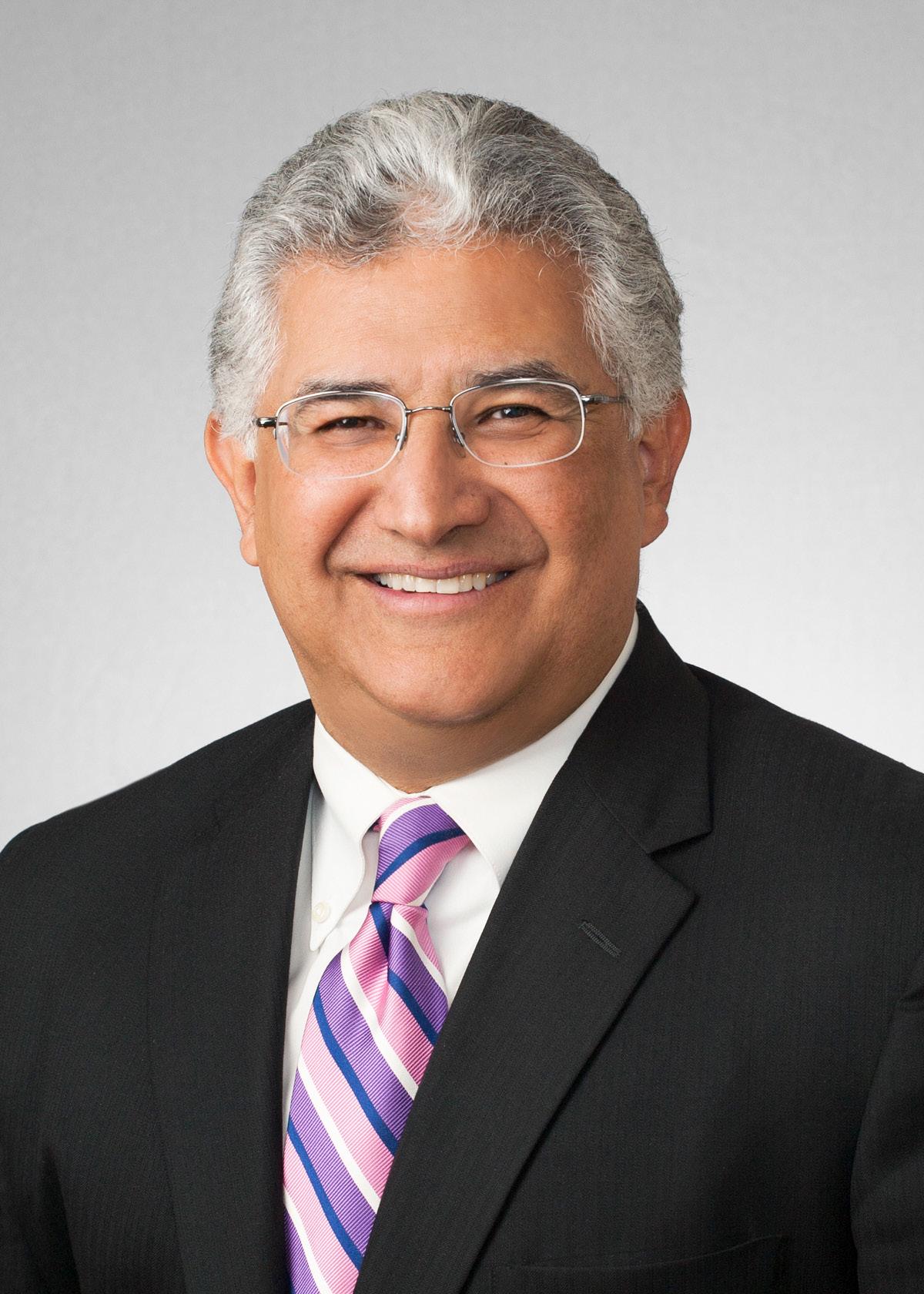
“People on the same team, and even on opposing teams, have to get along. It’s a social process to get things done, and the teams that are successful are the teams that know how to get along.”
132 Insights BHR GROUP INC
William Avila Partner Bracewell LLP
Since joining Bracewell in 2013, Avila’s work has included representing cities, counties, school districts, hospital districts, and housing authorities. He takes particular pride in his work with the El Paso Housing Authority in rehabilitating public housing units through a new HUD program, which led to the improvement of those homes and set a model for other housing authorities to follow. In total, the projects he has worked on over the years have generated one hundred thousand jobs and $50 billion of investment for San Antonio and its surrounding areas.



REFLECTING ON RAINBOWS
Even today, Avila turns to films for insight. A few years ago, he watched a documentary that explained how rainbows are only seen from 21 degrees from your eyeballs, so if two people stand side by side as they look at a rainbow, they don’t see the same rainbow. They see only the rainbow observable from their own eyeballs.




“That made me think, if eyeballs are the windows to the soul, then everything we see is seen from the depths of our souls. So, when we get to know each other better and understand what’s in each other’s souls, our rainbows in life start coming together,” Avila says. “People on the same team, and even opposing teams, have to get along. It’s a social process to get things done, and the teams that are successful are the teams that know how to get along.”

133 Hispanic Executive
CFO and natural introvert Alonso Ramos leverages the insights he gains from looking inward in order to better serve those around him
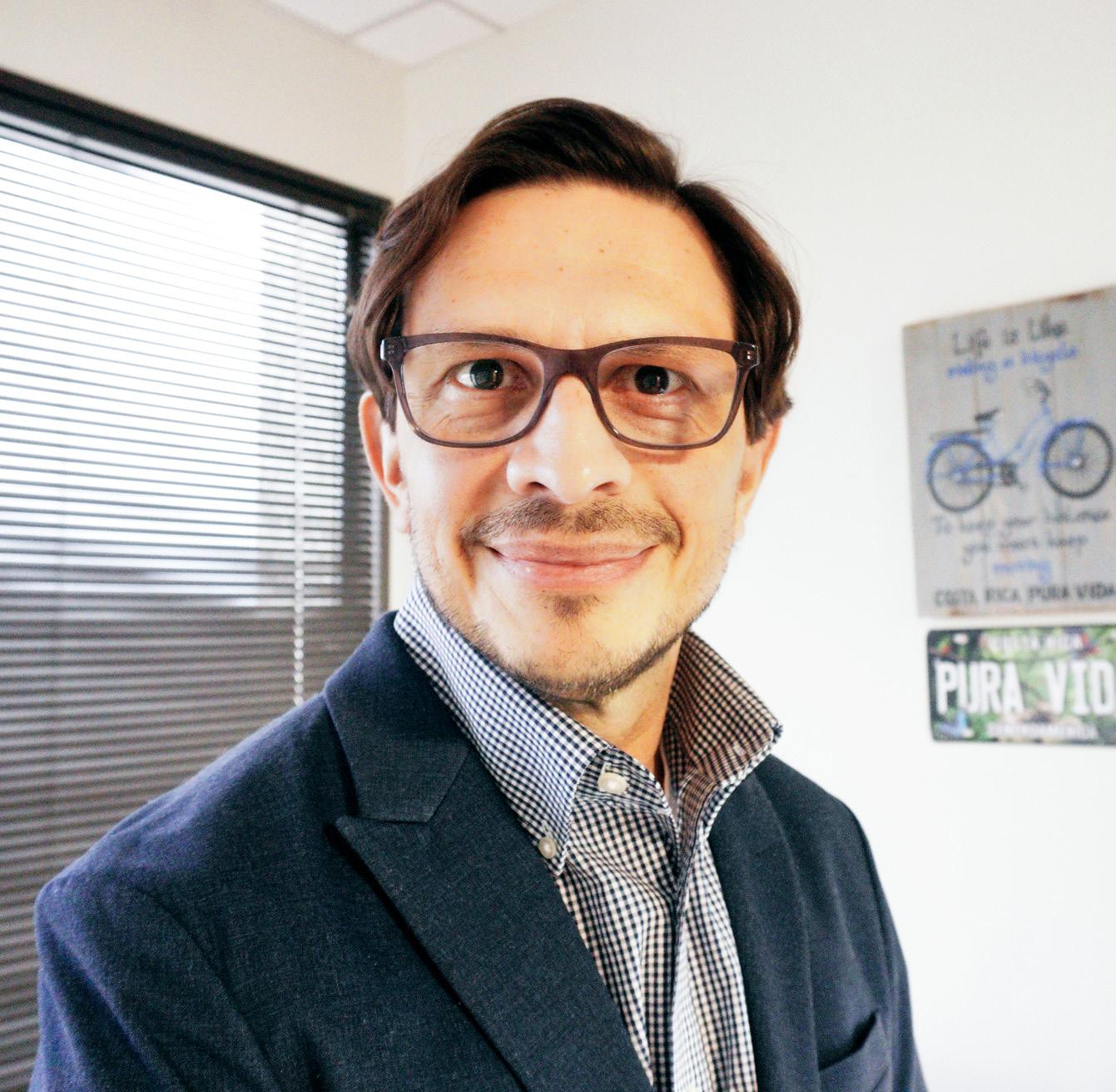
Driven to Transform
BY BILLY YOST
ALONSO RAMOS PRESENTS A contradiction that is worth digging into. The CFO is, without qualifier or apology, an introvert. “It’s the way I’ve always been and, at some point, I realized that I wasn’t going to change,” Ramos explains. “Yet I never saw it as an obstacle to being a leader. Leadership isn’t about me. It’s about caring for other people.”
Therein lies the philosophy that can seem contradictory at first glance. But Ramos’s willingness to put his ego aside and not indulge in the more alpha-male stereotypes associated with leadership is precisely why he has found success at Viscofan, a leading packaging company and diversified casings producer, as well as in various entrepreneurial endeavors and on the boards of directors he serves. The CFO learns the hopes, fears, and drivers for his people and, in doing so, helps cultivate a community wherever he goes.
A LEADER FOR OTHERS
According to Ramos, there are many benefits to being an introvert in a position of leadership. “I think being an introvert can potentially be a plus. If you’re not convinced that you’re that natural social leader, you really take the time to focus on other people,” the CFO explains. “I recently interviewed someone for a job, and I always spend that time just wanting to learn about the other person. You have to take that time to get to know someone’s mind and what motivates them.”
Alonso Ramos
CFO
134 Insights
Viscofan
The time Ramos has taken to understand himself has made him much more effective in connecting with others, he says. “By the very definition of the word, you’re always looking in,” Ramos notes. “That means you’re much more likely measuring yourself by your own standards, and not someone else’s, and that can be incredibly important.”
Of course, serving as an effective leader hasn’t been easy, nor has it come without a great deal of work on the CFO’s part. “I’m the kind of person that wakes up every day asking, how do I invest in myself today? How can I improve myself?” Ramos says. “The more research you do and the more work you do on yourself, the more equipped you are to handle those difficult situations.”
Perhaps most important of the many lessons Ramos has learned is the idea that leadership in business can be effective without the bells and whistles of someone who can work a room. “It doesn’t matter what kind of lifestyle you lead or how you look,” he says. “What matters is how you can contribute to your own community and how much you can help others.”
A MORE MODERATE REVOLUTION
Ramos is known for far more than his leadership style: he has also earned himself a reputation as a transformation expert in finance.
“I do think I’m known as a transformation agent,” the CFO says. “When you use the word ‘revolution’ it sounds like nothing is working right and everything needs to be changed. But I also don’t believe in remaining in the status quo. So I like to think of transformation as a healthy middle ground.”
The CFO’s résumé speaks volumes to that effect. He’s been called in numerous times to help make major process improve-
ments in financial practices as well as to help reorganize teams built to support that transformation for the long haul.
Viscofan’s most recent move has Ramos excited for the next opportunity for evolution. With the December 2019 acquisition of Japanese firm Nitta Casings, Viscofan’s already extensive portfolio has grown exponentially. “I’ve gotten involved in this acquisition, and I think it’s going to keep me very busy for years to come,” Ramos says.
To Ramos, transformation is always on the table. However, it is his dedication to his team that underlines his commitment to not simply change for change’s sake but rather to pursue better opportunities for everyone. “From our CEO to my team, I think a lot about what I feel should be expected of me,” Ramos says. “I want to be someone who is supportive, someone who listens first, and someone who is always trying to figure out how I can be better to others. That is my responsibility.”
Willis Towers Watson (WTW) is a proud partner of Viscofan, serving Viscofan’s commercial insurance and risk management needs at a global level for the organization. Working with Alonso Ramos and the Viscofan USA team on its US operations has been a pleasure, with Alonso engaging his WTW team as true business partners. As a result, and as Viscofan USA has continued to grow and diversify their footprint domestically, which has allowed for a very collaborative partnership that continues to yield benefits and leading outcomes for Viscofan USA. WTW is in the business of people, risk, and capital. With roots dating to 1828, our company has over 45,000 colleagues serving more than 140 countries and markets.
TRANSFORMING COMMUNITIES
When Alonso Ramos isn’t transforming financial operations or learning a new skill, he’s probably opening a new business along with his wife Shirley. In 2016, Ramos launched a product and marketing services company in Lawrence, Kansas. The company achieved breakeven point just six months into operation, and the Ramos family was able to leave on a high note in 2018. The CFO also dedicates time to serving on the board of the Mental Health Association of Chicago.
“I want to be someone who is supportive, someone who listens first, and someone who is always trying to figure out how I can be better to others. That is my responsibility.”
135 Hispanic Executive
The Ultimate Connector
BY BILLY YOST
Demetrio Garcia is a master networker who excels at bringing people together
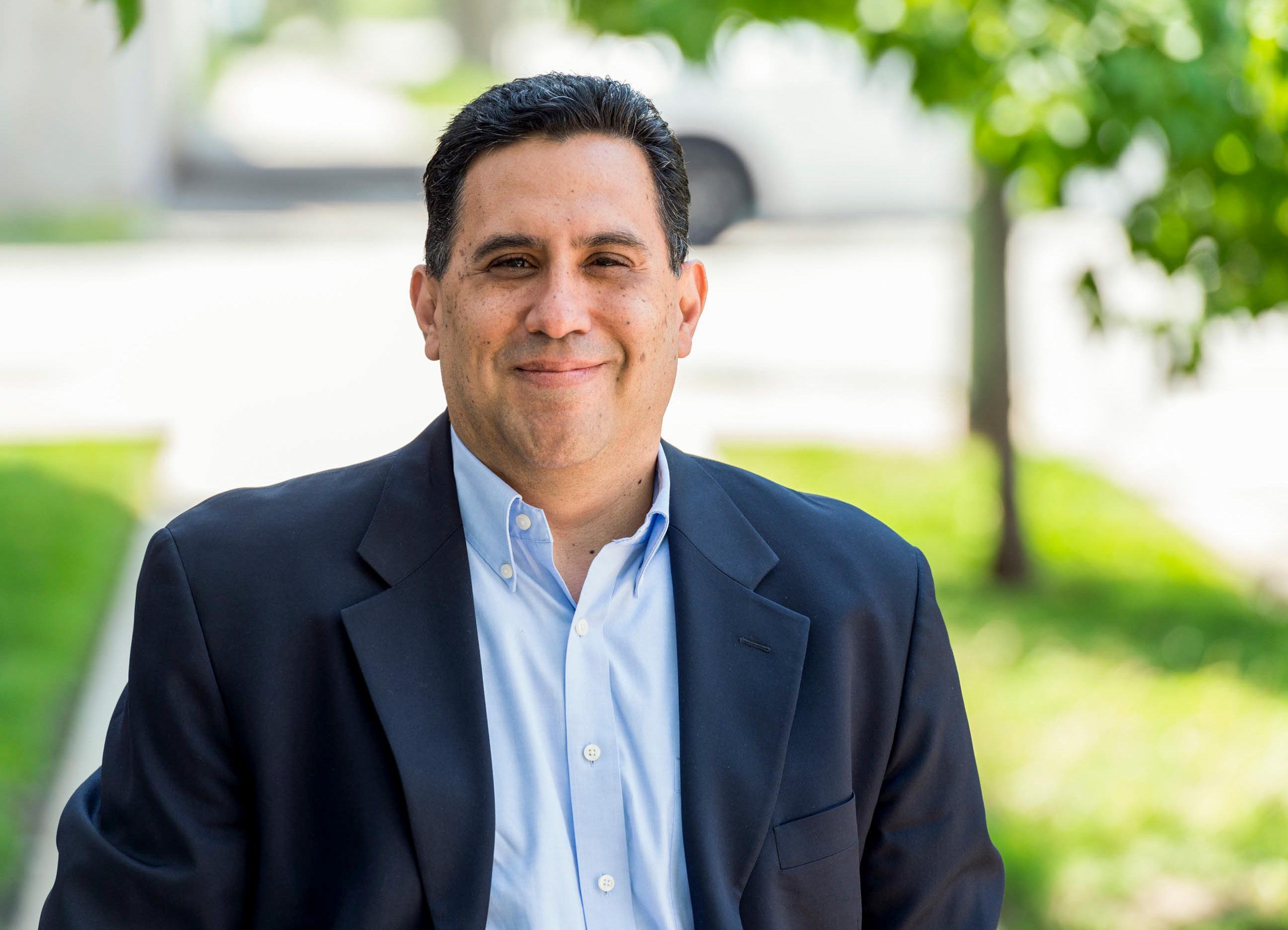
136 Insights ART CARRILLO
Demetrio Garcia VP of Global Business Development
“EVEN WHEN I WAS YOUNGER, PEOPLE WOULD ask me when I was going to start my own business,” Demetrio Garcia says. “I had that encouragement early on, but I didn’t really figure out my real purpose until I was fifty years old,” he adds, laughing. Garcia is a natural networker and a quintessential “people person,” constantly making connections and bringing people together.
Back when he was getting his degree in mechanical engineering, some of Garcia’s first mentors noticed his talent for making personal connections. The field of engineering isn’t exactly known for fostering relationships, but it’s precisely where Garcia cultivated experience. He worked as an airport and aviation engineering executive for over twenty-five years and also had the pleasure of living and working on three continents and in over 150 cities. He even had his own five minutes of fame as a young executive appearing in an article in the Wall Street Journal. In all, Garcia has spent three decades amassing operations, management, government relations, sales, and fundraising expertise.
“I was very fortunate to have some very good mentors early on,” Garcia remembers. “They told me that I’m not the type of person to sit behind a desk for my whole career. I needed to be talking with clients and really getting out there.”
In his fiftieth year, Garcia decided to write down exactly where he wanted his next fifty years to be headed. “I wrote down ‘entrepreneur, business owner, investor, and ultimate connector,’” Garcia, now fiftyeight, recalls. While he had been filling these roles in one way or another throughout his professional life, he’s been even more focused over the last eight years.
“Connecting others and helping people is just in alignment with who I am and my life’s purpose,” Garcia says. “My purpose as a servant leader is to help bring people together in whatever they’re doing: their work, their lives, and their goals.” He’s a master networker, not because he’s trying to get ahead, but because he truly believes it’s what he’s called to do.
Garcia is currently partner and global business development lead with Chicago-based Golden Hill Foods. The global food industry ingredients company
is a supply chain partner with some of the best and wellknown brands and food industry chains.
He also served as board member and as vice president of corporate strategic partnerships for the Association of Latino Professionals for America (ALPFA), Garcia is committed to supporting the more than ninety-two thousand Latino students, professionals, and entrepreneurs that make up its member base. The organization has more than 45 professional chapters and 160 student chapters at colleges and universities across the country. It’s allowed Garcia to grant students opportunities he himself never had. “I think I was thirty before I ever met a CEO,” Garcia says. “Now I’m getting the opportunity to introduce young students to CEOs and company presidents.”
Hill Foods
Golden
137 Hispanic Executive
“My purpose as a servant leader is to help bring people together in whatever they’re doing: their work, their lives, and their goals.”
Over the course of his career, Garcia has had the opportunity to serve on a variety of nonprofit boards and committees: Associated Colleges of Illinois, Boys Scouts of America, Ronald McDonald House Charities, Gift of Hope Organ & Tissue Donor Network, and the Barrio Foundation, among others. Next, he hopes to land a corporate board position, putting his extensive experience to use at the corporate level.
When that opportunity comes along, it’ll probably be through his extensive network—just like most of his other jobs, opportunities, and board work. “I tell students that I’ve applied for only one job in my life, right out of high school,” Garcia says. “The rest have all happened because of relationships, friends, and connections.”
Garcia doesn’t just network on his own behalf, but on behalf of others, as well. He’s particularly focused on young Latino professionals. “I’ve been working to help further foster the connection between senior Latino executives and the younger ones,” Garcia explains. “That mentorship model is so important because I feel like in my experience, there were so many things I just stumbled into, and the opportunity to provide more intentional steps for younger executives is something I value greatly.”
When speaking with younger and future professionals, Garcia turns a popular tactic into a more productive relationship-building exercise. “You always hear about the professor that tells you to look to your right and to your left and that one of you won’t be here by the end of the semester,” Garcia says. “I tell these young people to look in the same directions, but that one of you is going to be a CEO someday. How are you building connections that will endure?”
Garcia says he communicates regularly with a number of global CEOs and executives, but that’s not because he seeks out people with impressive titles. Instead, most are friends he’s made over the years have ended up in a variety of high-level roles (and many have appeared in the pages of Hispanic Executive).
“I have people with whom I conduct business, but they are my friends first. The relationship is more important, always,” Garcia says. He adds that focusing on the return on investment is one way to gauge success, but he has a different method. “I focus on the ROR—the return on relationship. And, more importantly, how am I adding value for them? Their business, their careers, their families, and lives!”
138 Insights
“That mentorship model is so important because I feel like in my experience, there were so many things I just stumbled into, and the opportunity to provide more intentional steps for younger executives and entrepreneurs is something I value greatly.”
Opportunity to Optimize
Mark Diaz spent nearly two decades transforming the University of Miami’s finances, operations, and organizational culture. Now, he’s using all that he’s learned to help transform life at George Washington University.
BY ZAYVELLE WILLIAMSON
MARK DIAZ IS CHANGING THINGS UP. Never satisfied with simply following the status quo, Diaz has spent decades innovating financial and cultural systems at some of the most prominent educational institutions in the nation. Today, as executive vice president and CFO for George Washington University (GW), he continues to drive financial and cultural transformation for the sake of students, faculty, and alumni alike.
Diaz left the corporate business world for a career in educational operations in 1999, when he joined the University of Miami as executive director of medical finance operations and budget. In his eighteen years at Miami, Diaz not only revamped the university’s business and organizational development but also helped spearhead Miami’s cultural transformation initiative, which centered on
employee morale, organizational expectations, shared values, and constituent service.
Diaz’s service in these areas earned him several promotions, first to associate vice president for budget and planning and later to vice president and interim CFO for the University of Miami’s Miller School of Medicine and UHealth. But to Diaz, the meaning of his work carried beyond any title or external recognition: as a double alumnus who had earned both his undergraduate degree and his master’s in professional accounting from the university, Diaz felt the importance of each and every one of his efforts to improve the University of Miami experience.
The EVP and provost of the University of Miami, Thomas LeBlanc, took note of Diaz’s dedication to the school as a “true partner,” and when LeBlanc moved to private research
139 Hispanic Executive
university George Washington University to take on the role of president, he offered Diaz a position as EVP and CFO.
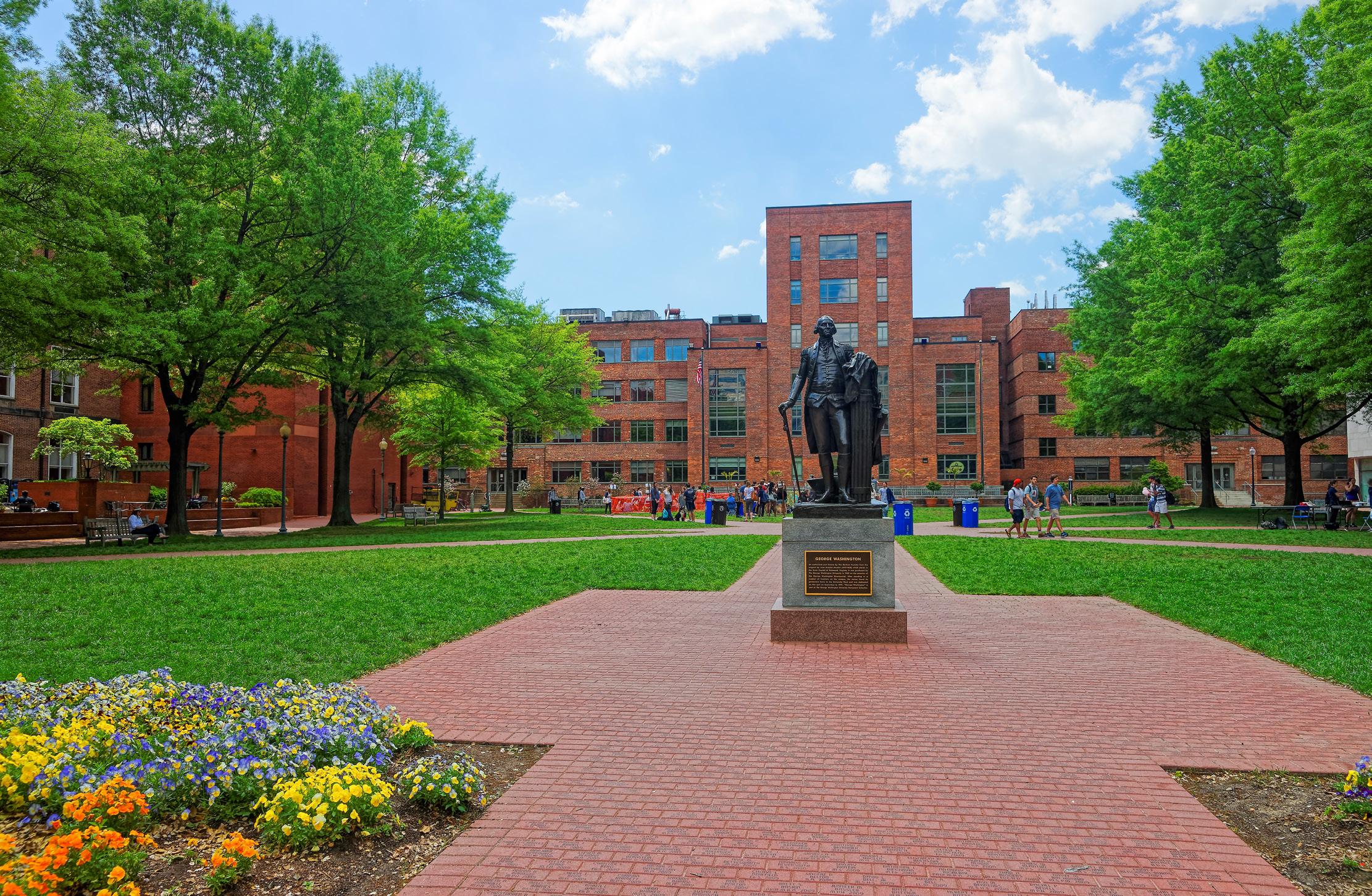
“[Mark] is a change agent who excels in reshaping processes to drive and sustain academic excellence,” LeBlanc remarked to GW Today in 2018 when it was announced that Diaz had accepted the position. “I am looking forward to Mark bringing this dedication and vision to the George Washington University as our community works together to achieve preeminence as a comprehensive global research university.”
Diaz was likewise enthusiastic about the change, stating, “My passion is organizational assessment and making things better, and I look forward to assisting the university in any way I can to achieve its aspirations.”
Indeed, Diaz has spent the past two years going to every length possible to make things better for the George Washington community. As EVP, Diaz has expanded the electronic security for fifteen of the university’s residence halls, ensuring that all students, faculty, and staff have equal access to safe environments. He has also expanded his own team in order to better drive his mission of championing workforce strategies, ensuring top-level employee compensation and recognition, and revitalizing the university’s financial systems operations.
That mission aligns perfectly with LeBlanc’s Institutional Culture Initiative, a university-wide effort to foster a rewarding, positive environment for students, alumni, staff, and faculty.
26,000+ undergraduate and graduate students 130 countries represented in the student body 475+ student organizations 10 schools and colleges 72% of students receive financial aid
BY THE NUMBERS
Source: George Washington University
140 Insights ROMAN BABAKIN / SHUTTERSTOCK.COM
A statue of President George Washington figures prominently on the campus of George Washington University.
“A university’s culture is about values and behavior, which means it is about people—all of us,” Diaz said of the initiative on its site. “It is critical to first assess, or diagnose, our institutional culture. This goes beyond anecdotes to look at how we work together across the university and how we interact with the broader GW community. This is a big endeavor, and it is key that everyone participates. I’m very excited to join this effort, and to be part of this vibrant community.”
As the sponsor of the Institutional Culture Initiative, Diaz has helped drive significant improvements for the GW community, including the expansion of the university’s shuttle bus system, the transformation of new employee orientation and onboarding, an increase in the tuition remission rate for university employees and their families, and the implementation of a university-wide culture assessment designed to help establish a common purpose and shared set of values.
Some of these elements are not traditionally seen as HR or cultural supports, but to Diaz’s mind, they are all essential to improving the GW experience.





“Culture is not simply a customer service thing. It isn’t putting on a smiley face and reading from a script,” the EVP told GW Today. “GW has resources—human, financial, and other assets—and it’s a matter of optimizing them to grow and achieve our aspirations.”
eMerge Americas is a platform which fosters innovation and serves as a catalyst for investment throughout the Americas. With over 16,000 global industry leaders, investors, government leaders, and entrepreneurs, the annual eMerge Americas conference is the premier tech event connecting the Americas. To learn more, visit emergeamericas.com.
141 EagleBankCorp.com 301.986.1800 MD | DC | VA
the nation’s
educational
valued client.
202.481.7017 JVogt@EagleBankCorp.com
58720060-038_EB_Hispanic_Executive_1/3pg_Ad_hz2.indd 13/17/20 1:53 PM www.emergeamericas.com eMerge Americas is proud to honor and celebrate for his stellar leadership. The premier tech event connecting the Americas. MIAMI BEACH CONVENTION CENTER APRIL 26-27, 2021
We congratulate Mark Diaz , Executive Vice President and Chief Financial Officer at The George Washington University, for his outstanding service to one of
top
institutions and a
We love to see the good work of good people recognized and celebrated. — John R. Vogt SVP, Enterprise Banking
Way to go, Mark.
The Better Off You’ll Be
BY BILLY YOST
IT CERTAINLY ISN’T UNCOMMON FOR LAWYERS
fresh out of law school to endure endless hours of low-level associate work in order to gain knowledge and start moving up the pecking order at firms. They’re often relegated to the granular details and small scopes of much larger cases and expected to handle the grunt work. But that experience was not shared by G. Michelle Ferreira.
Following her summer internship at the IRS, Ferreira was offered a job before even graduating from law school. Her successful bar results came in November 1995, and she was due to be first chair on behalf of the IRS commissioner at a trial the following month. “I was sworn in early because I had to be admitted to the bar to try the case,” Ferreira remembers. “Luckily, I had a friend whose dad was a judge who could swear me in before my law school class. I was going to be in the middle of a trial by the time the mass swearing at my law school was scheduled to take place.”
Today, as a comanaging shareholder of two offices at global law firm Greenberg Traurig, Ferreira believes she’s ascended to the highest levels of leadership as a result of the extraordinary amount of hard work she’s put in—but also because of the foundation laid and built by the variety of influential mentors over the course of her career. In her present role, she provides her own brand of mentorship to young entrepreneurial and determined lawyers, and she believes Greenberg Traurig represents what can be built when diverse voices are allowed a chance to speak.
THE PERFECT FIT
Ferreira’s success can be linked to the lumps she was willing to take and grow from as a young lawyer at the IRS. “I loved it,” Ferreira says. “I led all kinds of complex tax litigation, and it was usually just me as the sole counsel for the commissioner.” On one side of the table was a taxpayer with, at times, a bevy of representation. On the other side, it was often just Ferreira.
After eight years at the IRS, the attorney was looking for a new challenge. “I was really interested in going to a law firm, but I didn’t know anything about them,” Ferreira says. “I hadn’t summered at one and hadn’t pursued the traditional legal career up to that point.” She rattled through a roll call of interviews, but one in particular stuck out.
For G. Michelle Ferreira, the more mentors the better. It’s a message she trumpets to the next generation of lawyers at Greenberg Traurig.
142 Insights
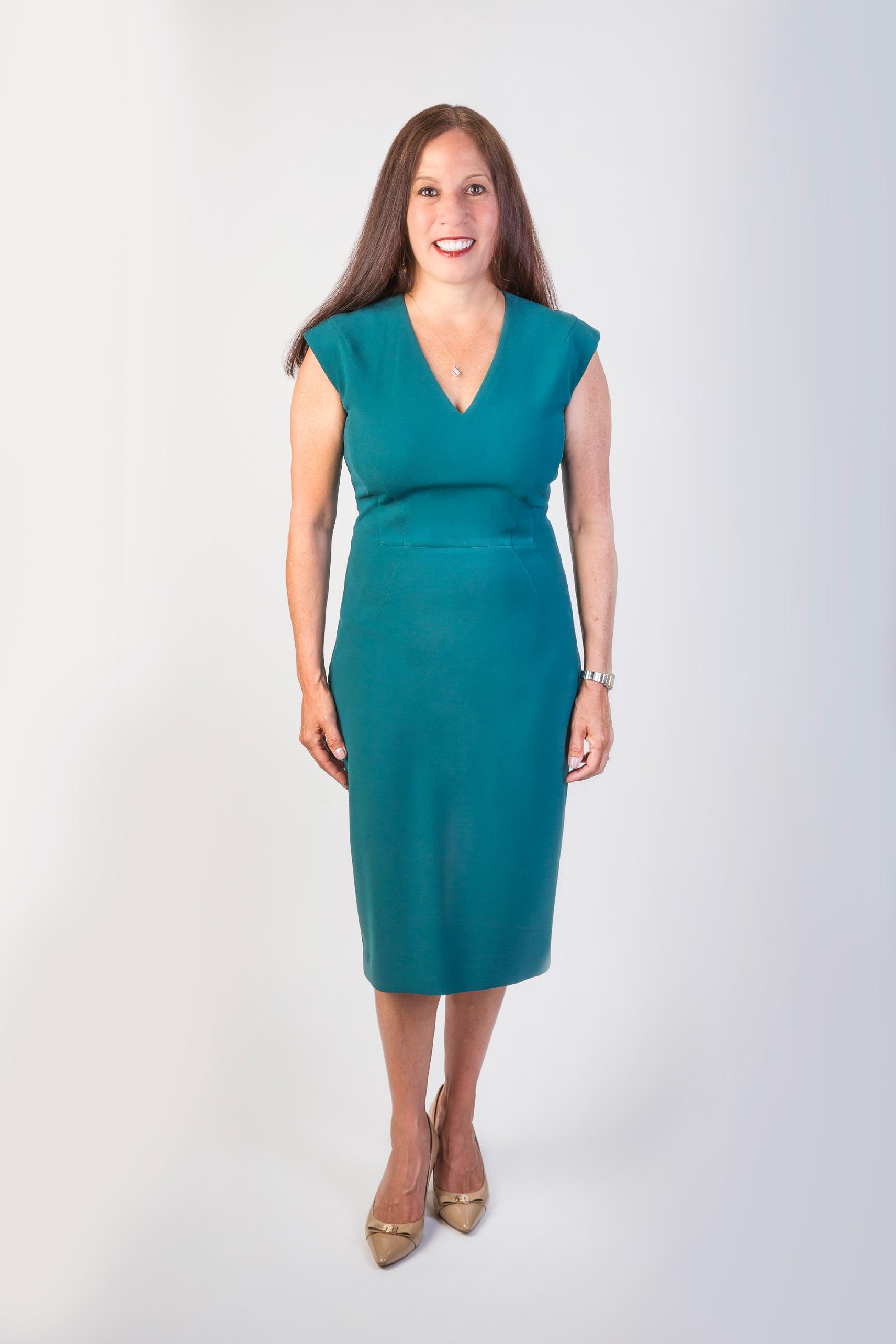
143 Hispanic Executive ELI PITTA
G. Michelle Ferreira | Comanaging Shareholder, San Francisco & Silicon Valley | Greenberg Traurig
Diverse by Design.

“Greenberg Traurig was so compelling to me because of their story,” Ferreira explains. “It was a firm that was rooted in diversity, partially founded by Jewish lawyers who couldn’t get a traditional job in 1967 Miami simply because they were Jewish.” In 2004, Ferreira leaned into Greenberg Traurig’s message well before diversity and inclusion initiatives became a proper (and long overdue) worldwide talking point.
Just as important for Ferreira was the latitude she’d be provided. “Greenberg Traurig is very entrepreneurial, and they said they would give me the structure and the law firm to practice the way I wanted to practice,” the attorney says. “It was a perfect fit.” Ferreira began as a counsel whose goal, start to finish, was to build a practice of her own. “I didn’t really have aspirations to be a shareholder,” the lawyer says. “But I built a significant tax litigation practice with the support of a wonderful law firm that values my opinion.”
Ferreira made shareholder and then comanaging shareholder of the San Francisco office. Then she was selected to become a voting member of the executive team, before adding comanaging shareholder of the Silicon Valley office. “I’m so honored to be brought to the table and put in a position of leadership here,” Ferreira says. “But a title doesn’t make you a leader at Greenberg Traurig. Leadership is demonstrated through action.”
THE BETTER LAWYER YOU WILL BE
Ferreira says that at her firm, diversity isn’t just about its lawyers. “It’s our staff and our vendors, too,” she explains. “We choose vendors that value diversity. It’s something that we’re obviously very serious about and something that is easily seen from the outside.”
Diversity is also an important factor Ferreira considers when asked what advice she may have for young lawyers. “I’ve always had great, strong female role models, first at the IRS and in my law firm,” she says. “I’ve also had wonderful male mentors. That’s always been my mantra. The more mentors you have—and the more diverse they are—the better lawyer you’re going to be.”
Over the course of her career, Ferreira says that as she’s seen progress in the representation of minorities in law, she’s become thankful for both the generation before her that broke the ground and for the next generation whose ideas of inclusivity are ingrained from an early age. And though leadership at the firm is earned, Ferreira says she’s empowered to bring in entrepreneurial and motivated talent from wherever she finds it. “When I recruit from other law firms, I promise them the moon,” Ferreira says. “Because Greenberg Traurig is the place to be, and I need to make sure that happens for them.”
144 Insights 2100
GT_Law Greenberg Traurig, LLP GT_Law GreenbergTraurigLLP LEARN MORE AT GTLAW.COM
No. of African American Partners* #2 No. of Hispanic American Partners* #4 No. of Minority Attorneys* #6 No. of Female Partners* Greenberg Traurig is a service
and
Traurig,
Traurig, P.A.
Traurig, LLP. Attorneys at Law. All
Attorney advertising. Contact: G.
San Francisco at 415.655.1300
in Silicon Valley at 650.328.8500. All rights reserved. °These numbers are subject to fluctuation. *Diversity, Women’s Scorecards, The American Lawyer/National Law Journal, 2020. 34270
“But a title doesn’t make you a leader at Greenberg Traurig. Leadership is demonstrated through action.”
ATTORNEYS
|
41 LOCATIONS°
#1
mark
trade name of Greenberg
LLP and Greenberg
©2020 Greenberg
rights reserved.
Michelle Ferreira in
or
We’ve made diversity and inclusion integral to our legal services and civic investments,
a more just world happens only by design.
because
The Dinosaur that Adapted
BY CORA BERG
ADOLFO GARCIA DOES NOT HESITATE to call himself a dinosaur. He proudly dons the title, earned through the forty-six years he has put into international business law since launching his career in 1974. “There are few things I have not seen,” Garcia says of the legal industry.
Garcia initially found himself working in law through a process of elimination. “I am not smart enough to be an engineer,” he says, laughing, of the profession his parents wanted him to pursue. “Some of us thought that law was a good general education, a way towards reform.” Now, he understands that law is very specialized—and, if he had it to do over again, Garcia says he would actually steer away from a field that puts him in an advisory role and follow a path that leads to more direct decision-making: business.
This interest in business, however, means that Garcia offers clients a unique perspective. “Part of my success,” he says, “is that, deep down, I am a business person clothed in a lawyer’s suit. I have great chemistry and synergy with businesspeople. I understand what they need and what the law can do for them.” Garcia not only assesses risk for his clients but also advises them on what he would do in a situation. Seeing himself as a true asset to business development, Garcia says, “I am active in planting seeds.”
Now a partner at Boston-based law firm Brown Rudnick, Garcia leverages his business acumen, as well as his experience with diverse cultures and jurisdictions, in his work across western Europe, Argentina, Chile, Columbia, Mexico, and Cuba.
Though Garcia claims he was not smart enough to be an engineer, he has proved smart enough to evolve in the changing landscape of corporate law. “You have to adapt,” he emphasizes. “The world changes. You

After forty-six years as an attorney, Adolfo Garcia still innovates the field as a partner at Brown Rudnick
145 Hispanic Executive
Adolfo Garcia Partner Brown Rudnick
BILL HORSMAN
We are a full-service law firm with headquarters in São Paulo and branches in Rio de Janeiro, Belo Horizonte, São Bernardo do Campo and Campinas. Our multidisciplinary team is formed by over 100 associates and partners.
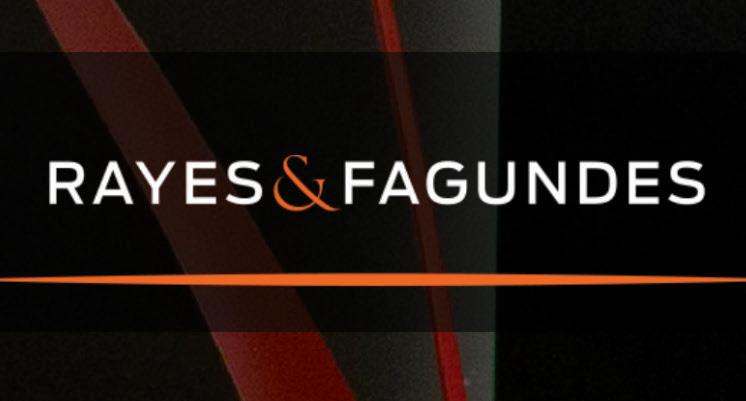


The feature that di erentiates us from our competitors is our strong commitment to have our clients assisted closely by our most experienced attorneys.
We advise clients from a wide range of industries, with strong presence among food & beverage, pharmaceutical, chemical, logistic, technology and financial companies.
have to respond.” He explains that, when he started, the general advisor role played much more prominently. During his career he has watched “hyper-specialization” become the norm, from corporate real estate to intellectual property. And while lawyers now practice in specific spaces, “industries were fungible” in the past, he says.
“As I get older, the world has shrunk,” Garcia reflects. “When I started in 1974, the majority of work was domestic.” Legal work was geo-specific, he explains. Chicago firms, for example, were Chicago firms, overseeing cases specific to the region. Over the course of his career, Garcia witnessed a systemic shift to a more global approach. And now, though specialization is the norm, he sees globalization resulting in international—or even intercontinental—components in most major significant matters.
Entering corporate law on the international side, Garcia has had an advantage even as the profession has shifted. His decision to work in international law stemmed from a long-standing interest in other countries, systems, and cultures—an interest that influenced his decision to pursue his JD at Georgetown, where he could focus on international law.
Today, Garcia has stayed true to himself and his passions, by not only working in international law but also bucking the specialization trend and running a diverse practice at Brown Rudnick. At any one time, Garcia might be representing various clients seeking counsel on a buyout M&A transition, succession and inheritance issues, a joint venture, international personal property, or international development around green plastics.
To remain prepared to respond to such a diversity of needs, Garcia says, “I read a lot.” He knows the importance of staying relevant. However, he also knows that, for some elements of law, “I don’t need to know specifics. I need to know where to go to get support, and I have a tremendous network of colleagues and experts to consult with.”
After a career leading international work at several large firms, including McDermott Will & Emery and Ropes & Gray, Garcia is happy to have spent his last eight years at Brown Rudnick. With more than 250 lawyers and only 2 foreign offices, Brown Rudnick provides a less siloed experience than other firms, Garcia says. “I value knowing the people I work with and being able to manage the relationships,” he explains.
The firm may be on the smaller side, but Garcia’s plans are not. “I still have mountains to climb,” he says. He wants the chance to climb and conquer those mountains, a range he sees rising through his business life as he helps clients navigate the peaks and valleys of a globalizing world.

146 Insights
“The world changes. You have to respond.”
www.rfaa.com.br CIVIL LITIGATION CORPORATE | M&A RESTRUCTURING & REORGANIZATIONS LABOR | TAX
GLO
Global
148 Flavio Martins Ferreira, GLP
154 Antonio Assumpcao, Lenovo
156 Daniel Pérez Umaña, BAC Credomatic
opportunities—for
in
worldwide.
BAL
International businesses present unique challenges— and
corporate citizenship
multiple countries. The executives featured here thrive in navigating cultural shifts
The Case for Bold Action
Flavio Martins Ferreira has found global success at a young age. His secret? Always asking for the jobs he wants.
BY STEPHANIE ZEILENGA PORTRAITS BY NOLIS ANDERSON
148 Global
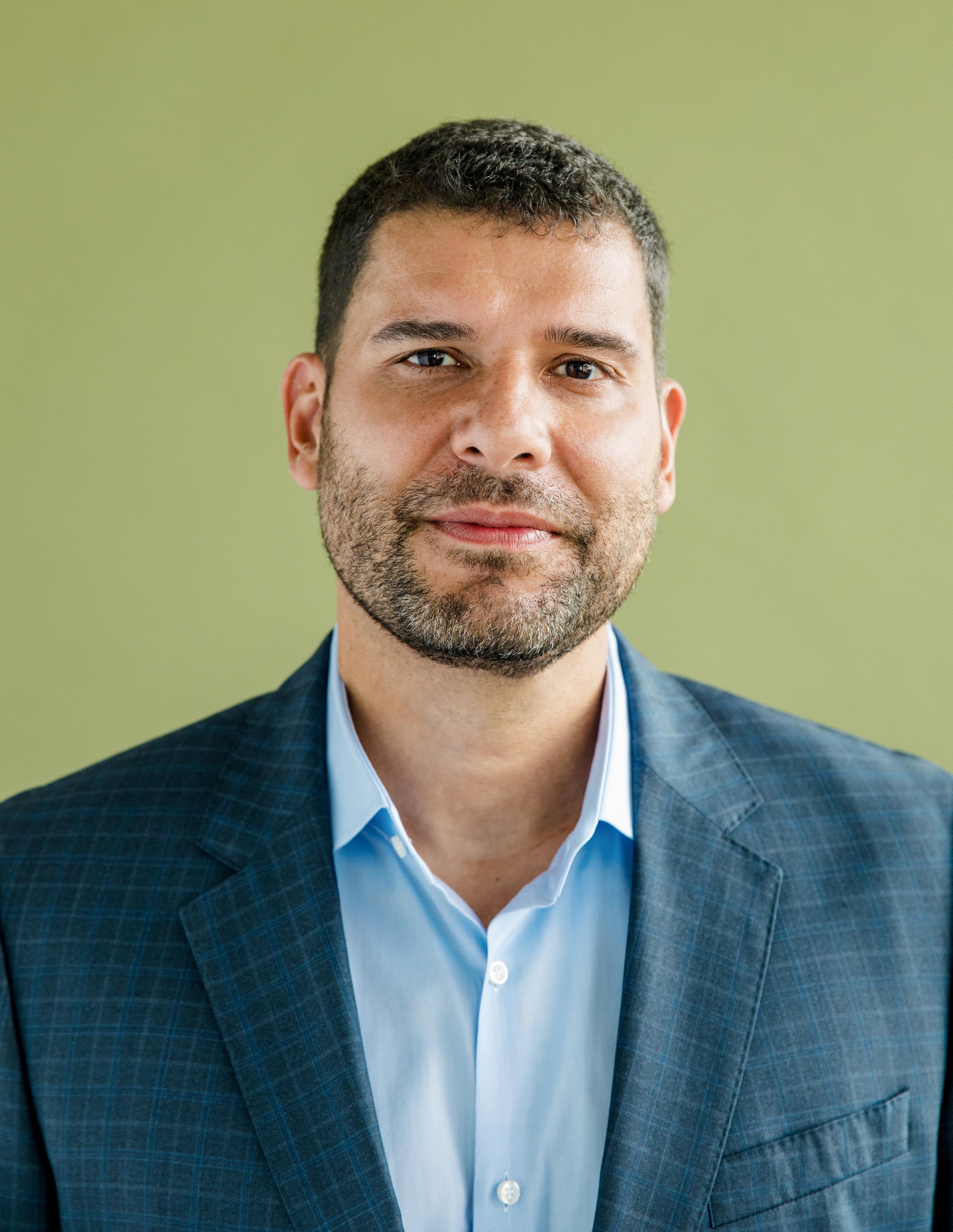
WHEN FLAVIO MARTINS FERREIRA WAS fourteen and looking for a seasonal temp job, someone gave him advice that still sticks with him to this day: “If you want the job, ask for it—there’s no shame in asking.” Martins Ferreira has followed that advice throughout his career. By simply asking for the jobs he’s wanted, he’s found global success at a young age and has built a reputation as the go-to leader for creating integrated compliance initiatives at international firms.
Today, Martins Ferreira is global head of compliance at GLP, a leading investment manager and business builder in logistics, real estate, infrastructure, finance, and related technologies. He grew up in Brazil, where the school system requires students to make a career decision when they’re around seventeen and launches them straight into graduate school rather than an undergraduate program. Martins Ferreira’s choice was heavily informed by the advice of his father, a successful lawyer. “He guaranteed I would
find a place to be in law, and he was right,” Martins Ferreira says.
After graduating from law school, Martins Ferreira worked with a prominent law firm in São Paulo for twelve years. In 2007, the firm even sponsored him to go to the United States to earn a master of laws degree from Cornell University. When he returned to Brazil, Martins Ferreira asked his firm if he could focus his work in the regulatory investment funds sector, including mergers and acquisitions (M&A). He had some interest in the area and felt he could do the job well.
The second M&A transaction Ferreira Martins worked on in Brazil was JP Morgan’s acquisition of Gávea Investments, a Brazilian private equity management firm. And for the second time, Martins Ferreira, then thirtyone years old, saw an opportunity to ask for a job he knew would propel him to new heights in his career.

“The deal took almost a year, so I got to know everyone at Gávea,” Martins Ferreira
recalls. “JP Morgan wanted to build a new, independent compliance department and had the right to appoint a general counsel and chief compliance officer. I asked to be considered— just considered—for the position.”
Martins Ferreira got the job.
He also learned another important lesson about asking for a job: how will they know you want it if you don’t ask? “JP Morgan didn’t expect me to want the job,” Martins Ferreira explains. “I believe I was on track to become partner for the number one firm in Brazil. But I was at least three years away from being eligible, and I wanted to try something new. With this role, I’d have the opportunity to bring my personal touch and best practices together to build a legal compliance department.”
According to Martins Ferreira, his biggest accomplishment at Gávea was implementing a “Chinese wall” structure between the company’s private equity and publicly traded investment teams. “When there’s
150 Global
GLP
Flavio Martins Ferreira Global Head of Compliance
MORRISON & FOERSTER’S AWARD-WINNING LATIN AMERICA DESK


LATIN AMERICA'S 2020
LATIN AMERICA'S 2020
100 LAWYERS Ruti
TOP 100 LAWYERS Randy Bullard
TOP
Smithline

“Getting that macroview of any business can be an amazing trampoline for anything you want to do in life.”
no division between the public and private trading desks, regulators assume that everyone has the same level of information, so everyone is restricted from trading because of that access to proprietary information,” he says. “The wall was extremely difficult to implement, but it allowed the public trading desk to be free from trading restrictions.”
In 2015, Martins Ferreira made another move, joining GLP as general counsel and chief compliance officer (CCO) for the Brazil branch. In 2017, at a GLP legal retreat in Seattle, Martins Ferreira learned the company was going private and would need to create a global compliance department headed by a global CCO. Once again, he asked to be considered for the job, and he got it, moving his young family to Chicago. By this time, Martins Ferreira was just forty years old.
“I like the challenge of building compliance departments from the ground up,” Martins Ferreira remarks. “If the position I am in today had already existed and all of the processes were in place, I wouldn’t have applied because it would have been too mechanical for me. I do things with passion, not because I love compliance but because that’s the only way I can see doing a job at this level.”
Martins Ferreira spent his first year as global head of compliance patiently absorbing everything about the business before launching into any major initiatives—not an easy task for such an energetic person. But in the second year, he got to work building a world-class, independent integrated compliance department spanning the company’s entire global operations.
“In addition to creating an integrated department that still respects local cultures and regulations, the other goal was to improve internal controls and bring new initiatives that align with the GLP fund management platform,” he says. “Our business is regulated in several jurisdictions, and we want to compete with the best in class in all aspects.”
Indeed, Martins Ferreira’s partners in the field have taken note of the quality of his work. “Having worked with Flavio on a wide range of matters since he joined GLP, I have seen up close how his strategic and business-oriented approach has enhanced outcomes for the business,” says Shirin Tang, a partner at international law firm Morrison & Foerster. “Flavio has superb instincts for developing balanced solutions addressing both compliance risk and business opportunities for GLP.”
Finding success on a global scale at a young age has been no accident for Martins Ferreira—clearly, he’s taken bold action at every turn and backs that up with hard work, passion, and powerful results. Martins Ferreira passes on that same advice to many of the young lawyers he works with.
“I remind people that no job you take is forever,” he says. “Working in compliance gives you a strong advantage to launch your career in many directions because you get to talk to every single department within the company—you see the entire business, understand where the problems are, and understand what’s working. Getting that macroview of any business can be an amazing trampoline for anything you want to do in life.”
153 Hispanic Executive Kirkland & Ellis LLP 601 Lexington Avenue New York, NY 10022 +1 212 446 4800 | www.kirkland.com Kirkland & Ellis is proud to join in recognizing our friend and client Flavio Martins Ferreira Global Head of Compliance at GLP
Legal Director Antonio Assumpcao
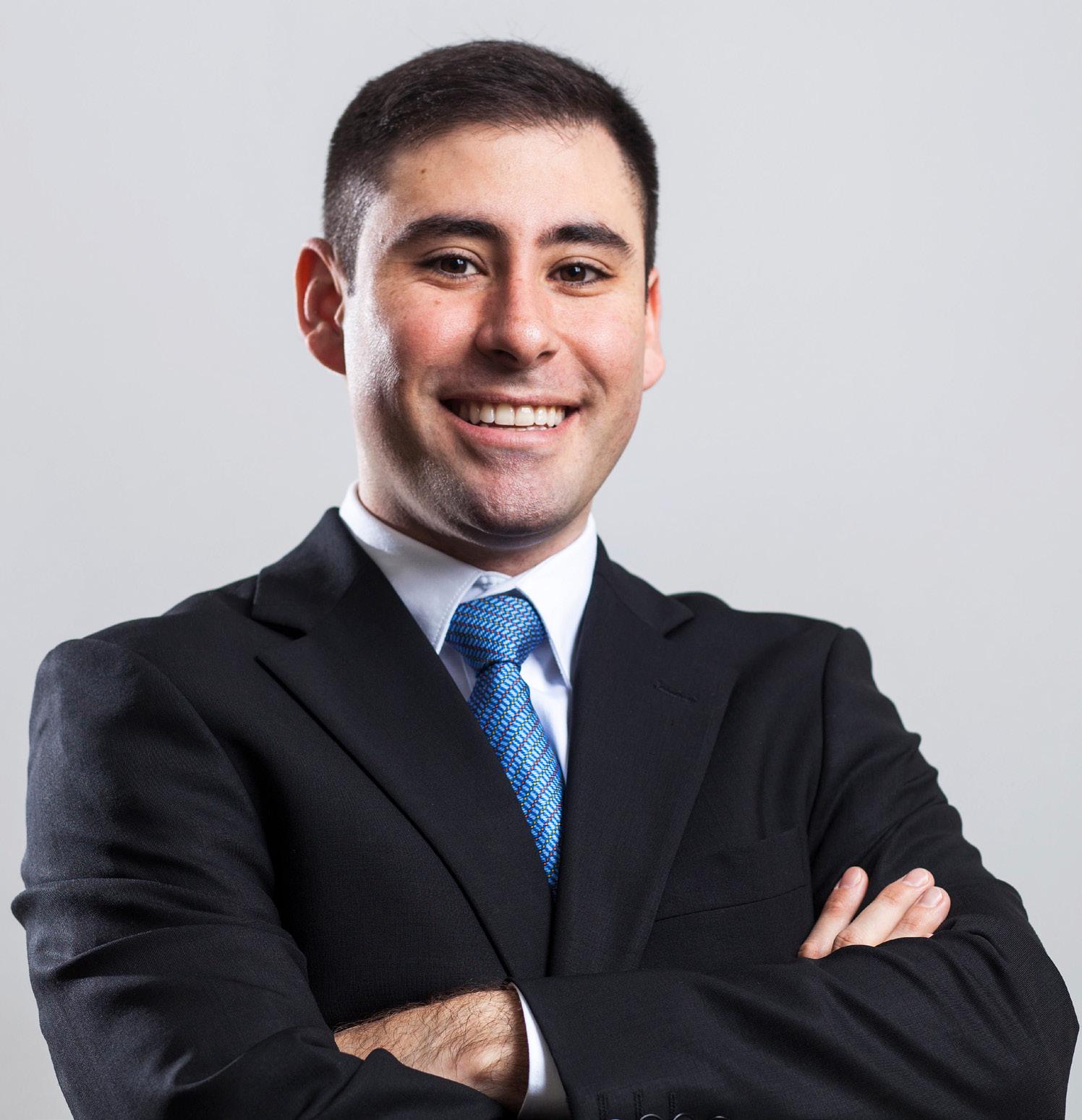
A Family Business
BY SARA VERDI
WHEN YOU THINK OF FAMILY businesses, a law firm isn’t typically the first kind of establishment that comes to mind. But for Antonio Assumpcao, that’s exactly the mom-and-pop business he grew up in: his grandfather was the chief justice of the State Supreme Court in Rio de Janeiro, Brazil, and after retiring from that position, Assumpcao’s grandfather opened an independent law firm. At the age of fourteen, Assumpcao began shadowing his grandfather at work. “My grandfather was my first mentor, role model, and law professor,” he says proudly. Every day after school, Assumpcao would head over to his grandfather’s office to study a certain law or case, and at the end of the day, he would present his findings to his grandfather.
This after-school activity not only trained him for a future profession but also reinforced Assumpcao’s desire to do the work he felt he was meant to do. “I never had any doubt in my mind that I was supposed to become a lawyer,” he says. “The practice was never imposed on me, but it was certainly the most natural progression for me.”
154 Global
has always known he would become a lawyer. Now, inspired by his grandfather, he leads the way at Lenovo.
WILSON ARAUJO
Antonio Assumpcao Legal Director of North & Latin America Lenovo
Building on the skills he gained as a teenager, Assumpcao attended law school in Brazil and rejoined his grandfather’s firm following his graduation. “I stayed at the firm for a couple of years, but I knew that I always wanted to have an experience outside of Brazil,” Assumpcao explains. “I decided to go to the United States to do my LLM [Master of Laws] in comparative law. I never looked back.”
After completing his LLM at the University of Miami School of Law, Assumpcao went on to intern for Motorola, a subsidiary of Lenovo. “That’s how I started my career in the United States. Little by little, I was promoted, and I spent about eight years supporting the Latin American group,” Assumpcao recalls. By the end of this eight-year run, he was a senior attorney for the group. Assumpcao then pivoted to heading up legal for the North American group for Motorola.
Last year, his career came full circle when he stepped into his current role as legal director of North America and Latin America at Lenovo. “I spent a lot of time working in the Latin American sector; I knew the business and the people. I am from Brazil so the language is no problem for me. I also speak Spanish—it just made total sense,” Assumpcao says of his position.
Today, Assumpcao’s team oversees contracts from all across the two regions, from Patagonia to Alaska. With such a far reach, one would expect the legal director’s work to entail a number of challenges. But according to Assumpcao, the diversity and tenacity of his team has enabled them to successfully overcome all obstacles.
“We are a group of eight people: four women and four men. It’s a very diverse group—we have people from
A TASTE OF THE WORLD
In addition to holding multiple law degrees and licenses in two different countries, Antonio Assumpcao is also a certified French wine scholar and an aspiring sommelier. He was drawn to the study of wines by the “journey that each different type of wine allows you to take,” he says.
Though he is particularly well versed in wines originating in the Bordeaux region, Assumpcao enjoys all types of French wines. “It’s really about finding the wines that taste good to you, then studying the areas they come from and sampling other wines from that region,” he advises.
multiple nationalities speaking different languages,” Assumpcao remarks. “Each person brings such different, incredible perspectives and knowledge to the table.” Assumpcao himself also personally strives to add to the energy and vigor of the team, stating, “I wake up every day and try to do more than I think is expected of me.”
Beyond the inspiration that he draws from his team, Assumpcao’s excitement for his role draws from the work done by Lenovo, a leading technology company headquartered in Morrisville, North Carolina, and Beijing. “I have had the pleasure of working for quite a long time for the same company, and it’s a super cool company,” he says. “We are the cutting edge of technology— phones, laptops, tablets.
“You see our tech on TV on a daily basis, and it’s almost like I see myself on television,” Assumpcao continues with a laugh. “Everything really goes through my team, and every person has a little bit of credit to take.”
155 Hispanic Executive
A renaissance man through and through, Daniel Pérez Umaña has emerged as a skilled business facilitator at BAC Credomatic
Mindfulness Is Not a Destination
BY BILLY YOST
DANIEL PÉREZ UMAÑA WAS A LAW FIRM PARTNER
at twenty-six. He was a chief legal officer (CLO) before the age of thirty. He has traveled through the Sacred Valley of the Incas with Q’ero shamans and reached the summit of Mount Aconcagua in Mendoza, Argentina, as well as that of Mount Kilimanjaro—a cakewalk in comparison to the former, Pérez Umaña says. He was admitted to law school at both Oxford and Harvard but also spent four years playing reggae and jazz for crowds of up to twenty thousand people. He’s lived three lifetimes while not even halfway through his first.
And yet Pérez Umaña cites his proudest accomplishment as the development of two of his direct reports at BAC Credomatic’s regional headquarters in Costa Rica. Each was accepted into one of the two aforementioned schools Pérez Umaña attended,

and each returned from law school to resume work with their boss.
“They were students who were only halfway through law school in Costa Rica, and so I’ve had the opportunity to mentor them through their careers so far,” Pérez Umaña says. “I’ve been able to assemble this incredible team of well-prepared lawyers, and I’m so proud to have them here.”
TAKE RESPONSIBILITY FOR YOUR WELL-BEING
As one might expect, a conversation with Pérez Umaña is anything but traditional. When asked about the scope of his role and the sheer level of responsibility required in his legal oversight, the CLO of the predominant credit card issuer and acquirer in Central America pauses. “This may not be the answer you’re looking for,” Pérez
156 Global
Umaña warns. “But I think taking responsibility for my own well-being is my first and most important responsibility. We live in an increasingly complex world, and so I believe working on mindfulness is even more critical.”
Pérez Umaña’s role requires him to be a trusted advisor to his CEO, his board, the C-suite, and the rest of his colleagues, and he says that success in that job is simply not possible if he doesn’t feel in control of his time or his emotions. “Despite whatever is going on, you have to be fully present and engaged in both what you’re doing and why you’re doing it,” Pérez Umaña says. “There is a long list of qualities a good lawyer needs to have, but we can’t also be good managers if we’re overstressed or don’t have the proper health habits.”
Pérez Umaña was taught mindfulness from a young age by his father, the same person who taught
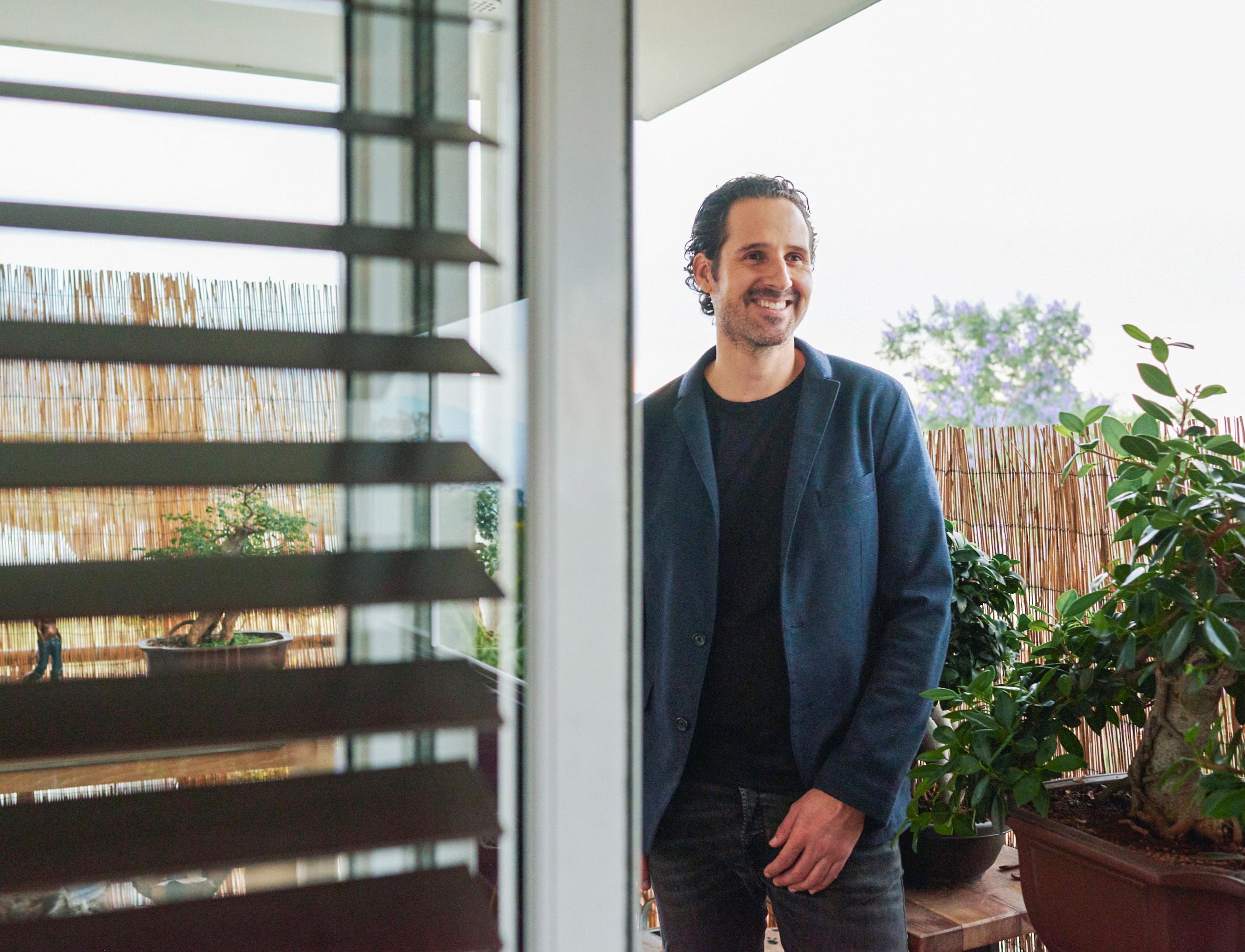
him the cross-referencing and researching skills that wound up getting the boy occasionally cited in footnotes in his father’s legal research. “Mindfulness has had a clear impact on my problem-solving skills,” Pérez Umaña says. “It increases my creativity, maximizes my energy, and helps me be empathetic to the people that work with me.”
The CLO tries to take a solo trip once a year to practice meditation and realign with himself. “These types of things give you a lot of resilience to make hard professional decisions and keep your mind in the right place to be able to give your best at work.”
FLEXIBLE LEADERSHIP
Today, BAC Credomatic is the largest financial group in Central America in terms of net portfolio, assets,
Chief Legal Officer and General Counsel BAC Credomatic
GLEN ÁLVAREZ
Daniel Pérez Umaña
deposits, and EBT. It is composed of affiliates in eleven jurisdictions and over twenty-one thousand employees. Still, Pérez Umaña has had to carve out a role that didn’t previously exist. When he arrived, the company had just been acquired by a new owner, and Pérez Umaña was hired to be an overall advisor who could help standardize and unite a number of different companies and businesses under more than just a name.
In assuming leadership, Pérez Umaña says he’s kept one particular lesson in mind. “I had to do a lot of things by myself initially to prove my value to the leaders here and earn their trust and respect,” Pérez Umaña says. “Authority is not imposed; you need to earn it. And to have people that are motivated and happy to work for you, you need to find a way to be flexible.”
It’s not just legal or business affairs that Pérez Umaña has found a way to impact. He was able to convince his company that to attract and retain the best talent, some outside-thebox thinking was needed.
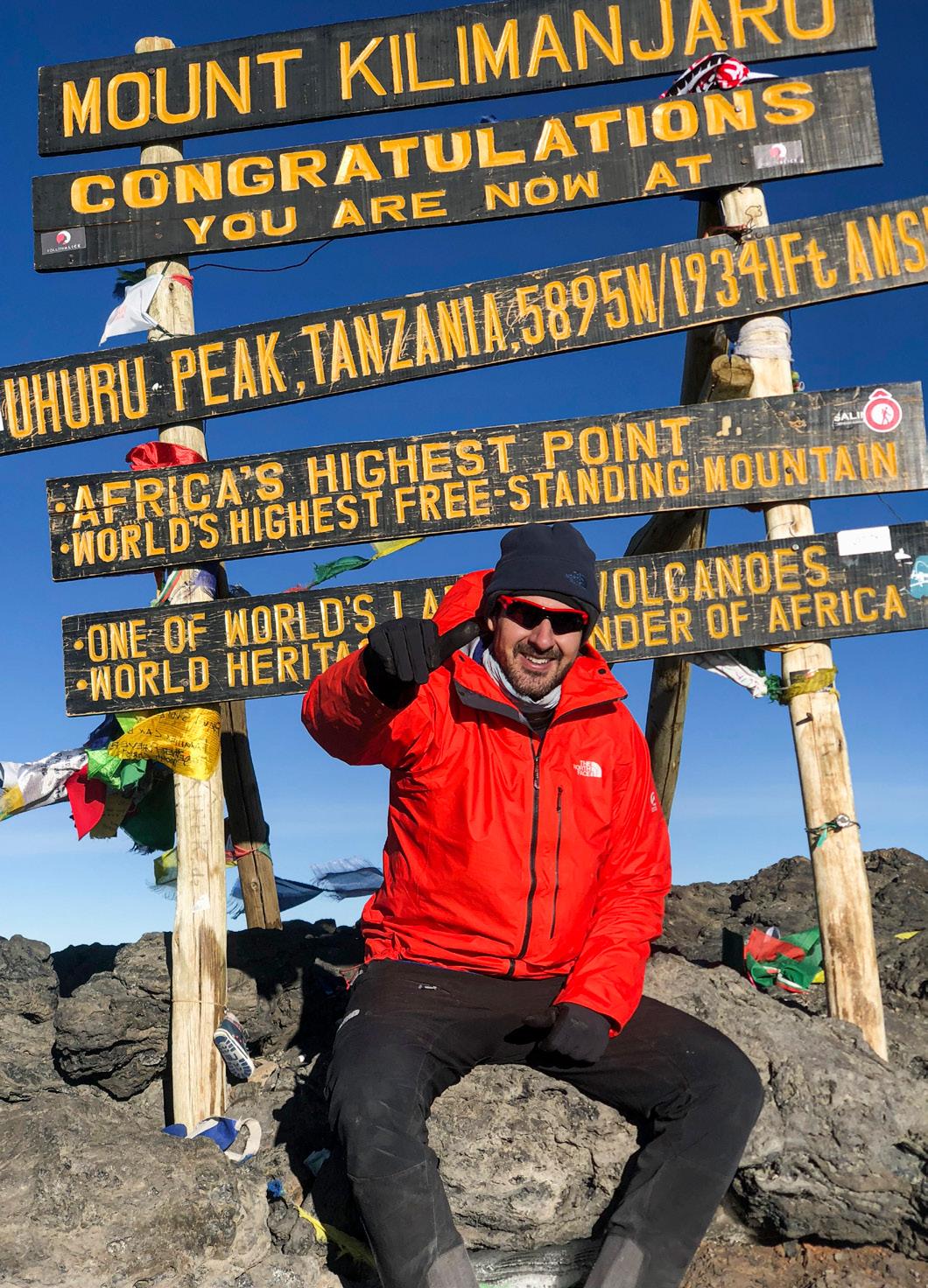
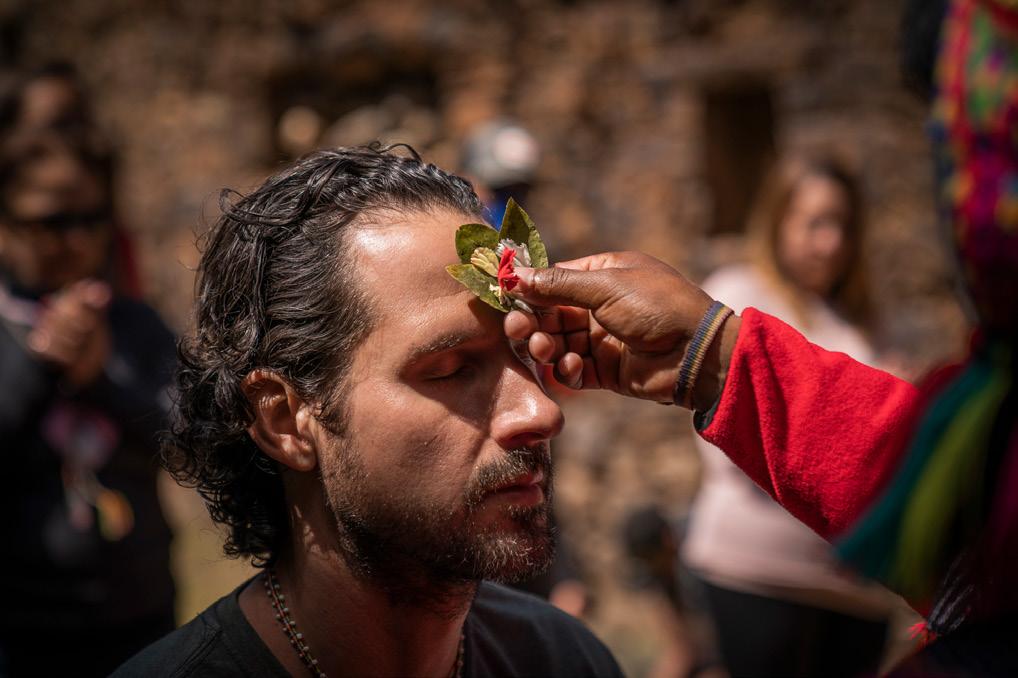

“I supported an initiative that helped convince the more conservative leaders in the company that it didn’t make a lot of sense to make people who are not in contact with clients come in to work in a suit and tie every day . . . even if they’re lawyers,” Pérez Umaña explains. “We’re talking about wanting to be competitive to millennials, and to attract the best talent, sometimes you need to get rid of old ideas.” He has
also offered work-from-home opportunities for those on his team and has seen productivity grow dramatically.
IN-HOUSE COUNSEL AND OUTSIDE EXERCISE

In looking to create standards for his new position, Pérez Umaña went to the Association of Corporate Counsel (ACC). In doing so, he created a lasting bond that he is now looking to reimagine in his own region. “When I started, there was nothing like the ACC in Central America,” he explains. “So we decided to follow their footsteps.” The Asociación de Abogados de Empresa para Centroamérica (AAEC) is an emerging Central American community for in-house counsel inspired by the ACC with whom they’ve recently entered into a cooperation agreement. Pérez Umaña is currently vice president.
Pérez Umaña still has an incredible amount on his plate, not just at BAC Credomatic but in every aspect of his life.
He continues plans to expand his mind, his leadership, and his own well-being. He lives with his girlfriend and their two rescued cats, maintains bonsai trees in his home, went vegetarian last year, and follows the Japanese art of Shinrin-Yoku (or forest bathing), which focuses on spending time in nature to improve one’s health and humanity. Pérez Umaña has a clear commitment to connecting to the better parts of himself and leverages that spirit every day to lead with grace, humility, and—as always—mindfulness.
SKYDIVE DUBAI (PHOTO 2), FEDERICO
MONTERO (PHOTO 3), ALL OTHER PHOTOS COURTESY OF DANIEL PÉREZ UMAÑA
1 2 3
PORTRAITS OF AN ADVENTURER
1. Mt. Kilimanjaro (2018): Daniel Pérez Umaña poses at the summit of Africa’s highest mountain. He completed the climb with his friend Rodrigo after a four-day “fast” expedition.
2. Skydiving in Dubai (2016)
3. Sacred Valley of the Incas (2019): Pérez Umaña attends a shamanistic ceremony during a predominantly spiritual trip he took with his brother. They journeyed with several Q’ero shamans, who are traditionally known as P’aqos, in order to learn about their culture, philosophy, and spirituality. Pérez Umaña and his brother performed several ceremonies, each of which was completed in a specific, sacred location selected by the shamans.
4. Mt. Aconcagua (2020): After a sixteen-day expedition, Pérez Umaña reaches the summit of the mountain. The highest mountain outside of Asia, Mt. Aconcagua has a summit elevation of more than twenty-two thousand feet.
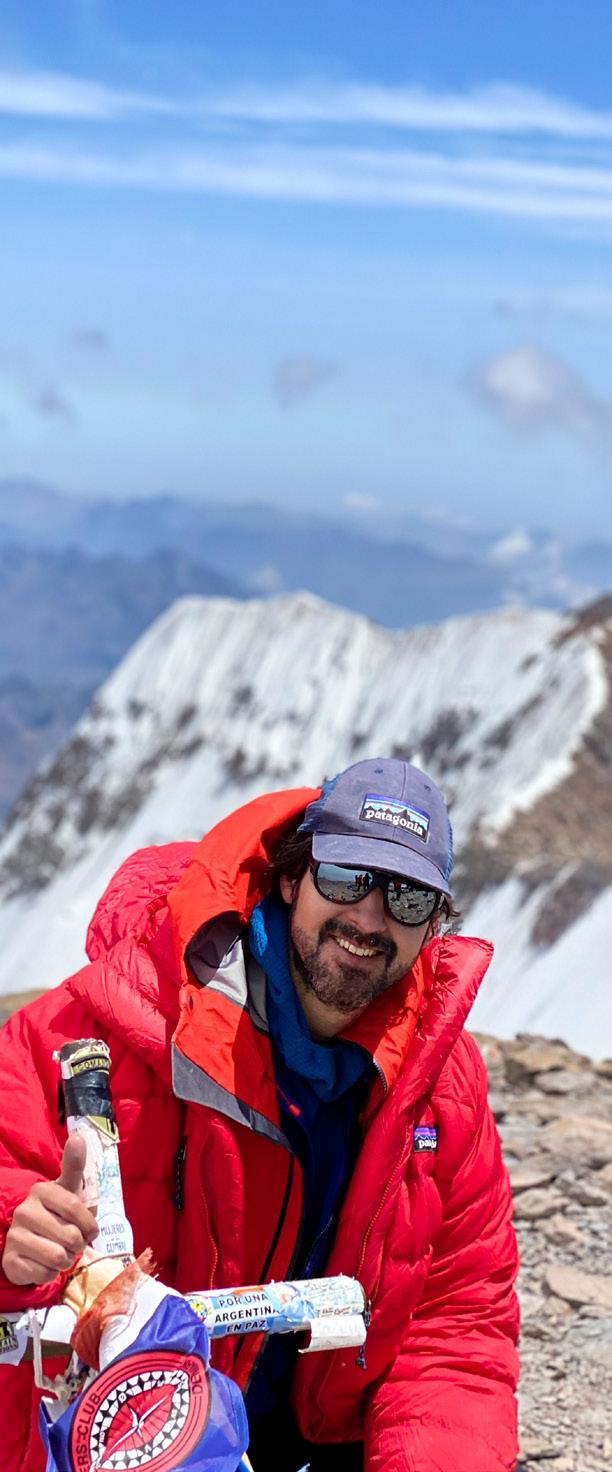

5. Simen Mountains, Ethiopia (2018): Pérez Umaña poses alongside a group of gelada monkeys he encountered while hiking in the mountains. A special type of baboon, gelada monkeys are only found in the Ethiopian Highlands.
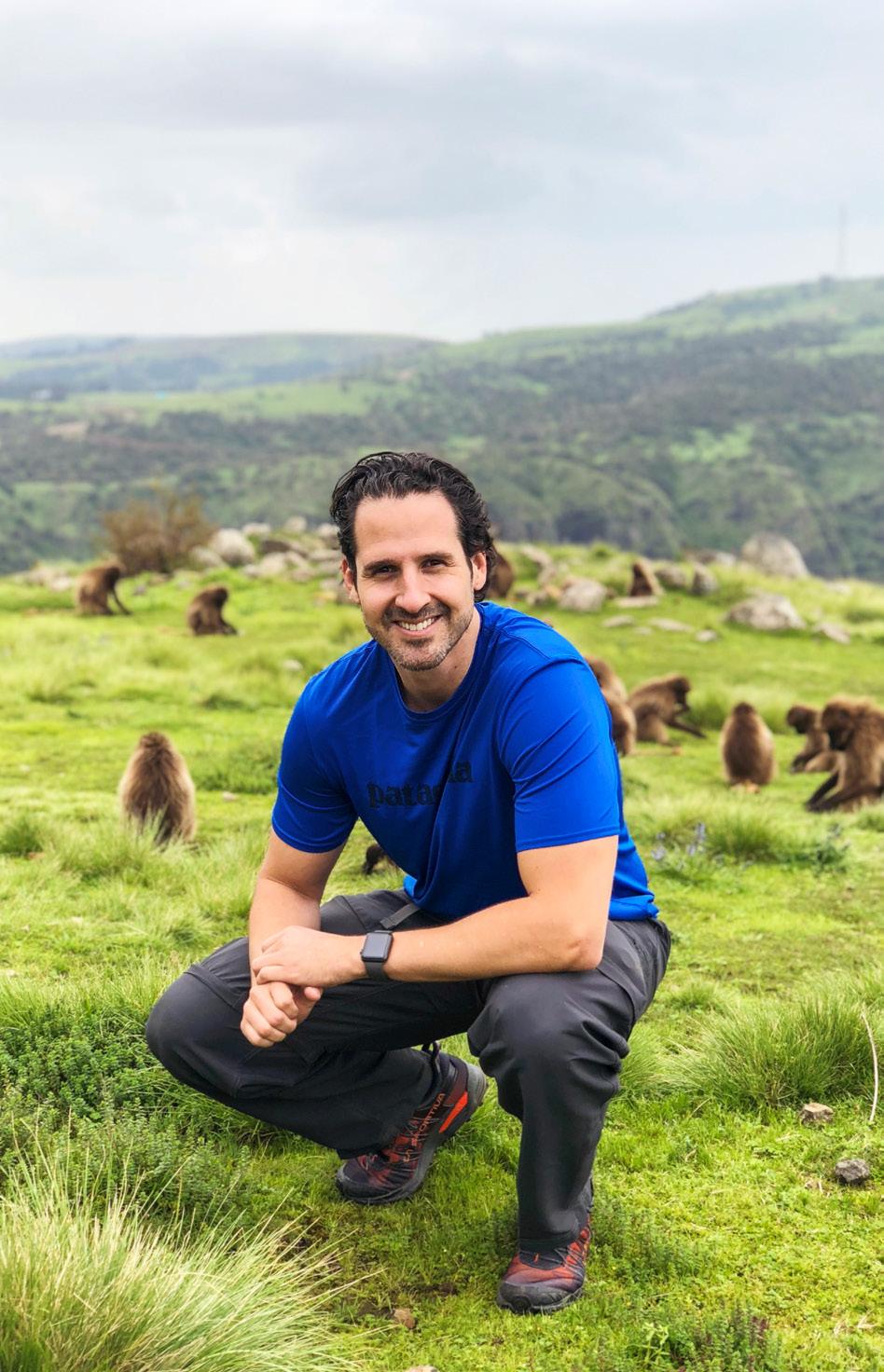
4 5
Industry Index Cannabis 81 Claudia L. Mercado Founder and CEO Calibueno 81 Joseph Huayllasco Cofounder Ciclo Education 139 Mark Diaz EVP and CFO George Washington University Finance 18 Yvonne Garcia Chief of Staff State Street 22 Javier Oroz Chief Risk Officer and General Secretary AXA Mexico 34 Ileana Musa Cohead of International Wealth Management and Head of International Banking & Lending Morgan Stanley 53 Rolddy Leyva VP of Diversity, Inclusion & Belonging Capital One 76 Bernie Navarro President Benworth Capital 156 Daniel Pérez Umaña Chief Legal Officer and General Counsel BAC Credomatic Food & Beverage 10 Carlos Gaytán Executive Chef and Owner Tzuco 37 Alex Martinez Director of Global Talent, Organizational Development & Rewards Yum! Brands/Pizza Hut 62 Ofelia Melendrez-Kumpf US Field Vice President McDonald’s USA 126 Mauricio Machado VP of Total Rewards Cargill 136 Demetrio Garcia VP of Global Business Development Golden Hill Foods Healthcare 88 Arthur J. Ochoa SVP for Advancement and Chief Advancement Officer Cedars-Sinai 88 Andrew Ortiz SVP and CHRO Cedars-Sinai 96 Cindy Alvarado Executive Director of Compliance & Compliance Counsel Pacira BioSciences Inc. 101 Sergio Melgar EVP and CFO UMass Memorial Health Care 105 Virginia Lazala VP and Legal Head of Oncology LACan Region & Oncology Global HR Novartis Pharmaceuticals 108 Carlos Soto VP of Manufacturing Operations Takeda Pharmaceuticals 113 Peter Perez VP of Operations & Member/Provider Experience Highmark Inc. 118 Laura Morales Garcia Manager, Affinity Groups AIDS Healthcare Foundation 118 Edwin Millan Director, Sales Outreach & Community Integration AIDS Healthcare Foundation 121 Lorena Gomez Director of Global Study Start-Up & Essential Documents Allergan 160 Index
A guide to the diverse professions featured in this issue Legal 48 Isabel Garcia Partner Piedmont Law Group 50 Anthony Arguijo Partner Scott Douglass & McConnico LLP 84 Diana Abril Founder, Managing Member Abril Law PLLC 131 William Avila Partner Bracewell LLP 142 G. Michelle Ferreira Comanaging Shareholder, San Francisco & Silicon Valley Greenberg Traurig 145 Adolfo Garcia Partner Brown Rudnick Logistics 148 Flavio Martins Ferreira Global Head of Compliance GLP Manufacturing 134 Alonso Ramos CFO Viscofan Media & Entertainment 40 Roxanna Flores SVP of HR, Local Media Univision 56 Maria Fernandez EVP and COO, Latin Iberia Sony Music Entertainment Real Estate 44 Carina E. Sánchez Executive Director Public Building Commission of Chicago Tech 26 Marisol Martinez VP of Multicultural Marketing Charter Communications 66 Pedro Pavón Director, Senior Corporate Counsel Salesforce 68 Susy Ponce de Leon Director of Business Human Resources Cable One 72 Francisco Romero COO StackPath 154 Antonio Assumpcao Legal Director of North & Latin America Lenovo 161 Hispanic Executive
The Last Word
A collection of recommendations and resources from the business leaders featured in this issue
“I rely on the New York Times, Gartner, and the John Hopkins Coronavirus Resource Center.
“I also read this mantra, and it really resonated with me. It helps me and the team stay positive, disciplined, and focused:
“I recommend ‘COVID-19 Compliance Forecast: What Comes Next for Key Industries?’ by Samantha Gilbert and ‘GCs Tell External Counsel: Find Hard-to-Spot Issues Amid COVID-19’ by Christina McKeon Frutuoso.

“Participation in panels is also very important, and I have had the opportunity to talk about crisis with the LACCA in Miami, with the Practising Law Institute in New York, and with the Antitrust Commission in México City. Also relevant is participation in the Global Investigation Review forum in Paris, as well as the several crisis trainings taking place in Paris and New York.”
“I recommend The Happiness Lab podcast by Laurie Santos. This scientific approach to happiness was very useful during a difficult time like the pandemic.
“I also recommend the ‘Calm’ app: it was very useful for meditation for me, and it also helped me introduce my kids to meditation. My daughter loves the lullabies, and my son the bedtime stories. It also has very useful master classes.
“Lastly, Thrive by Arianna Huffington is a very inspiring book, especially when reflecting on your life during times of change.”
FERNANDEZ,
162 The Last Word
—MARIA
SONY MUSIC ENTERTAINMENT, P56
“‘Keep your eye on the horizon, we will get through the choppy waters.’ As an organization, we do not want a short-term event, which we hope COVID-19 to be, to affect our long-term goals.’”
—Mike Butler, President and CEO, Radius Bank
—ROXANNA FLORES, UNIVISION, P40
—JAVIER OROZ, AXA MEXICO, P22
I have relied on professional networks focused on COVID best practices and benchmarking, and leveraging the resources available on our Cargill internal learnings system to help employees navigate uncertainty, stress, and remote working.”
—MAURICIO MACHADO, CARGILL, P126
We are pleased to support the in-house leaders featured by Hispanic Executive with whom we are honored to work.

Congratulations
JMA is a global firm providing executive search, leadership advice and organizational consulting to businesses around the world. Clients work with JMA because of its industry expertise, partner-led process and adherence to the values of Quality, Trust and Care. JMA holds a deep commitment to diversity and inclusion, and proudly supports clients in their efforts to build strong and balanced leadership teams.
executive search - JMA partners with organizations of all ownership structures and private equity funds to appoint executive and non-executive directors and leadership team members across all functions.
leadership advice - JMA strengthens organizations by providing board assessment and succession planning services, as well as coaching and mentoring to senior executives.











organizational consulting – JMA provides clients with consultancy in the fields of organizational design and effectiveness, role design, and total rewards strategy.









10180 Linn Station Road, Ste. A200 | Louisville, KY 40223 www.jma-global.com | usa@jma-global.com | uk@jma-global.com
• • •
 A Day in the Life with Carlos Gaytán, Michelin Star-winning chef and owner of Tzuco P 10
A Day in the Life with Carlos Gaytán, Michelin Star-winning chef and owner of Tzuco P 10































































































 Gaytán drops by the local restaurant depot to pick up sugar, mascarpone, meat, and other ingredients that he and his team need at Tzuco.
Gaytán drops by the local restaurant depot to pick up sugar, mascarpone, meat, and other ingredients that he and his team need at Tzuco.



















 Ileana Musa
Cohead of International Wealth Management and Head of International Banking & Lending
Ileana Musa
Cohead of International Wealth Management and Head of International Banking & Lending

 Roxanna Flores
Roxanna Flores








 Rolddy Leyva VP of Diversity, Inclusion & Belonging Capital One
Rolddy Leyva VP of Diversity, Inclusion & Belonging Capital One






 The Sello/Mariela Croci congratulates Maria for her successful career at Sony Music. Her passion and strength as a music executive woman is a great inspiration. She trusted us as a creative idea and empowered me to grow it. The Sello is a company specializing in creative strategy for artists.
The Sello/Mariela Croci congratulates Maria for her successful career at Sony Music. Her passion and strength as a music executive woman is a great inspiration. She trusted us as a creative idea and empowered me to grow it. The Sello is a company specializing in creative strategy for artists.
















































 Andrew Ortiz SVP and CHRO Cedars-Sinai
Andrew Ortiz SVP and CHRO Cedars-Sinai
 Arthur J. Ochoa SVP for Advancement and Chief Advancement Officer Cedars-Sinai
Arthur J. Ochoa SVP for Advancement and Chief Advancement Officer Cedars-Sinai









 BY BILLY YOST
BY BILLY YOST








 BY BILLY YOST
Lorena Gomez Director of Global Study Start-Up & Essential Documents Allergan
BY BILLY YOST
Lorena Gomez Director of Global Study Start-Up & Essential Documents Allergan


 Mauricio Machado VP of Total Rewards Cargill
Mauricio Machado VP of Total Rewards Cargill





























































